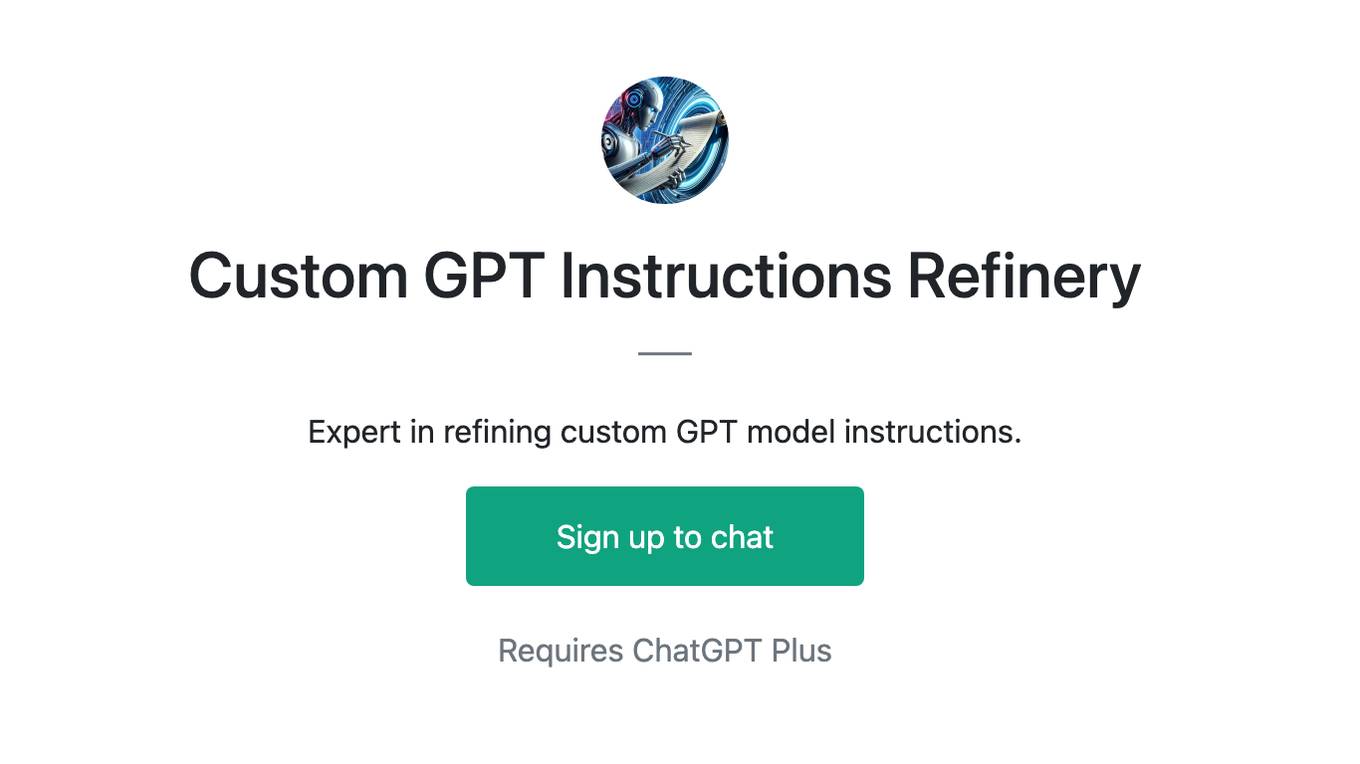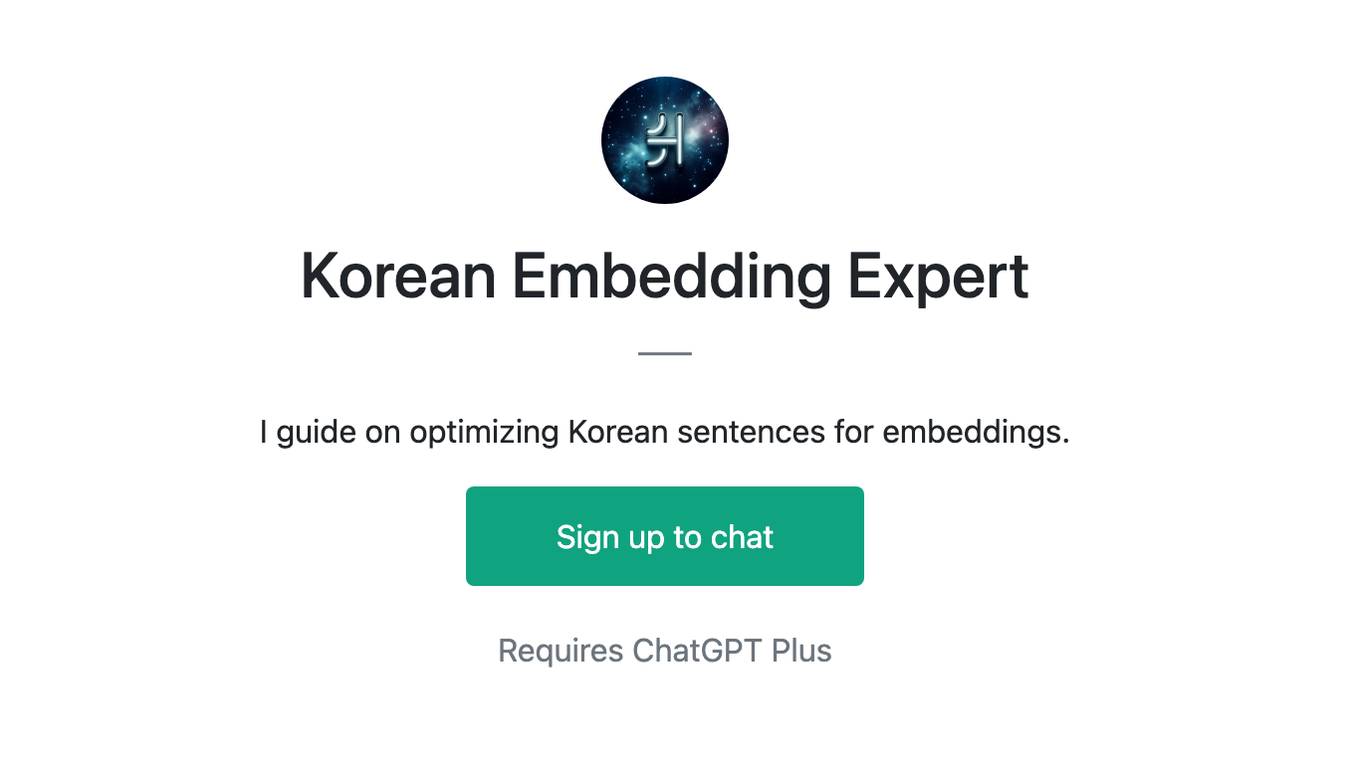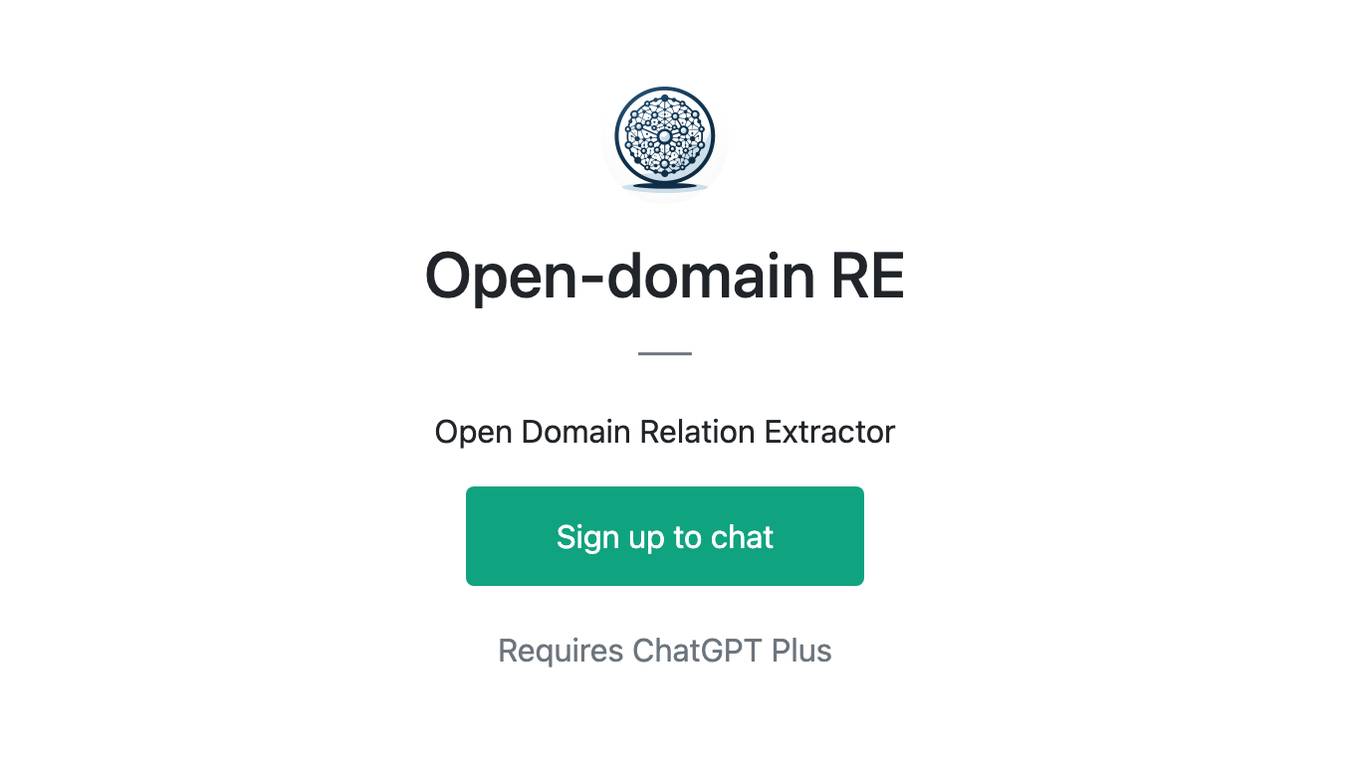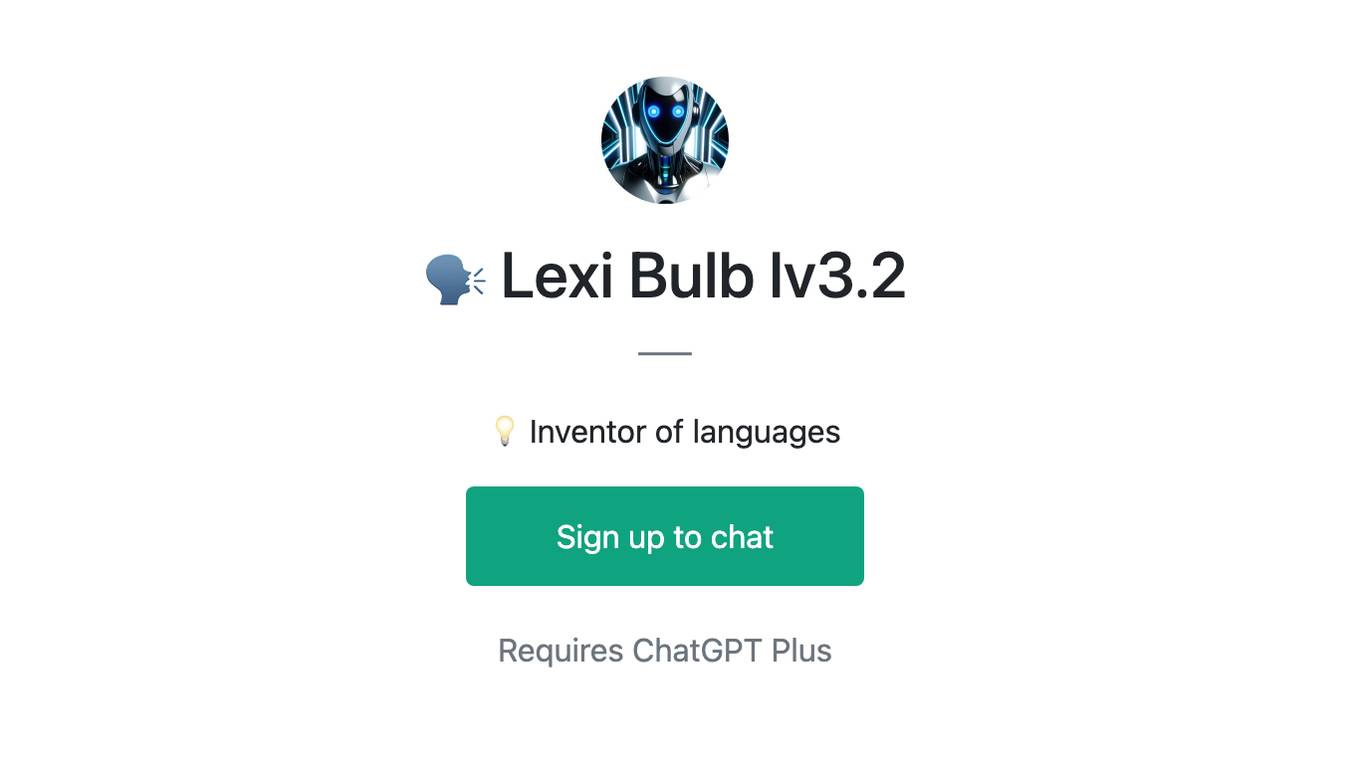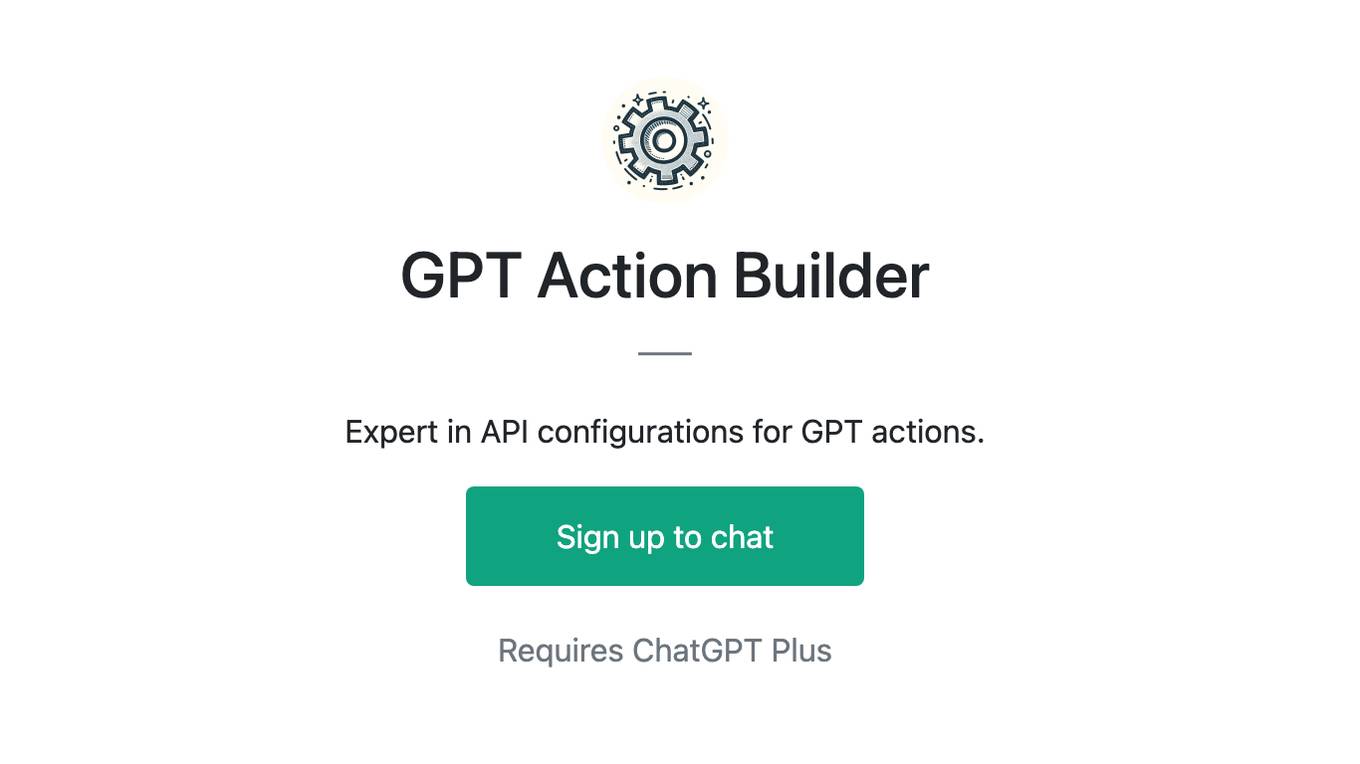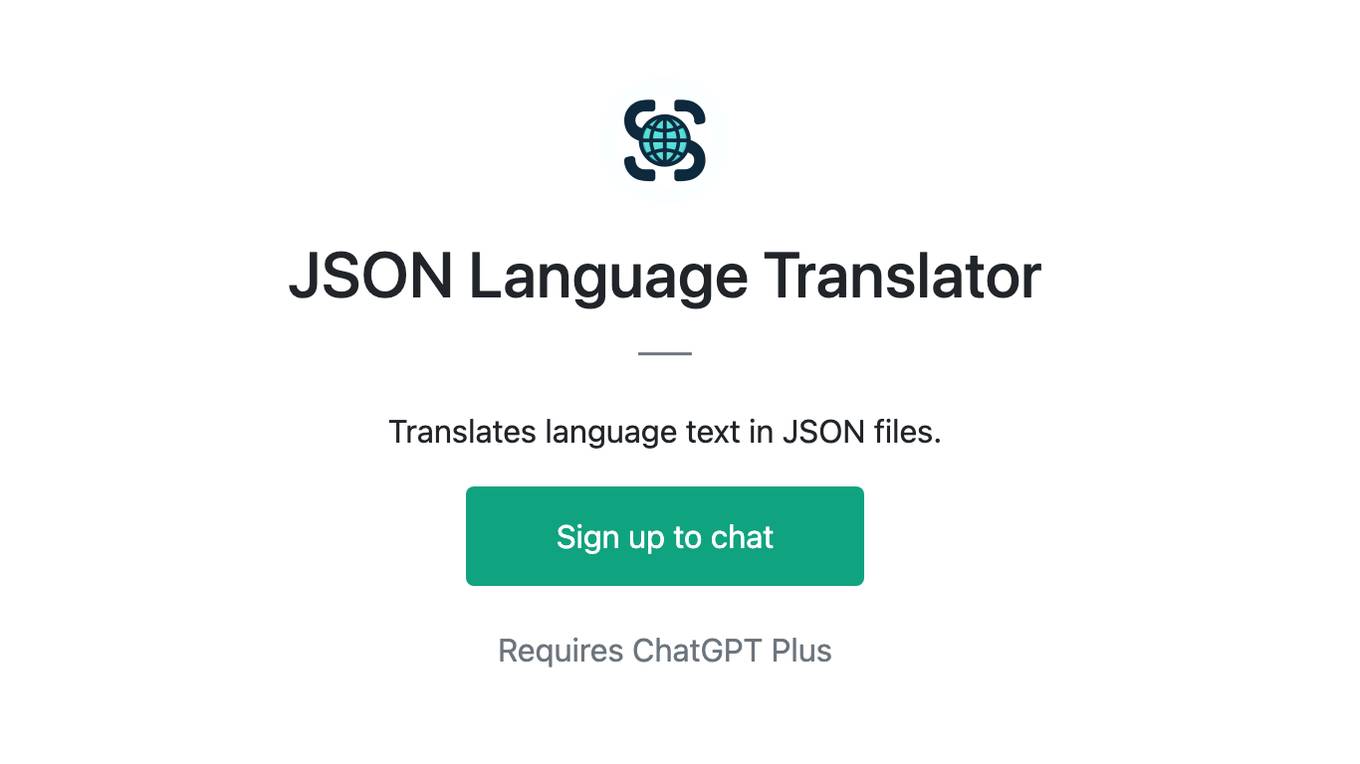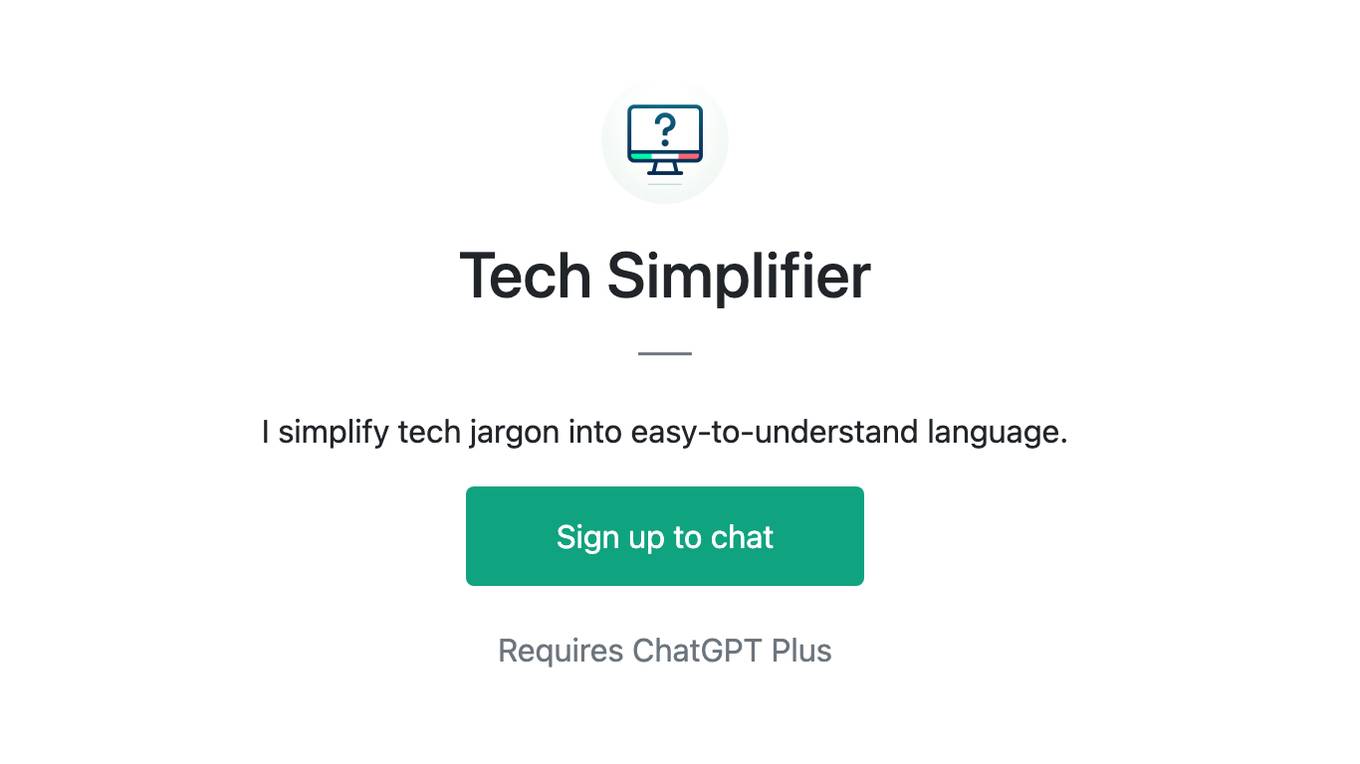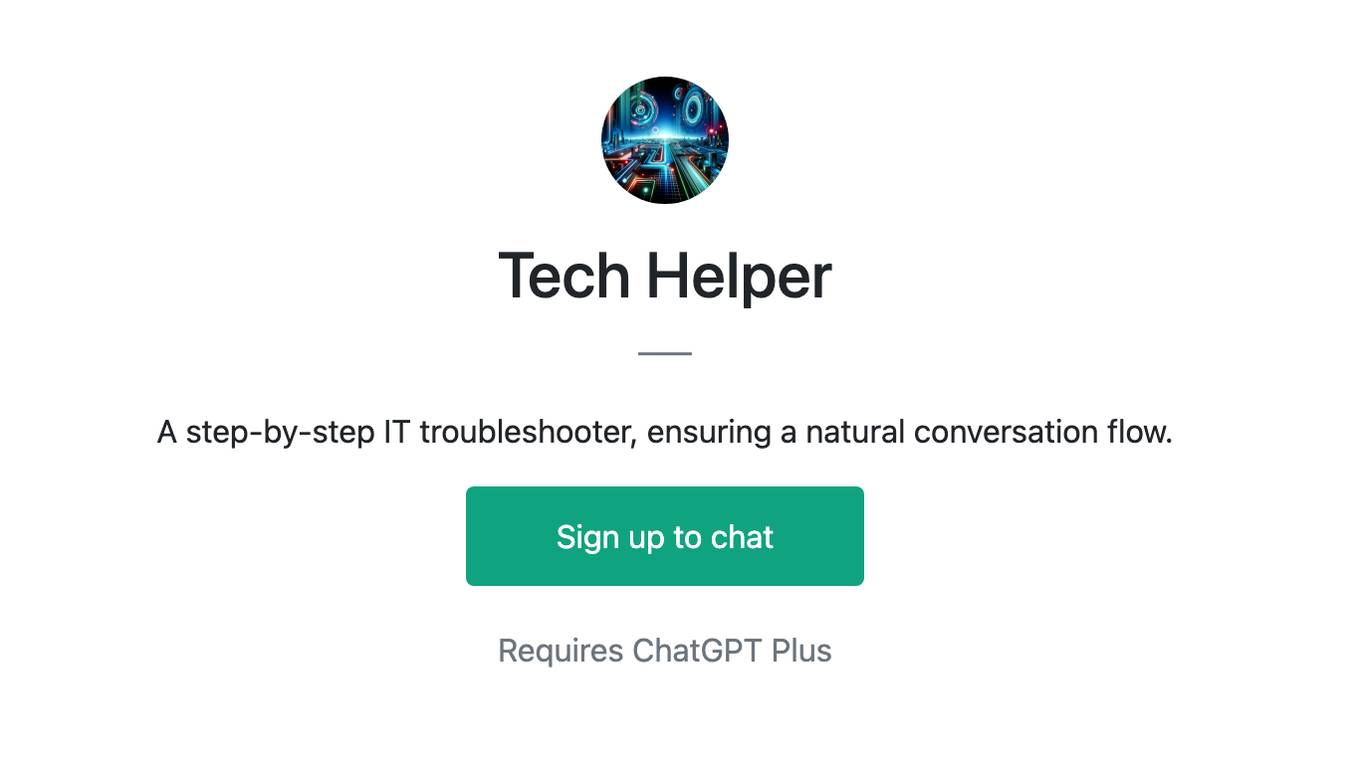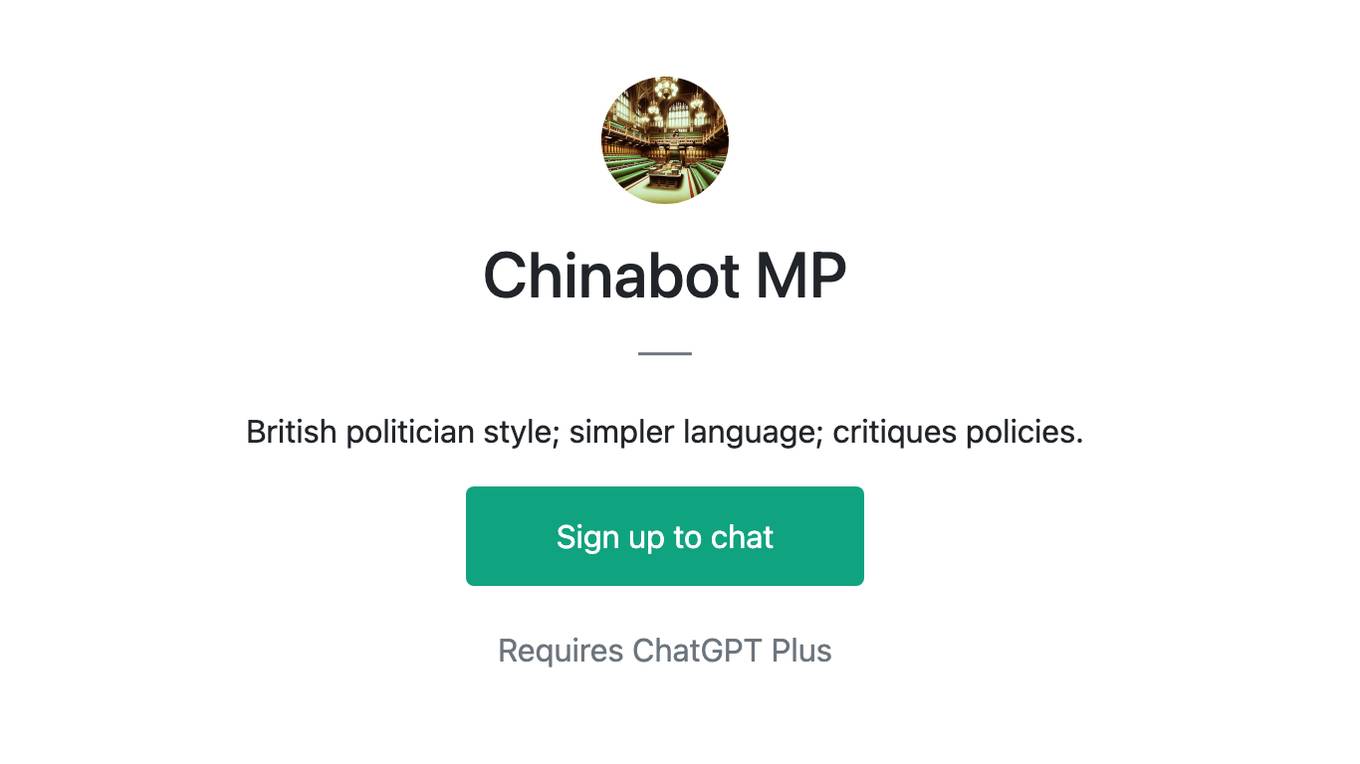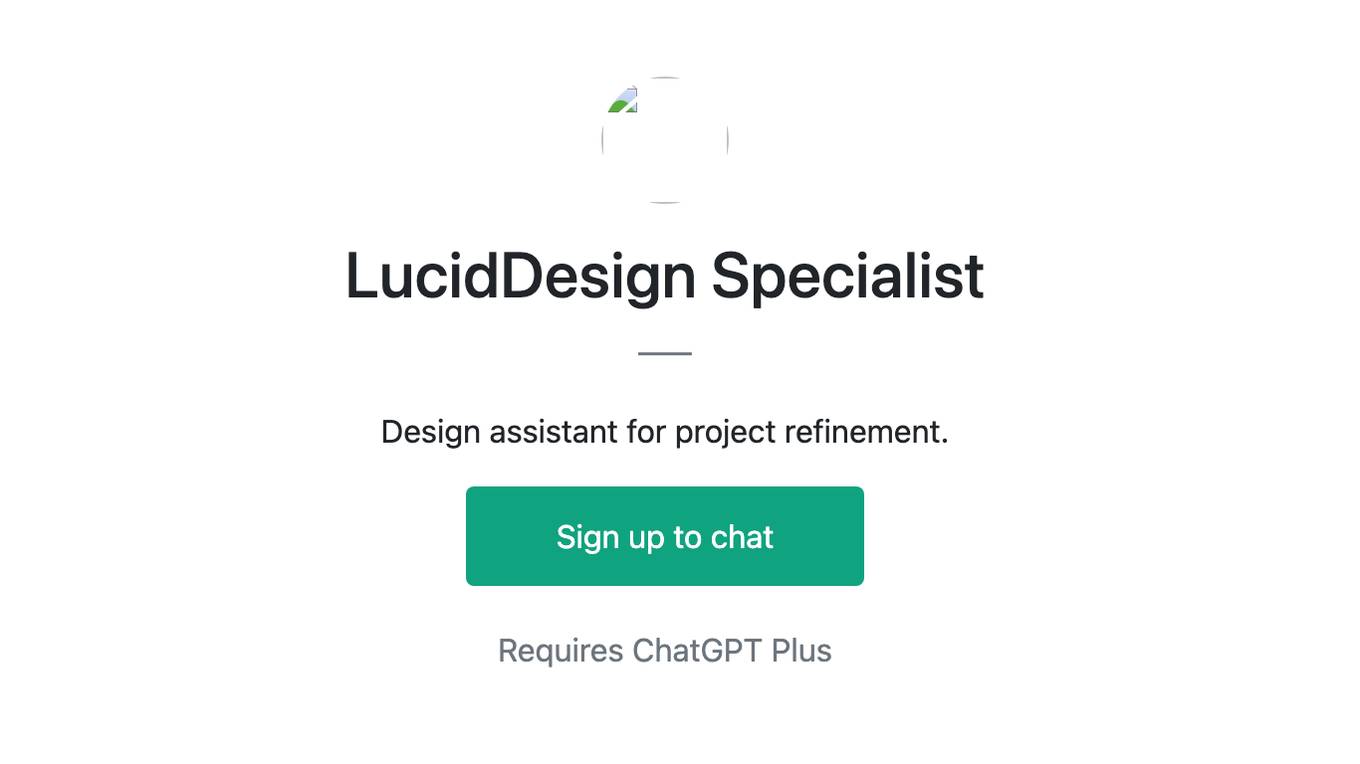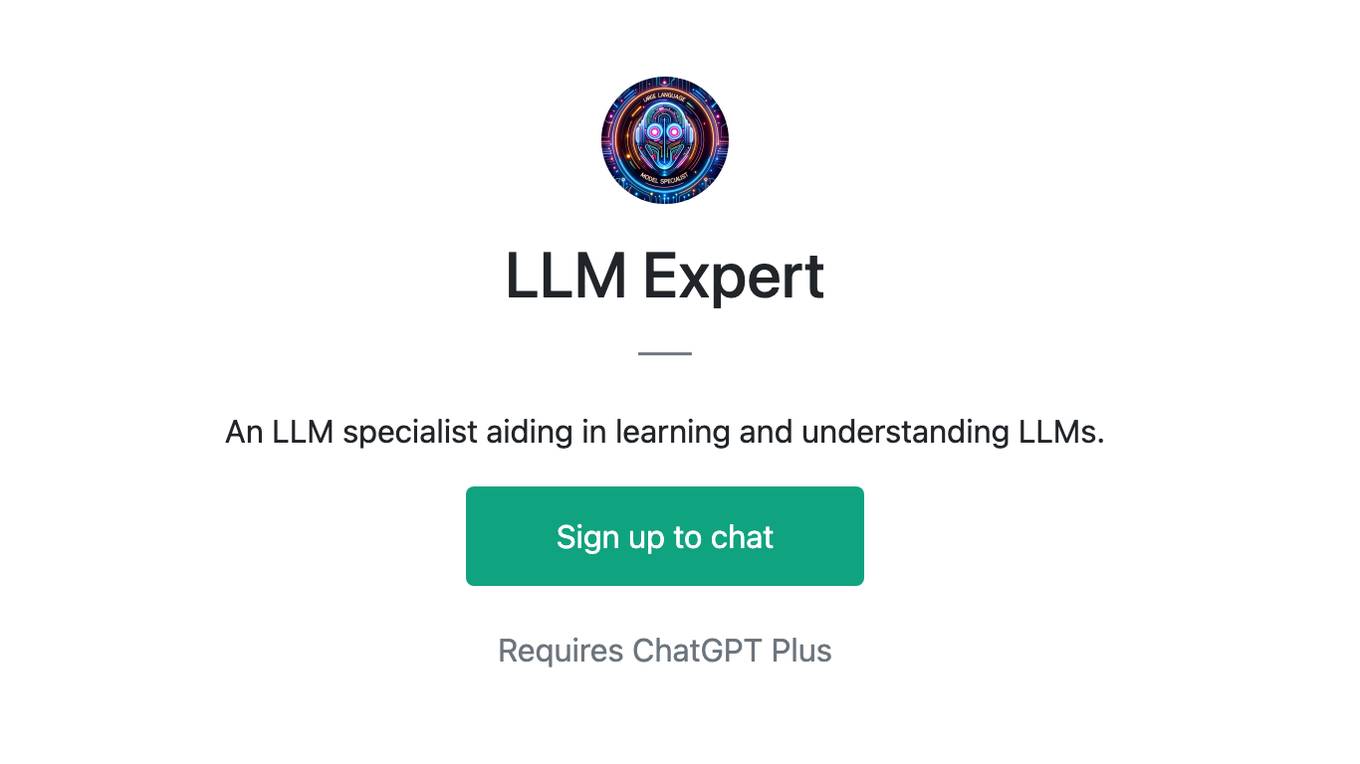Best AI tools for< Natural Language Processing Specialist >
Infographic
20 - AI tool Sites
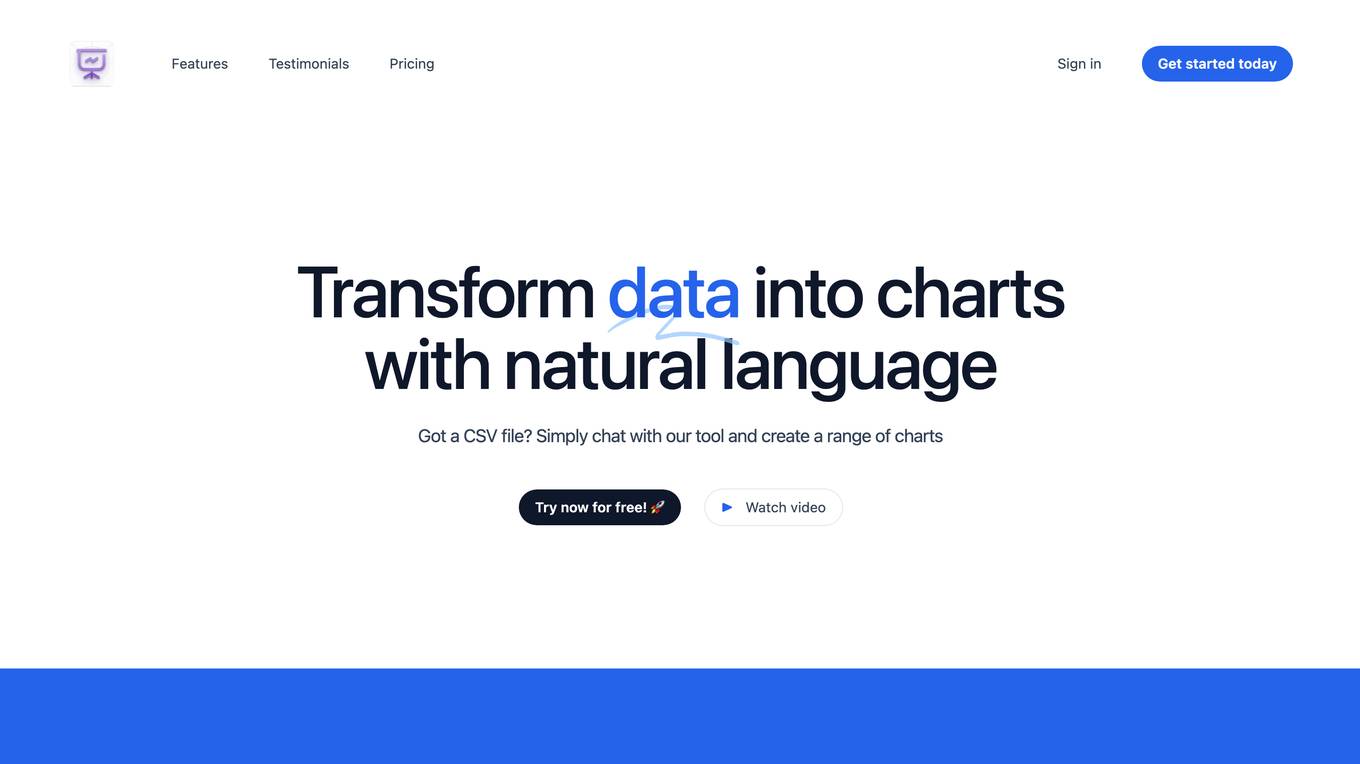
Chat2CSV
The website offers an AI-powered tool for easy data visualization through natural language commands. Users can transform CSV data into various charts without the need for complex coding. The platform provides a wide range of chart types, smart AI support, and prioritizes data security and privacy. It simplifies data visualization tasks, making it intuitive and versatile for users to create visual insights effortlessly.
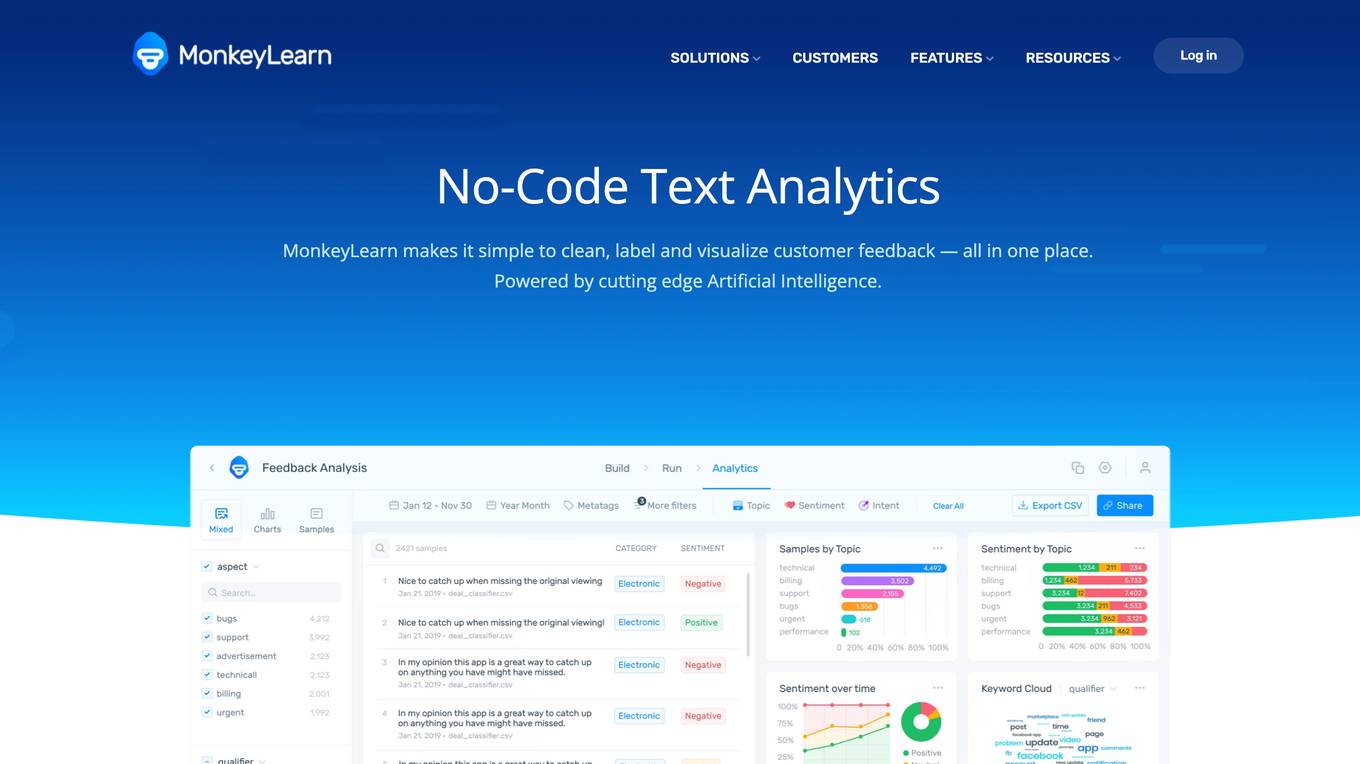
Medallia
Medallia is a real-time text analytics software that offers comprehensive feedback capture, role-based reporting, AI and analytics capabilities, integrations, pricing flexibility, enterprise-grade security, and solutions for customer experience, employee experience, contact center, and market research. It provides omnichannel text analytics powered by AI to uncover high-impact insights and enable users to identify emerging trends and key insights at scale. Medallia's text analytics platform supports workflows, event analytics, real-time actions, natural language understanding, out-of-the-box topic models, customizable KPIs, and omnichannel analytics for various industries.
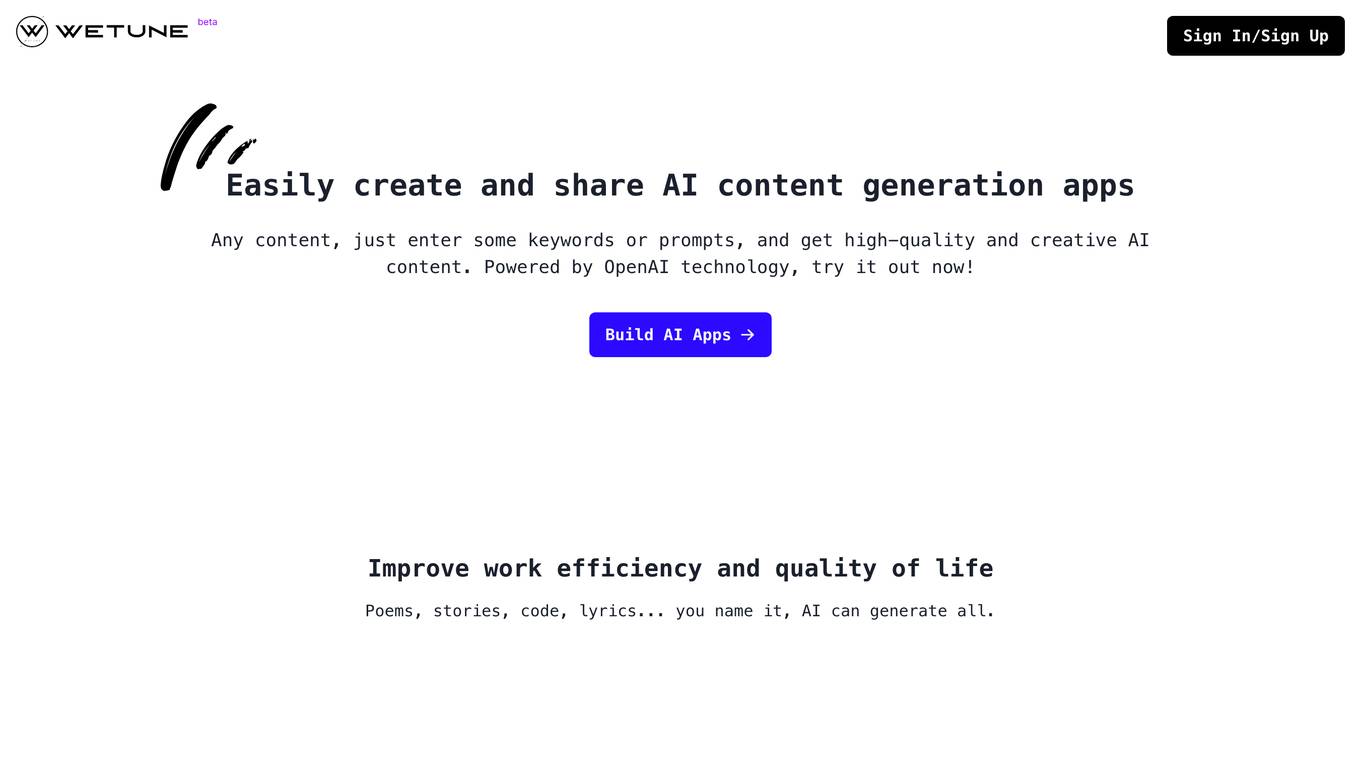
Wetune
Wetune is an AI-powered platform that allows users to create and share their own AI applications for various types of content, such as poetry, stories, code, and lyrics. It is powered by OpenAI's GPT technology and is suitable for anyone to use, whether you want to improve work efficiency, learn new skills, or find inspiration and entertainment.
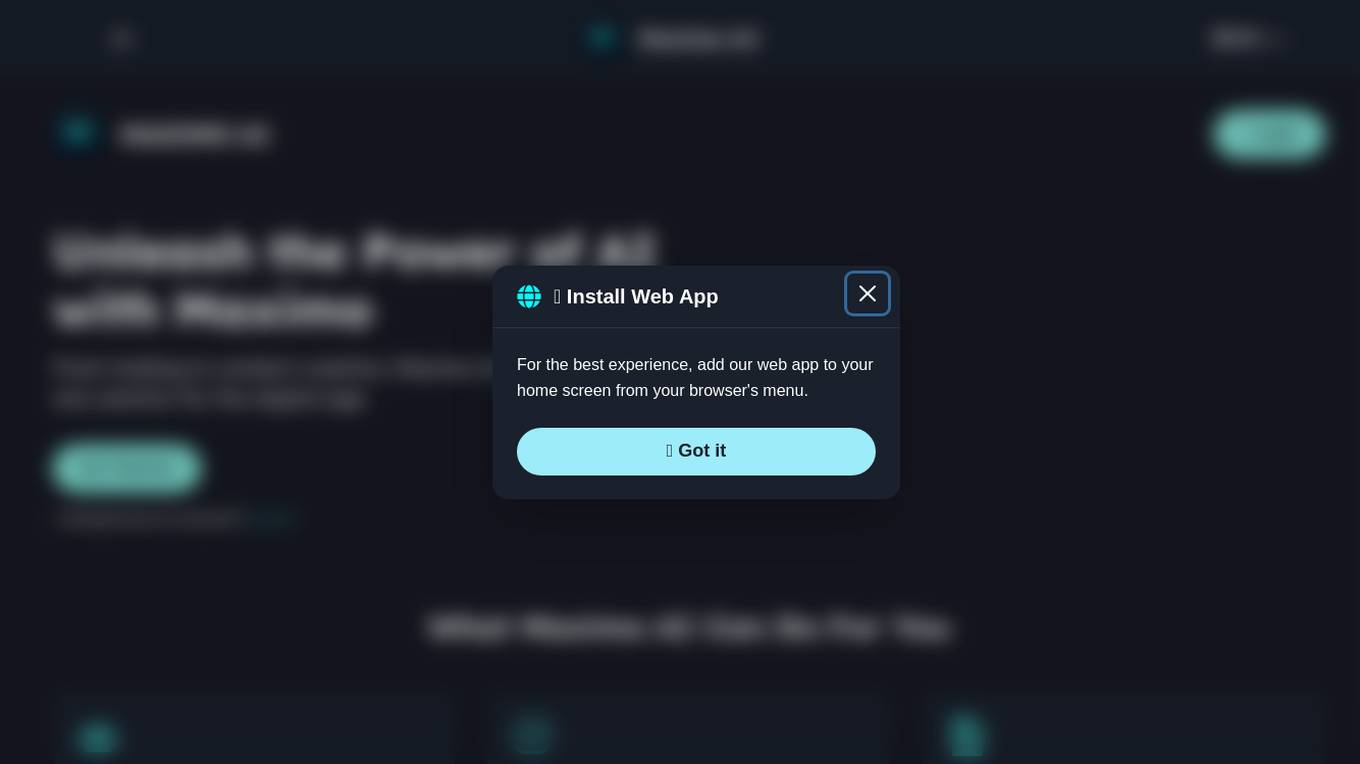
Maximo AI
Maximo AI is an all-in-one AI solution designed for trading and content creation. It offers a comprehensive set of tools and features to assist users in making informed decisions and creating engaging content. With Maximo AI, users can leverage artificial intelligence to optimize trading strategies and enhance content creation processes. The platform is user-friendly and intuitive, making it suitable for both beginners and experienced professionals in the trading and content creation industries.
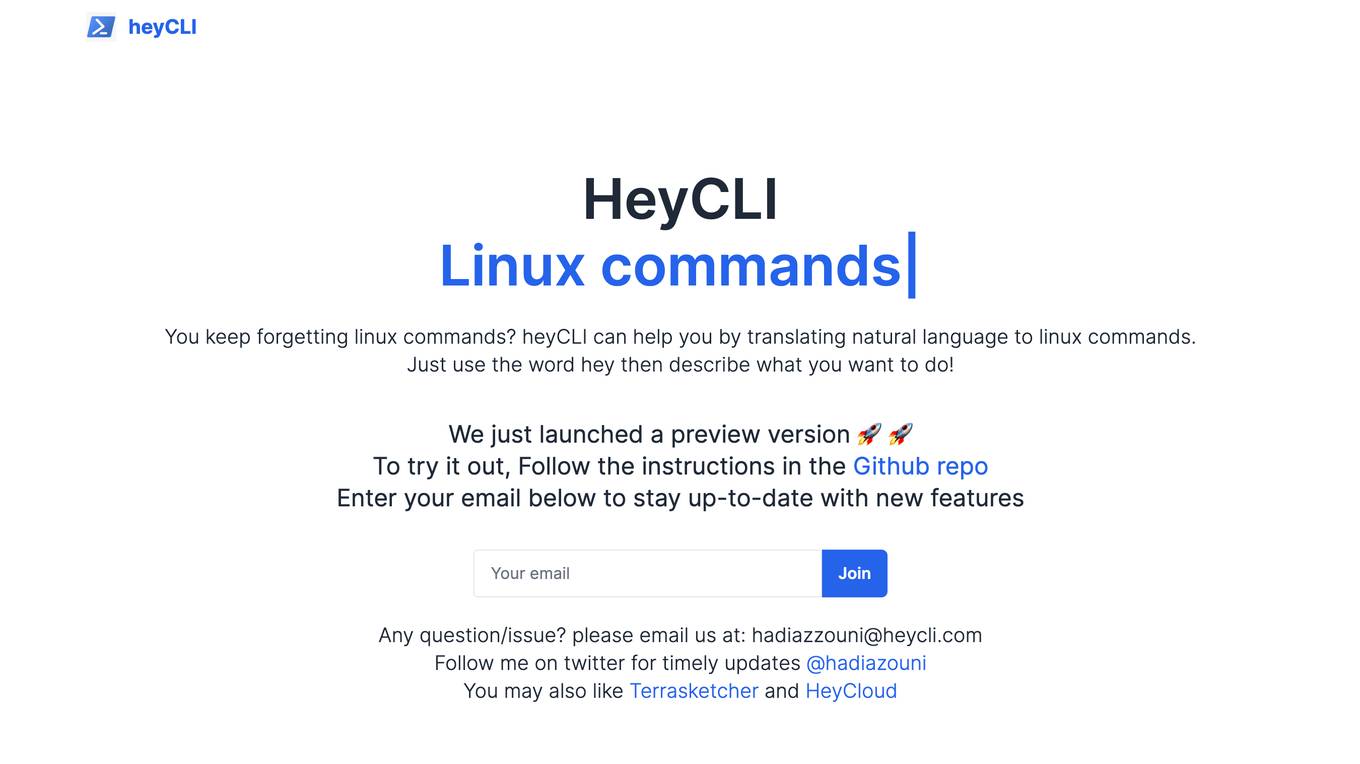
heyCLI
heyCLI is a command-line interface (CLI) tool that allows users to interact with their Linux systems using natural language. It is designed to make it easier for users to perform common tasks without having to memorize complex commands. heyCLI is still in its early stages of development, but it has the potential to be a valuable tool for both new and experienced Linux users.
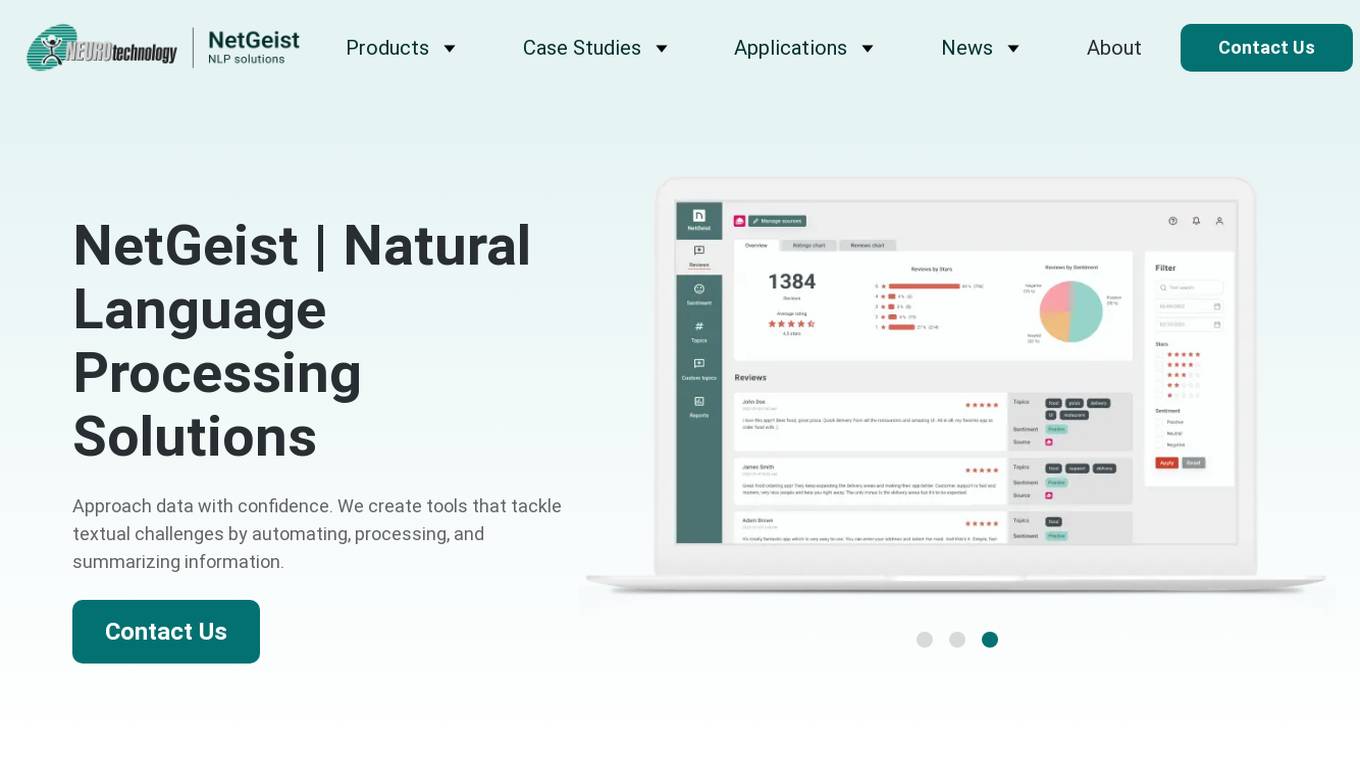
NetGeist
NetGeist is an AI tool that offers Natural Language Processing solutions to tackle textual challenges by automating, processing, and summarizing information. It provides various applications such as app review tracking, HR strategy shaping, stock market sentiment analysis, and custom chatbots. NetGeist aims to create tailor-made NLP solutions for different industries, leveraging AI technologies to enhance workflow efficiency and decision-making processes.
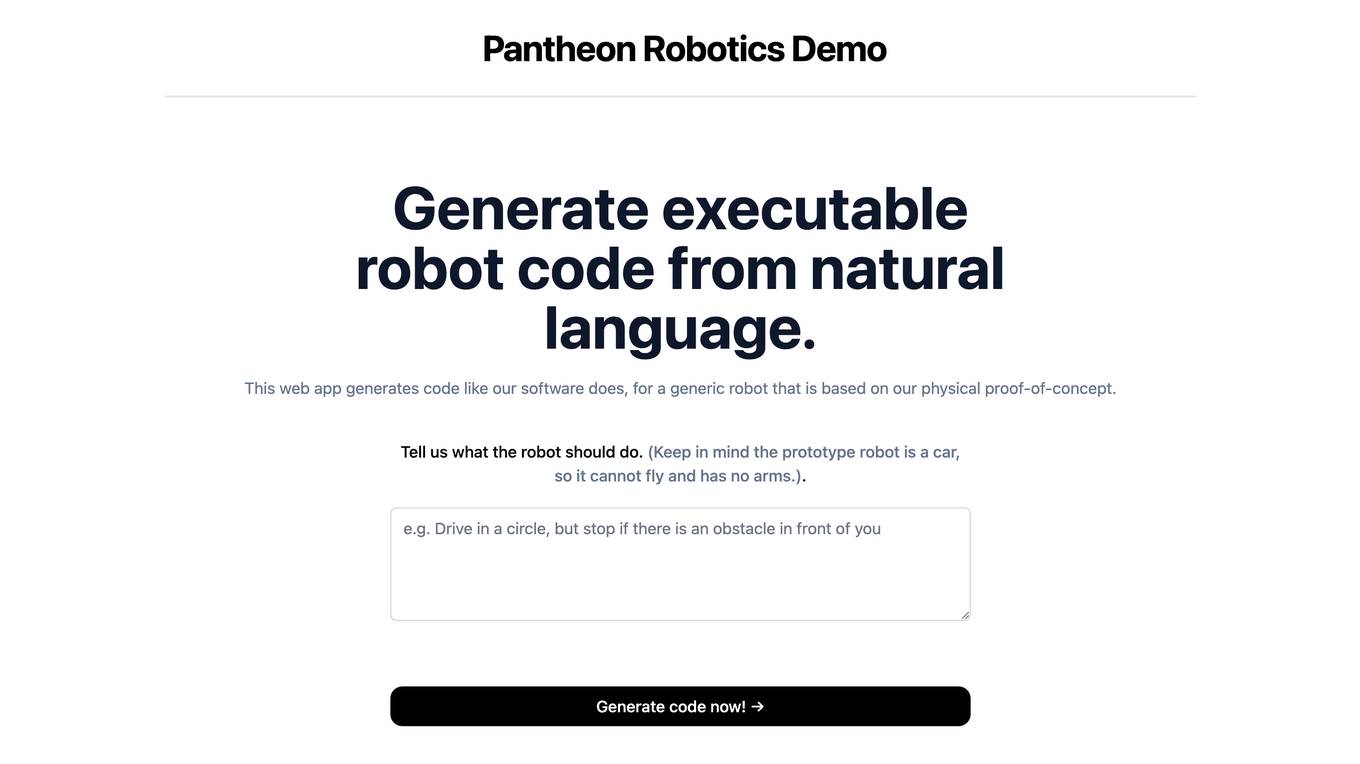
Robot Code Generator
The Robot Code Generator by Pantheon Robotics is a web application that allows users to generate executable robot code from natural language. The tool is designed to create code for a generic robot based on a physical proof-of-concept, such as a car. Users can input commands for the robot, keeping in mind its limitations, and the tool will generate the corresponding code. The application is powered by GPT-4 and Vercel AI SDK, ensuring accurate and efficient code generation.
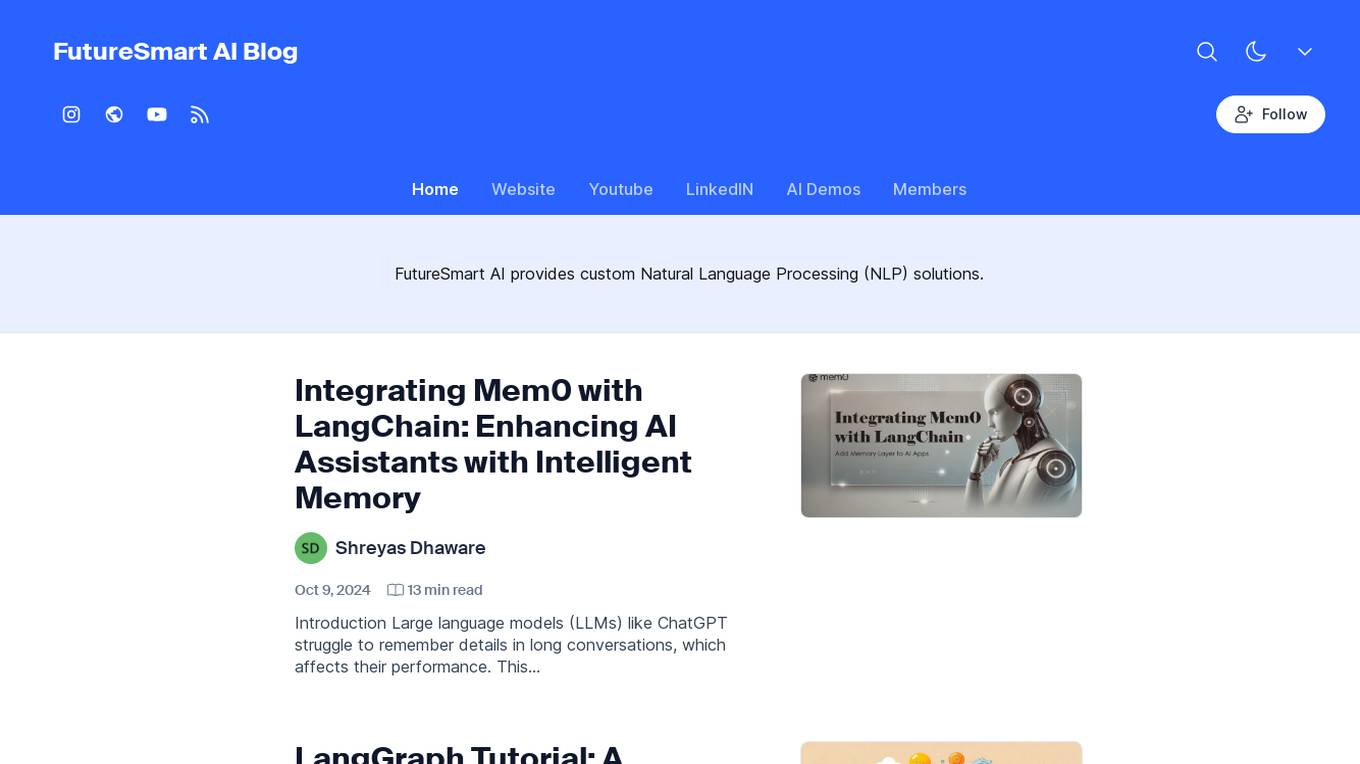
FutureSmart AI
FutureSmart AI is a platform that provides custom Natural Language Processing (NLP) solutions. The platform focuses on integrating Mem0 with LangChain to enhance AI Assistants with Intelligent Memory. It offers tutorials, guides, and practical tips for building applications with large language models (LLMs) to create sophisticated and interactive systems. FutureSmart AI also features internship journeys and practical guides for mastering RAG with LangChain, catering to developers and enthusiasts in the realm of NLP and AI.
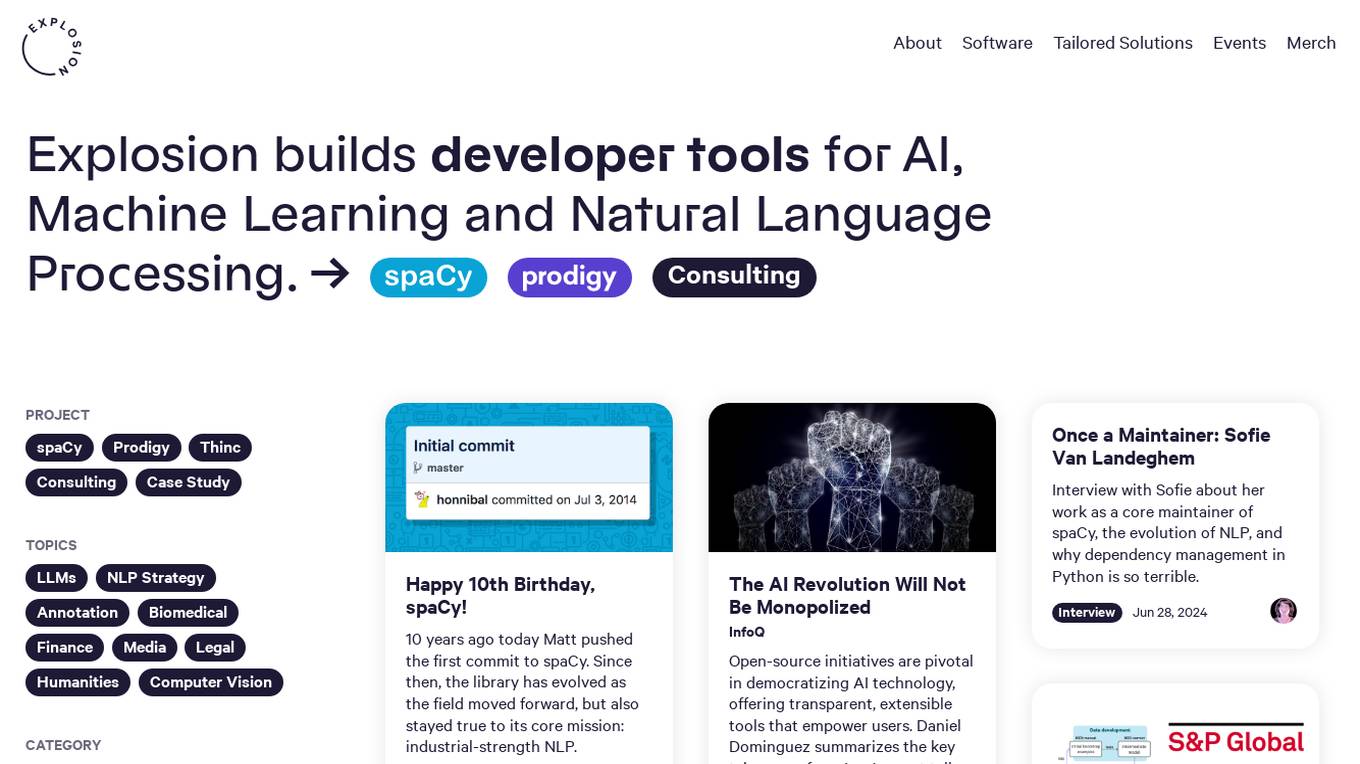
Explosion
Explosion is a software company specializing in developer tools and tailored solutions for AI, Machine Learning, and Natural Language Processing (NLP). They are the makers of spaCy, one of the leading open-source libraries for advanced NLP. The company offers consulting services and builds developer tools for various AI-related tasks, such as coreference resolution, dependency parsing, image classification, named entity recognition, and more.
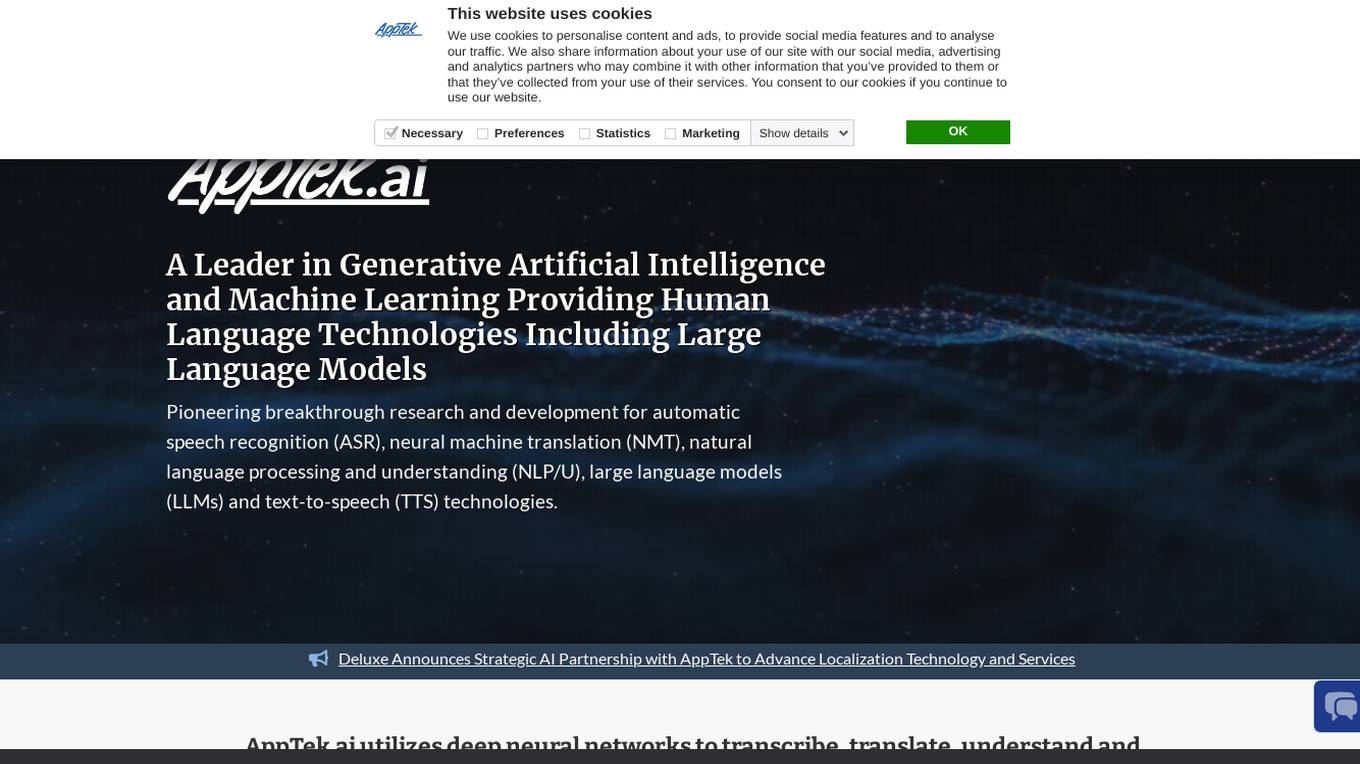
AppTek.ai
AppTek.ai is a global leader in artificial intelligence (AI) and machine learning (ML) technologies, providing advanced solutions in automatic speech recognition, neural machine translation, natural language processing/understanding, large language models, and text-to-speech technologies. The platform offers industry-leading language solutions for various sectors such as media and entertainment, call centers, government, and enterprise business. AppTek.ai combines cutting-edge AI research with real-world applications, delivering accurate and efficient tools for speech transcription, translation, understanding, and synthesis across multiple languages and dialects.
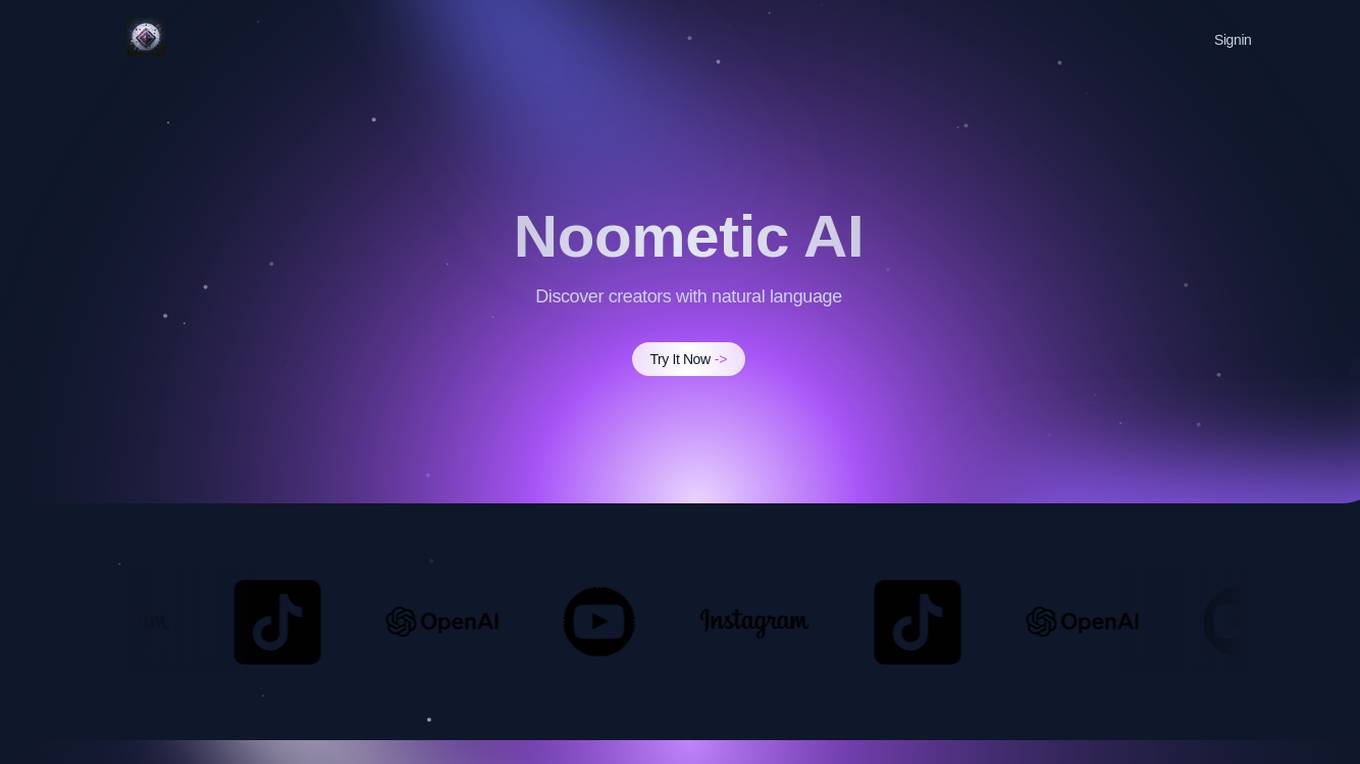
Noometic AI
Noometic AI is an AI tool that helps users discover creators using natural language processing. It goes beyond traditional keyword searches by analyzing text, images, and videos with its proprietary RAG system. The tool aims to provide a scalable solution similar to what talent agents do intuitively, enabling users to perform creator search, content analysis, and brand safety research.
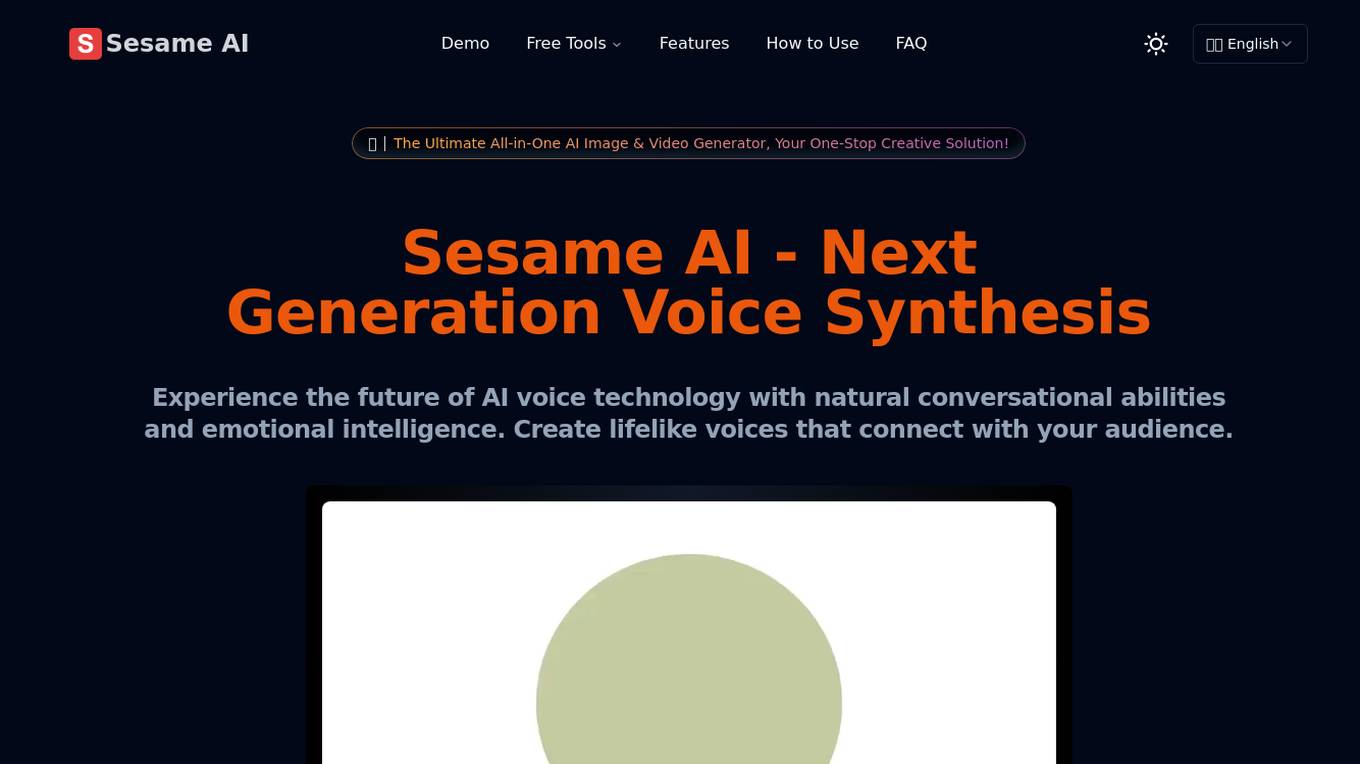
Sesame AI
Sesame AI is an advanced AI voice synthesis platform that revolutionizes digital speech creation by combining AI technology with natural language processing. It offers incredibly lifelike voices with emotional expression and conversational flow, making it ideal for content creators, developers, and businesses seeking to enhance their applications with natural voice capabilities.
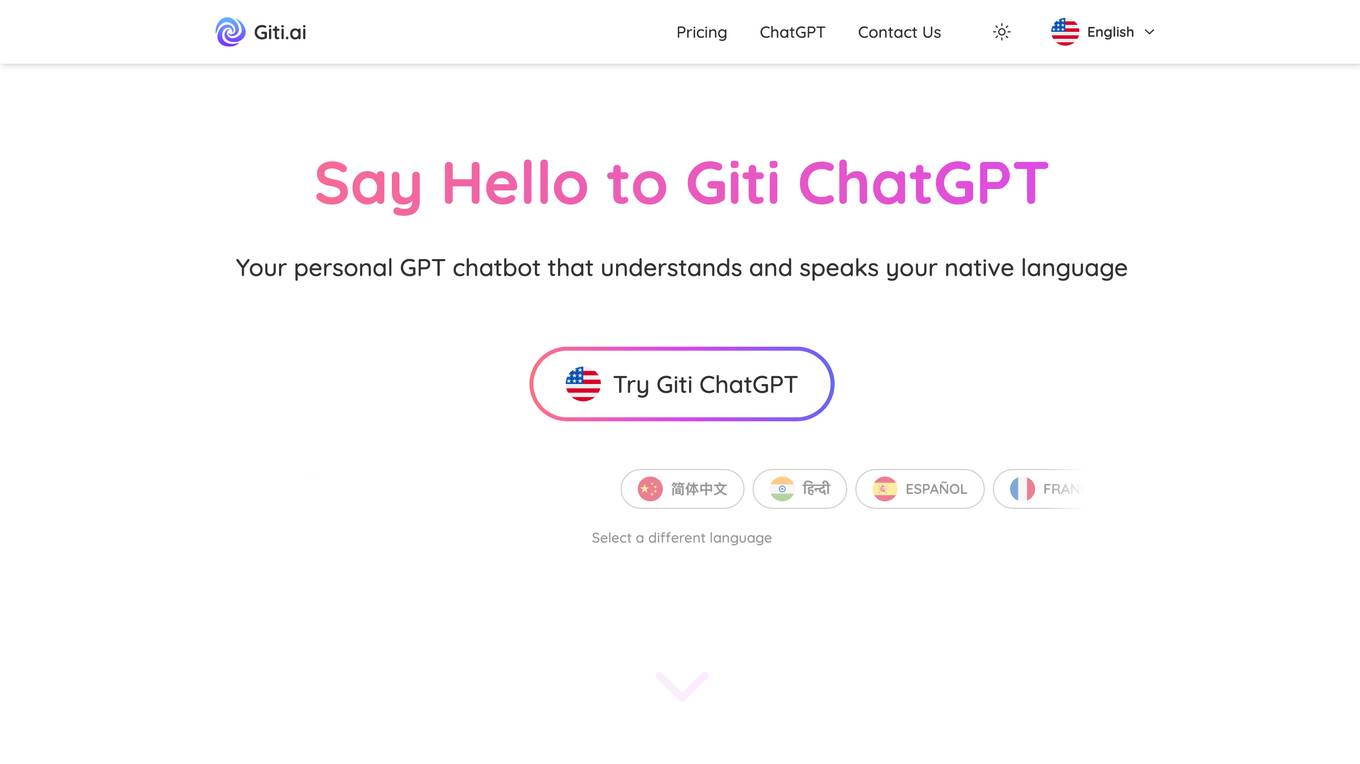
Giti Multilingual ChatGPT
Giti Multilingual ChatGPT is an AI-powered chatbot application that offers multilingual support and advanced natural language processing capabilities. It is designed to understand and speak multiple languages, generate text that mimics human writing, and assist users with various tasks such as content rephrasing, article writing, SEO keyword generation, and more. With a user-friendly interface and affordable pricing plans, Giti ChatGPT aims to provide a seamless and efficient chatbot experience for individuals and businesses alike.
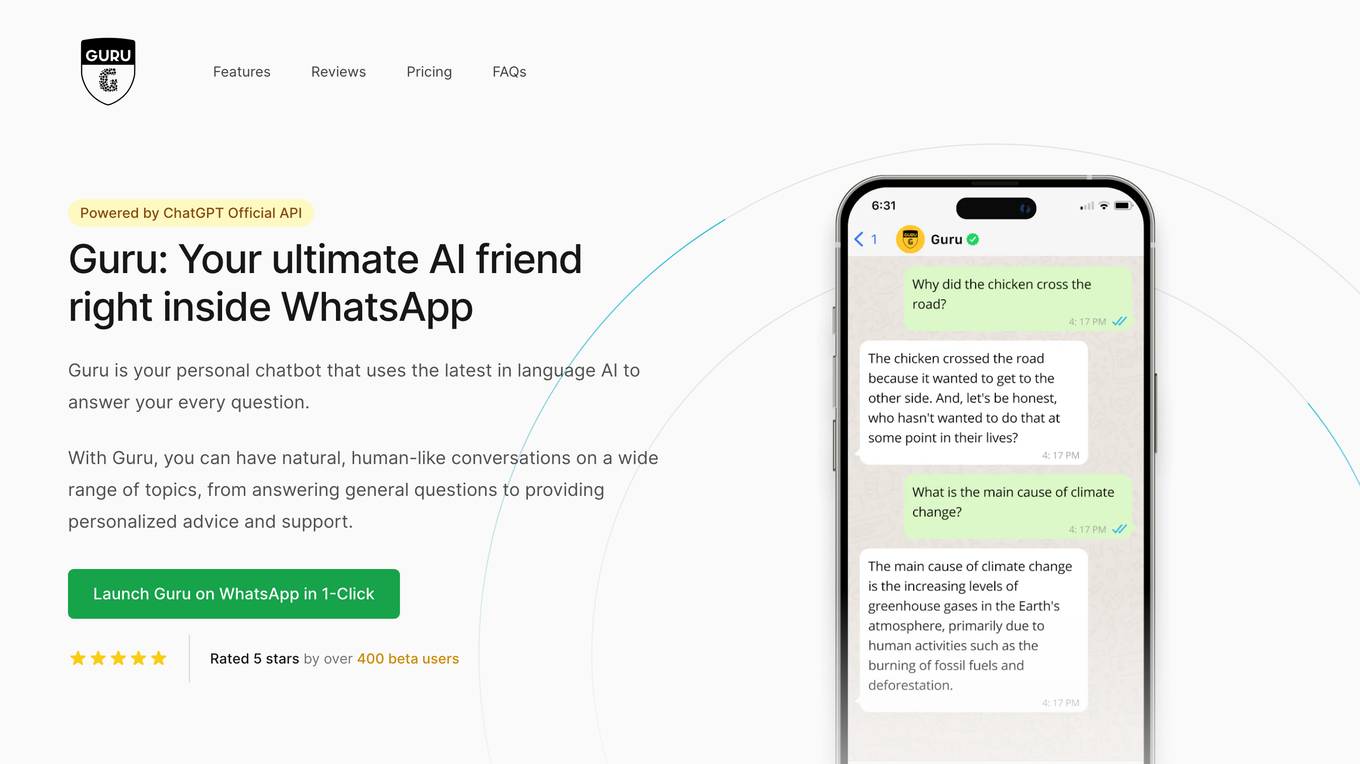
Guru
Guru is an AI-powered chatbot that can be accessed through WhatsApp. It is designed to answer questions, provide information, and help users with a variety of tasks. Guru is built on top of the official API of ChatGPT, which gives it the ability to understand the context of conversations and respond in a natural and human-like way. Guru is secure and easy to use, and it is available 24/7.
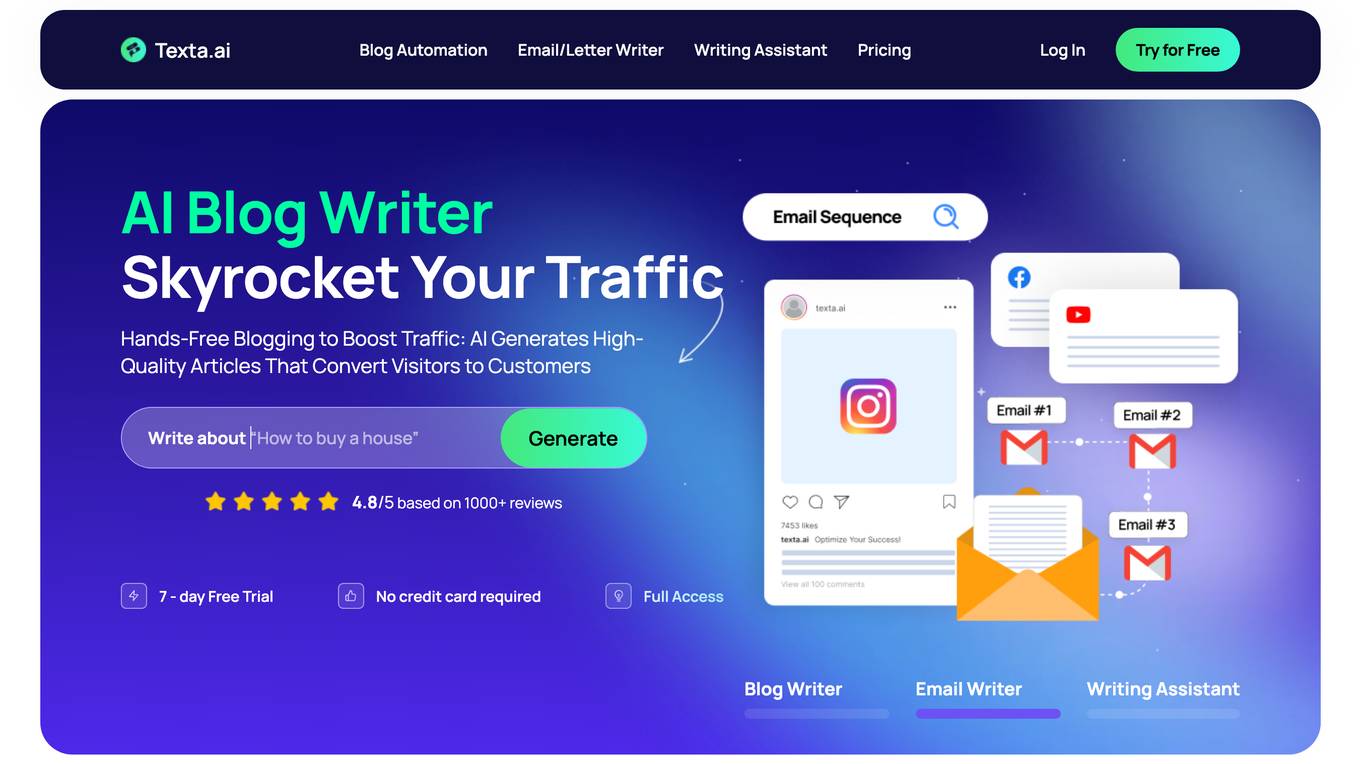
Texta
Texta is an AI-powered blog writing tool that helps users create high-quality, SEO-optimized content. It offers a range of features, including automated blog generation and posting, smart linking, keyword research, and seamless integration with popular website builders. Texta is designed to help users streamline their content creation process, boost their SEO rankings, and enhance reader engagement.
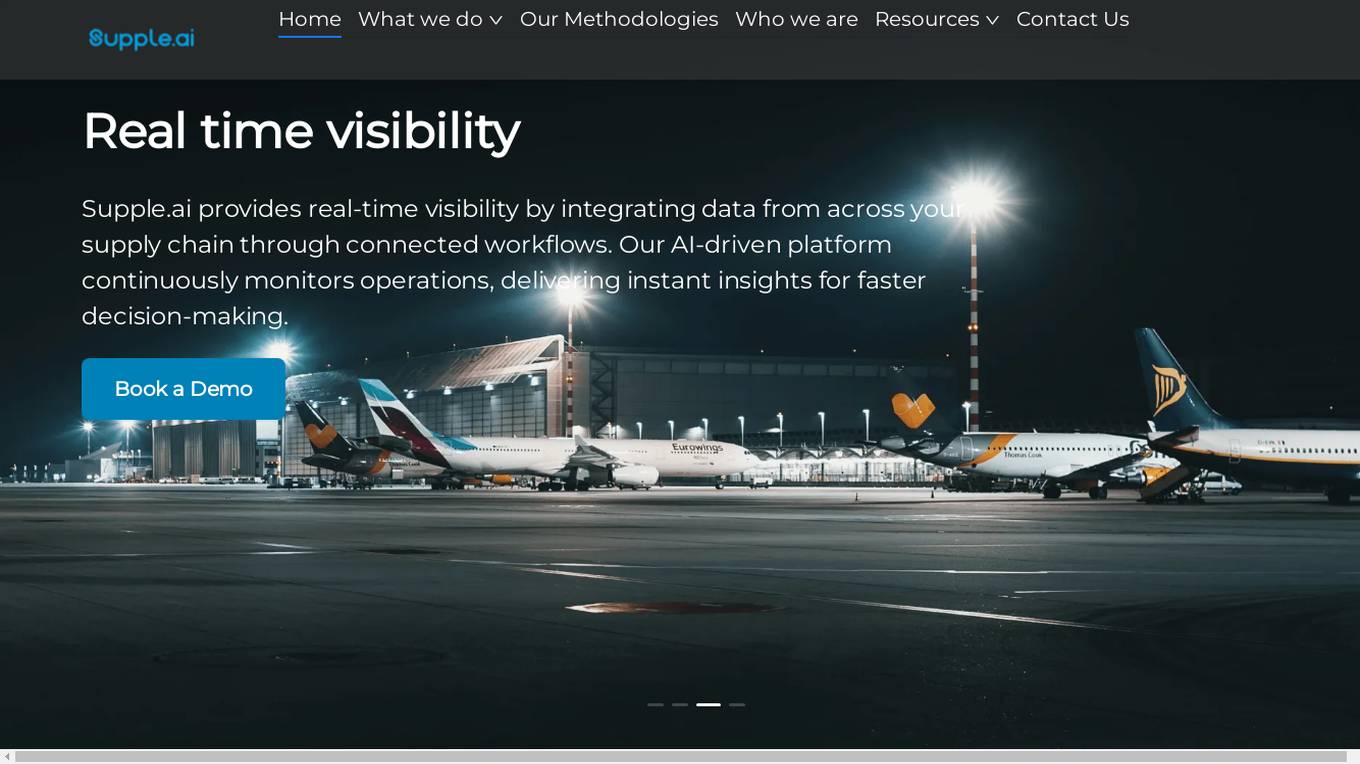
Supple.ai
Supple.ai is an AI-powered content generation tool that helps users create high-quality written content quickly and efficiently. By leveraging advanced natural language processing algorithms, Supple.ai can generate articles, blog posts, product descriptions, and more in a matter of minutes. The tool is designed to assist content creators, marketers, and businesses in streamlining their content creation process and improving productivity.
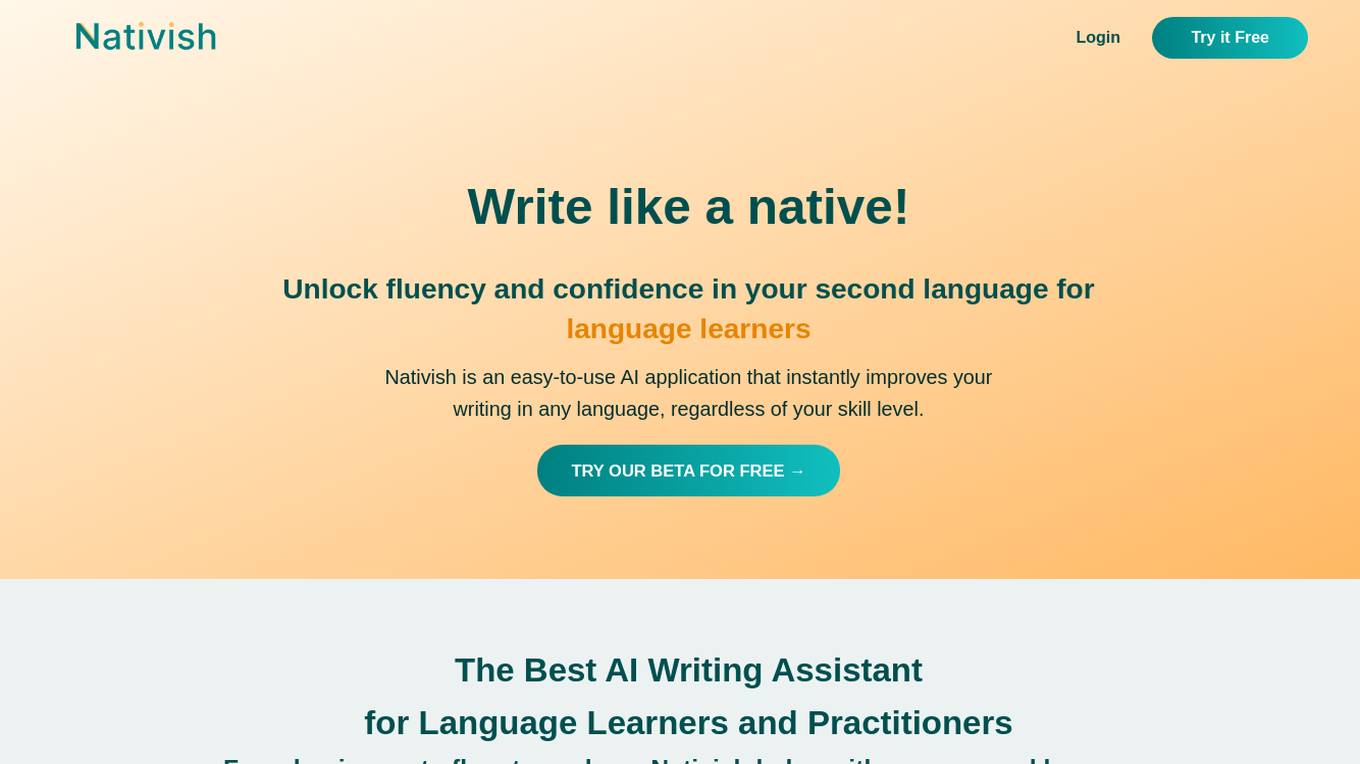
Nativish
Nativish is an AI-powered writing tool that enables users to produce content in any language at a native-level proficiency. The application leverages advanced natural language processing algorithms to assist users in crafting high-quality written material effortlessly. With Nativish, language barriers are overcome, and users can create compelling and authentic content in multiple languages with ease.
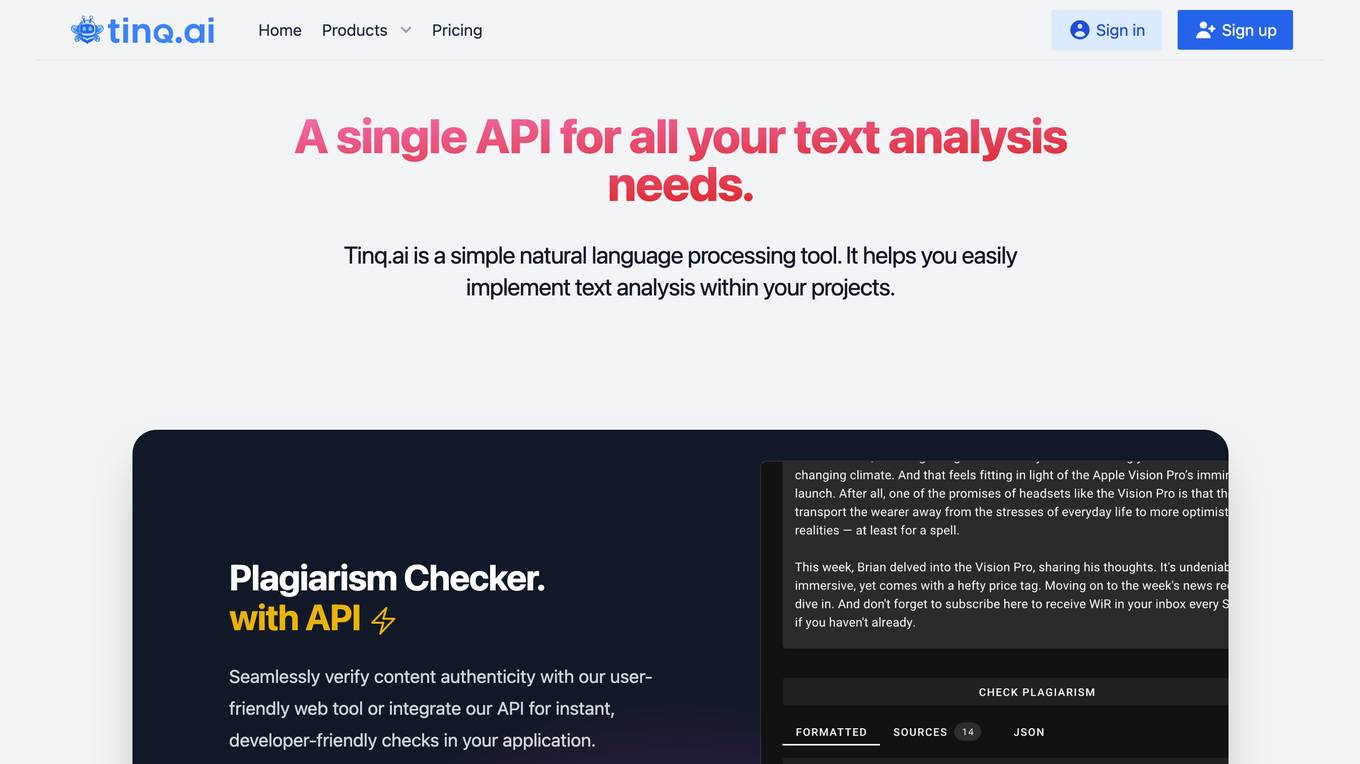
Tinq.ai
Tinq.ai is a natural language processing (NLP) tool that provides a range of text analysis capabilities through its API. It offers tools for tasks such as plagiarism checking, text summarization, sentiment analysis, named entity recognition, and article extraction. Tinq.ai's API can be integrated into applications to add NLP functionality, such as content moderation, sentiment analysis, and text rewriting.
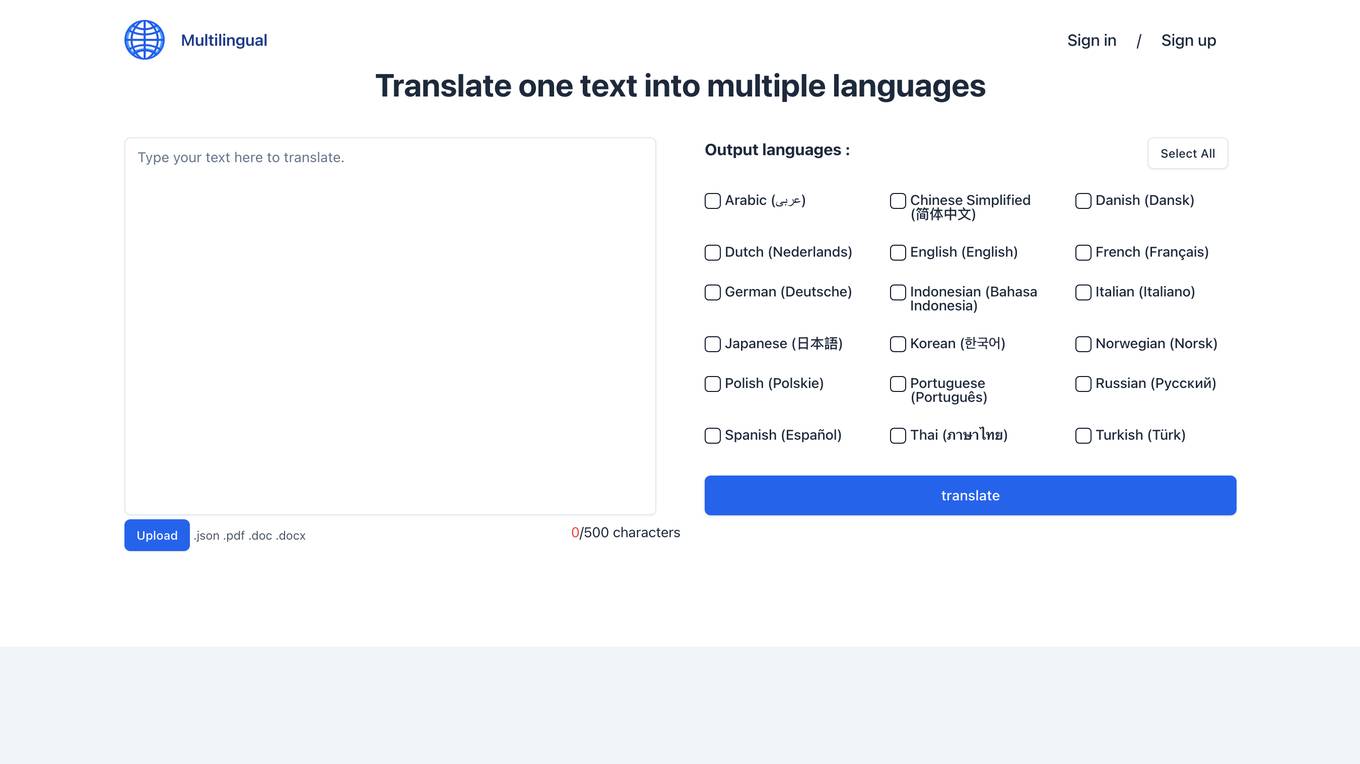
Multilingual.top
Multilingual.top is an advanced translation platform that enables users to translate text into multiple languages at once. It leverages artificial intelligence, specifically OpenAI's technology, to provide accurate and authentic translations. With Multilingual.top, users can break away from the traditional one-to-one translation limits and get multilingual results in one go, saving time and effort. The platform supports a wide range of languages, including Arabic, Chinese, Danish, Dutch, English, French, German, Indonesian, Italian, Japanese, Korean, Norwegian, Polish, Portuguese, Russian, Spanish, Thai, Turkish, and more. Multilingual.top offers a free translation service with some limits to prevent misuse and ensure everyone has fair access. Users can also upload documents in JSON, PDF, DOCX, and DOC formats for translation, making it especially useful for office workers and professionals dealing with documentation. The platform is continuously updated to improve translation accuracy and target language breadth.
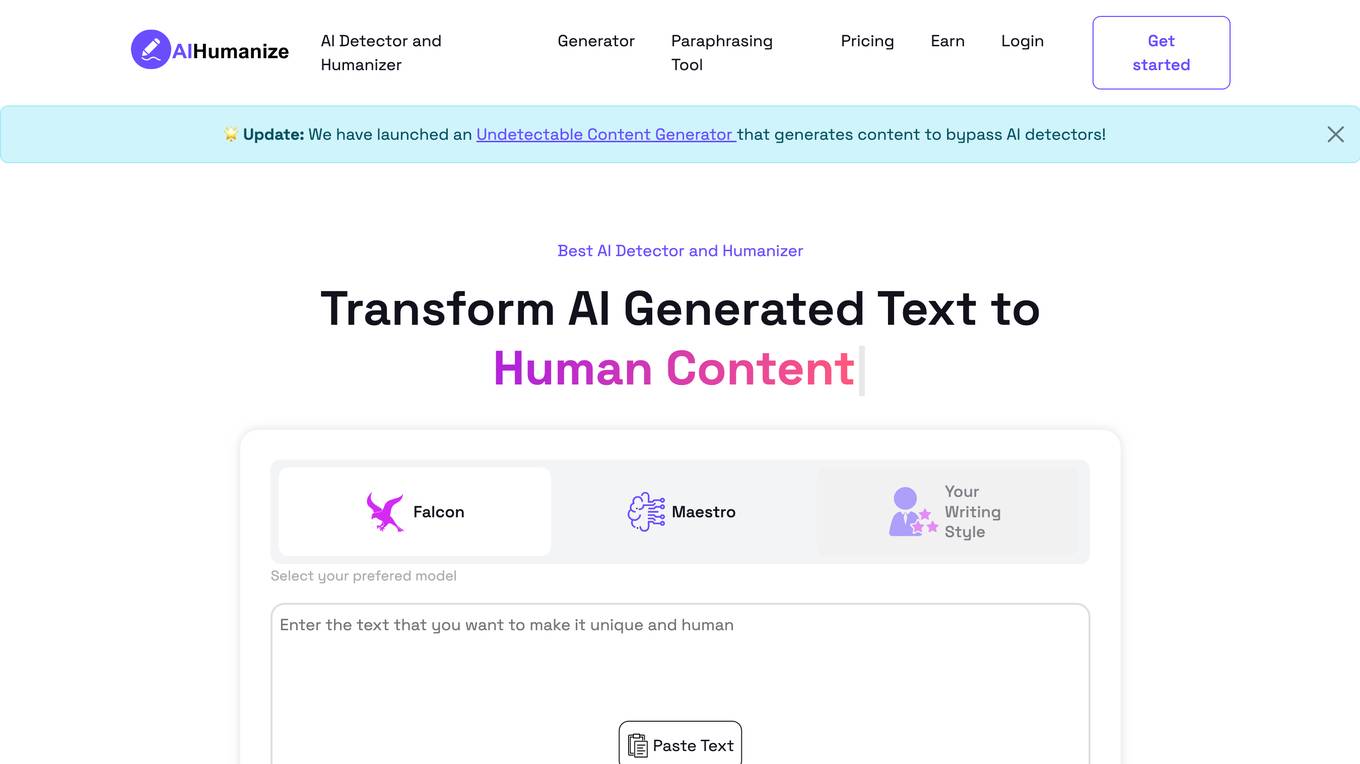
AI Humanize
AI Humanize is an advanced yet easy-to-use tool for writers and content creators. It helps users transform AI-generated text into natural, human-like content that bypasses AI detectors and enhances SEO rankings. The tool offers a range of features, including AI detection, humanization, SEO optimization, and error-free writing. AI Humanize is suitable for various users, including content creators, business professionals, marketing agencies, SEO specialists, academic professionals, web developers, and designers.
124 - Open Source Tools
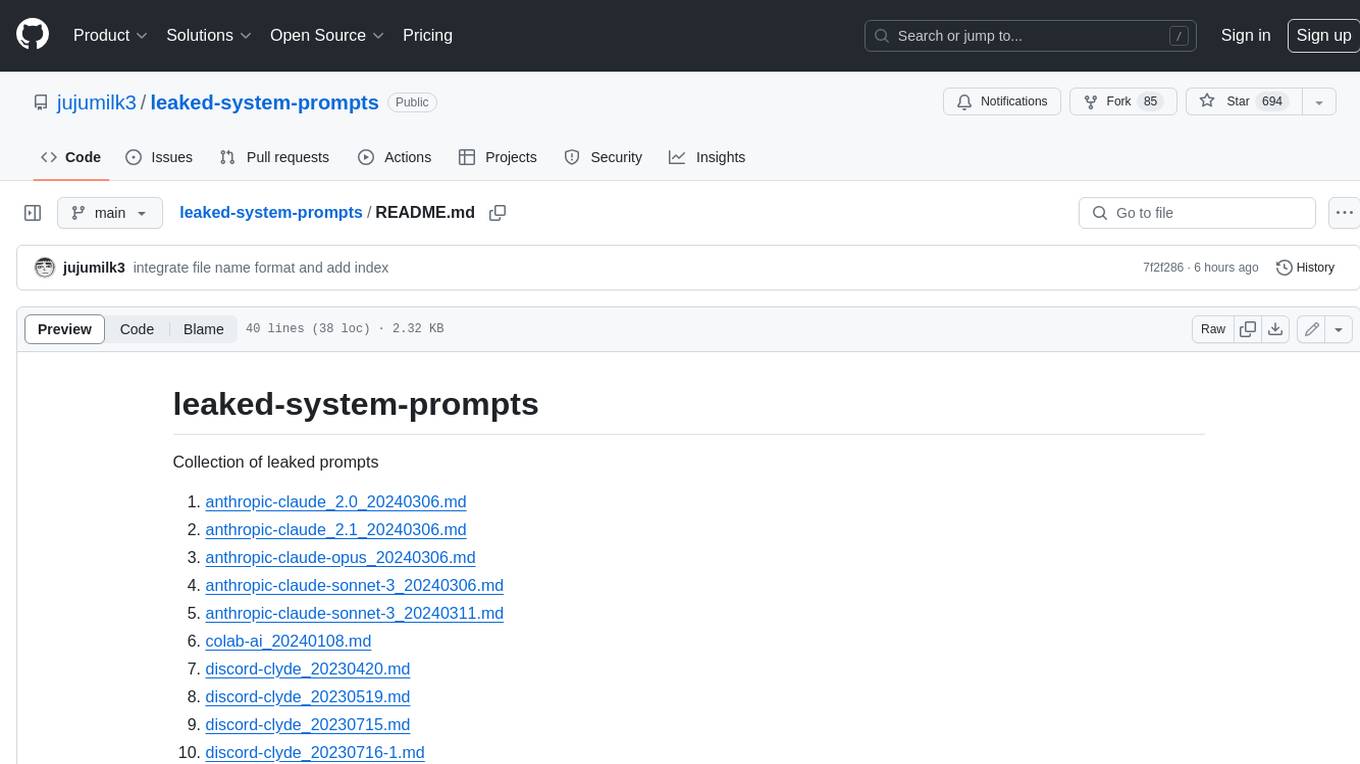
leaked-system-prompts
This repository contains a collection of leaked prompts for various AI systems, including Anthropic Claude, Discord Clyde, Google Gemini, Microsoft Bing Chat, OpenAI ChatGPT, and others. These prompts can be used to explore the capabilities and limitations of these AI systems and to gain insights into their inner workings.
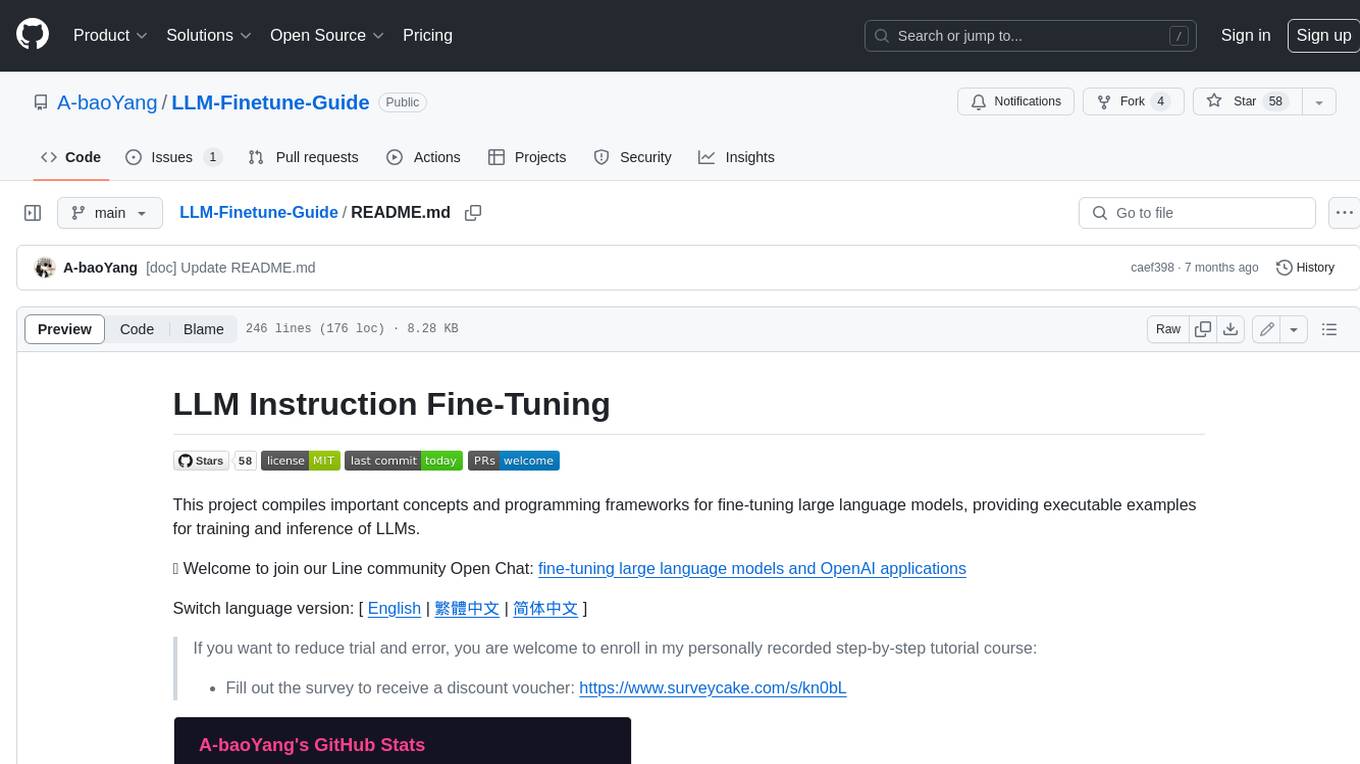
LLM-Finetune-Guide
This project provides a comprehensive guide to fine-tuning large language models (LLMs) with efficient methods like LoRA and P-tuning V2. It includes detailed instructions, code examples, and performance benchmarks for various LLMs and fine-tuning techniques. The guide also covers data preparation, evaluation, prediction, and running inference on CPU environments. By leveraging this guide, users can effectively fine-tune LLMs for specific tasks and applications.
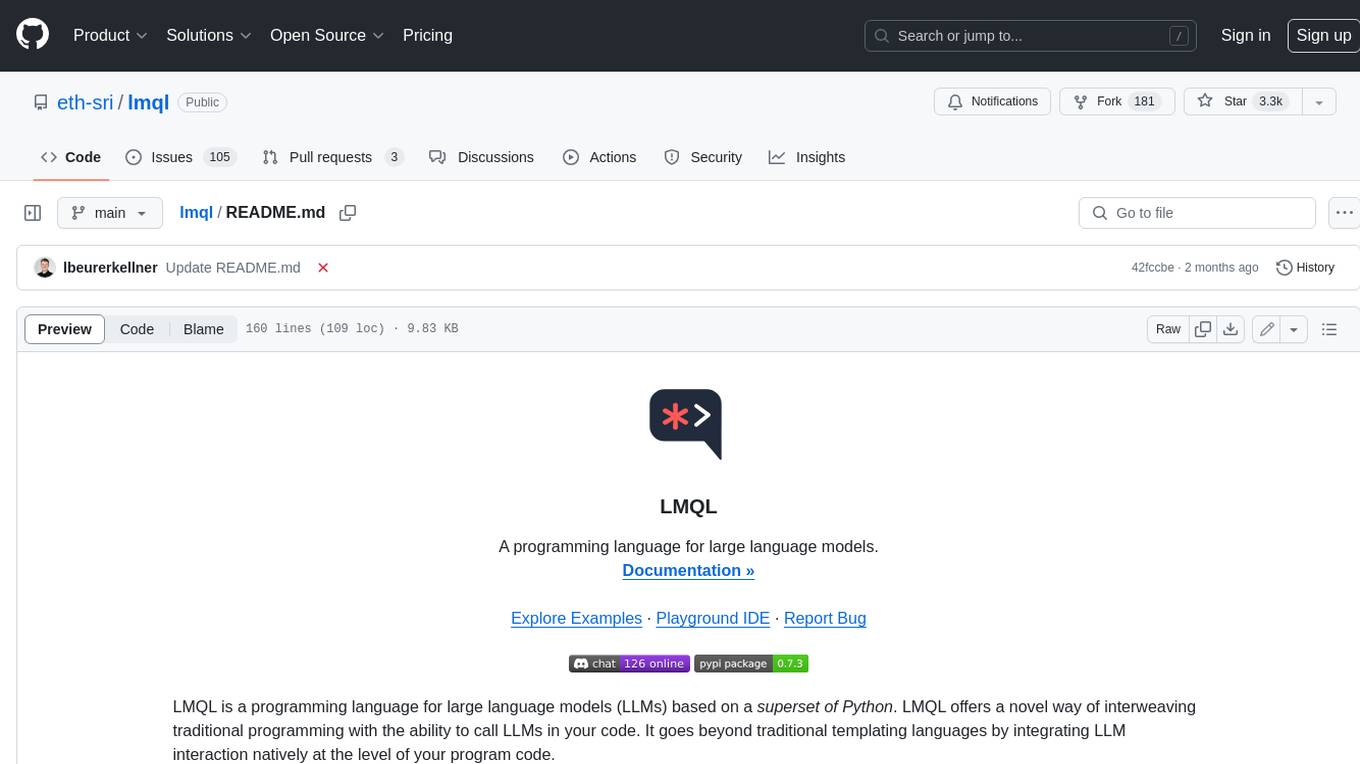
lmql
LMQL is a programming language designed for large language models (LLMs) that offers a unique way of integrating traditional programming with LLM interaction. It allows users to write programs that combine algorithmic logic with LLM calls, enabling model reasoning capabilities within the context of the program. LMQL provides features such as Python syntax integration, rich control-flow options, advanced decoding techniques, powerful constraints via logit masking, runtime optimization, sync and async API support, multi-model compatibility, and extensive applications like JSON decoding and interactive chat interfaces. The tool also offers library integration, flexible tooling, and output streaming options for easy model output handling.
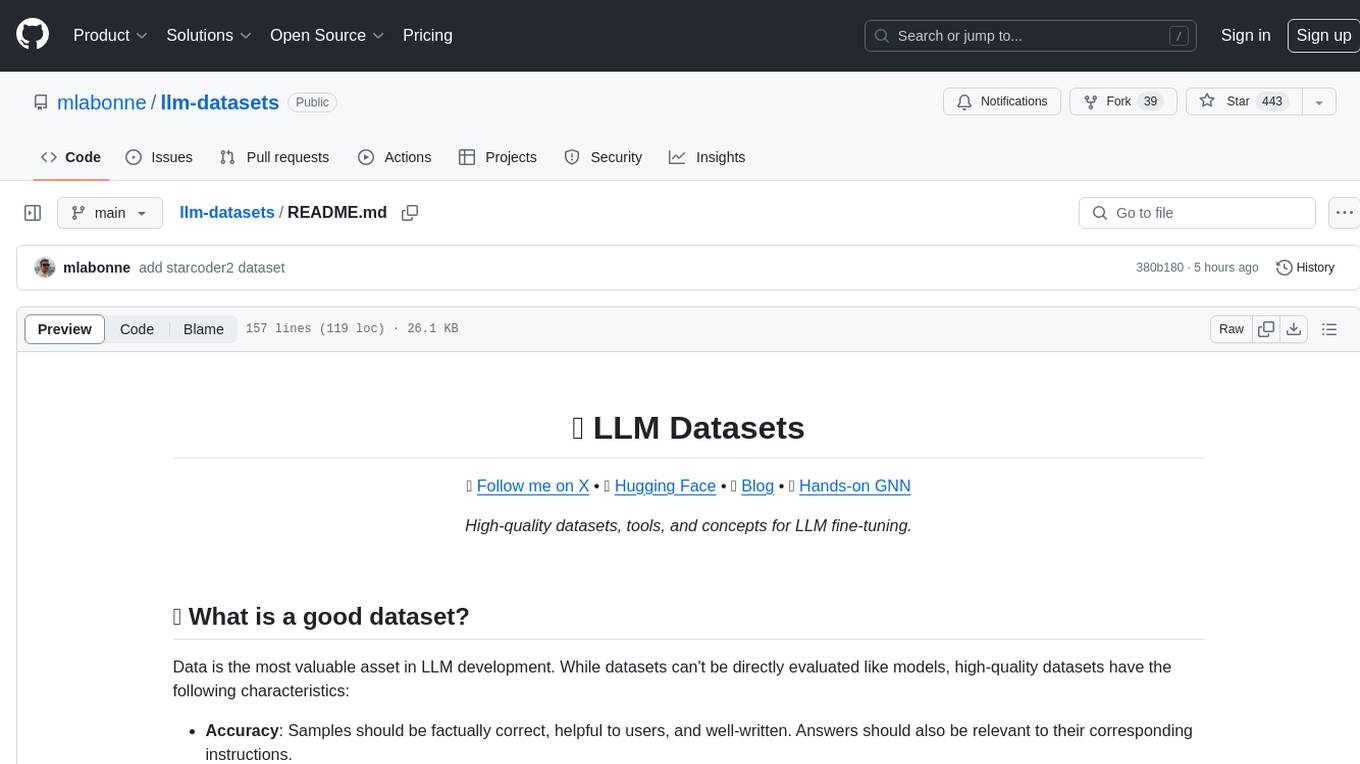
llm-datasets
LLM Datasets is a repository containing high-quality datasets, tools, and concepts for LLM fine-tuning. It provides datasets with characteristics like accuracy, diversity, and complexity to train large language models for various tasks. The repository includes datasets for general-purpose, math & logic, code, conversation & role-play, and agent & function calling domains. It also offers guidance on creating high-quality datasets through data deduplication, data quality assessment, data exploration, and data generation techniques.
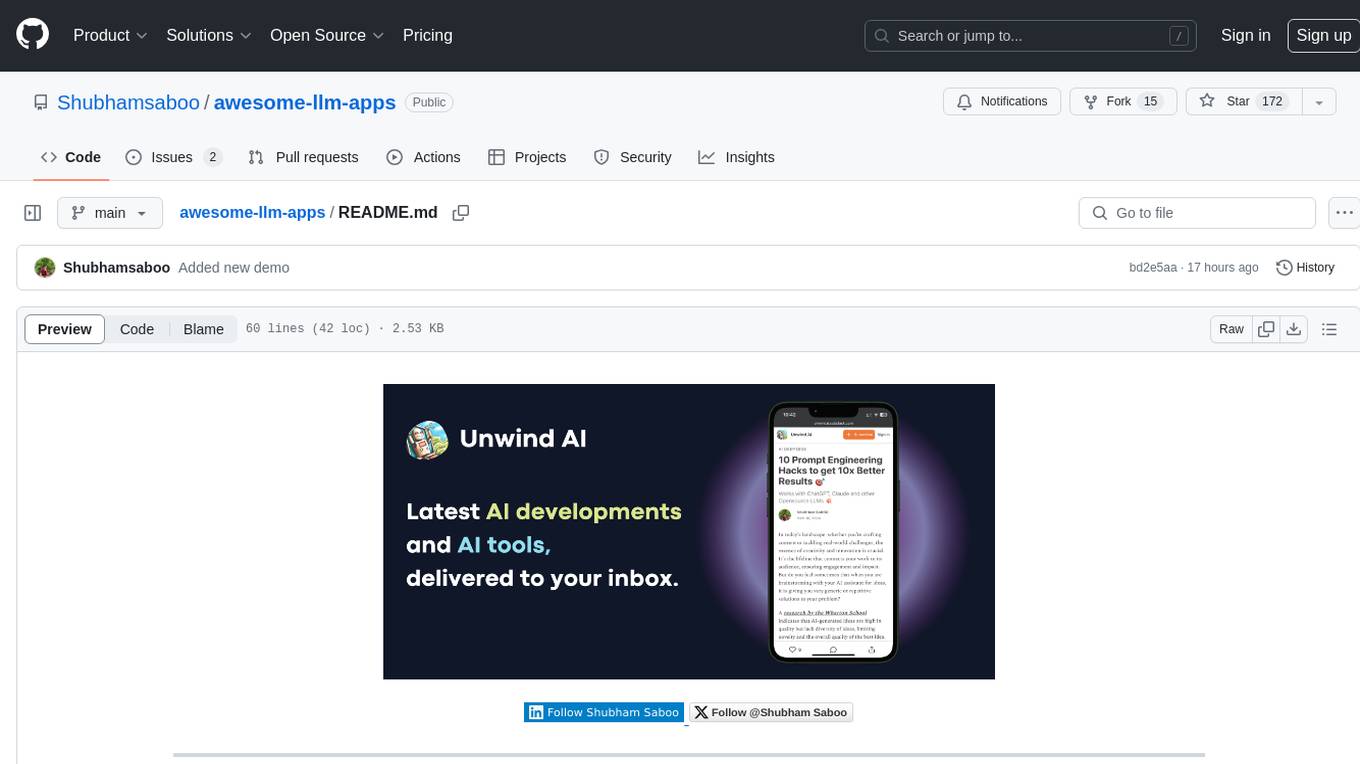
awesome-llm-apps
Awesome LLM Apps is a curated collection of applications that leverage RAG with OpenAI, Anthropic, Gemini, and open-source models. The repository contains projects such as Local Llama-3 with RAG for chatting with webpages locally, Chat with Gmail for interacting with Gmail using natural language, Chat with Substack Newsletter for conversing with Substack newsletters using GPT-4, Chat with PDF for intelligent conversation based on PDF documents, and Chat with YouTube Videos for engaging with YouTube video content through natural language. Users can clone the repository, navigate to specific project directories, install dependencies, and follow project-specific instructions to set up and run the apps. Contributions are encouraged, and new app ideas or improvements can be submitted via pull requests.
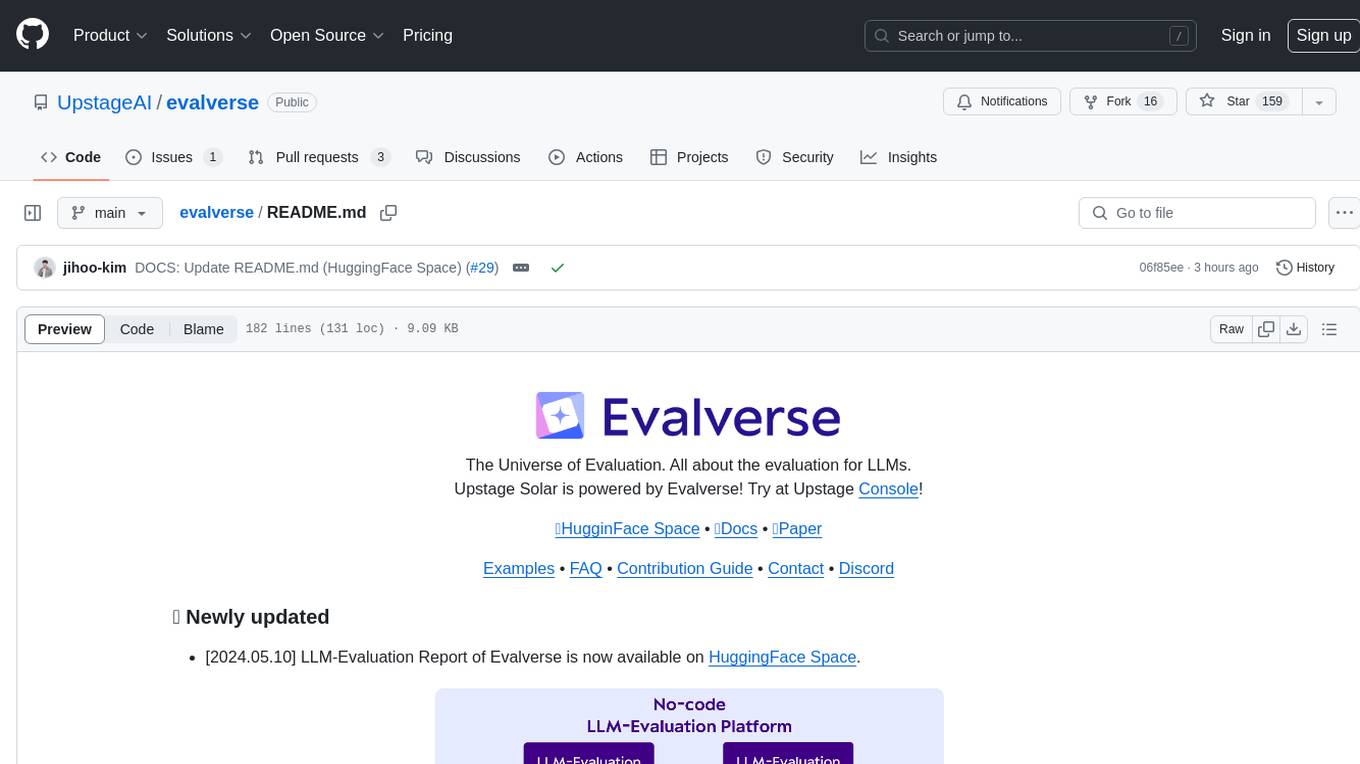
evalverse
Evalverse is an open-source project designed to support Large Language Model (LLM) evaluation needs. It provides a standardized and user-friendly solution for processing and managing LLM evaluations, catering to AI research engineers and scientists. Evalverse supports various evaluation methods, insightful reports, and no-code evaluation processes. Users can access unified evaluation with submodules, request evaluations without code via Slack bot, and obtain comprehensive reports with scores, rankings, and visuals. The tool allows for easy comparison of scores across different models and swift addition of new evaluation tools.

llms-tools
The 'llms-tools' repository is a comprehensive collection of AI tools, open-source projects, and research related to Large Language Models (LLMs) and Chatbots. It covers a wide range of topics such as AI in various domains, open-source models, chats & assistants, visual language models, evaluation tools, libraries, devices, income models, text-to-image, computer vision, audio & speech, code & math, games, robotics, typography, bio & med, military, climate, finance, and presentation. The repository provides valuable resources for researchers, developers, and enthusiasts interested in exploring the capabilities of LLMs and related technologies.
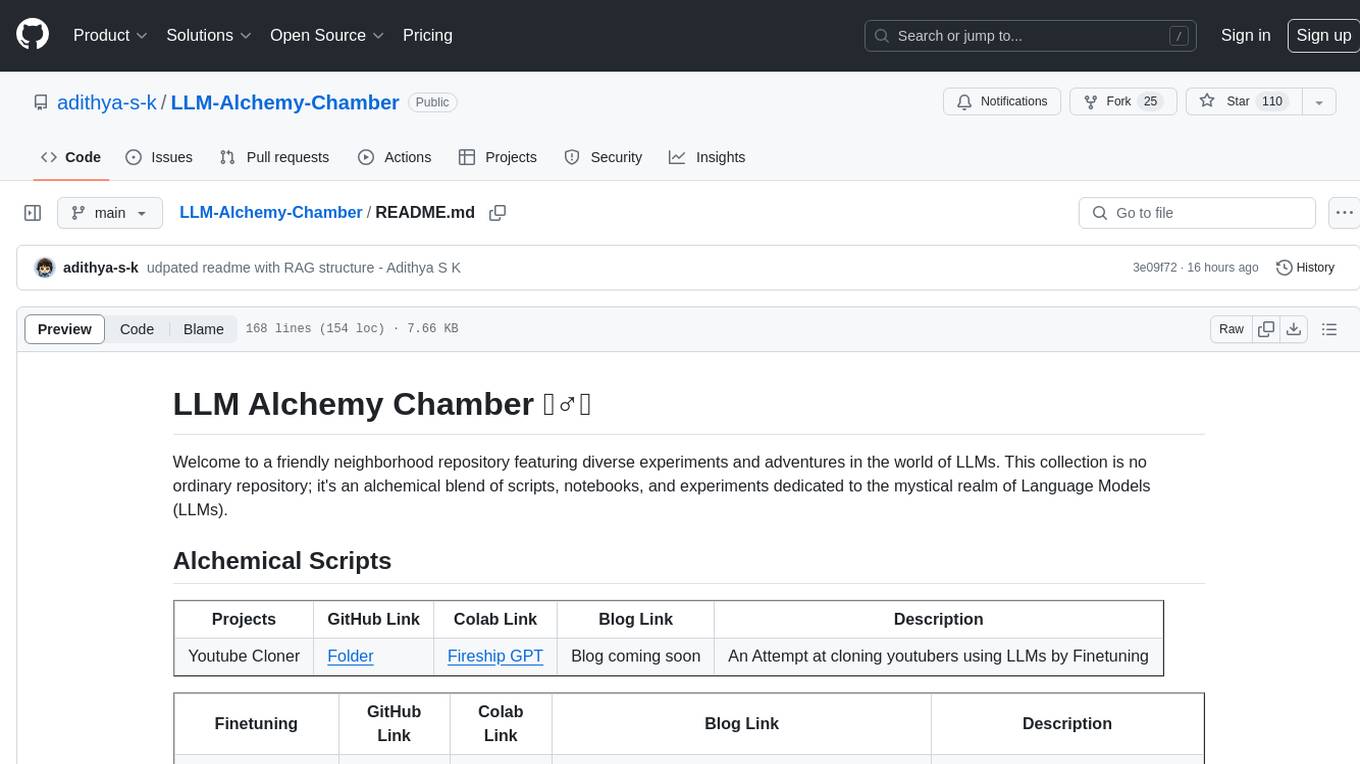
LLM-Alchemy-Chamber
LLM Alchemy Chamber is a repository dedicated to exploring the world of Language Models (LLMs) through various experiments and projects. It contains scripts, notebooks, and experiments focused on tasks such as fine-tuning different LLM models, quantization for performance optimization, dataset generation for instruction/QA tasks, and more. The repository offers a collection of resources for beginners and enthusiasts interested in delving into the mystical realm of LLMs.
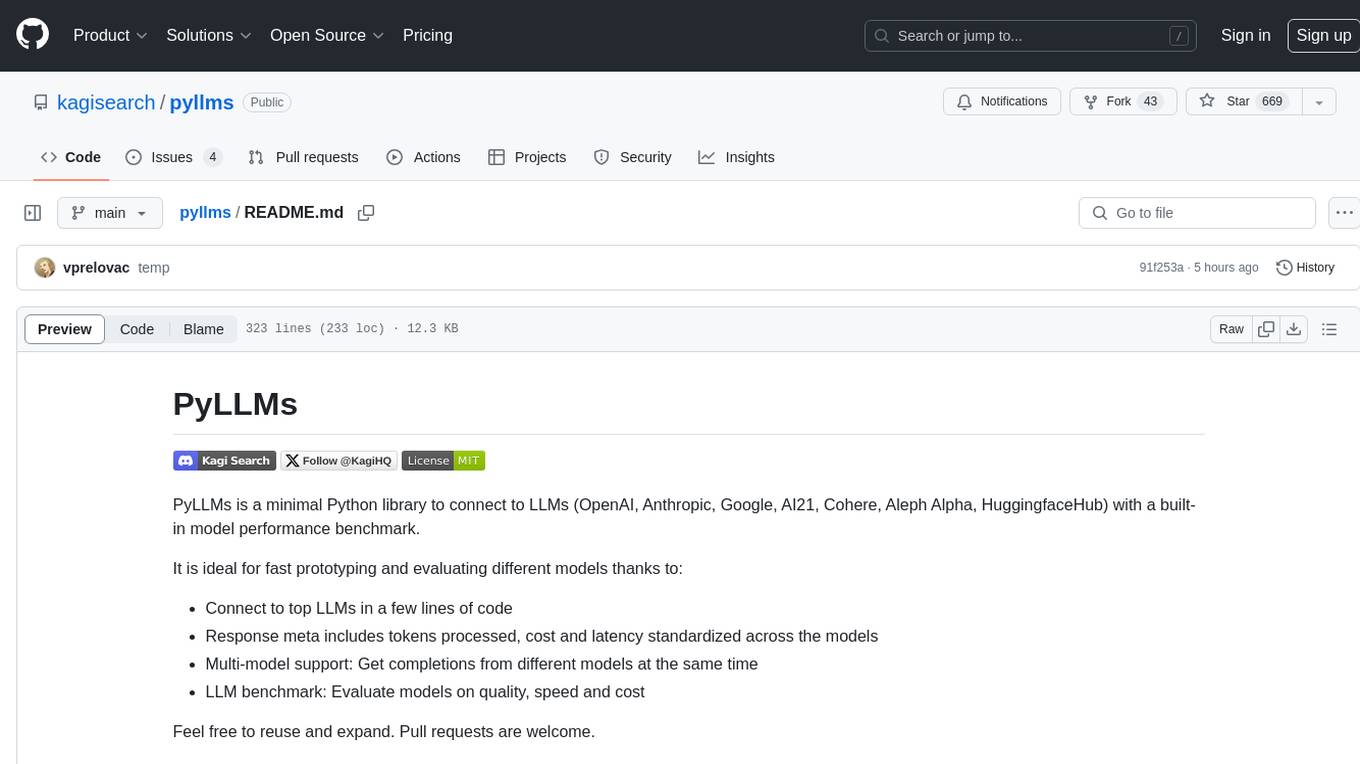
pyllms
PyLLMs is a minimal Python library designed to connect to various Language Model Models (LLMs) such as OpenAI, Anthropic, Google, AI21, Cohere, Aleph Alpha, and HuggingfaceHub. It provides a built-in model performance benchmark for fast prototyping and evaluating different models. Users can easily connect to top LLMs, get completions from multiple models simultaneously, and evaluate models on quality, speed, and cost. The library supports asynchronous completion, streaming from compatible models, and multi-model initialization for testing and comparison. Additionally, it offers features like passing chat history, system messages, counting tokens, and benchmarking models based on quality, speed, and cost.
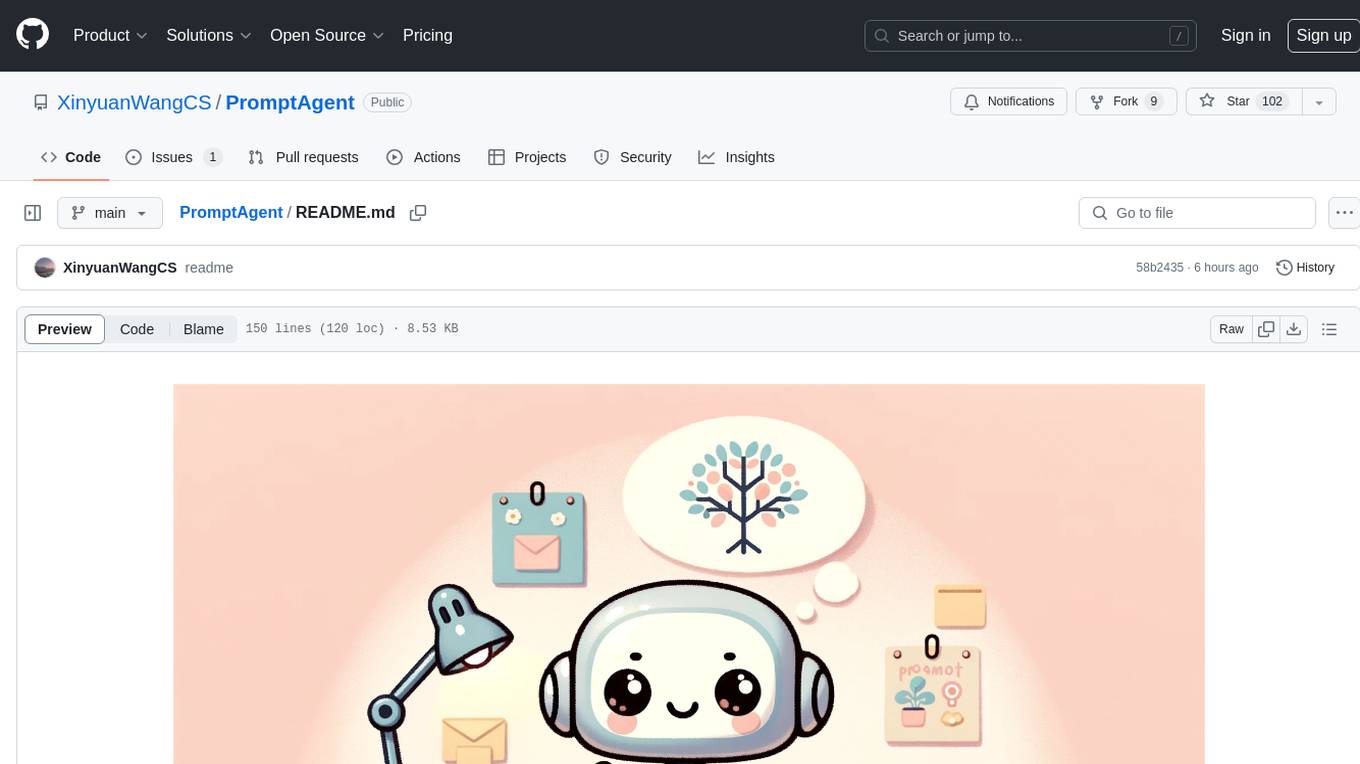
PromptAgent
PromptAgent is a repository for a novel automatic prompt optimization method that crafts expert-level prompts using language models. It provides a principled framework for prompt optimization by unifying prompt sampling and rewarding using MCTS algorithm. The tool supports different models like openai, palm, and huggingface models. Users can run PromptAgent to optimize prompts for specific tasks by strategically sampling model errors, generating error feedbacks, simulating future rewards, and searching for high-reward paths leading to expert prompts.
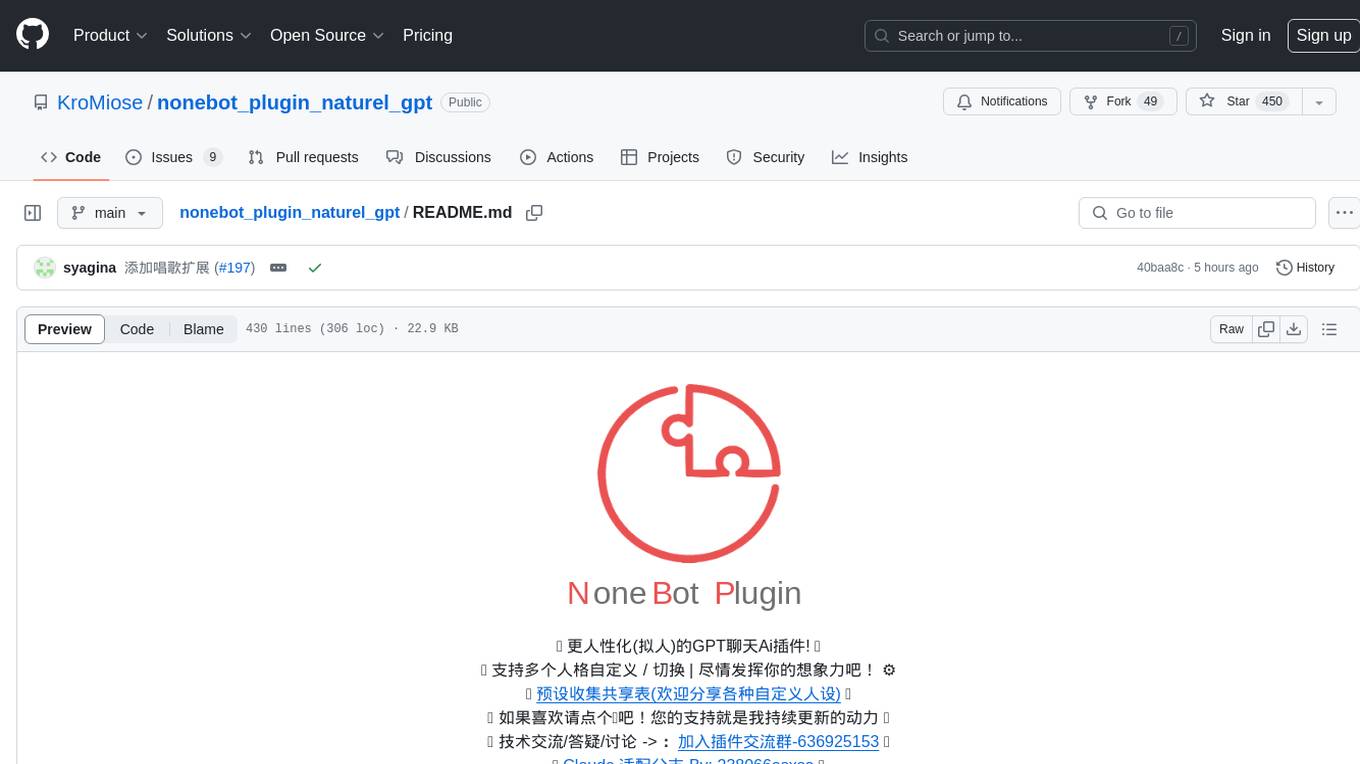
nonebot_plugin_naturel_gpt
NoneBotPluginNaturelGPT is a plugin for NoneBot that enhances the GPT chat AI with more human-like characteristics. It supports multiple customizable personalities, preset sharing, and various features to improve chat interactions. Users can create personalized chat experiences, enable context-aware conversations, and benefit from features like long-term memory, user-specific impressions, and data persistence. The plugin also allows for personality switching, custom trigger words, content blocking, and more. It offers extensive capabilities for enhancing chat interactions and enabling AI to actively participate in conversations.
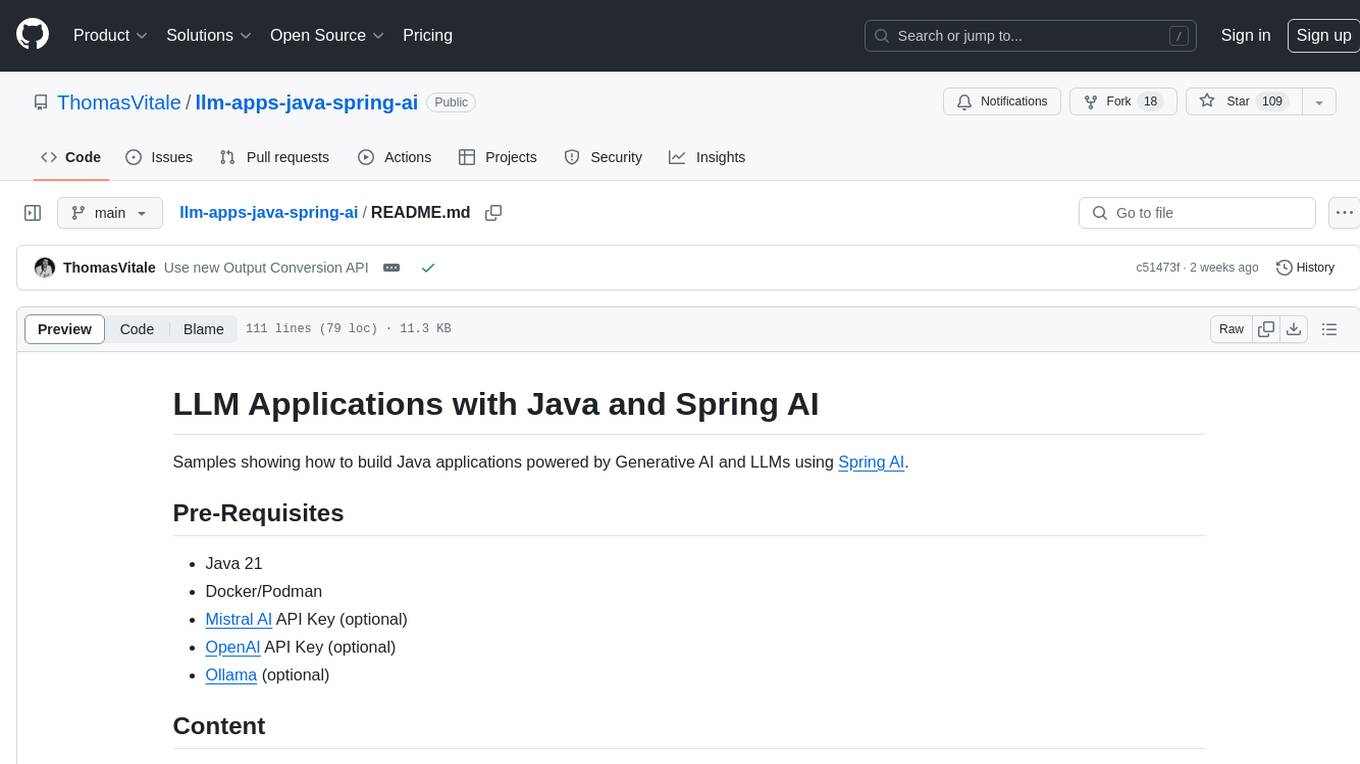
llm-apps-java-spring-ai
The 'LLM Applications with Java and Spring AI' repository provides samples demonstrating how to build Java applications powered by Generative AI and Large Language Models (LLMs) using Spring AI. It includes projects for question answering, chat completion models, prompts, templates, multimodality, output converters, embedding models, document ETL pipeline, function calling, image models, and audio models. The repository also lists prerequisites such as Java 21, Docker/Podman, Mistral AI API Key, OpenAI API Key, and Ollama. Users can explore various use cases and projects to leverage LLMs for text generation, vector transformation, document processing, and more.
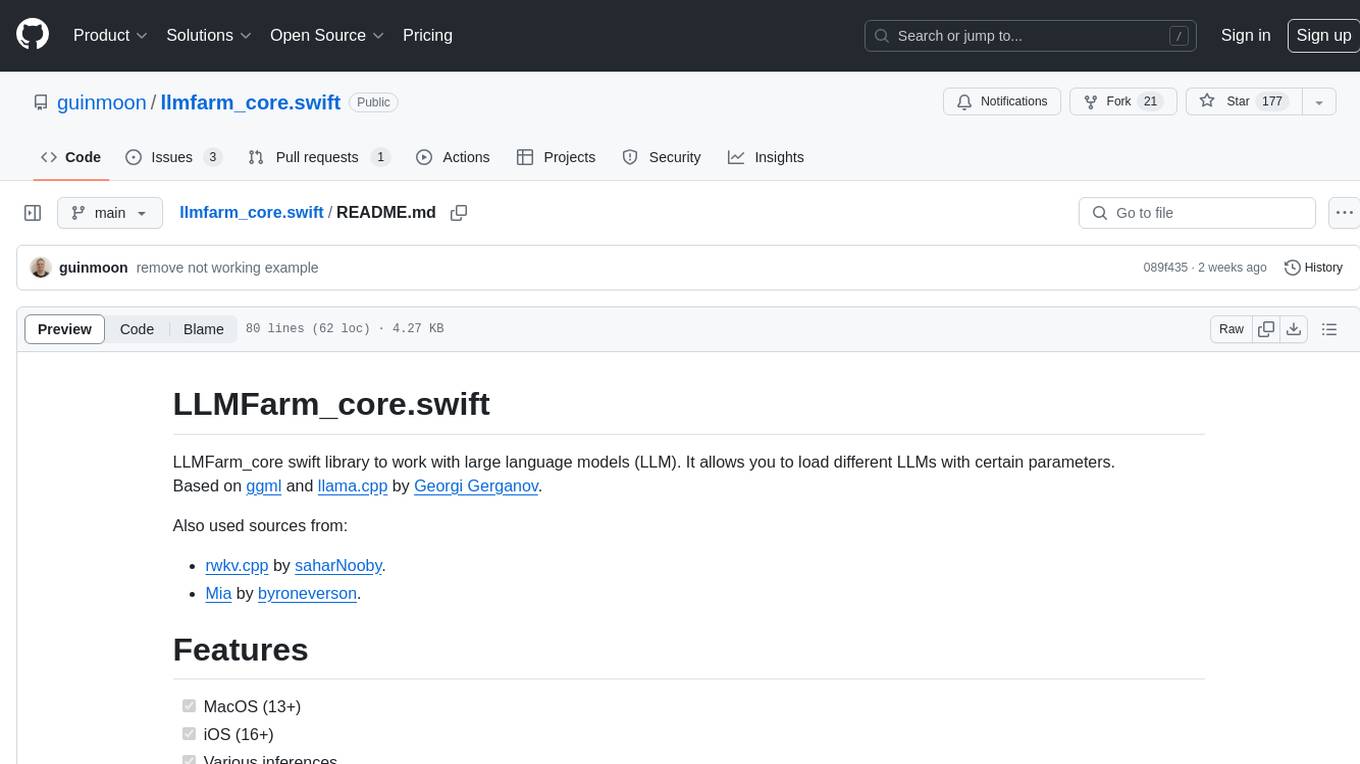
llmfarm_core.swift
LLMFarm_core.swift is a Swift library designed to work with large language models (LLM). It enables users to load different LLMs with specific parameters. The library supports MacOS (13+) and iOS (16+), offering various inferences and sampling methods. It includes features such as Metal support (not compatible with Intel Mac), model setting templates, LoRA adapters support, and LoRA train support. The library is based on ggml and llama.cpp by Georgi Gerganov, with additional sources from rwkv.cpp by saharNooby and Mia by byroneverson.
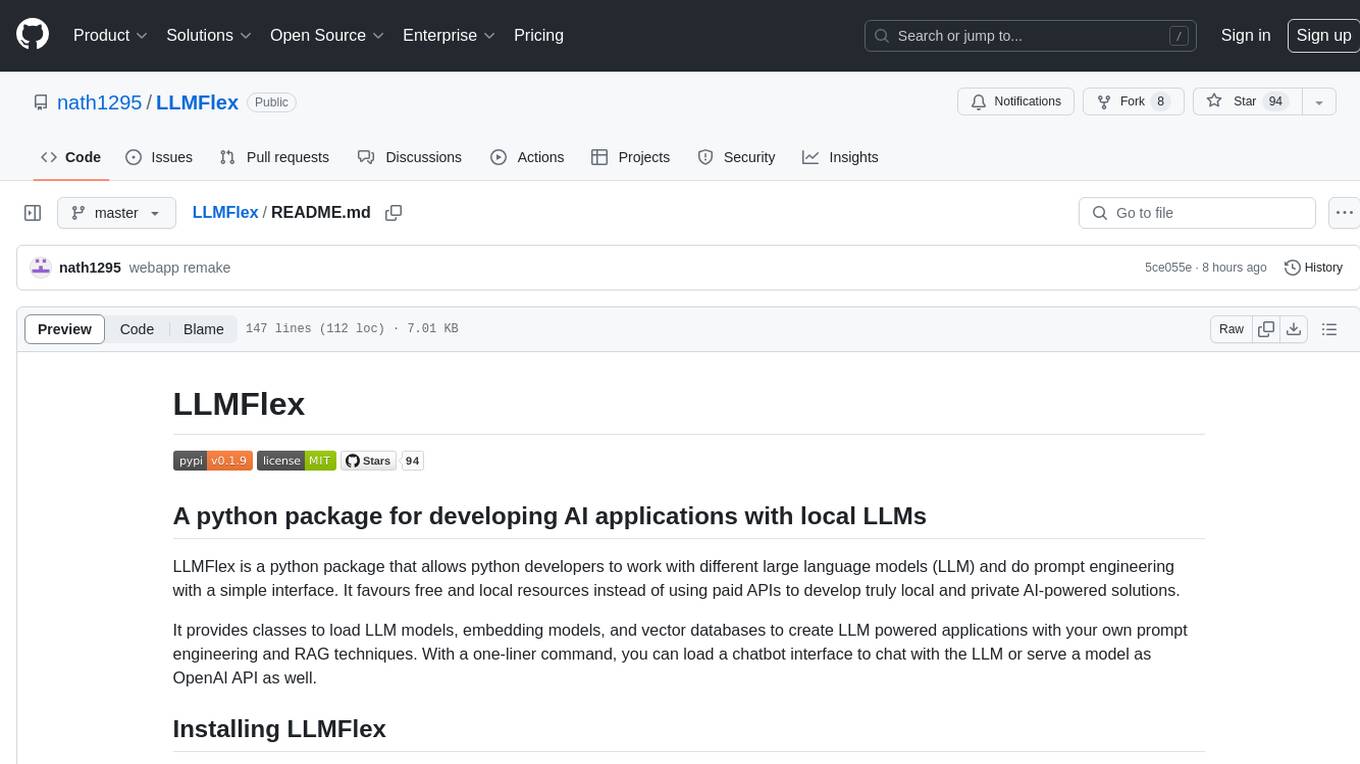
LLMFlex
LLMFlex is a python package designed for developing AI applications with local Large Language Models (LLMs). It provides classes to load LLM models, embedding models, and vector databases to create AI-powered solutions with prompt engineering and RAG techniques. The package supports multiple LLMs with different generation configurations, embedding toolkits, vector databases, chat memories, prompt templates, custom tools, and a chatbot frontend interface. Users can easily create LLMs, load embeddings toolkit, use tools, chat with models in a Streamlit web app, and serve an OpenAI API with a GGUF model. LLMFlex aims to offer a simple interface for developers to work with LLMs and build private AI solutions using local resources.
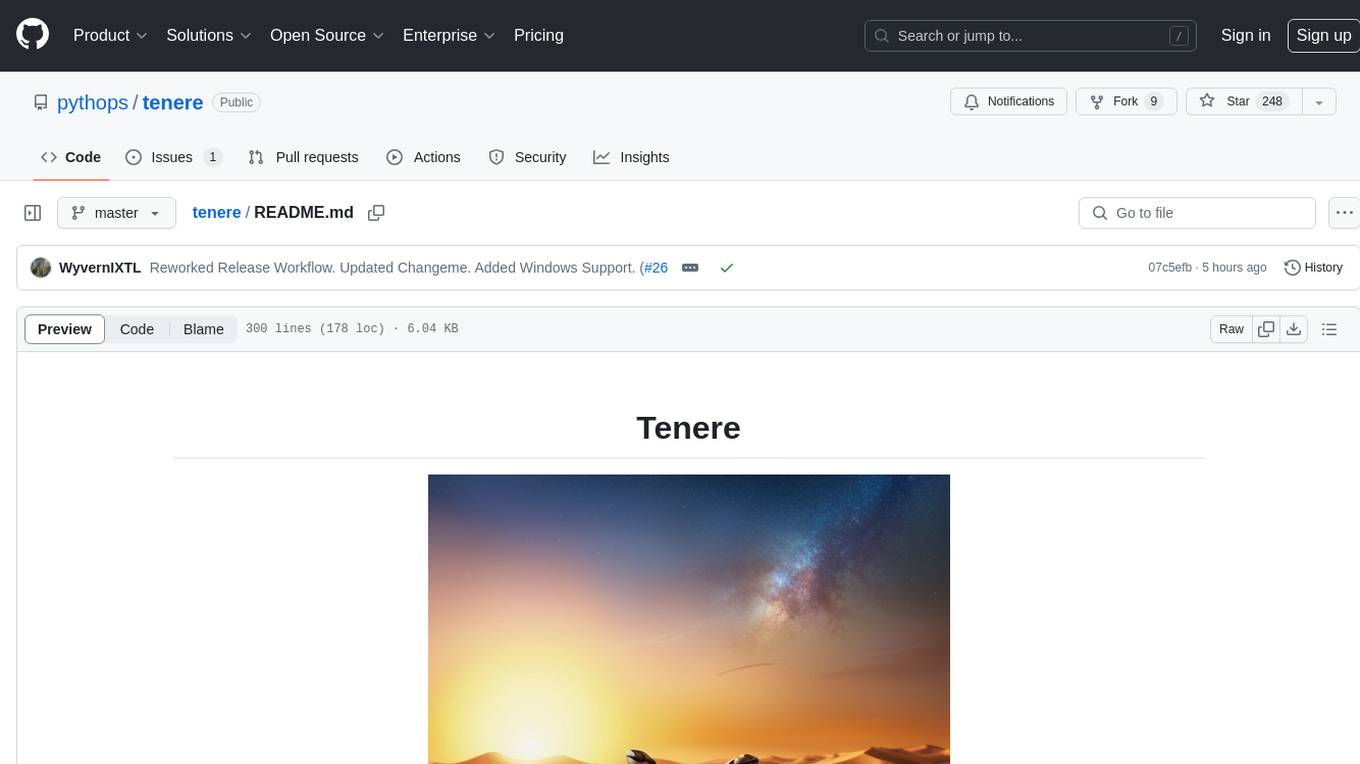
tenere
Tenere is a TUI interface for Language Model Libraries (LLMs) written in Rust. It provides syntax highlighting, chat history, saving chats to files, Vim keybindings, copying text from/to clipboard, and supports multiple backends. Users can configure Tenere using a TOML configuration file, set key bindings, and use different LLMs such as ChatGPT, llama.cpp, and ollama. Tenere offers default key bindings for global and prompt modes, with features like starting a new chat, saving chats, scrolling, showing chat history, and quitting the app. Users can interact with the prompt in different modes like Normal, Visual, and Insert, with various key bindings for navigation, editing, and text manipulation.
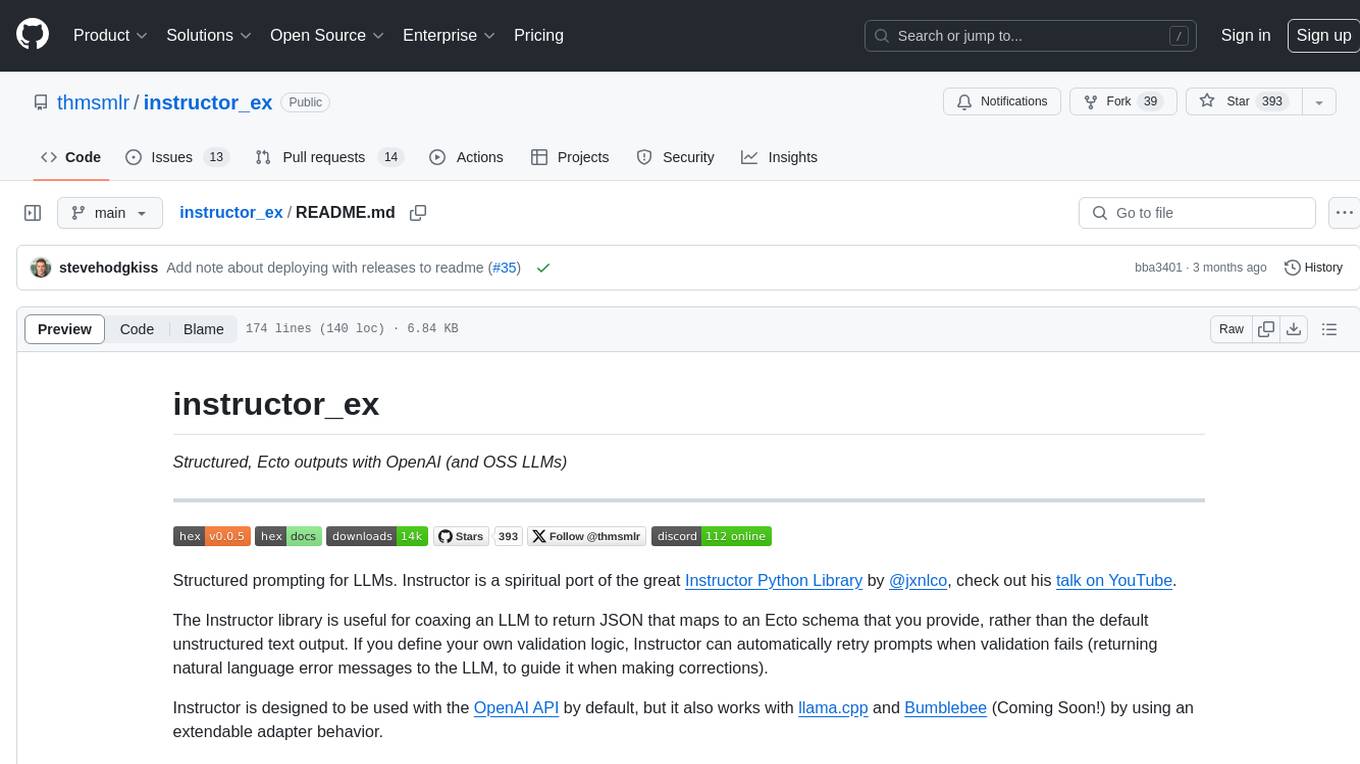
instructor_ex
Instructor is a tool designed to structure outputs from OpenAI and other OSS LLMs by coaxing them to return JSON that maps to a provided Ecto schema. It allows for defining validation logic to guide LLMs in making corrections, and supports automatic retries. Instructor is primarily used with the OpenAI API but can be extended to work with other platforms. The tool simplifies usage by creating an ecto schema, defining a validation function, and making calls to chat_completion with instructions for the LLM. It also offers features like max_retries to fix validation errors iteratively.
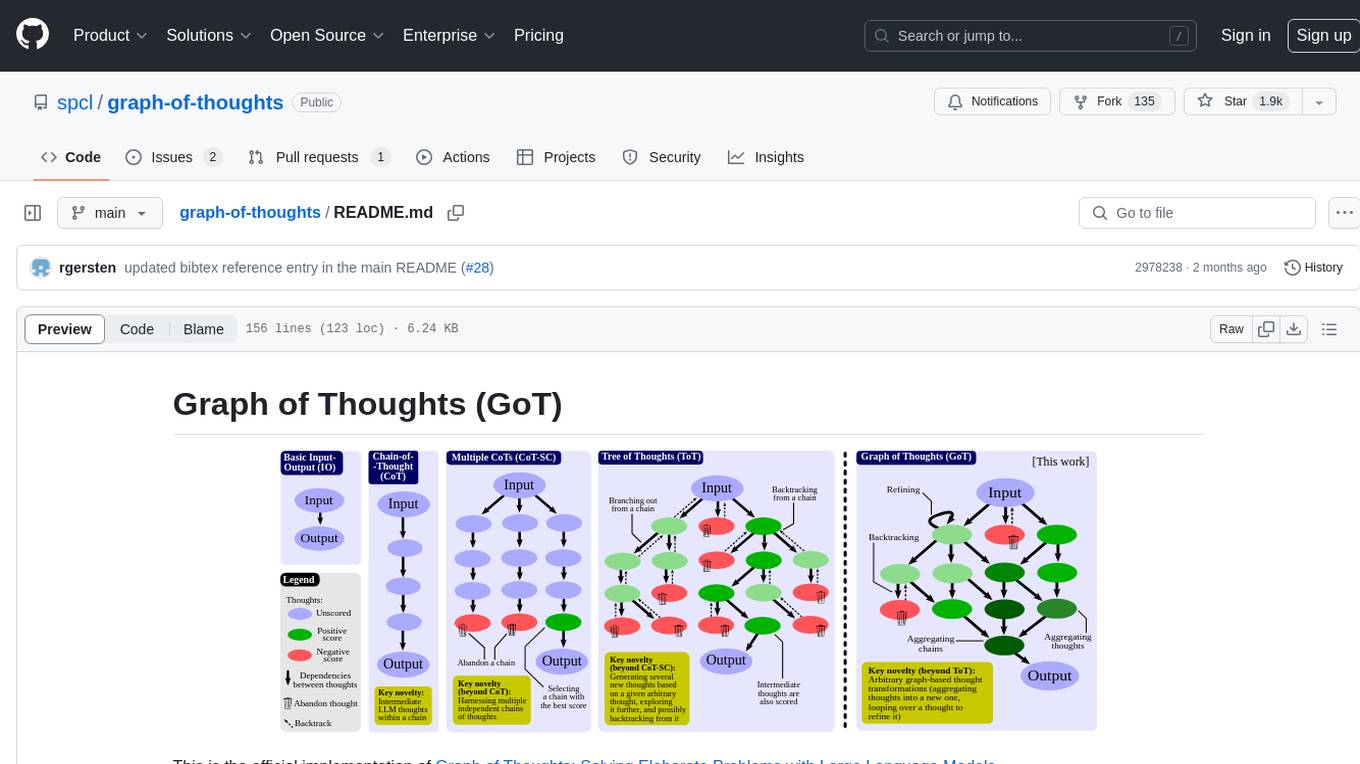
graph-of-thoughts
Graph of Thoughts (GoT) is an official implementation framework designed to solve complex problems by modeling them as a Graph of Operations (GoO) executed with a Large Language Model (LLM) engine. It offers flexibility to implement various approaches like CoT or ToT, allowing users to solve problems using the new GoT approach. The framework includes setup guides, quick start examples, documentation, and examples for users to understand and utilize the tool effectively.
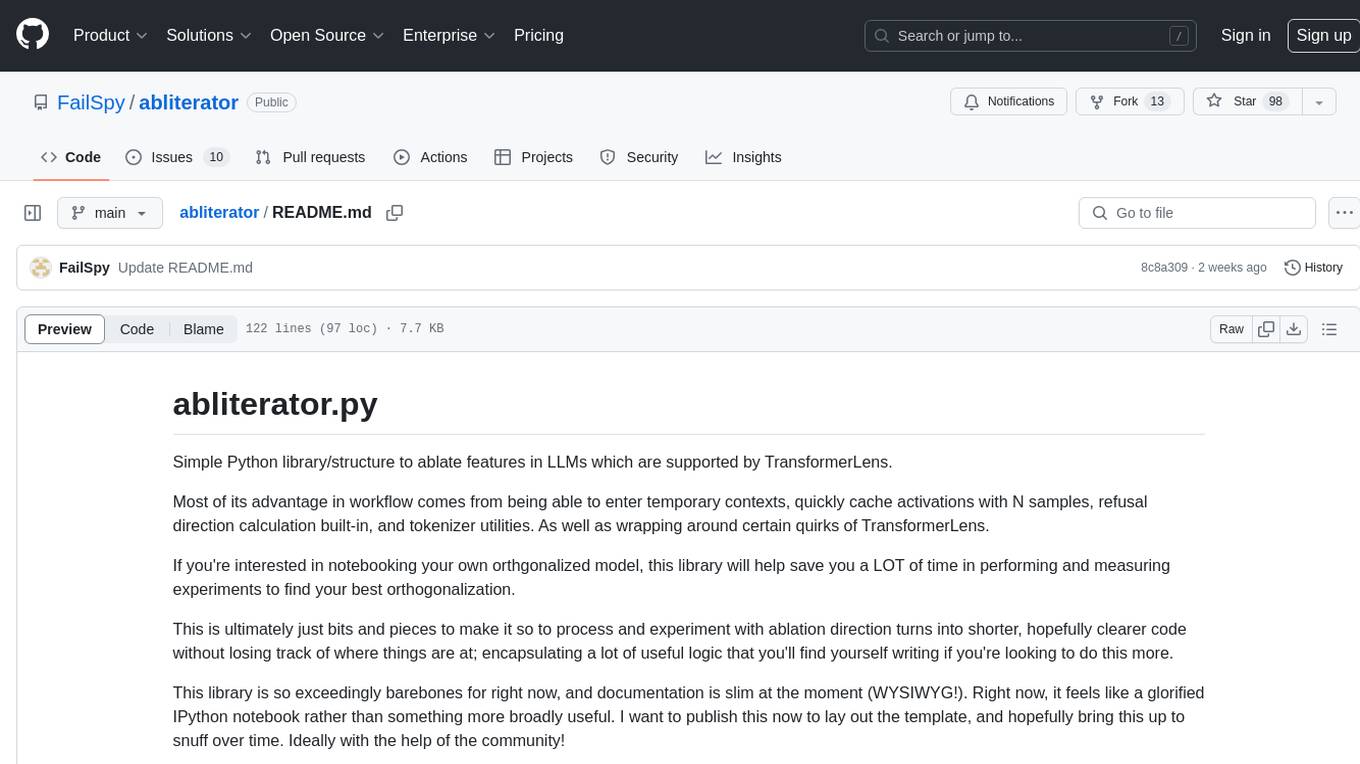
abliterator
abliterator.py is a simple Python library/structure designed to ablate features in large language models (LLMs) supported by TransformerLens. It provides capabilities to enter temporary contexts, cache activations with N samples, calculate refusal directions, and includes tokenizer utilities. The library aims to streamline the process of experimenting with ablation direction turns by encapsulating useful logic and minimizing code complexity. While currently basic and lacking comprehensive documentation, the library serves well for personal workflows and aims to expand beyond feature ablation to augmentation and additional features over time with community support.
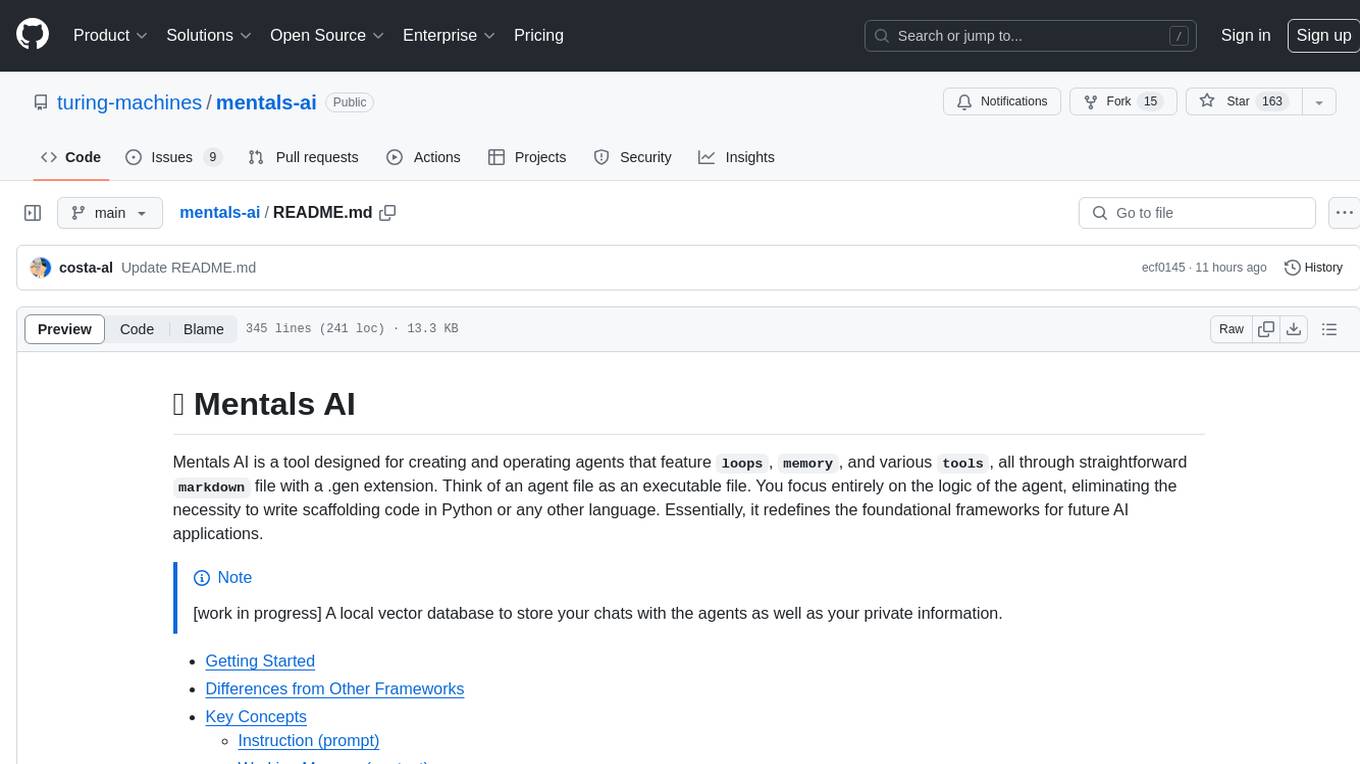
mentals-ai
Mentals AI is a tool designed for creating and operating agents that feature loops, memory, and various tools, all through straightforward markdown syntax. This tool enables you to concentrate solely on the agent’s logic, eliminating the necessity to compose underlying code in Python or any other language. It redefines the foundational frameworks for future AI applications by allowing the creation of agents with recursive decision-making processes, integration of reasoning frameworks, and control flow expressed in natural language. Key concepts include instructions with prompts and references, working memory for context, short-term memory for storing intermediate results, and control flow from strings to algorithms. The tool provides a set of native tools for message output, user input, file handling, Python interpreter, Bash commands, and short-term memory. The roadmap includes features like a web UI, vector database tools, agent's experience, and tools for image generation and browsing. The idea behind Mentals AI originated from studies on psychoanalysis executive functions and aims to integrate 'System 1' (cognitive executor) with 'System 2' (central executive) to create more sophisticated agents.
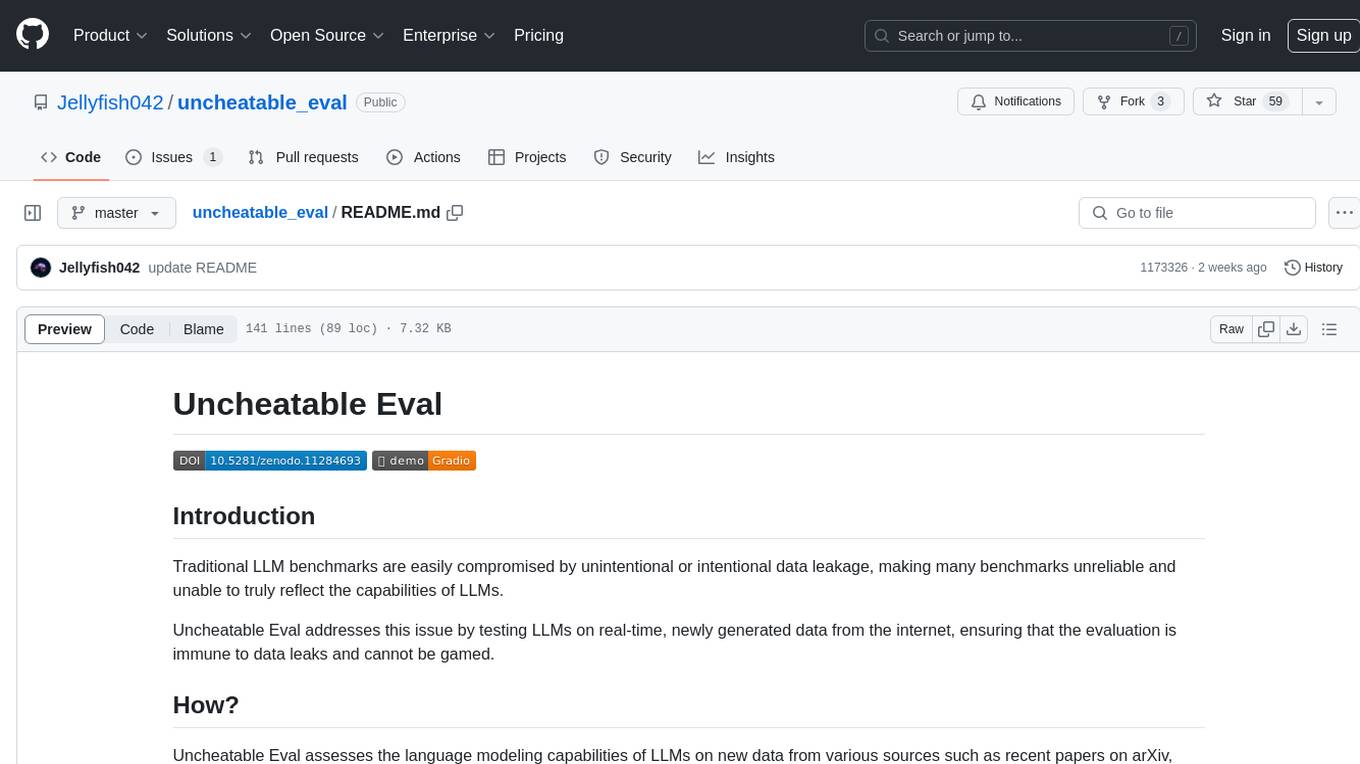
uncheatable_eval
Uncheatable Eval is a tool designed to assess the language modeling capabilities of LLMs on real-time, newly generated data from the internet. It aims to provide a reliable evaluation method that is immune to data leaks and cannot be gamed. The tool supports the evaluation of Hugging Face AutoModelForCausalLM models and RWKV models by calculating the sum of negative log probabilities on new texts from various sources such as recent papers on arXiv, new projects on GitHub, news articles, and more. Uncheatable Eval ensures that the evaluation data is not included in the training sets of publicly released models, thus offering a fair assessment of the models' performance.
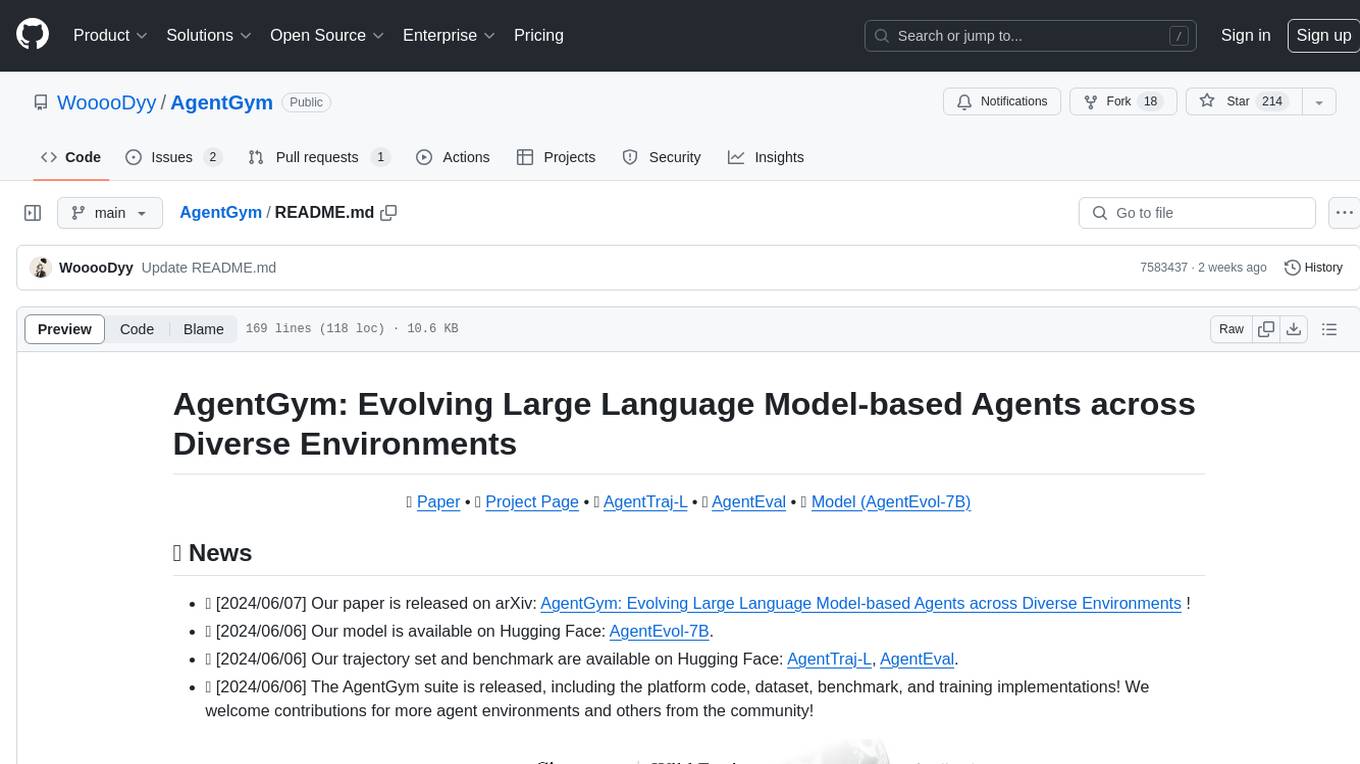
AgentGym
AgentGym is a framework designed to help the AI community evaluate and develop generally-capable Large Language Model-based agents. It features diverse interactive environments and tasks with real-time feedback and concurrency. The platform supports 14 environments across various domains like web navigating, text games, house-holding tasks, digital games, and more. AgentGym includes a trajectory set (AgentTraj) and a benchmark suite (AgentEval) to facilitate agent exploration and evaluation. The framework allows for agent self-evolution beyond existing data, showcasing comparable results to state-of-the-art models.
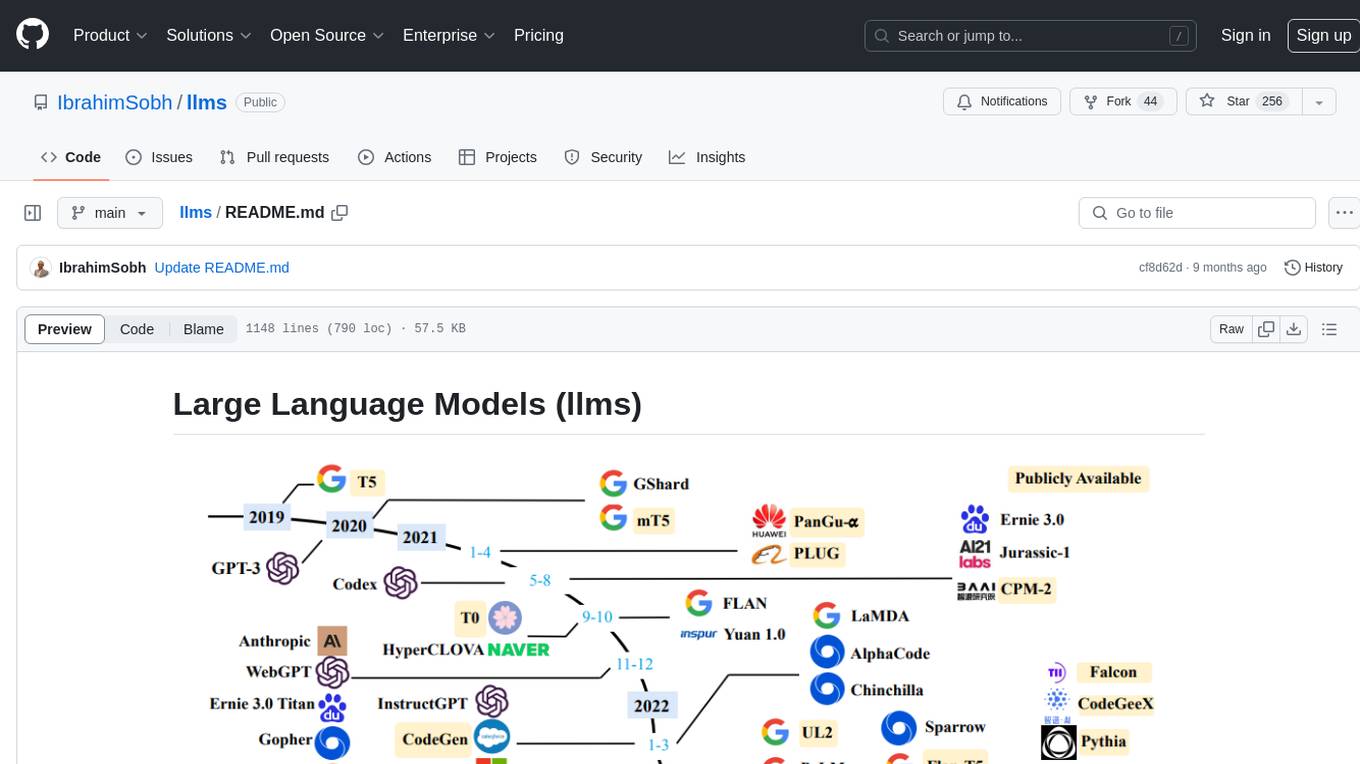
llms
The 'llms' repository is a comprehensive guide on Large Language Models (LLMs), covering topics such as language modeling, applications of LLMs, statistical language modeling, neural language models, conditional language models, evaluation methods, transformer-based language models, practical LLMs like GPT and BERT, prompt engineering, fine-tuning LLMs, retrieval augmented generation, AI agents, and LLMs for computer vision. The repository provides detailed explanations, examples, and tools for working with LLMs.
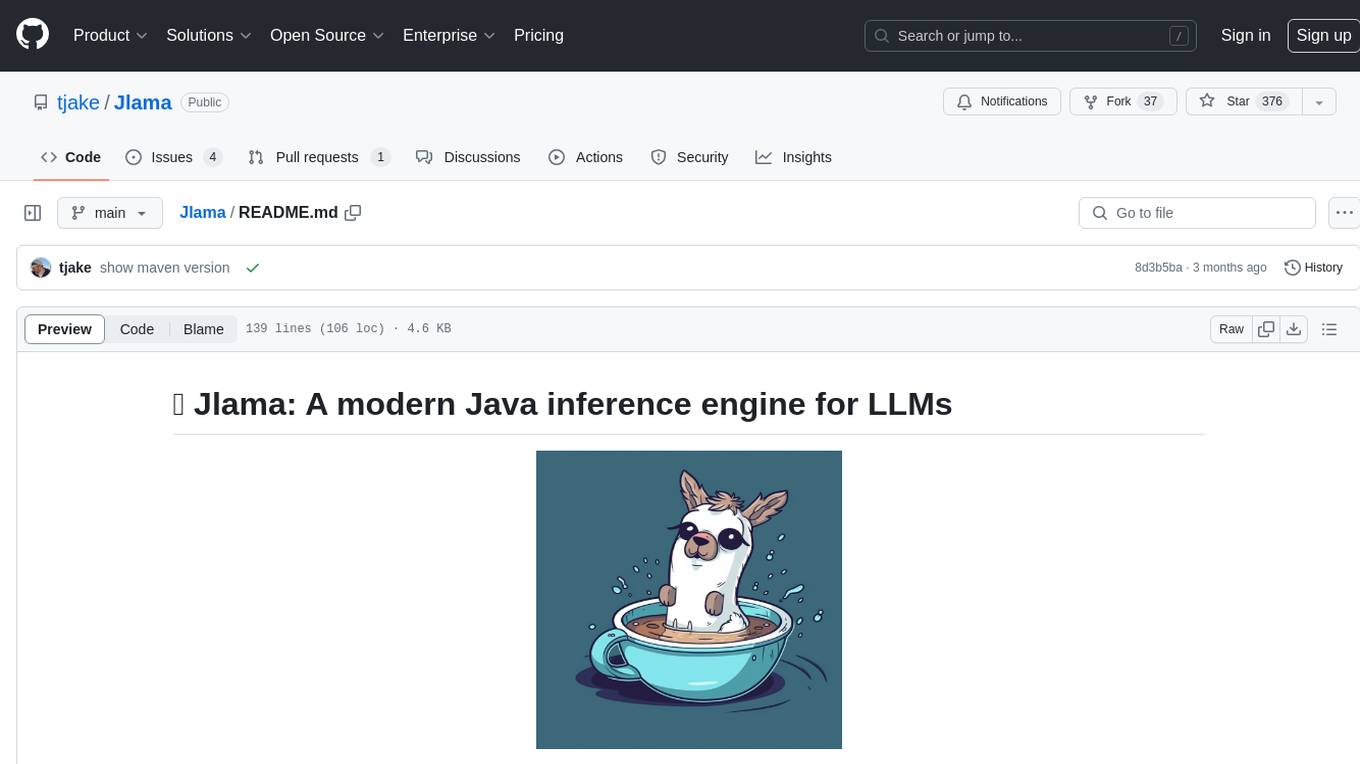
Jlama
Jlama is a modern Java inference engine designed for large language models. It supports various model types such as Gemma, Llama, Mistral, GPT-2, BERT, and more. The tool implements features like Flash Attention, Mixture of Experts, and supports different model quantization formats. Built with Java 21 and utilizing the new Vector API for faster inference, Jlama allows users to add LLM inference directly to their Java applications. The tool includes a CLI for running models, a simple UI for chatting with LLMs, and examples for different model types.
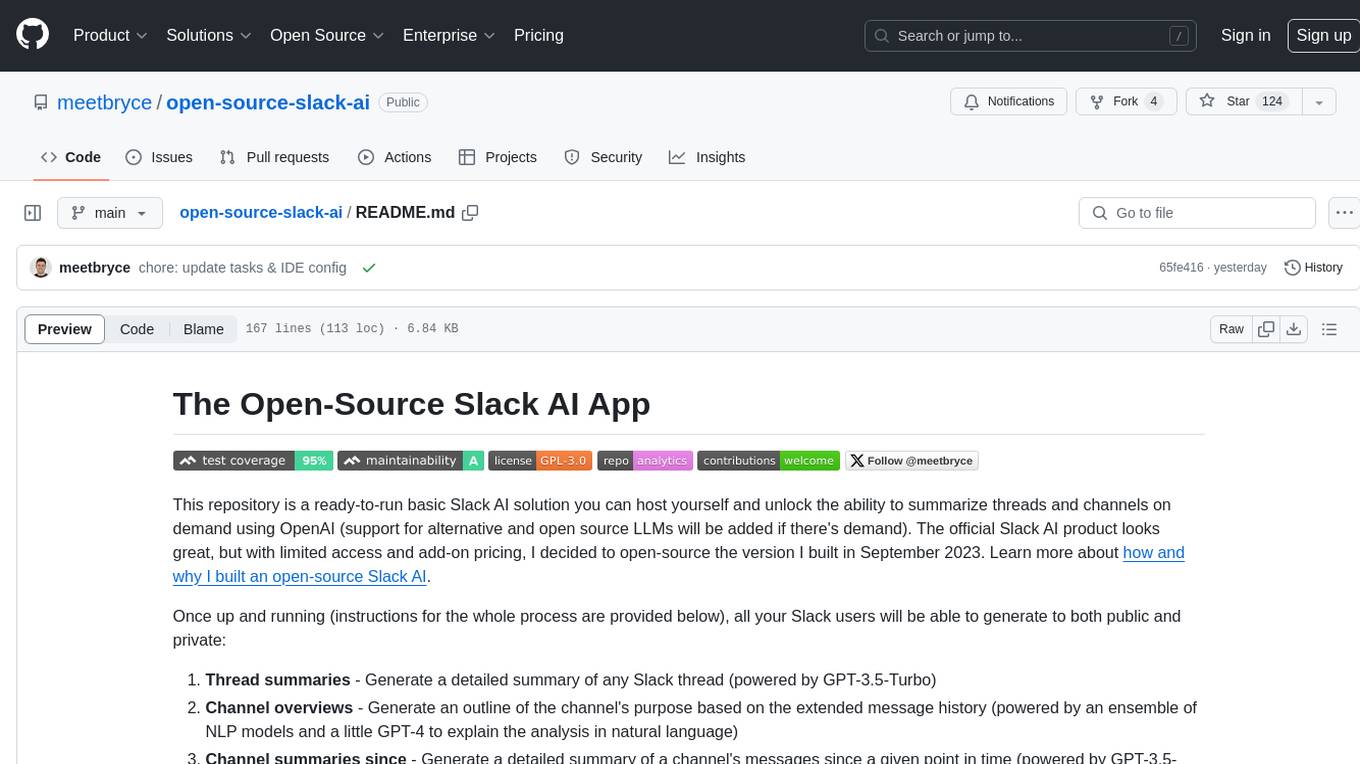
open-source-slack-ai
This repository provides a ready-to-run basic Slack AI solution that allows users to summarize threads and channels using OpenAI. Users can generate thread summaries, channel overviews, channel summaries since a specific time, and full channel summaries. The tool is powered by GPT-3.5-Turbo and an ensemble of NLP models. It requires Python 3.8 or higher, an OpenAI API key, Slack App with associated API tokens, Poetry package manager, and ngrok for local development. Users can customize channel and thread summaries, run tests with coverage using pytest, and contribute to the project for future enhancements.
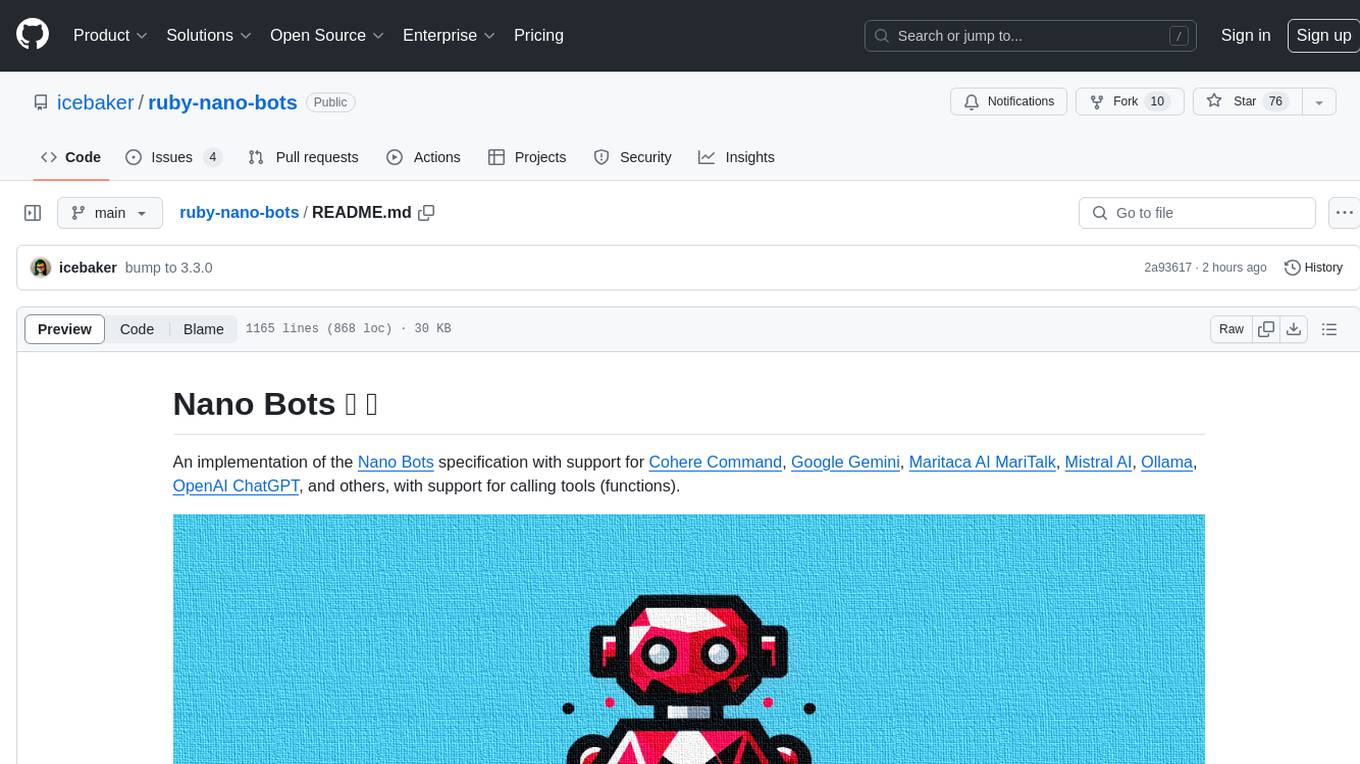
ruby-nano-bots
Ruby Nano Bots is an implementation of the Nano Bots specification supporting various AI providers like Cohere Command, Google Gemini, Maritaca AI MariTalk, Mistral AI, Ollama, OpenAI ChatGPT, and others. It allows calling tools (functions) and provides a helpful assistant for interacting with AI language models. The tool can be used both from the command line and as a library in Ruby projects, offering features like REPL, debugging, and encryption for data privacy.
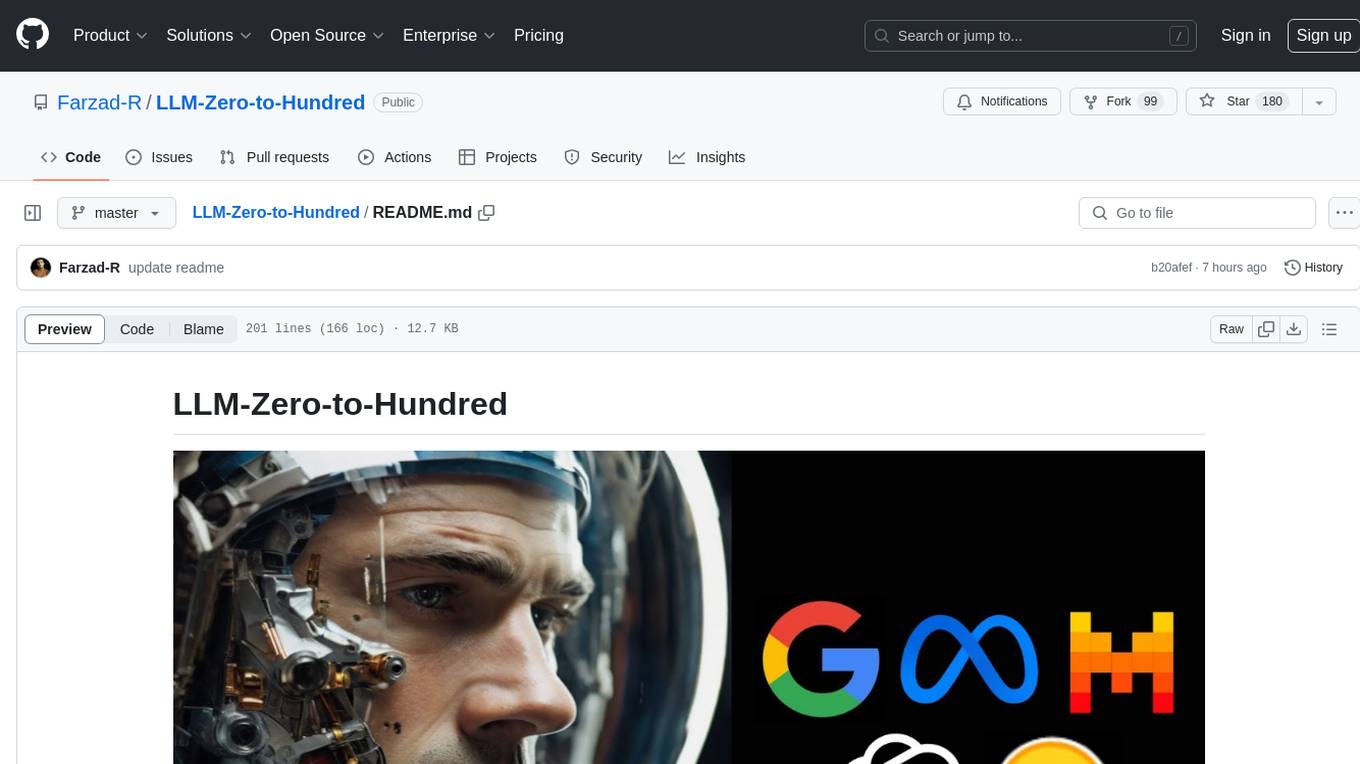
LLM-Zero-to-Hundred
LLM-Zero-to-Hundred is a repository showcasing various applications of LLM chatbots and providing insights into training and fine-tuning Language Models. It includes projects like WebGPT, RAG-GPT, WebRAGQuery, LLM Full Finetuning, RAG-Master LLamaindex vs Langchain, open-source-RAG-GEMMA, and HUMAIN: Advanced Multimodal, Multitask Chatbot. The projects cover features like ChatGPT-like interaction, RAG capabilities, image generation and understanding, DuckDuckGo integration, summarization, text and voice interaction, and memory access. Tutorials include LLM Function Calling and Visualizing Text Vectorization. The projects have a general structure with folders for README, HELPER, .env, configs, data, src, images, and utils.
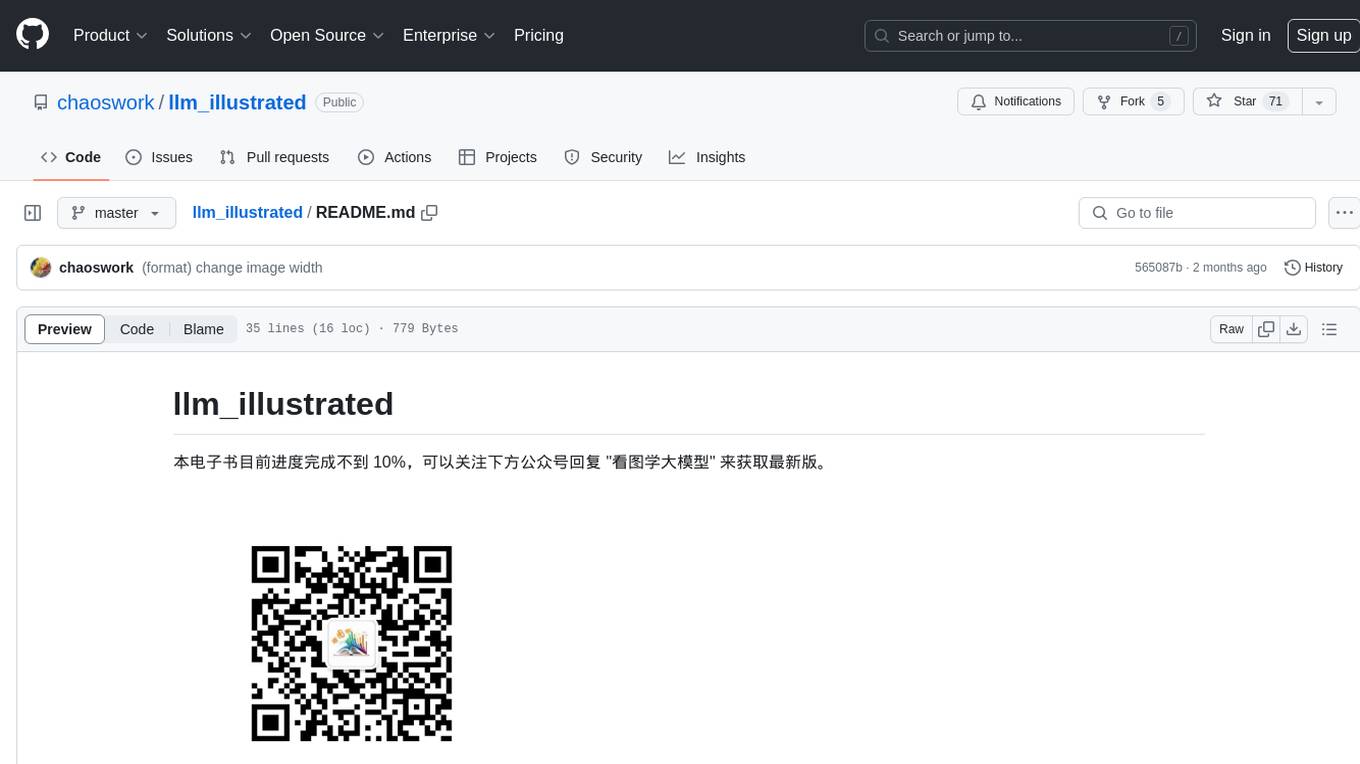
llm_illustrated
llm_illustrated is an electronic book that visually explains various technical aspects of large language models using clear and easy-to-understand images. The book covers topics such as self-attention structure and code, absolute position encoding, KV cache visualization, transformers composition, and a relationship graph of participants in the Dartmouth Conference. The progress of the book is less than 10%, and readers can stay updated by following the WeChat official account and replying 'learn large models through images'. The PDF layout and Latex formatting are still being adjusted.
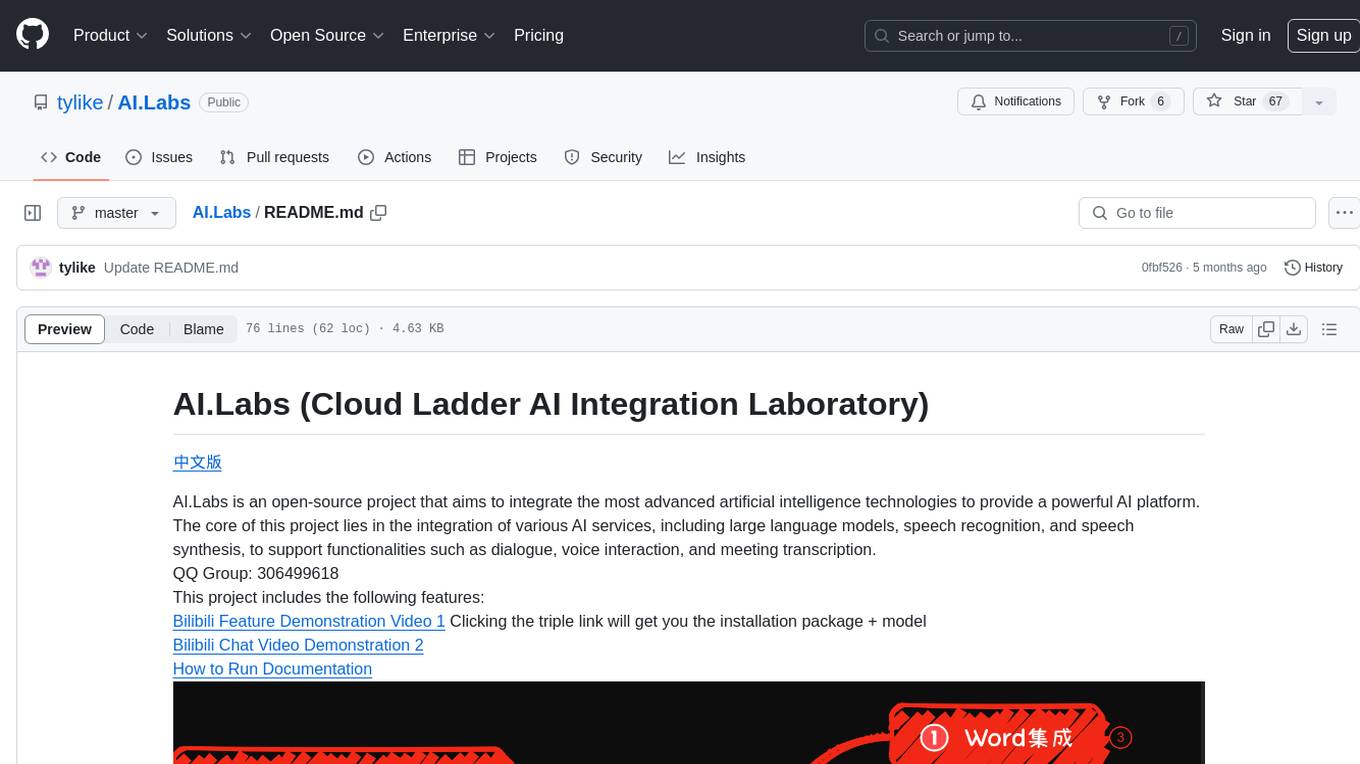
AI.Labs
AI.Labs is an open-source project that integrates advanced artificial intelligence technologies to create a powerful AI platform. It focuses on integrating AI services like large language models, speech recognition, and speech synthesis for functionalities such as dialogue, voice interaction, and meeting transcription. The project also includes features like a large language model dialogue system, speech recognition for meeting transcription, speech-to-text voice synthesis, integration of translation and chat, and uses technologies like C#, .Net, SQLite database, XAF, OpenAI API, TTS, and STT.
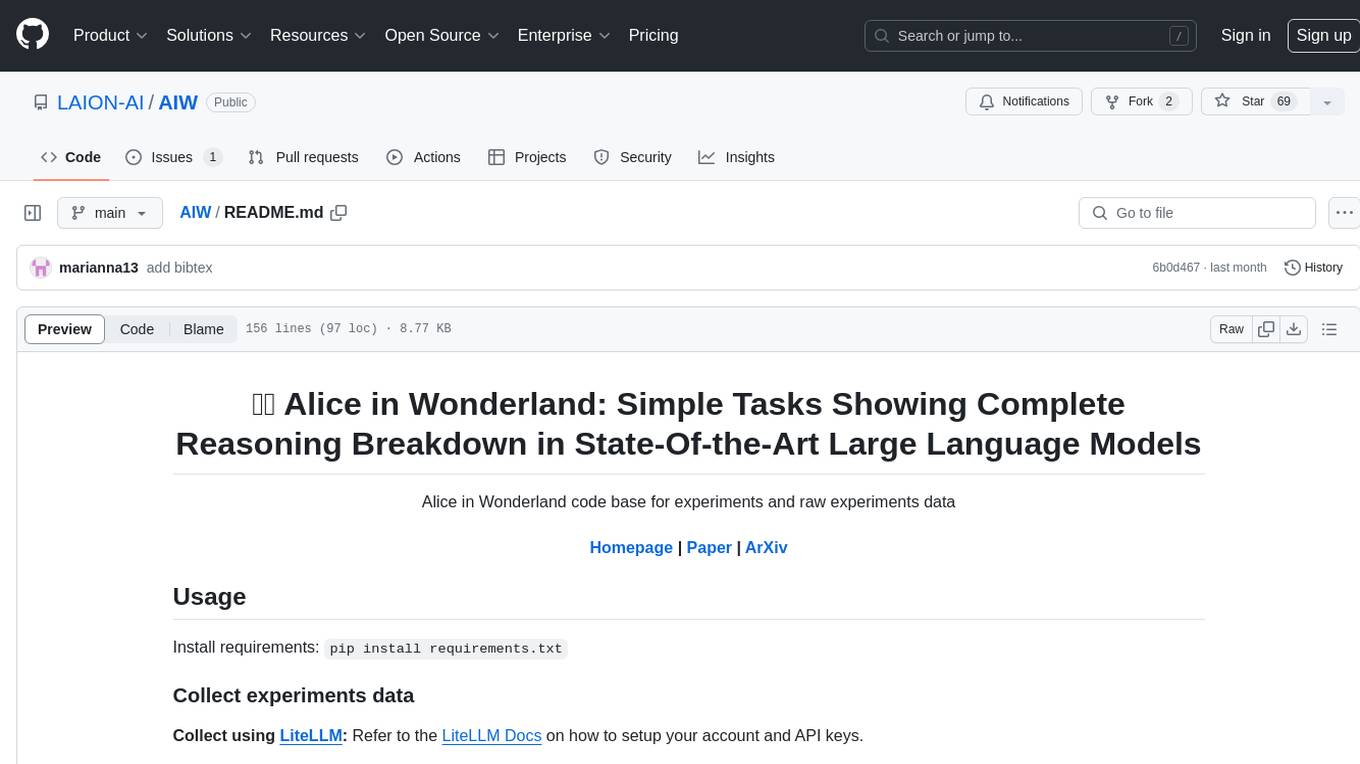
AIW
AIW is a code base for experiments and raw data related to Alice in Wonderland, showcasing complete reasoning breakdown in state-of-the-art large language models. Users can collect experiments data using LiteLLM and TogetherAI, and plot the data using provided scripts. The tool allows for executing experiments over LiteLLM and lmsys, with options for different prompt types and AIW variations. The project also includes acknowledgments and a citation for reference.
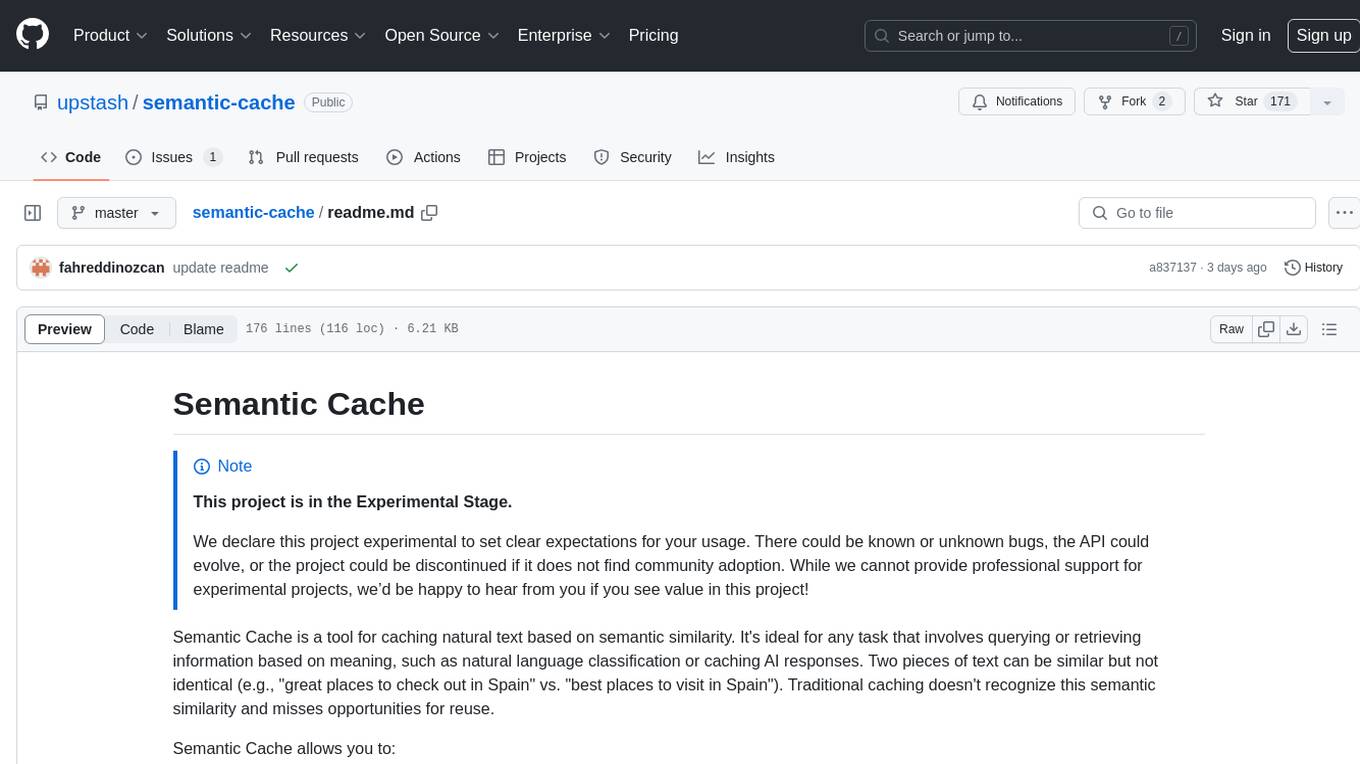
semantic-cache
Semantic Cache is a tool for caching natural text based on semantic similarity. It allows for classifying text into categories, caching AI responses, and reducing API latency by responding to similar queries with cached values. The tool stores cache entries by meaning, handles synonyms, supports multiple languages, understands complex queries, and offers easy integration with Node.js applications. Users can set a custom proximity threshold for filtering results. The tool is ideal for tasks involving querying or retrieving information based on meaning, such as natural language classification or caching AI responses.
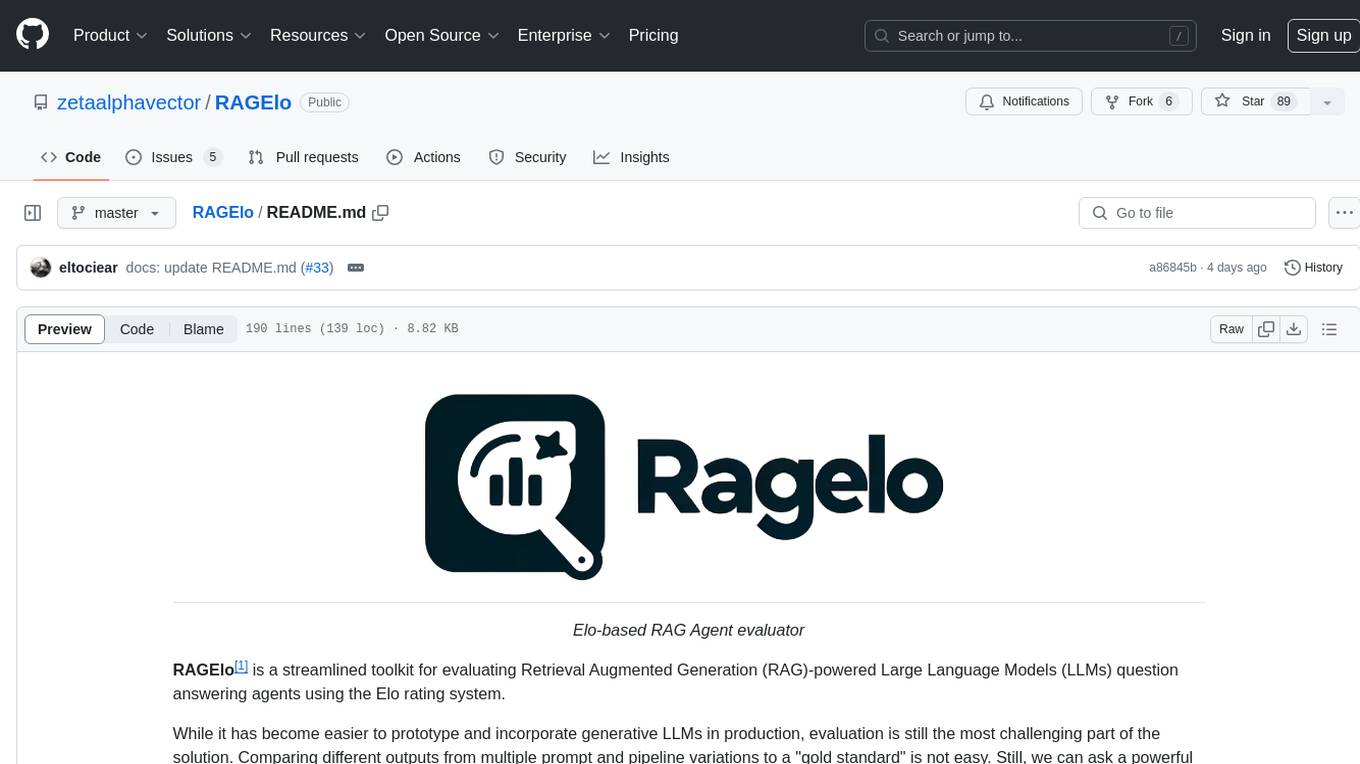
RAGElo
RAGElo is a streamlined toolkit for evaluating Retrieval Augmented Generation (RAG)-powered Large Language Models (LLMs) question answering agents using the Elo rating system. It simplifies the process of comparing different outputs from multiple prompt and pipeline variations to a 'gold standard' by allowing a powerful LLM to judge between pairs of answers and questions. RAGElo conducts tournament-style Elo ranking of LLM outputs, providing insights into the effectiveness of different settings.
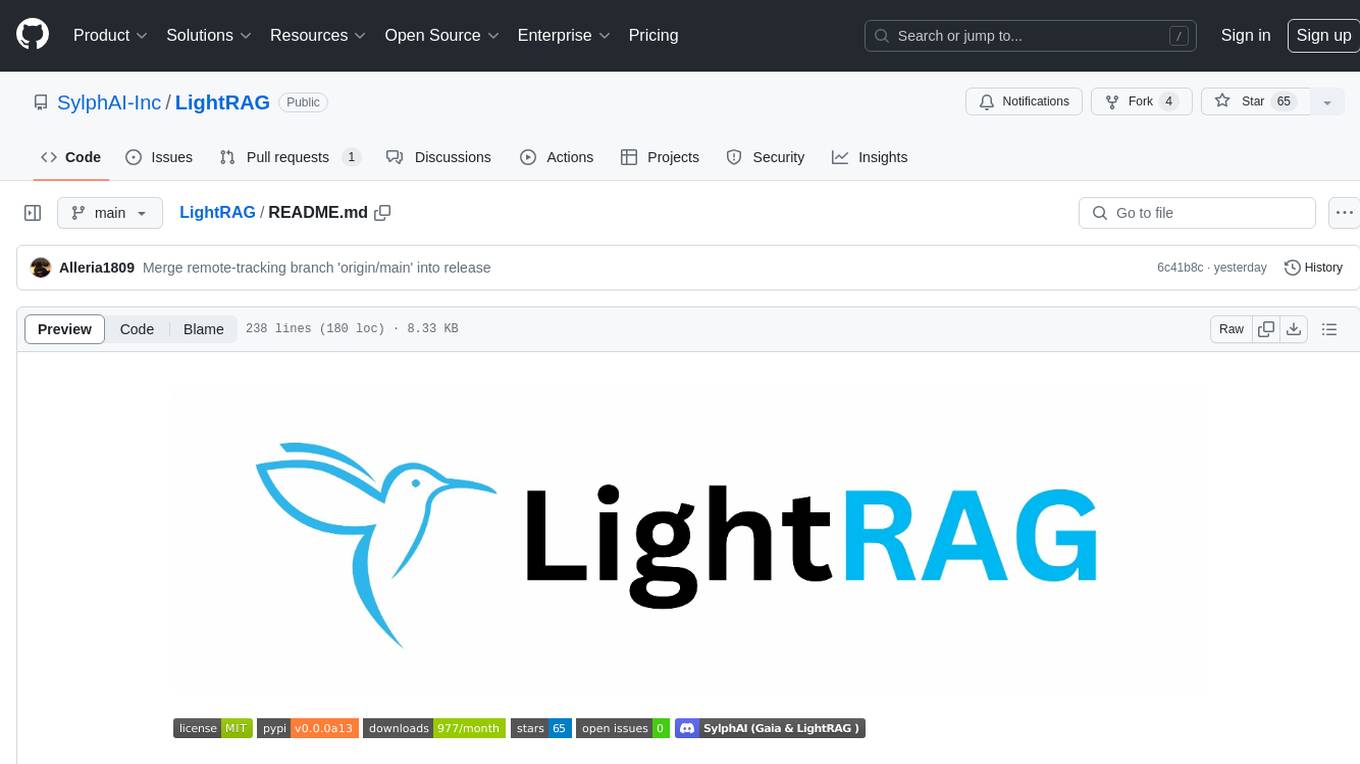
LightRAG
LightRAG is a PyTorch library designed for building and optimizing Retriever-Agent-Generator (RAG) pipelines. It follows principles of simplicity, quality, and optimization, offering developers maximum customizability with minimal abstraction. The library includes components for model interaction, output parsing, and structured data generation. LightRAG facilitates tasks like providing explanations and examples for concepts through a question-answering pipeline.
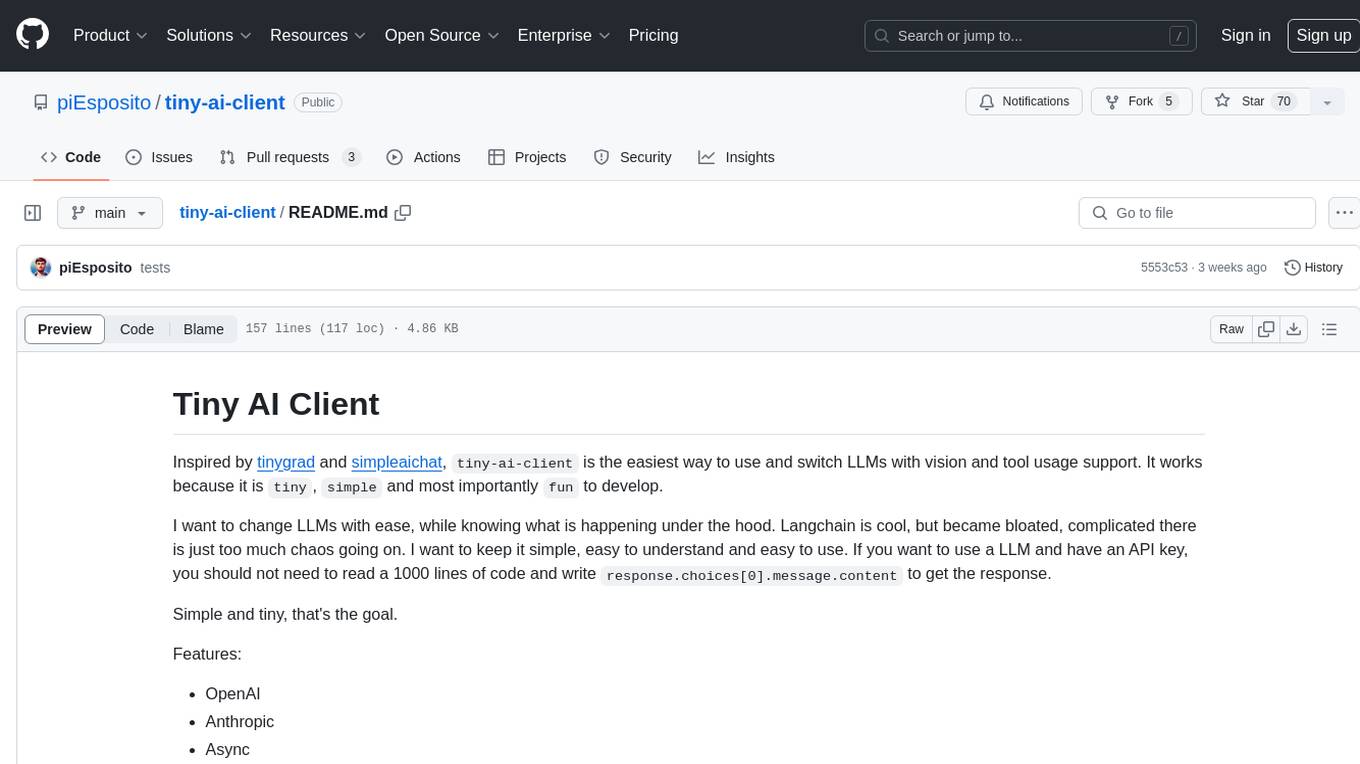
tiny-ai-client
Tiny AI Client is a lightweight tool designed for easy usage and switching of Language Model Models (LLMs) with support for vision and tool usage. It aims to provide a simple and intuitive interface for interacting with various LLMs, allowing users to easily set, change models, send messages, use tools, and handle vision tasks. The core logic of the tool is kept minimal and easy to understand, with separate modules for vision and tool usage utilities. Users can interact with the tool through simple Python scripts, passing model names, messages, tools, and images as required.
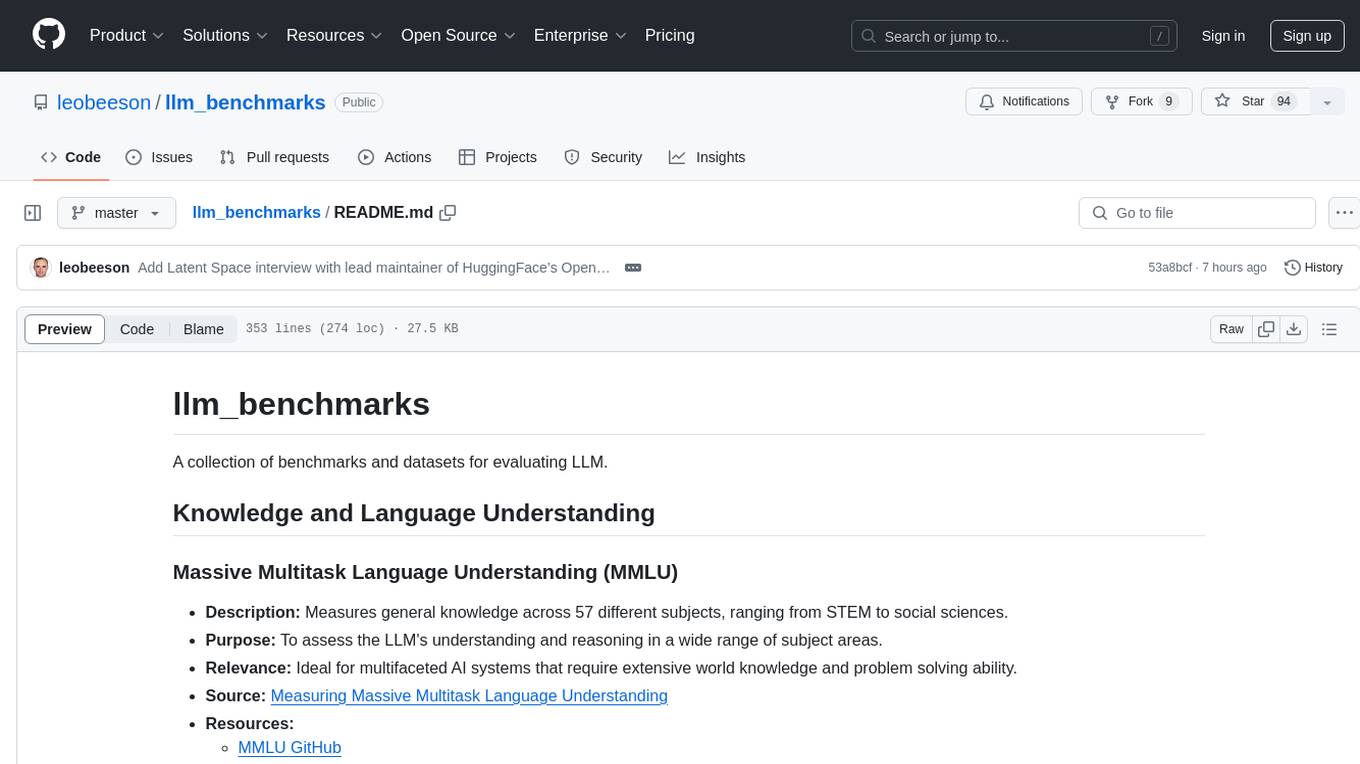
llm_benchmarks
llm_benchmarks is a collection of benchmarks and datasets for evaluating Large Language Models (LLMs). It includes various tasks and datasets to assess LLMs' knowledge, reasoning, language understanding, and conversational abilities. The repository aims to provide comprehensive evaluation resources for LLMs across different domains and applications, such as education, healthcare, content moderation, coding, and conversational AI. Researchers and developers can leverage these benchmarks to test and improve the performance of LLMs in various real-world scenarios.
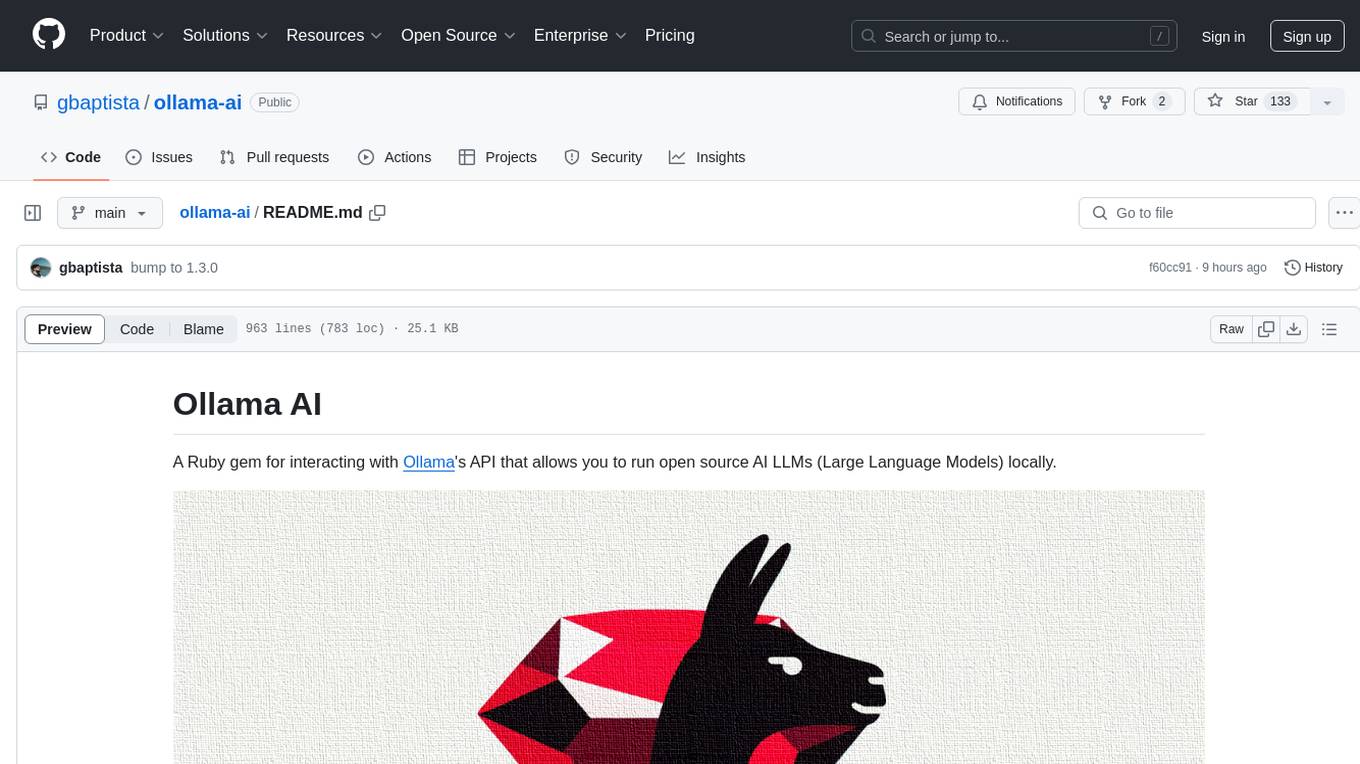
ollama-ai
Ollama AI is a Ruby gem designed to interact with Ollama's API, allowing users to run open source AI LLMs (Large Language Models) locally. The gem provides low-level access to Ollama, enabling users to build abstractions on top of it. It offers methods for generating completions, chat interactions, embeddings, creating and managing models, and more. Users can also work with text and image data, utilize Server-Sent Events for streaming capabilities, and handle errors effectively. Ollama AI is not an official Ollama project and is distributed under the MIT License.
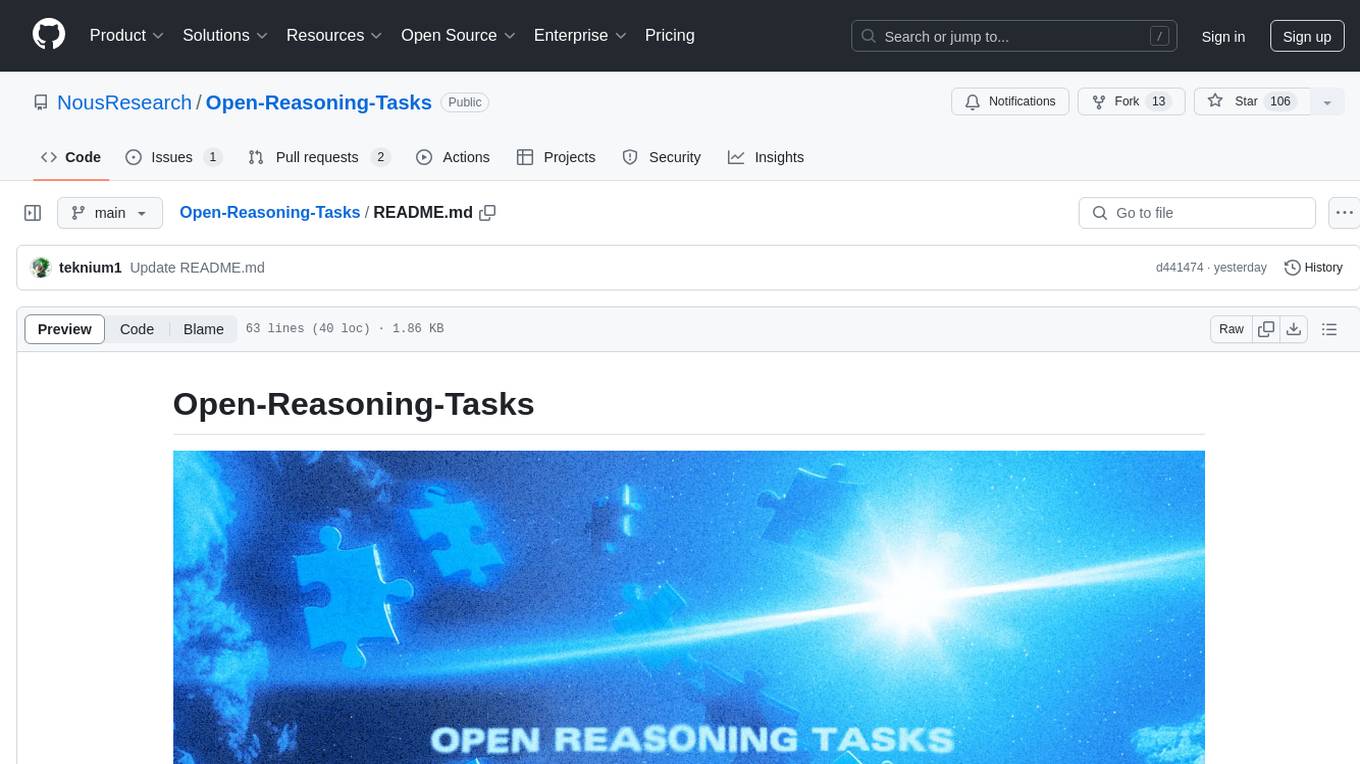
Open-Reasoning-Tasks
The Open-Reasoning-Tasks repository is a collaborative project aimed at creating a comprehensive list of reasoning tasks for training large language models (LLMs). Contributors can submit tasks with descriptions, examples, and optional diagrams to enhance LLMs' reasoning capabilities.

llm
The 'llm' package for Emacs provides an interface for interacting with Large Language Models (LLMs). It abstracts functionality to a higher level, concealing API variations and ensuring compatibility with various LLMs. Users can set up providers like OpenAI, Gemini, Vertex, Claude, Ollama, GPT4All, and a fake client for testing. The package allows for chat interactions, embeddings, token counting, and function calling. It also offers advanced prompt creation and logging capabilities. Users can handle conversations, create prompts with placeholders, and contribute by creating providers.
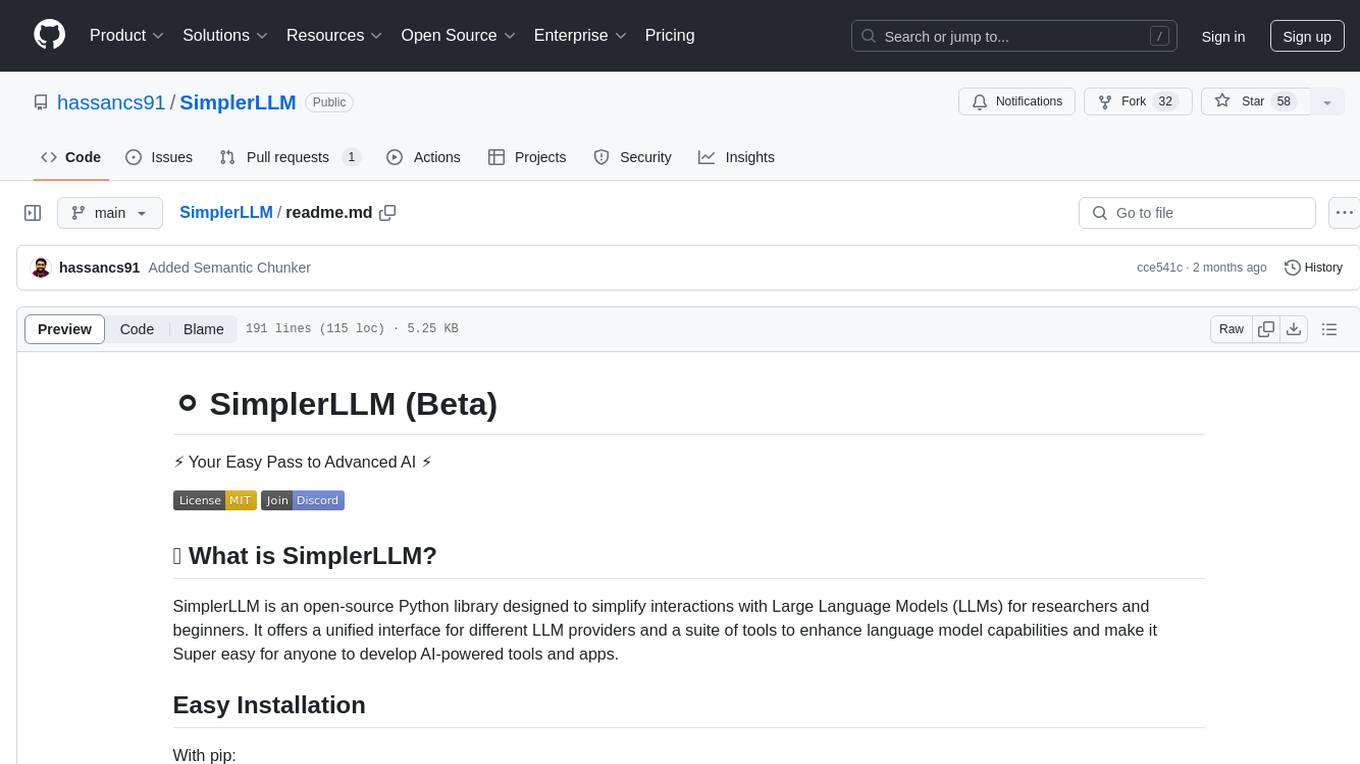
SimplerLLM
SimplerLLM is an open-source Python library that simplifies interactions with Large Language Models (LLMs) for researchers and beginners. It provides a unified interface for different LLM providers, tools for enhancing language model capabilities, and easy development of AI-powered tools and apps. The library offers features like unified LLM interface, generic text loader, RapidAPI connector, SERP integration, prompt template builder, and more. Users can easily set up environment variables, create LLM instances, use tools like SERP, generic text loader, calling RapidAPI APIs, and prompt template builder. Additionally, the library includes chunking functions to split texts into manageable chunks based on different criteria. Future updates will bring more tools, interactions with local LLMs, prompt optimization, response evaluation, GPT Trainer, document chunker, advanced document loader, integration with more providers, Simple RAG with SimplerVectors, integration with vector databases, agent builder, and LLM server.
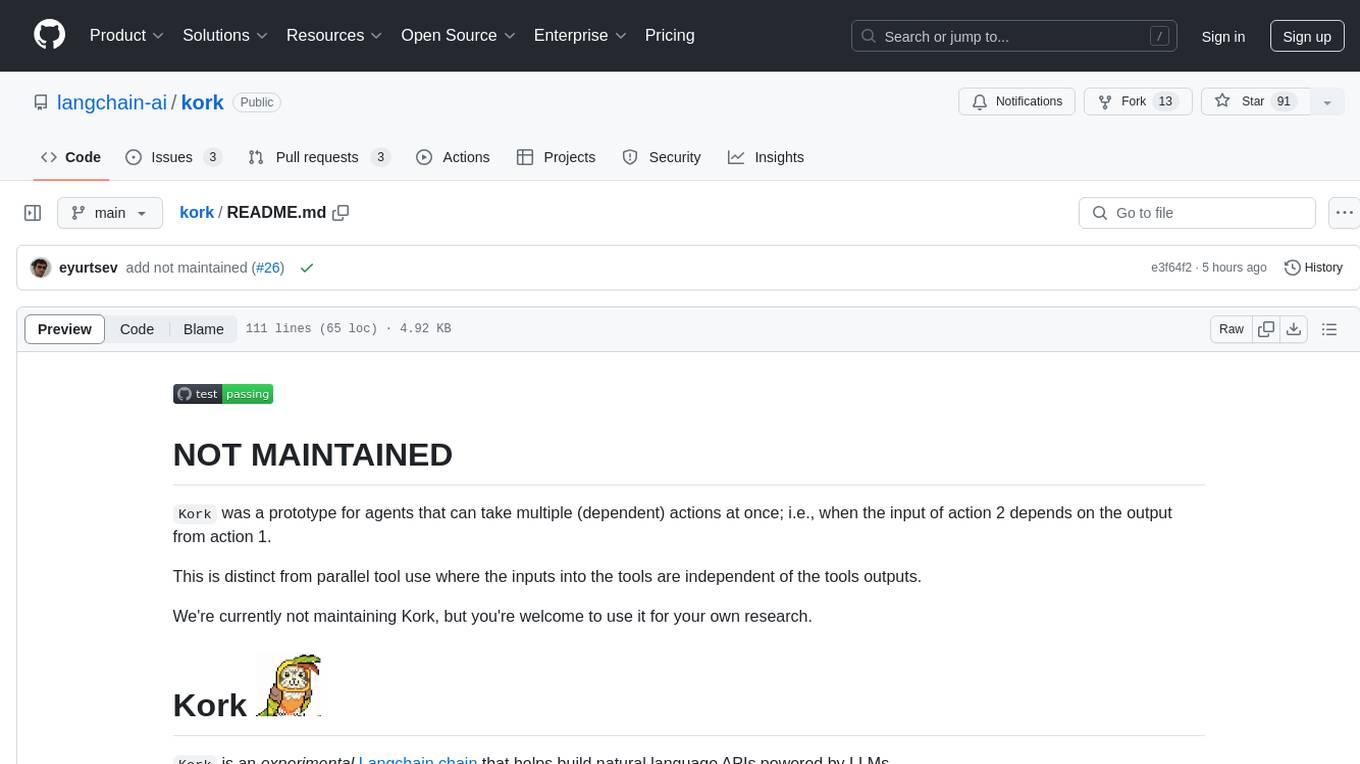
kork
Kork is an experimental Langchain chain that helps build natural language APIs powered by LLMs. It allows assembling a natural language API from python functions, generating a prompt for correct program writing, executing programs safely, and controlling the kind of programs LLMs can generate. The language is limited to variable declarations, function invocations, and arithmetic operations, ensuring predictability and safety in production settings.
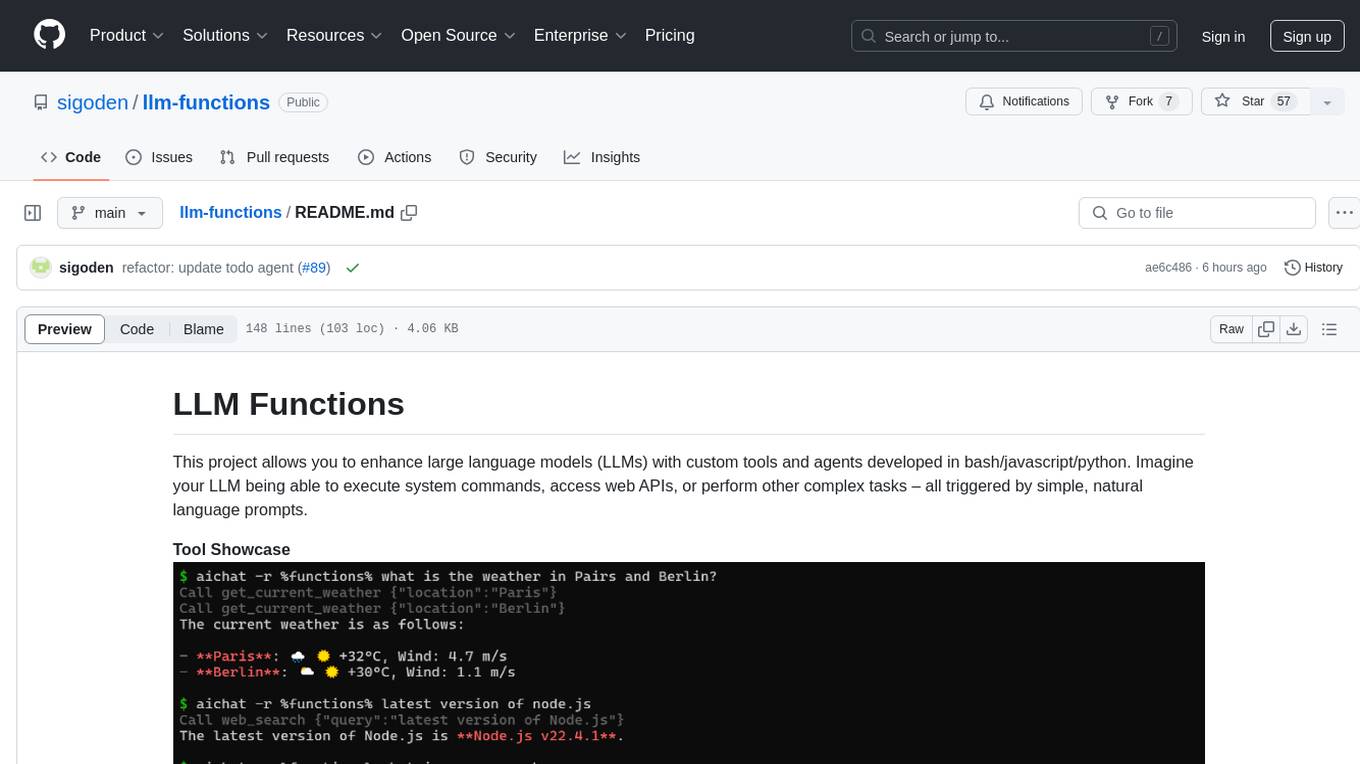
llm-functions
LLM Functions is a project that enables the enhancement of large language models (LLMs) with custom tools and agents developed in bash, javascript, and python. Users can create tools for their LLM to execute system commands, access web APIs, or perform other complex tasks triggered by natural language prompts. The project provides a framework for building tools and agents, with tools being functions written in the user's preferred language and automatically generating JSON declarations based on comments. Agents combine prompts, function callings, and knowledge (RAG) to create conversational AI agents. The project is designed to be user-friendly and allows users to easily extend the capabilities of their language models.
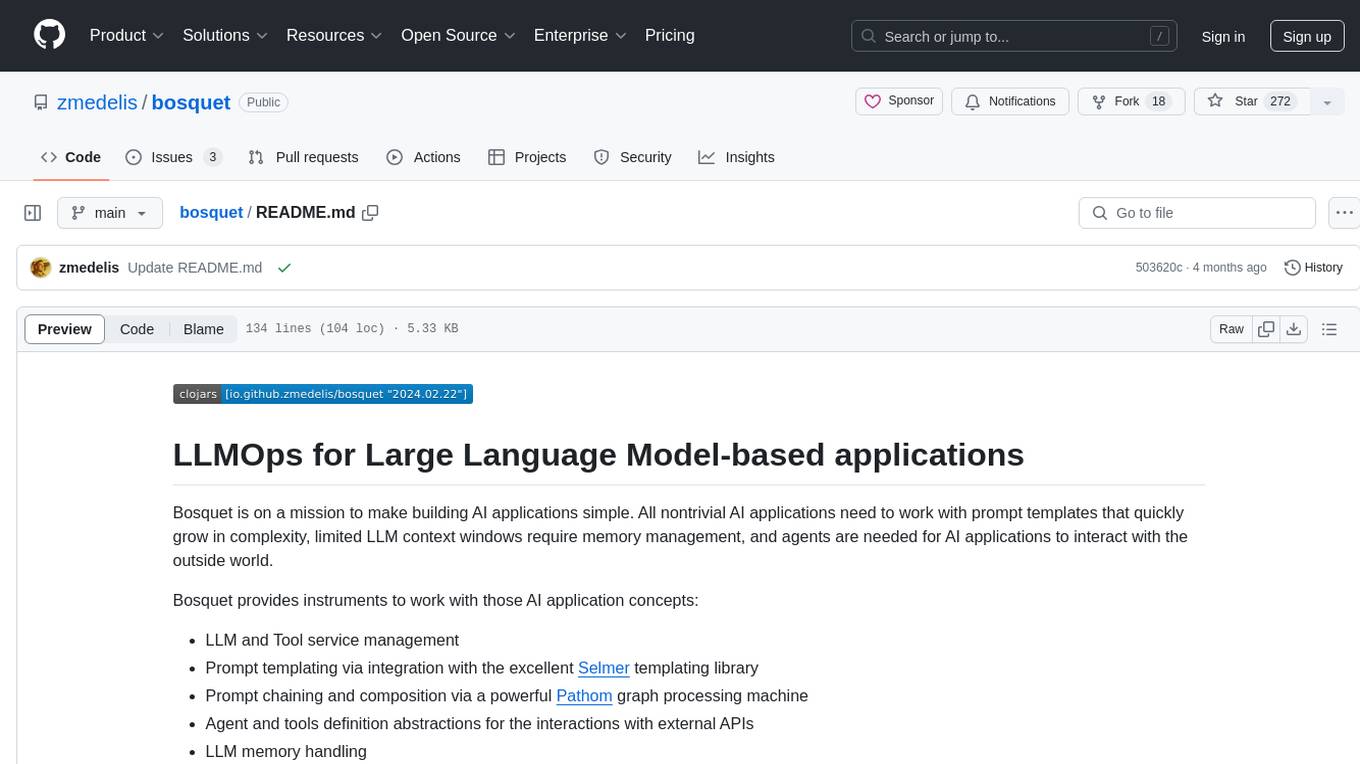
bosquet
Bosquet is a tool designed for LLMOps in large language model-based applications. It simplifies building AI applications by managing LLM and tool services, integrating with Selmer templating library for prompt templating, enabling prompt chaining and composition with Pathom graph processing, defining agents and tools for external API interactions, handling LLM memory, and providing features like call response caching. The tool aims to streamline the development process for AI applications that require complex prompt templates, memory management, and interaction with external systems.
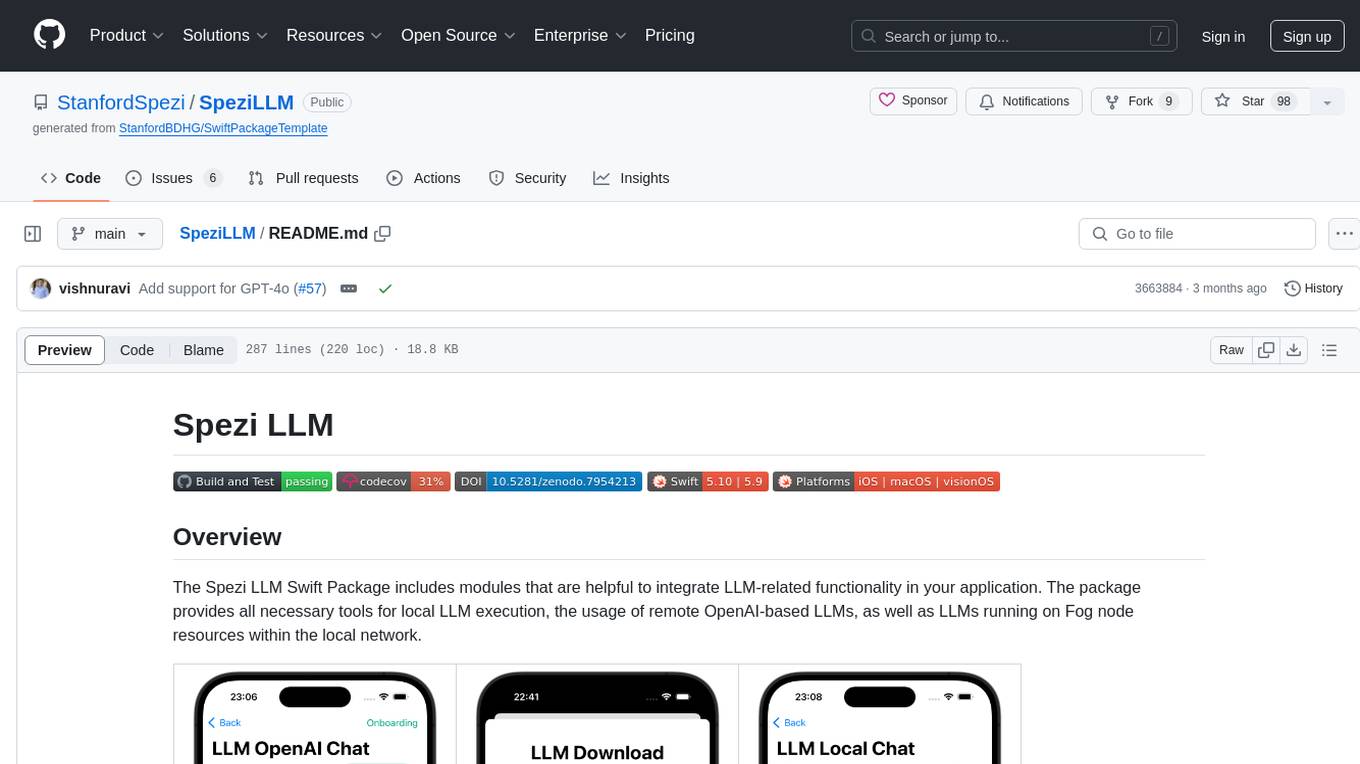
SpeziLLM
The Spezi LLM Swift Package includes modules that help integrate LLM-related functionality in applications. It provides tools for local LLM execution, usage of remote OpenAI-based LLMs, and LLMs running on Fog node resources within the local network. The package contains targets like SpeziLLM, SpeziLLMLocal, SpeziLLMLocalDownload, SpeziLLMOpenAI, and SpeziLLMFog for different LLM functionalities. Users can configure and interact with local LLMs, OpenAI LLMs, and Fog LLMs using the provided APIs and platforms within the Spezi ecosystem.
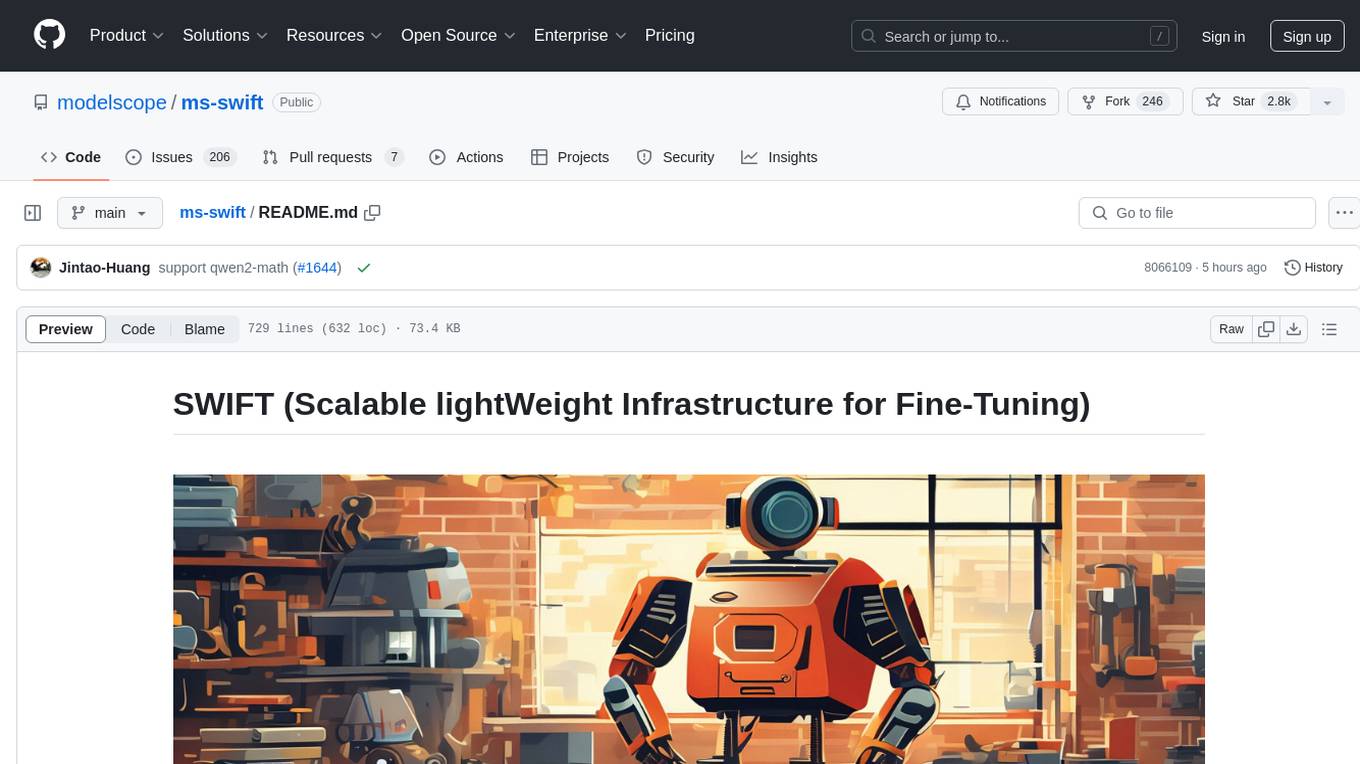
ms-swift
ms-swift is an official framework provided by the ModelScope community for fine-tuning and deploying large language models and multi-modal large models. It supports training, inference, evaluation, quantization, and deployment of over 400 large models and 100+ multi-modal large models. The framework includes various training technologies and accelerates inference, evaluation, and deployment modules. It offers a Gradio-based Web-UI interface and best practices for easy application of large models. ms-swift supports a wide range of model types, dataset types, hardware support, lightweight training methods, distributed training techniques, quantization training, RLHF training, multi-modal training, interface training, plugin and extension support, inference acceleration engines, model evaluation, and model quantization.
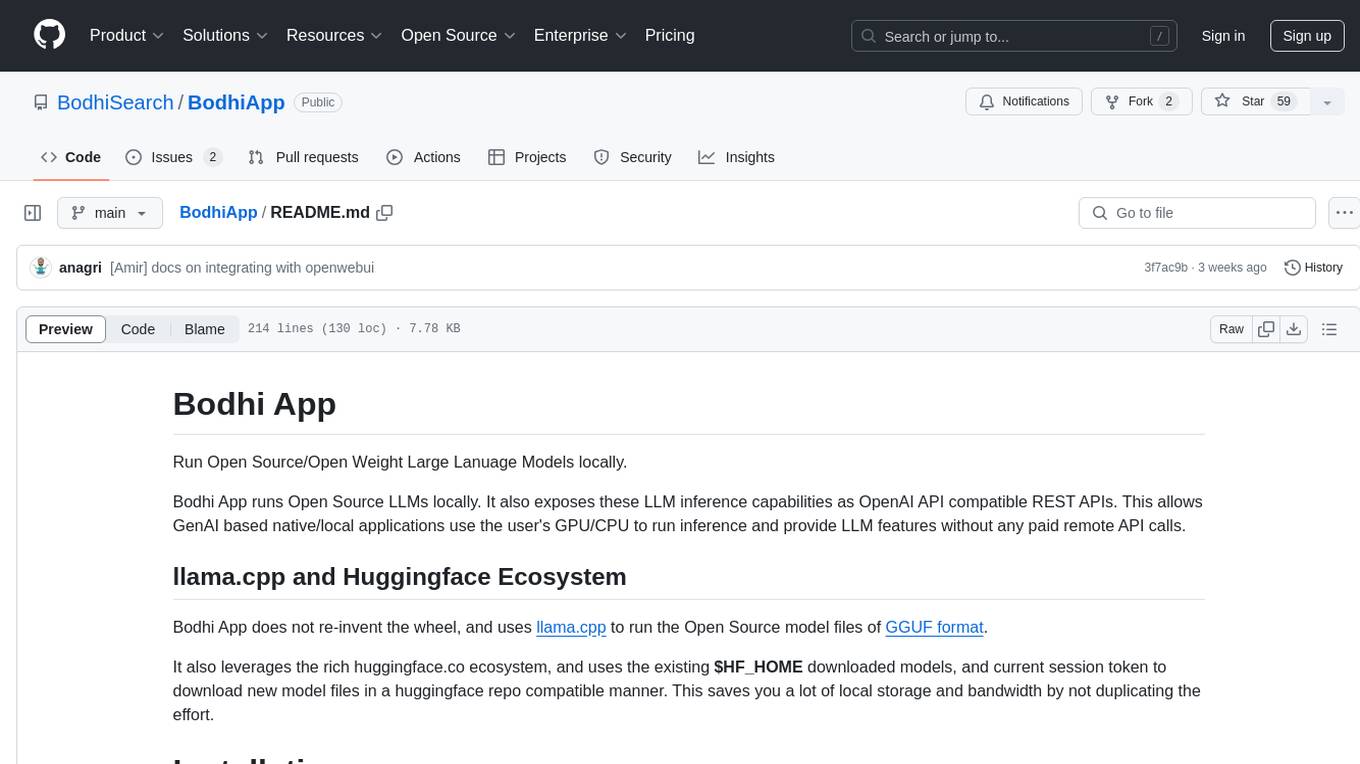
BodhiApp
Bodhi App runs Open Source Large Language Models locally, exposing LLM inference capabilities as OpenAI API compatible REST APIs. It leverages llama.cpp for GGUF format models and huggingface.co ecosystem for model downloads. Users can run fine-tuned models for chat completions, create custom aliases, and convert Huggingface models to GGUF format. The CLI offers commands for environment configuration, model management, pulling files, serving API, and more.
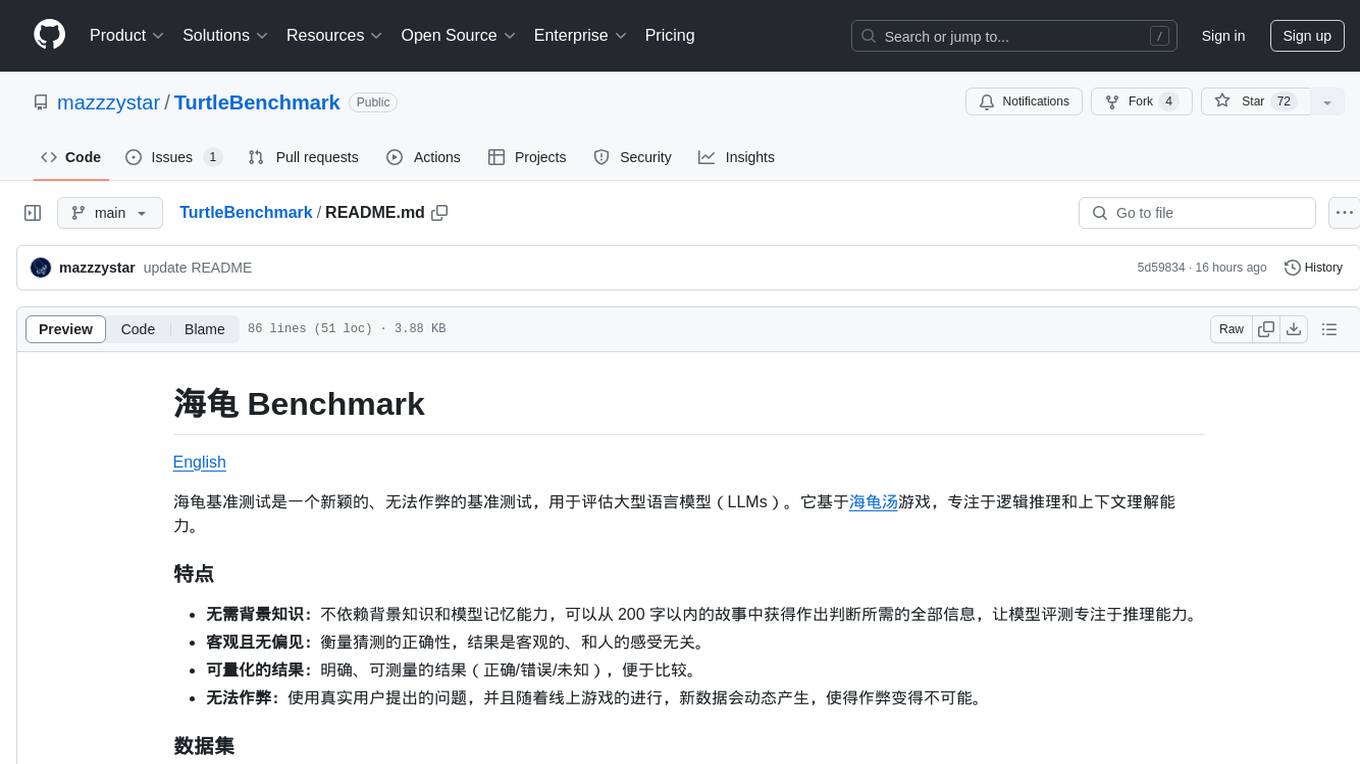
TurtleBenchmark
Turtle Benchmark is a novel and cheat-proof benchmark test used to evaluate large language models (LLMs). It is based on the Turtle Soup game, focusing on logical reasoning and context understanding abilities. The benchmark does not require background knowledge or model memory, providing all necessary information for judgment from stories under 200 words. The results are objective and unbiased, quantifiable as correct/incorrect/unknown, and impossible to cheat due to using real user-generated questions and dynamic data generation during online gameplay.
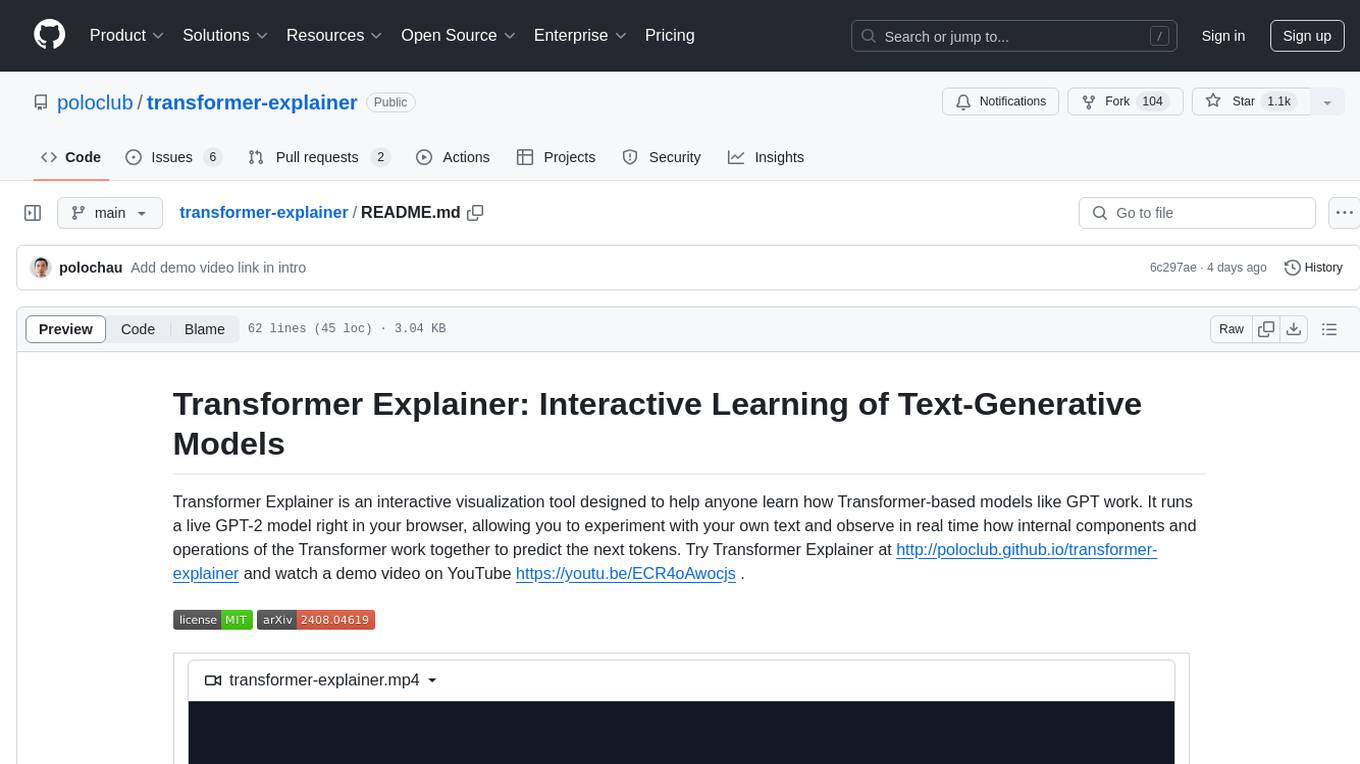
transformer-explainer
Transformer Explainer is an interactive visualization tool to help users learn how Transformer-based models like GPT work. It allows users to experiment with text and observe how internal components of the Transformer predict next tokens in real time. The tool runs a live GPT-2 model in the browser, providing an educational experience on text-generative models.
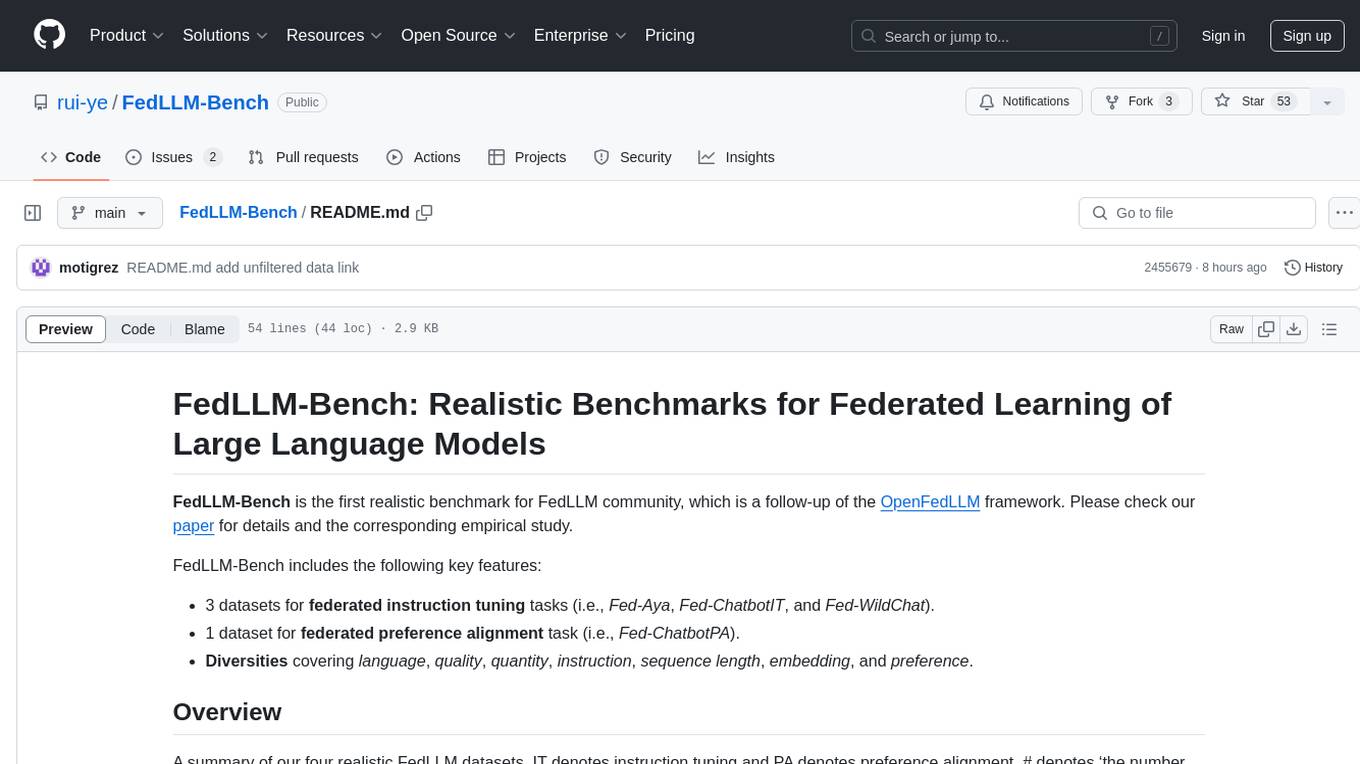
FedLLM-Bench
FedLLM-Bench is a realistic benchmark for the Federated Learning of Large Language Models community. It includes datasets for federated instruction tuning and preference alignment tasks, exhibiting diversities in language, quality, quantity, instruction, sequence length, embedding, and preference. The repository provides training scripts and code for open-ended evaluation, aiming to facilitate research and development in federated learning of large language models.
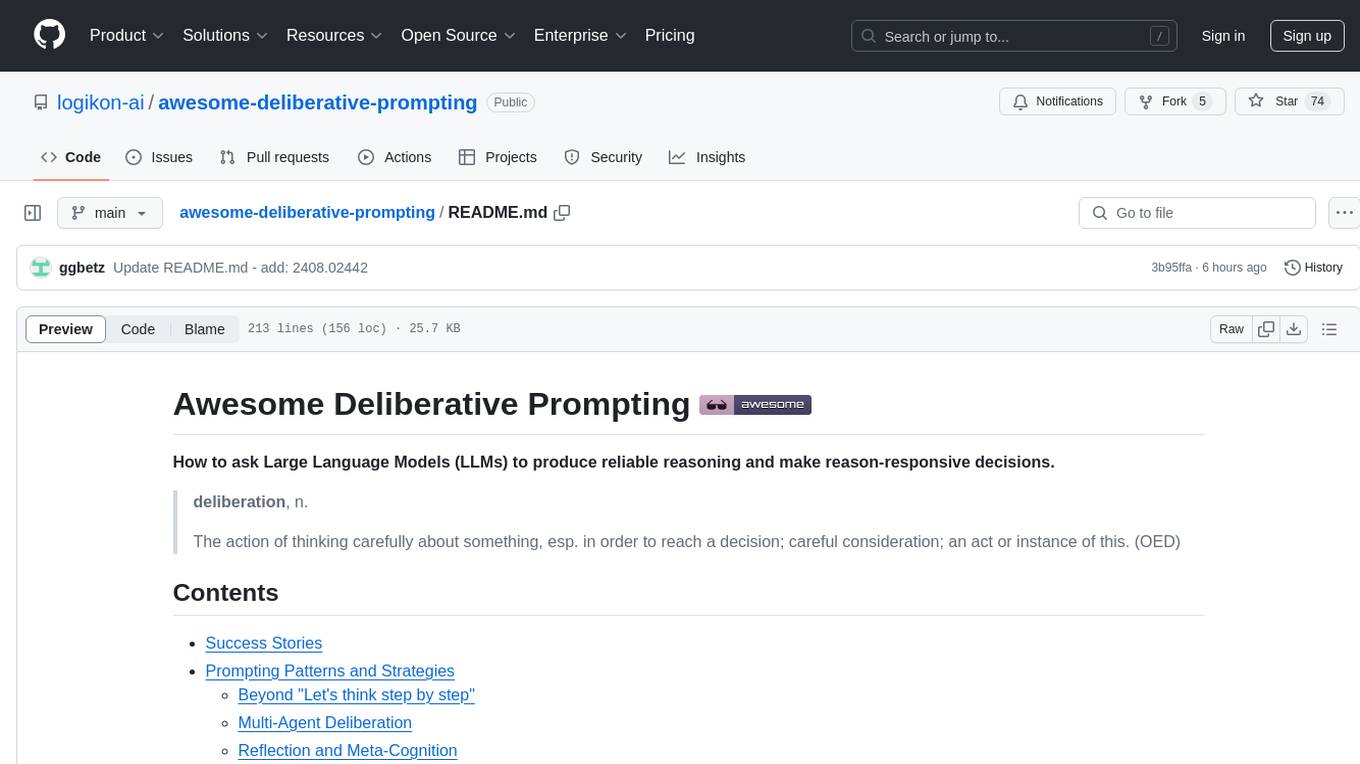
awesome-deliberative-prompting
The 'awesome-deliberative-prompting' repository focuses on how to ask Large Language Models (LLMs) to produce reliable reasoning and make reason-responsive decisions through deliberative prompting. It includes success stories, prompting patterns and strategies, multi-agent deliberation, reflection and meta-cognition, text generation techniques, self-correction methods, reasoning analytics, limitations, failures, puzzles, datasets, tools, and other resources related to deliberative prompting. The repository provides a comprehensive overview of research, techniques, and tools for enhancing reasoning capabilities of LLMs.
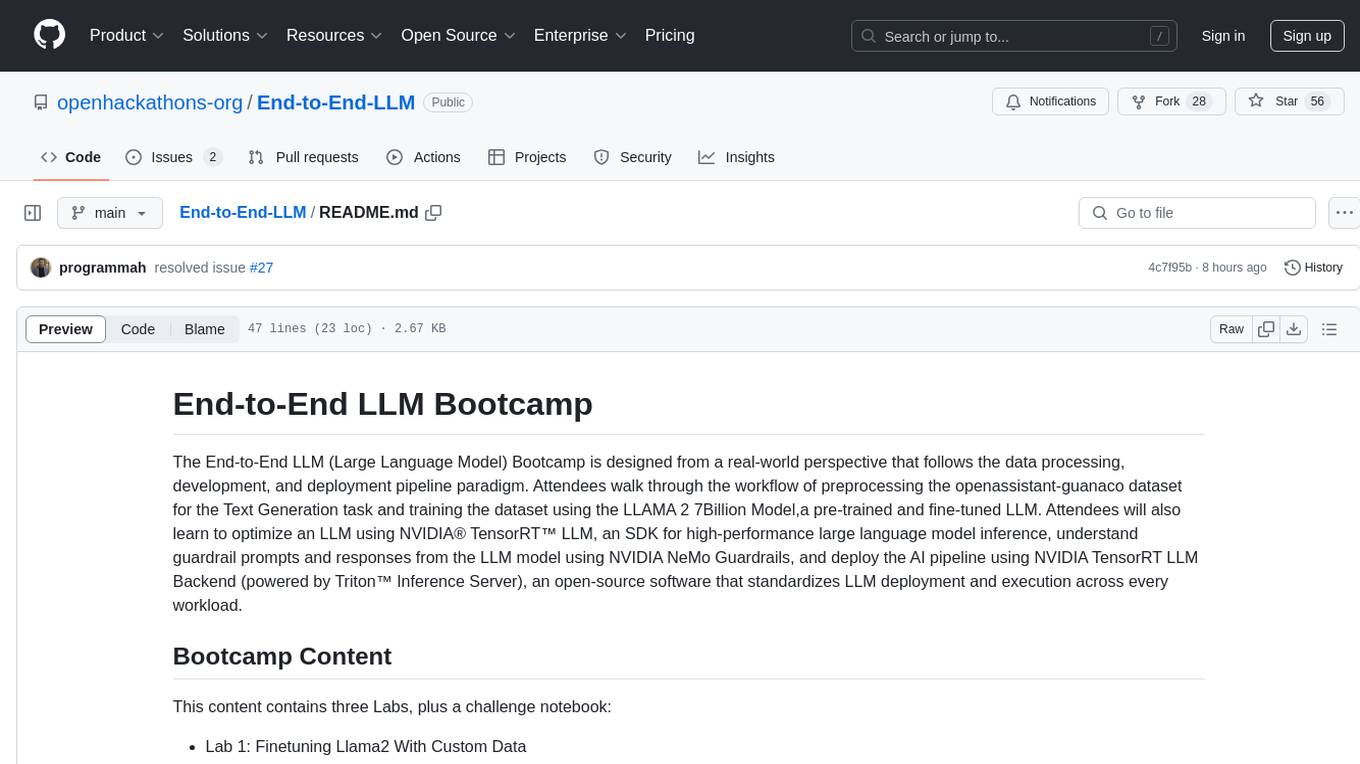
End-to-End-LLM
The End-to-End LLM Bootcamp is a comprehensive training program that covers the entire process of developing and deploying large language models. Participants learn to preprocess datasets, train models, optimize performance using NVIDIA technologies, understand guardrail prompts, and deploy AI pipelines using Triton Inference Server. The bootcamp includes labs, challenges, and practical applications, with a total duration of approximately 7.5 hours. It is designed for individuals interested in working with advanced language models and AI technologies.
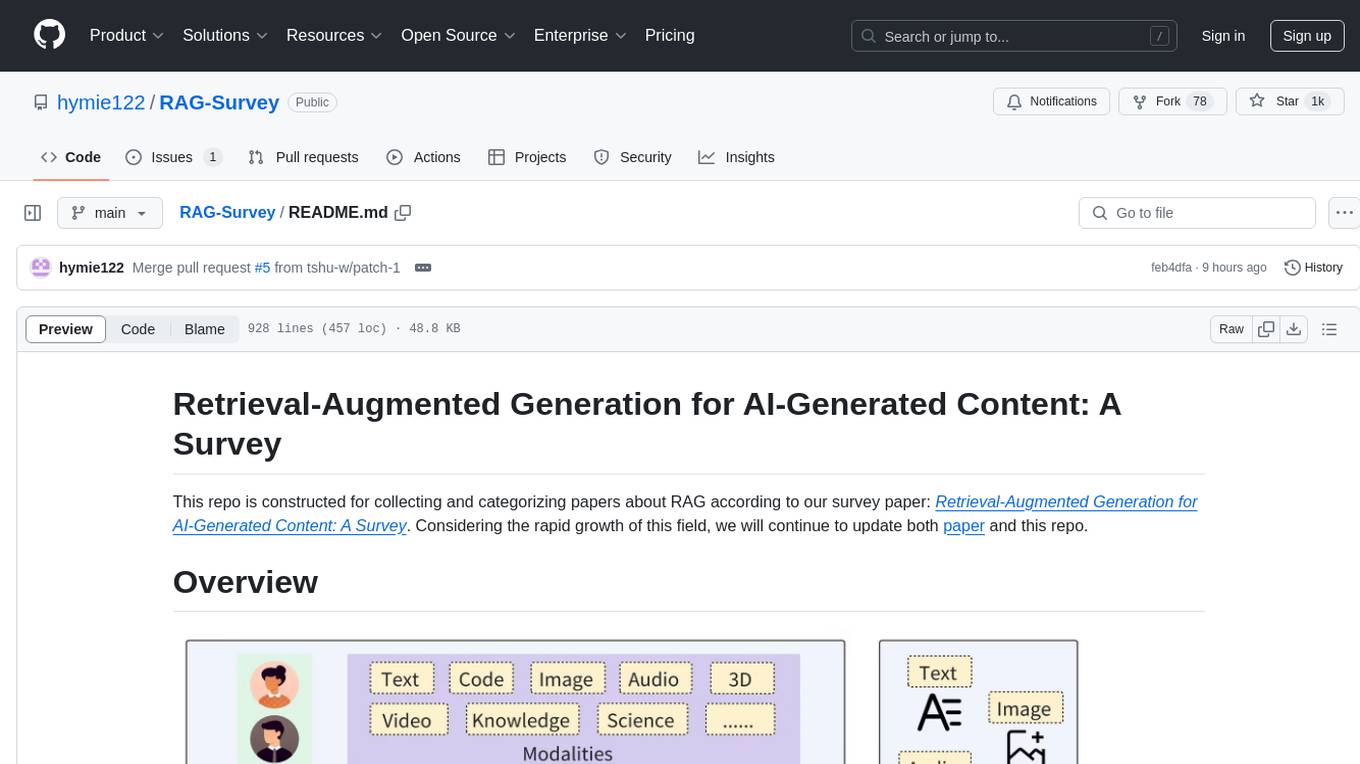
RAG-Survey
This repository is dedicated to collecting and categorizing papers related to Retrieval-Augmented Generation (RAG) for AI-generated content. It serves as a survey repository based on the paper 'Retrieval-Augmented Generation for AI-Generated Content: A Survey'. The repository is continuously updated to keep up with the rapid growth in the field of RAG.
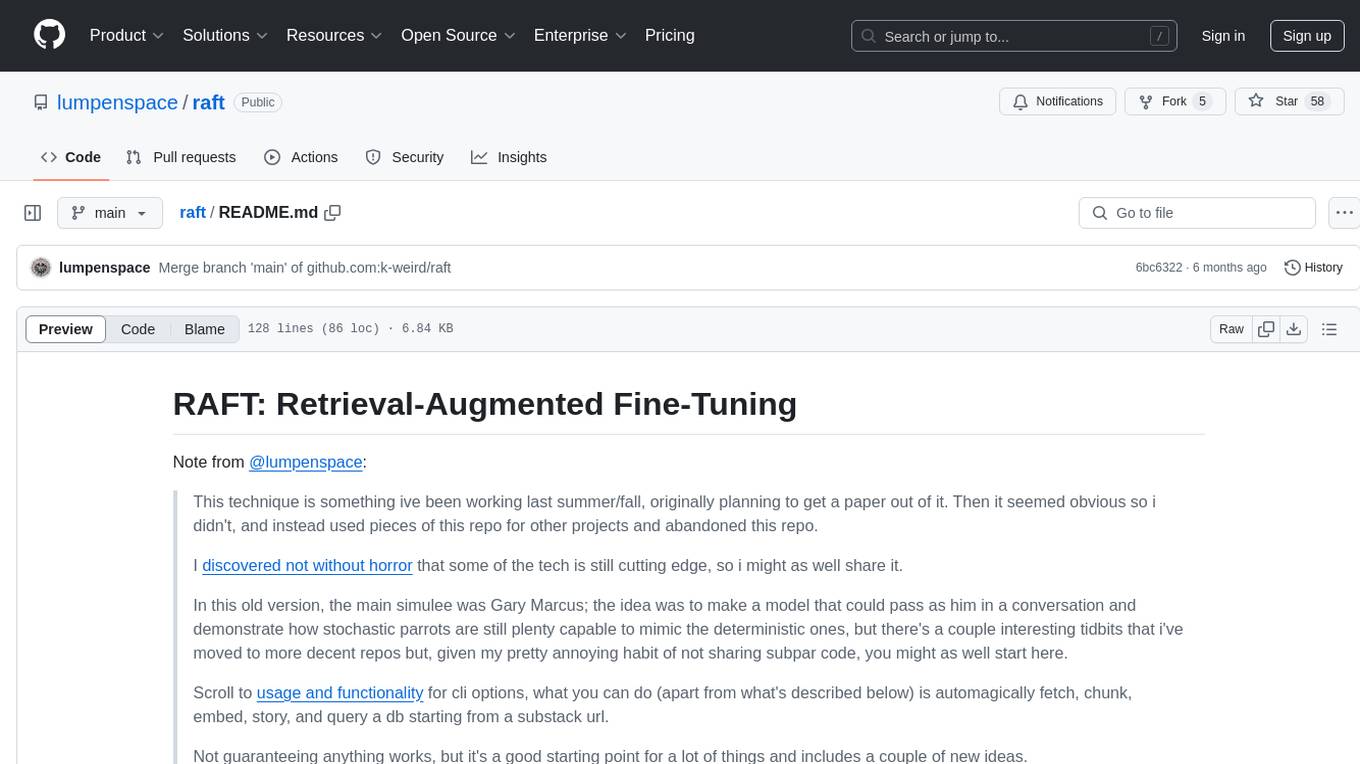
raft
RAFT (Retrieval-Augmented Fine-Tuning) is a method for creating conversational agents that realistically emulate specific human targets. It involves a dual-phase process of fine-tuning and retrieval-based augmentation to generate nuanced and personalized dialogue. The tool is designed to combine interview transcripts with memories from past writings to enhance language model responses. RAFT has the potential to advance the field of personalized, context-sensitive conversational agents.
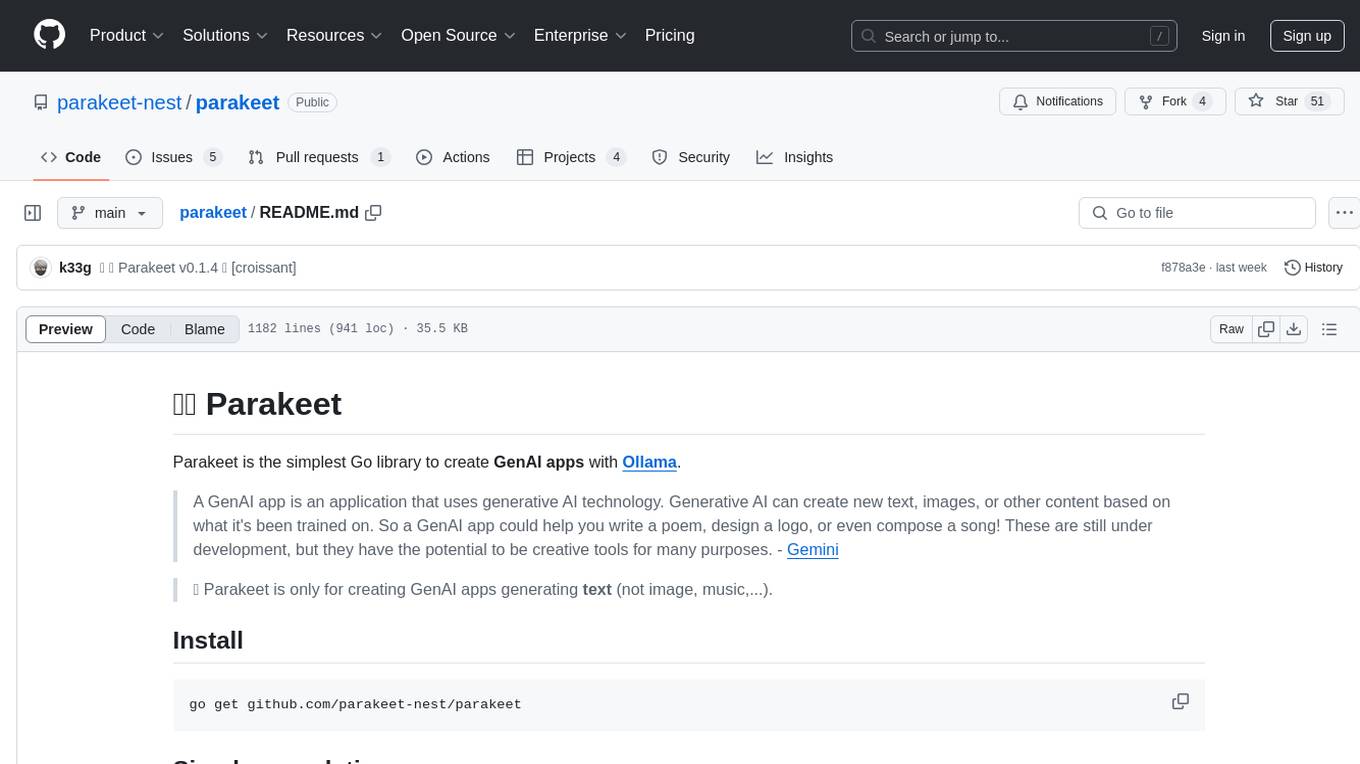
parakeet
Parakeet is a Go library for creating GenAI apps with Ollama. It enables the creation of generative AI applications that can generate text-based content. The library provides tools for simple completion, completion with context, chat completion, and more. It also supports function calling with tools and Wasm plugins. Parakeet allows users to interact with language models and create AI-powered applications easily.
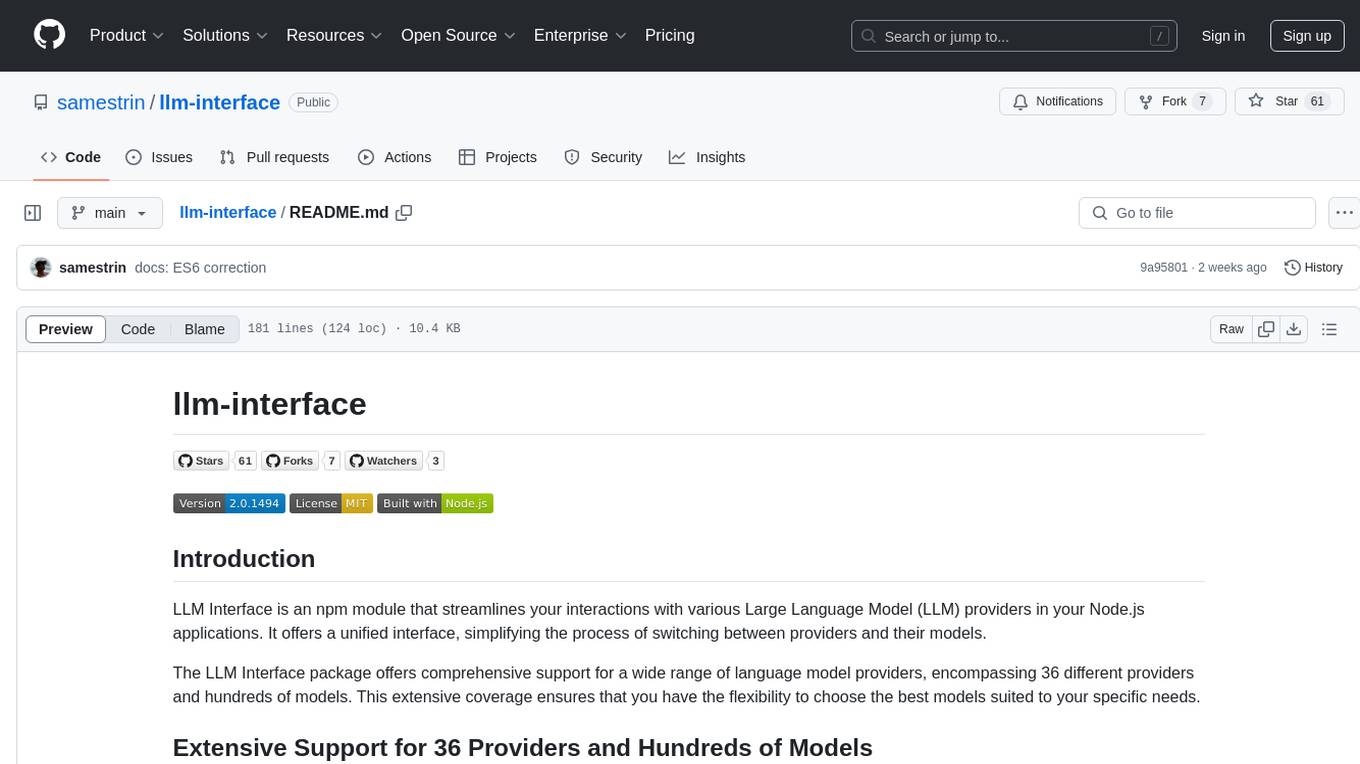
llm-interface
LLM Interface is an npm module that streamlines interactions with various Large Language Model (LLM) providers in Node.js applications. It offers a unified interface for switching between providers and models, supporting 36 providers and hundreds of models. Features include chat completion, streaming, error handling, extensibility, response caching, retries, JSON output, and repair. The package relies on npm packages like axios, @google/generative-ai, dotenv, jsonrepair, and loglevel. Installation is done via npm, and usage involves sending prompts to LLM providers. Tests can be run using npm test. Contributions are welcome under the MIT License.
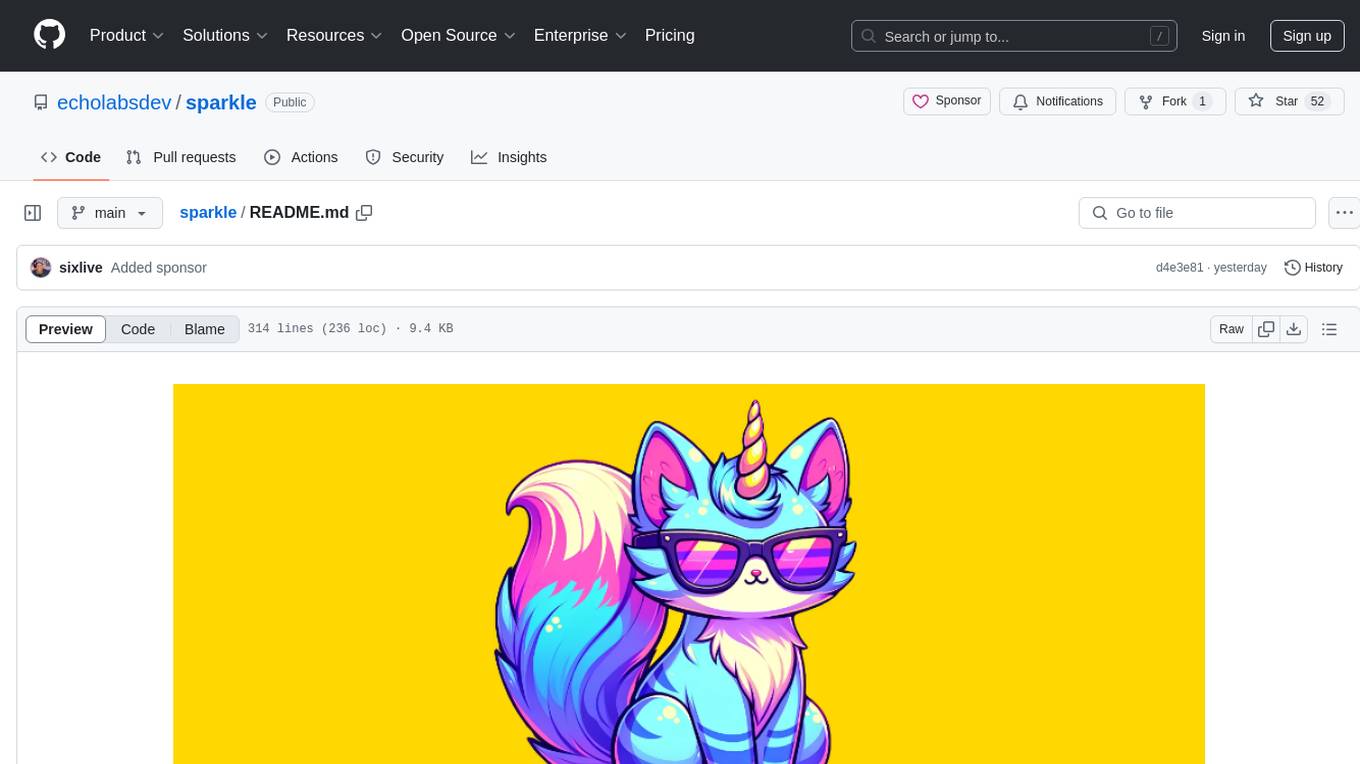
sparkle
Sparkle is a tool that streamlines the process of building AI-driven features in applications using Large Language Models (LLMs). It guides users through creating and managing agents, defining tools, and interacting with LLM providers like OpenAI. Sparkle allows customization of LLM provider settings, model configurations, and provides a seamless integration with Sparkle Server for exposing agents via an OpenAI-compatible chat API endpoint.
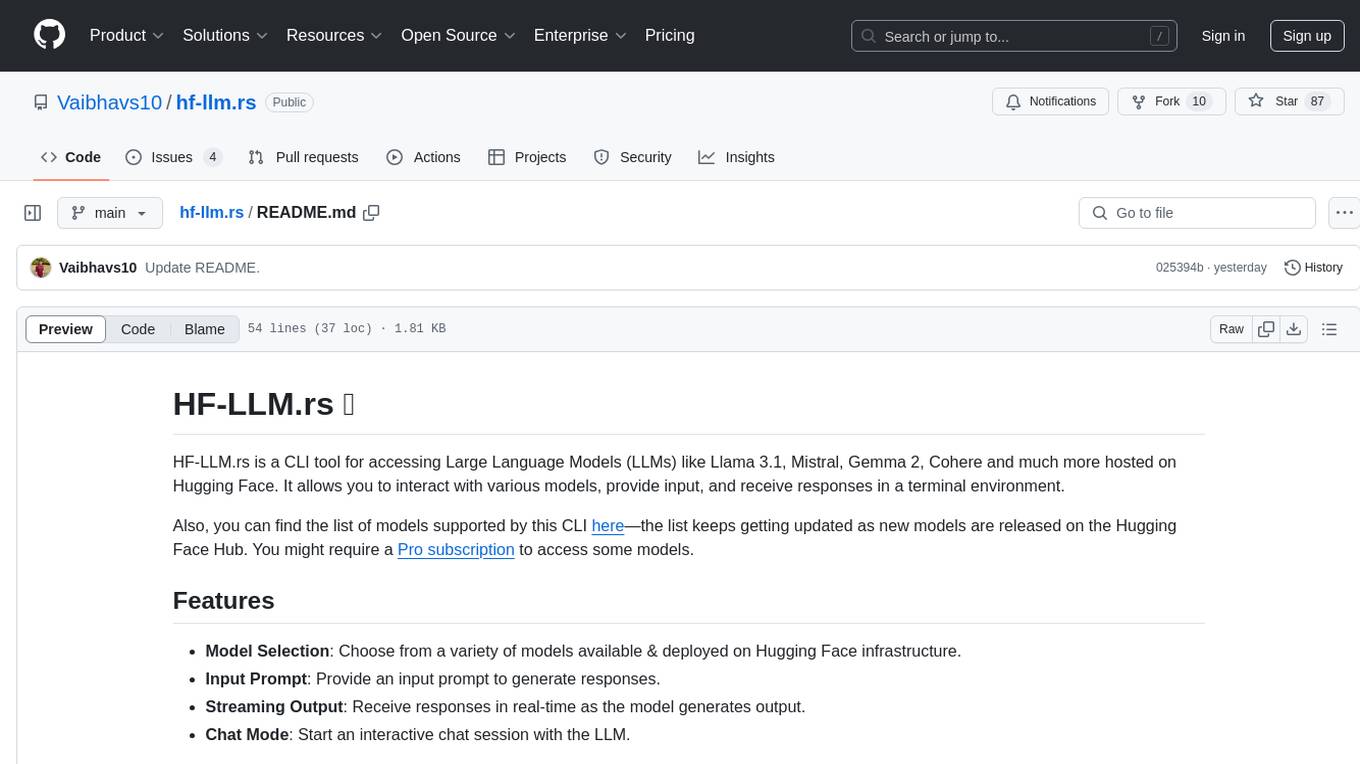
hf-llm.rs
HF-LLM.rs is a CLI tool for accessing Large Language Models (LLMs) like Llama 3.1, Mistral, Gemma 2, Cohere and more hosted on Hugging Face. It allows interaction with various models, providing input and receiving responses in a terminal environment. Users can select models, input prompts, receive streaming output, and engage in chat mode. The tool supports a variety of models available on Hugging Face infrastructure, with the list continuously updated. Some models may require a Pro subscription for access.
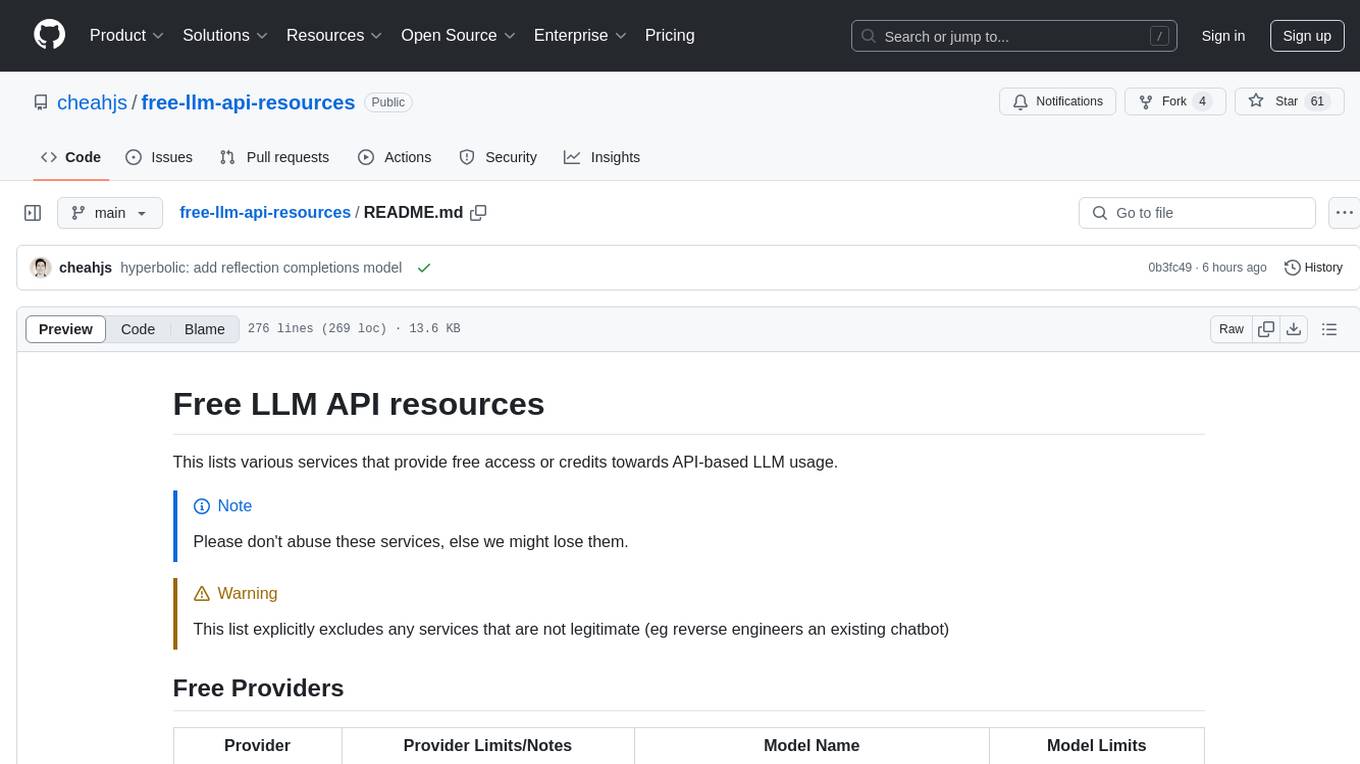
free-llm-api-resources
The 'Free LLM API resources' repository provides a comprehensive list of services offering free access or credits for API-based LLM usage. It includes various providers with details on model names, limits, and notes. Users can find information on legitimate services and their respective usage restrictions to leverage LLM capabilities without incurring costs. The repository aims to assist developers and researchers in accessing AI models for experimentation, development, and learning purposes.
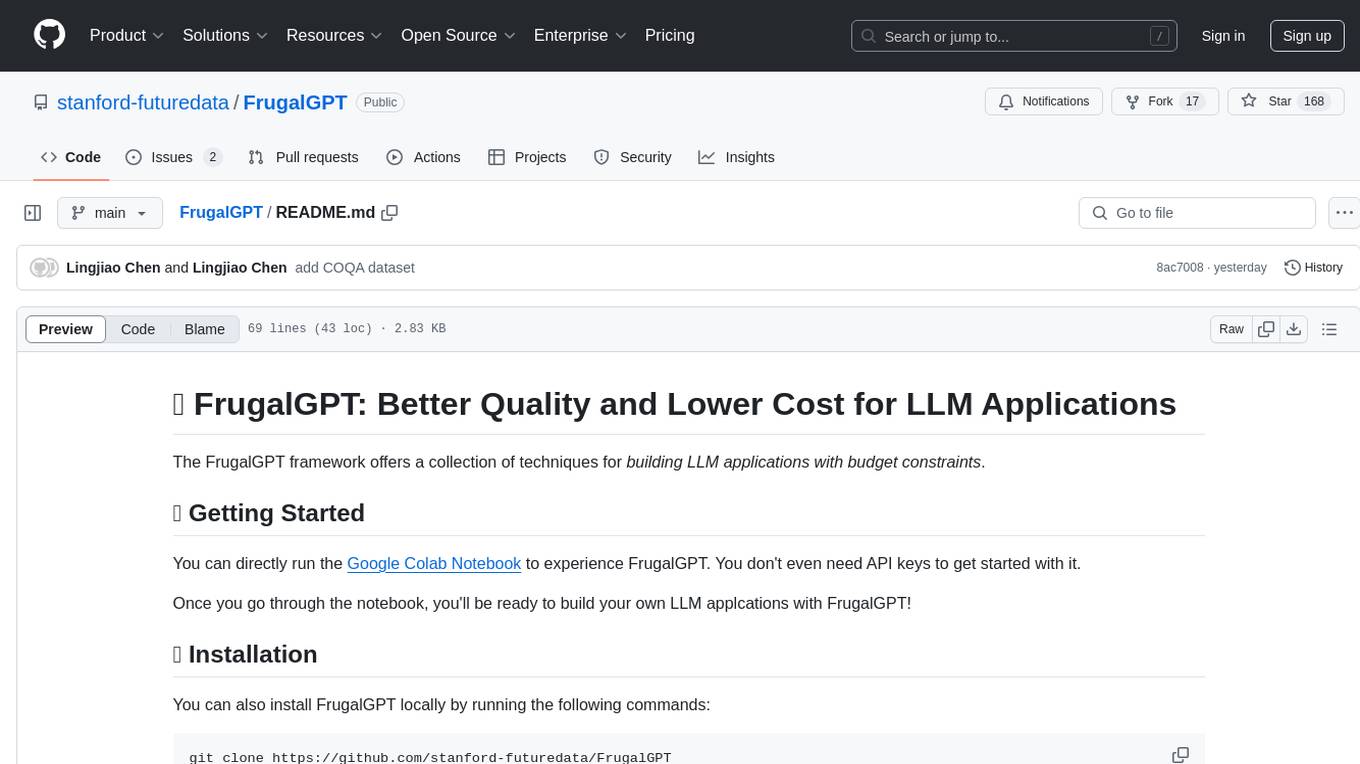
FrugalGPT
FrugalGPT is a framework that offers techniques for building Large Language Model (LLM) applications with budget constraints. It provides a cost-effective solution for utilizing LLMs while maintaining performance. The framework includes support for various models and offers resources for reducing costs and improving efficiency in LLM applications.
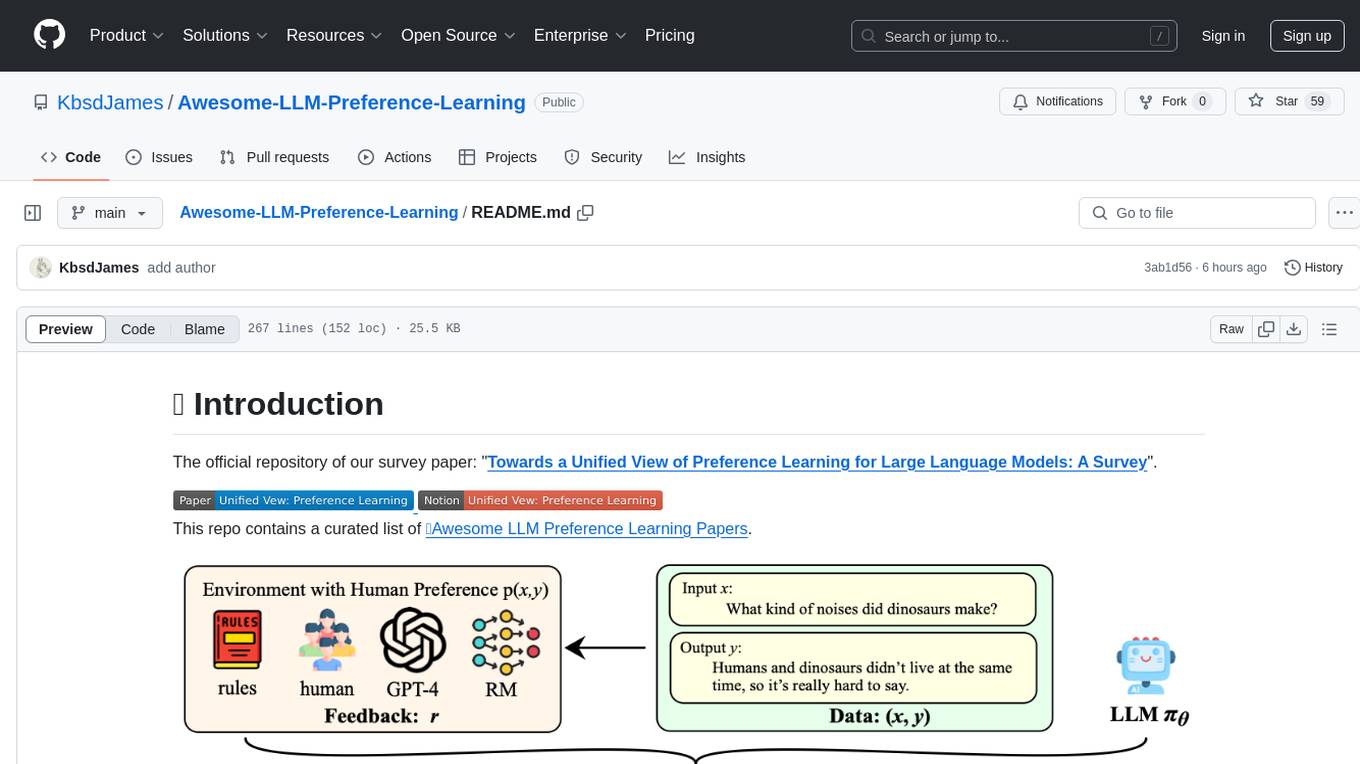
Awesome-LLM-Preference-Learning
The repository 'Awesome-LLM-Preference-Learning' is the official repository of a survey paper titled 'Towards a Unified View of Preference Learning for Large Language Models: A Survey'. It contains a curated list of papers related to preference learning for Large Language Models (LLMs). The repository covers various aspects of preference learning, including on-policy and off-policy methods, feedback mechanisms, reward models, algorithms, evaluation techniques, and more. The papers included in the repository explore different approaches to aligning LLMs with human preferences, improving mathematical reasoning in LLMs, enhancing code generation, and optimizing language model performance.
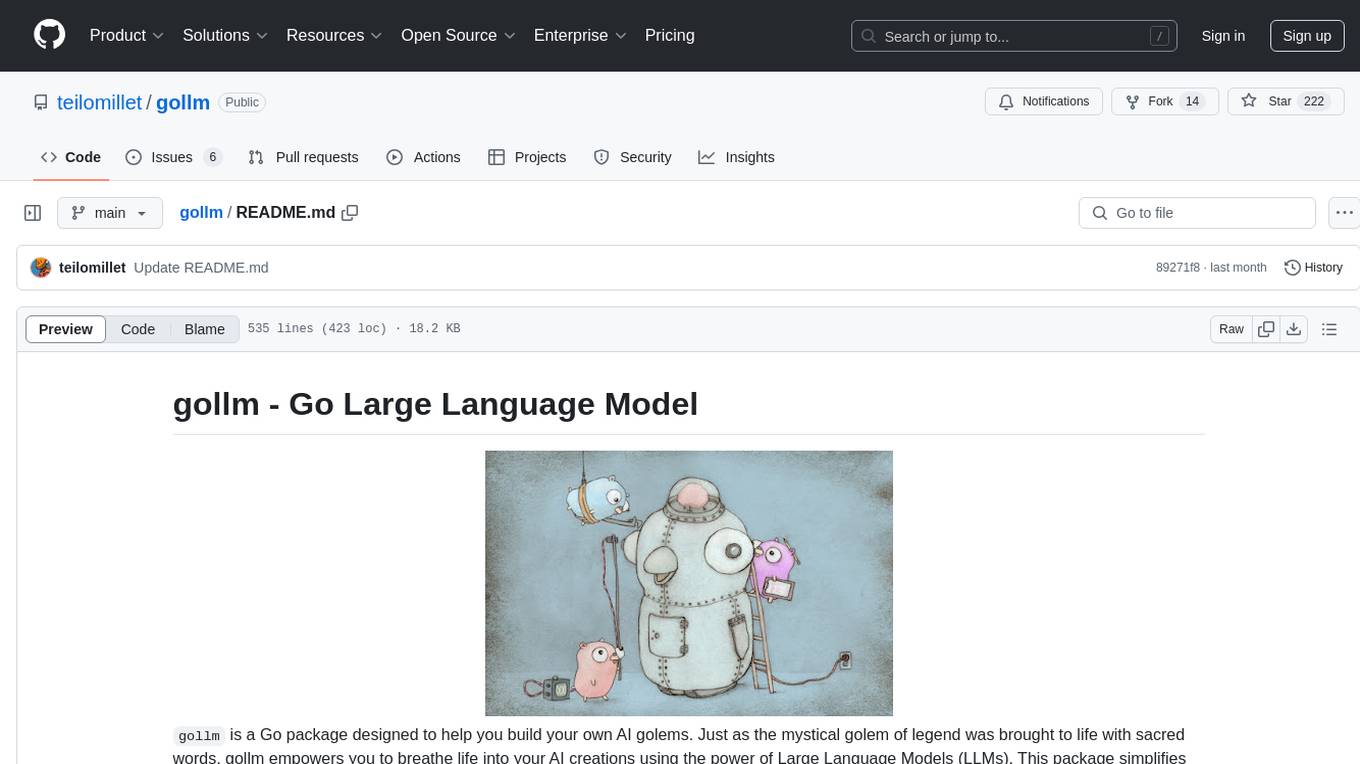
gollm
gollm is a Go package designed to simplify interactions with Large Language Models (LLMs) for AI engineers and developers. It offers a unified API for multiple LLM providers, easy provider and model switching, flexible configuration options, advanced prompt engineering, prompt optimization, memory retention, structured output and validation, provider comparison tools, high-level AI functions, robust error handling and retries, and extensible architecture. The package enables users to create AI-powered golems for tasks like content creation workflows, complex reasoning tasks, structured data generation, model performance analysis, prompt optimization, and creating a mixture of agents.
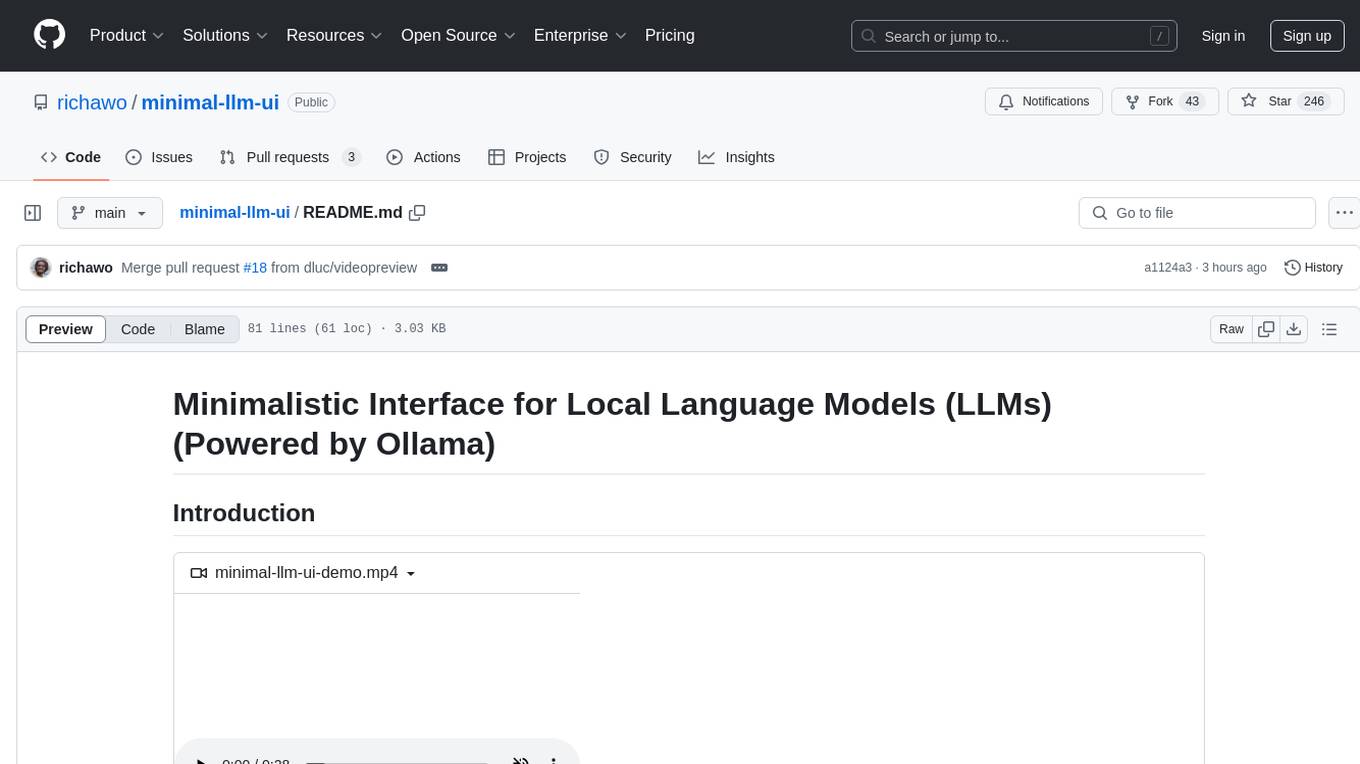
minimal-llm-ui
This minimalistic UI serves as a simple interface for Ollama models, enabling real-time interaction with Local Language Models (LLMs). Users can chat with models, switch between different LLMs, save conversations, and create parameter-driven prompt templates. The tool is built using React, Next.js, and Tailwind CSS, with seamless integration with LangchainJs and Ollama for efficient model switching and context storage.
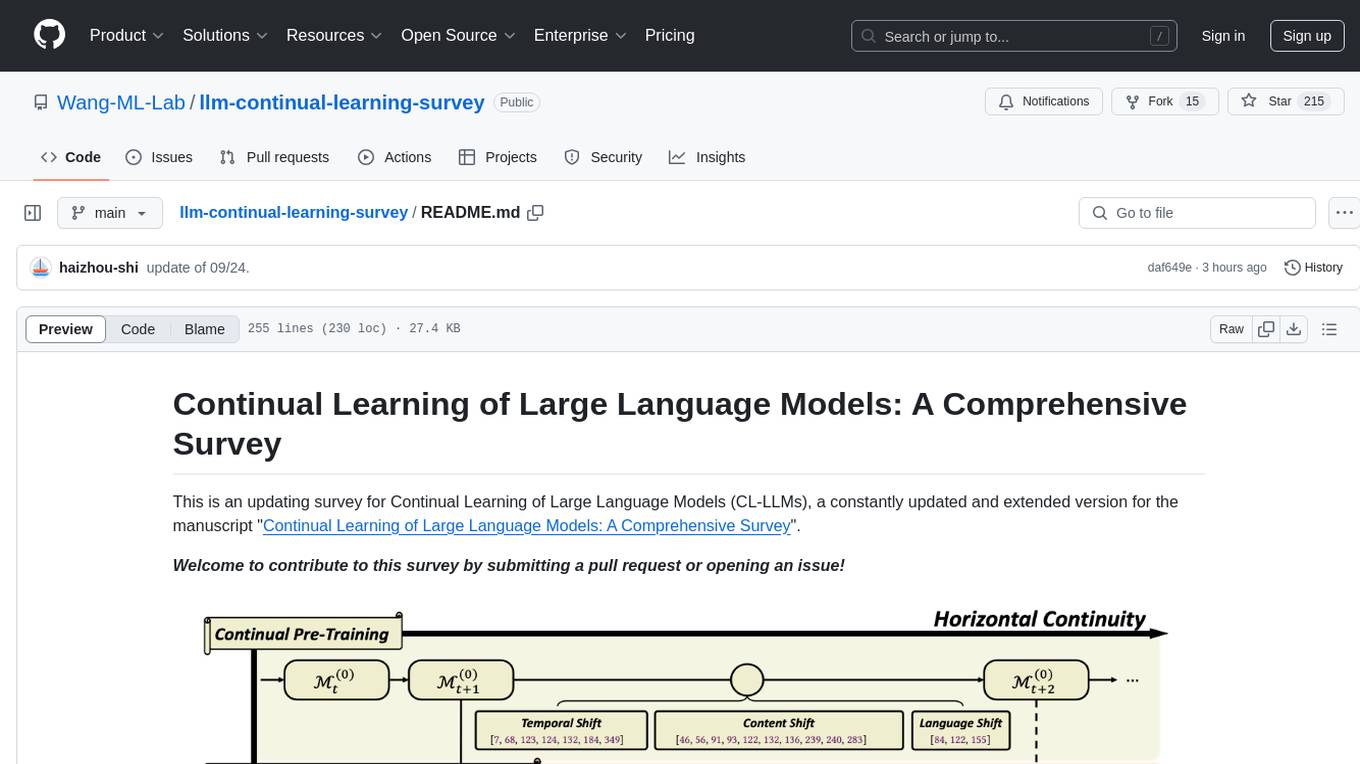
llm-continual-learning-survey
This repository is an updating survey for Continual Learning of Large Language Models (CL-LLMs), providing a comprehensive overview of various aspects related to the continual learning of large language models. It covers topics such as continual pre-training, domain-adaptive pre-training, continual fine-tuning, model refinement, model alignment, multimodal LLMs, and miscellaneous aspects. The survey includes a collection of relevant papers, each focusing on different areas within the field of continual learning of large language models.
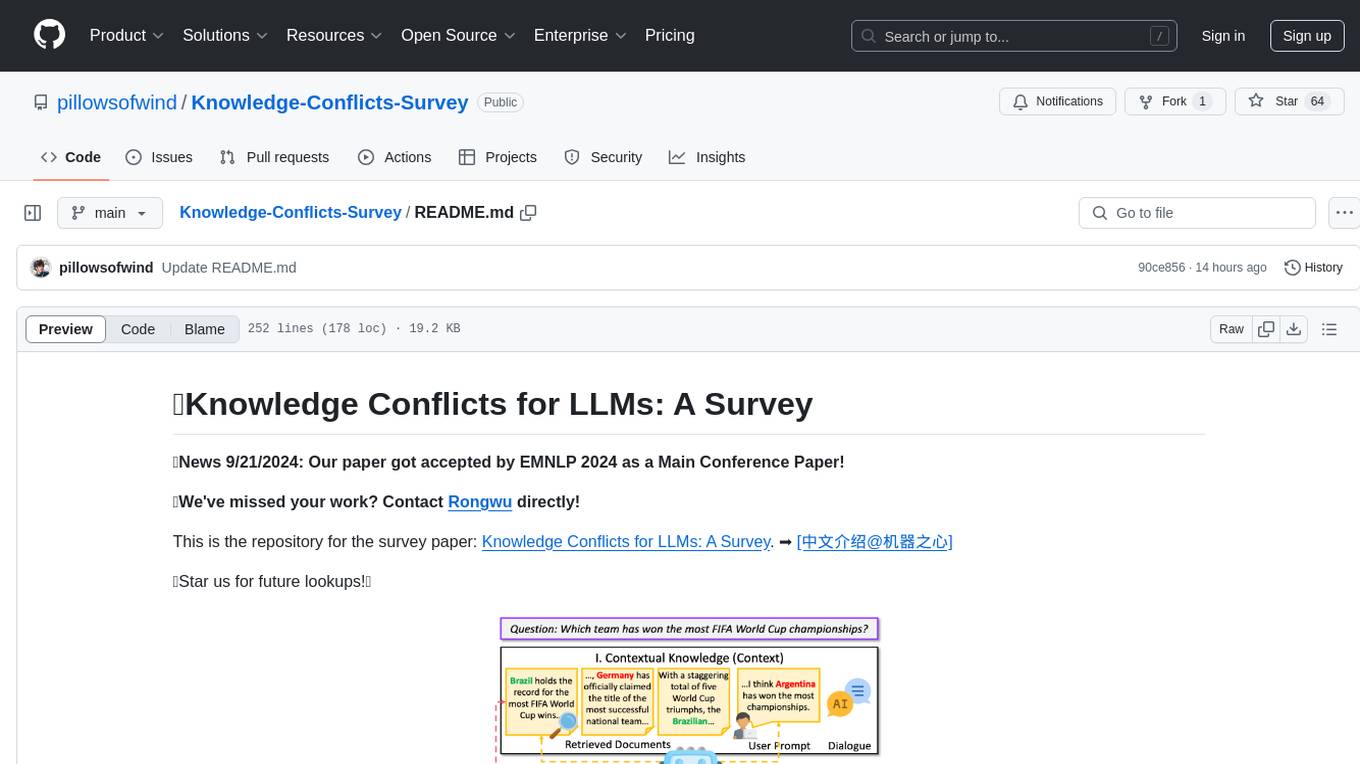
Knowledge-Conflicts-Survey
Knowledge Conflicts for LLMs: A Survey is a repository containing a survey paper that investigates three types of knowledge conflicts: context-memory conflict, inter-context conflict, and intra-memory conflict within Large Language Models (LLMs). The survey reviews the causes, behaviors, and possible solutions to these conflicts, providing a comprehensive analysis of the literature in this area. The repository includes detailed information on the types of conflicts, their causes, behavior analysis, and mitigating solutions, offering insights into how conflicting knowledge affects LLMs and how to address these conflicts.
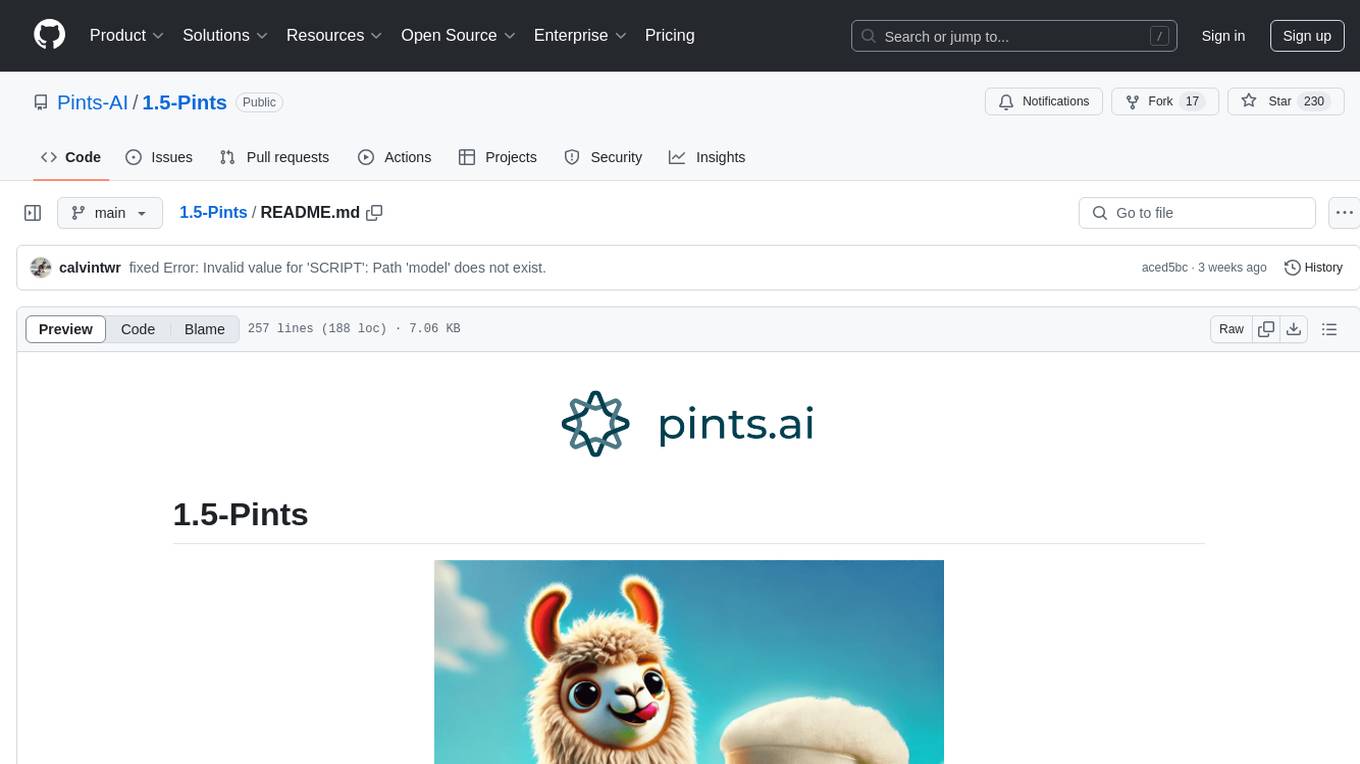
1.5-Pints
1.5-Pints is a repository that provides a recipe to pre-train models in 9 days, aiming to create AI assistants comparable to Apple OpenELM and Microsoft Phi. It includes model architecture, training scripts, and utilities for 1.5-Pints and 0.12-Pint developed by Pints.AI. The initiative encourages replication, experimentation, and open-source development of Pint by sharing the model's codebase and architecture. The repository offers installation instructions, dataset preparation scripts, model training guidelines, and tools for model evaluation and usage. Users can also find information on finetuning models, converting lit models to HuggingFace models, and running Direct Preference Optimization (DPO) post-finetuning. Additionally, the repository includes tests to ensure code modifications do not disrupt the existing functionality.
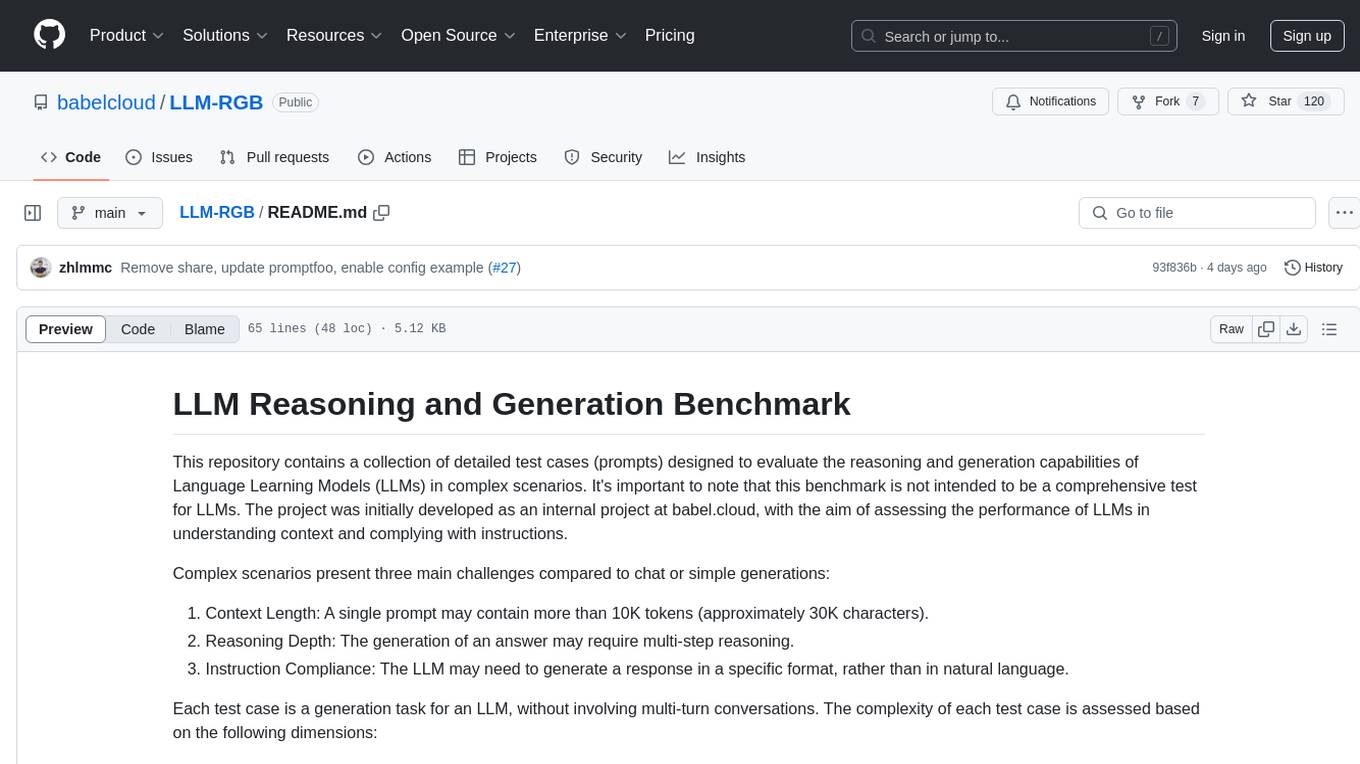
LLM-RGB
LLM-RGB is a repository containing a collection of detailed test cases designed to evaluate the reasoning and generation capabilities of Language Learning Models (LLMs) in complex scenarios. The benchmark assesses LLMs' performance in understanding context, complying with instructions, and handling challenges like long context lengths, multi-step reasoning, and specific response formats. Each test case evaluates an LLM's output based on context length difficulty, reasoning depth difficulty, and instruction compliance difficulty, with a final score calculated for each test case. The repository provides a score table, evaluation details, and quick start guide for running evaluations using promptfoo testing tools.

chatluna
Chatluna is a machine learning model plugin that provides chat services with large language models. It is highly extensible, supports multiple output formats, and offers features like custom conversation presets, rate limiting, and context awareness. Users can deploy Chatluna under Koishi without additional configuration. The plugin supports various models/platforms like OpenAI, Azure OpenAI, Google Gemini, and more. It also provides preset customization using YAML files and allows for easy forking and development within Koishi projects. However, the project lacks web UI, HTTP server, and project documentation, inviting contributions from the community.
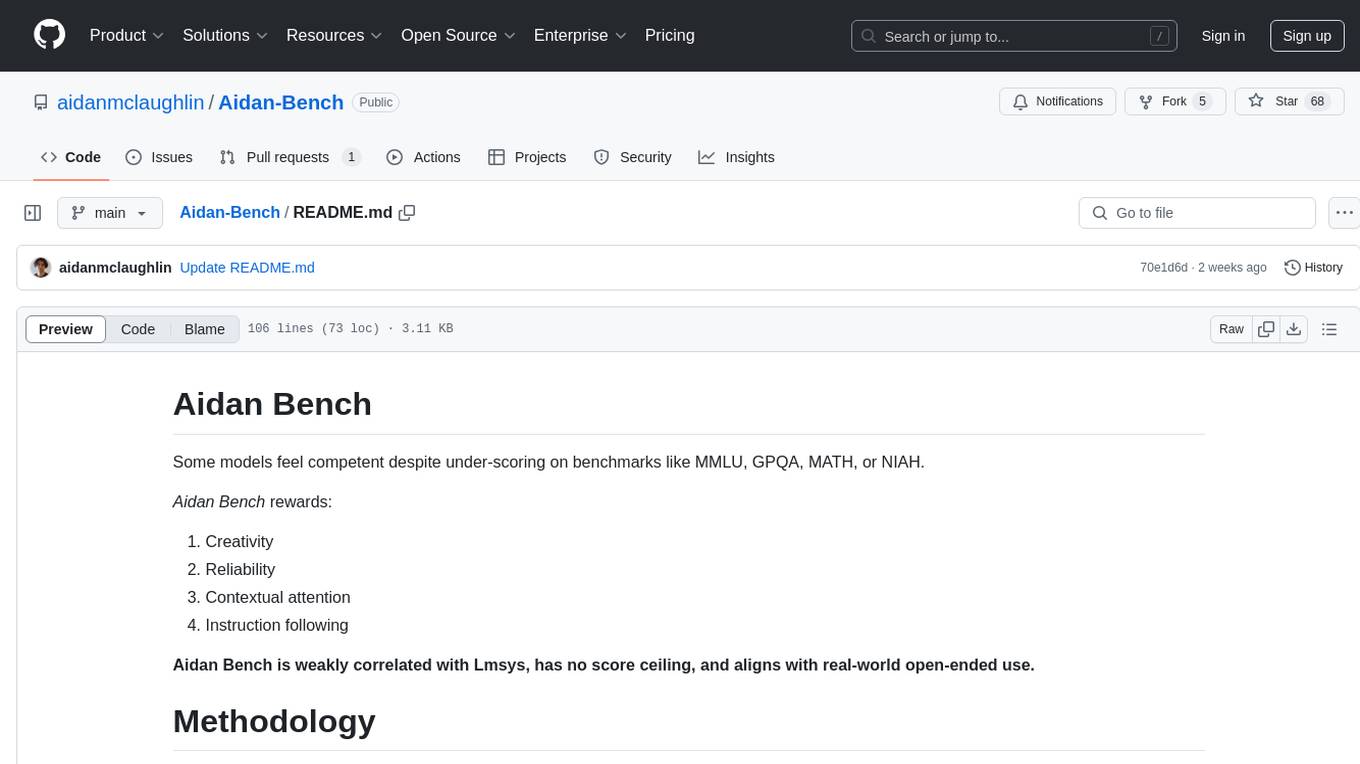
Aidan-Bench
Aidan Bench is a tool that rewards creativity, reliability, contextual attention, and instruction following. It is weakly correlated with Lmsys, has no score ceiling, and aligns with real-world open-ended use. The tool involves giving LLMs open-ended questions and evaluating their answers based on novelty scores. Users can set up the tool by installing required libraries and setting up API keys. The project allows users to run benchmarks for different models and provides flexibility in threading options.
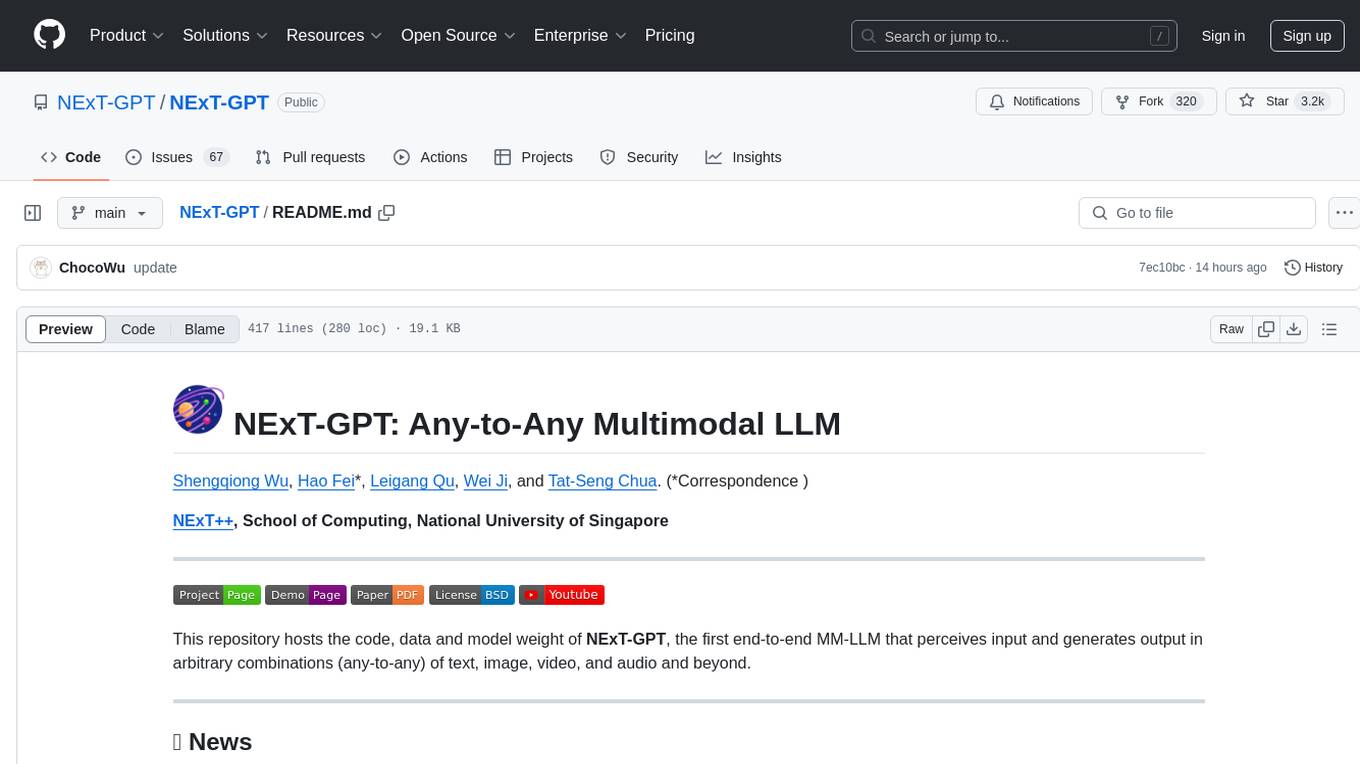
NExT-GPT
NExT-GPT is an end-to-end multimodal large language model that can process input and generate output in various combinations of text, image, video, and audio. It leverages existing pre-trained models and diffusion models with end-to-end instruction tuning. The repository contains code, data, and model weights for NExT-GPT, allowing users to work with different modalities and perform tasks like encoding, understanding, reasoning, and generating multimodal content.
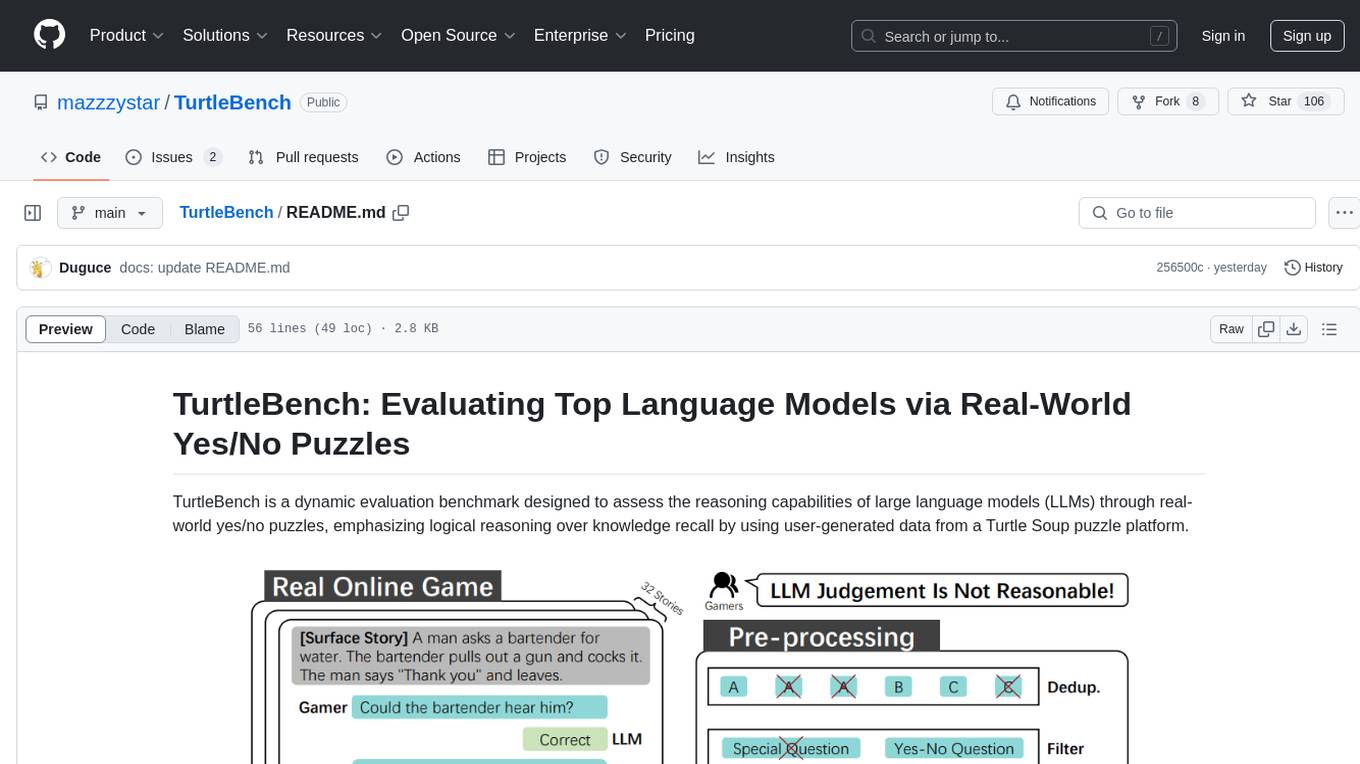
TurtleBench
TurtleBench is a dynamic evaluation benchmark that assesses the reasoning capabilities of large language models through real-world yes/no puzzles. It emphasizes logical reasoning over knowledge recall by using user-generated data from a Turtle Soup puzzle platform. The benchmark is objective and unbiased, focusing purely on reasoning abilities and providing clear, measurable outcomes for easy comparison. TurtleBench constantly evolves with real user-generated questions, making it impossible to 'game' the system. It tests the model's ability to comprehend context and make logical inferences.
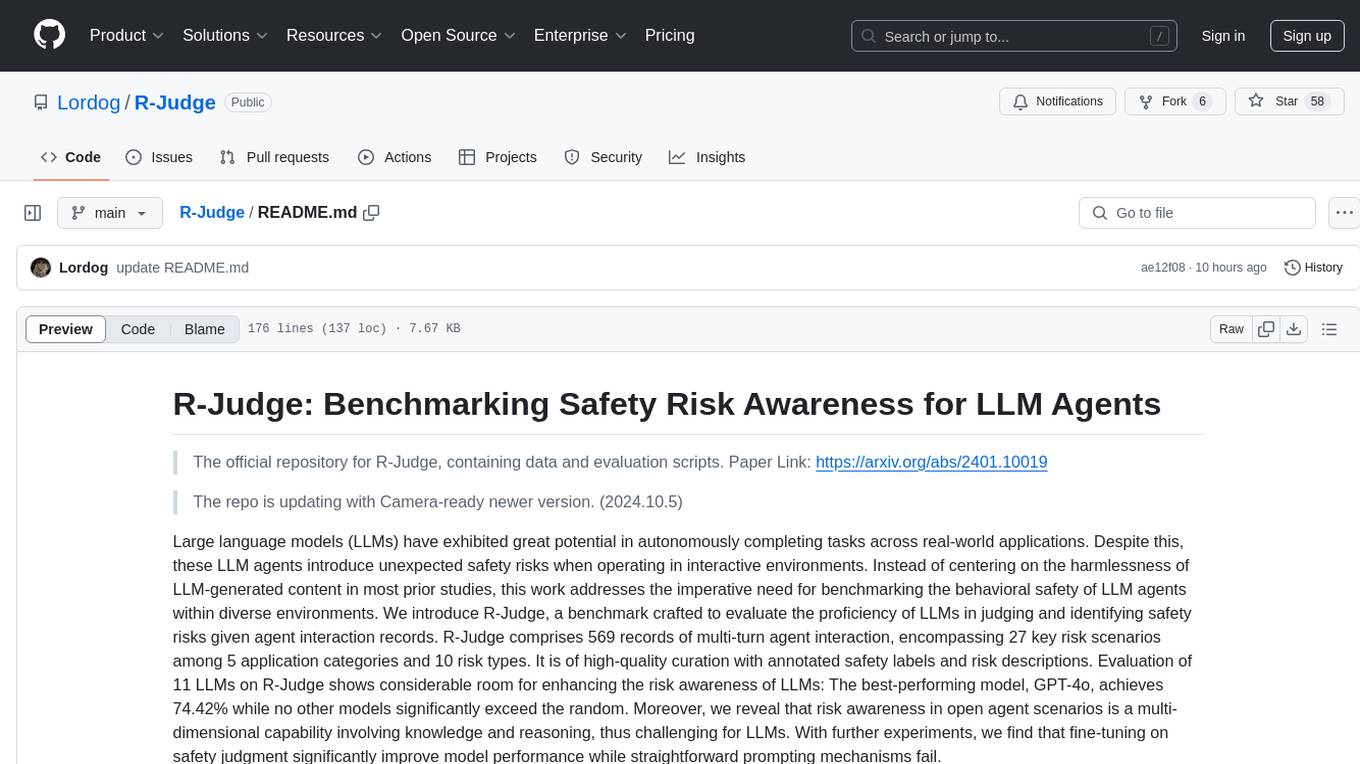
R-Judge
R-Judge is a benchmarking tool designed to evaluate the proficiency of Large Language Models (LLMs) in judging and identifying safety risks within diverse environments. It comprises 569 records of multi-turn agent interactions, covering 27 key risk scenarios across 5 application categories and 10 risk types. The tool provides high-quality curation with annotated safety labels and risk descriptions. Evaluation of 11 LLMs on R-Judge reveals the need for enhancing risk awareness in LLMs, especially in open agent scenarios. Fine-tuning on safety judgment is found to significantly improve model performance.

llm_client
llm_client is a Rust interface designed for Local Large Language Models (LLMs) that offers automated build support for CPU, CUDA, MacOS, easy model presets, and a novel cascading prompt workflow for controlled generation. It provides a breadth of configuration options and API support for various OpenAI compatible APIs. The tool is primarily focused on deterministic signals from probabilistic LLM vibes, enabling specialized workflows for specific tasks and reproducible outcomes.
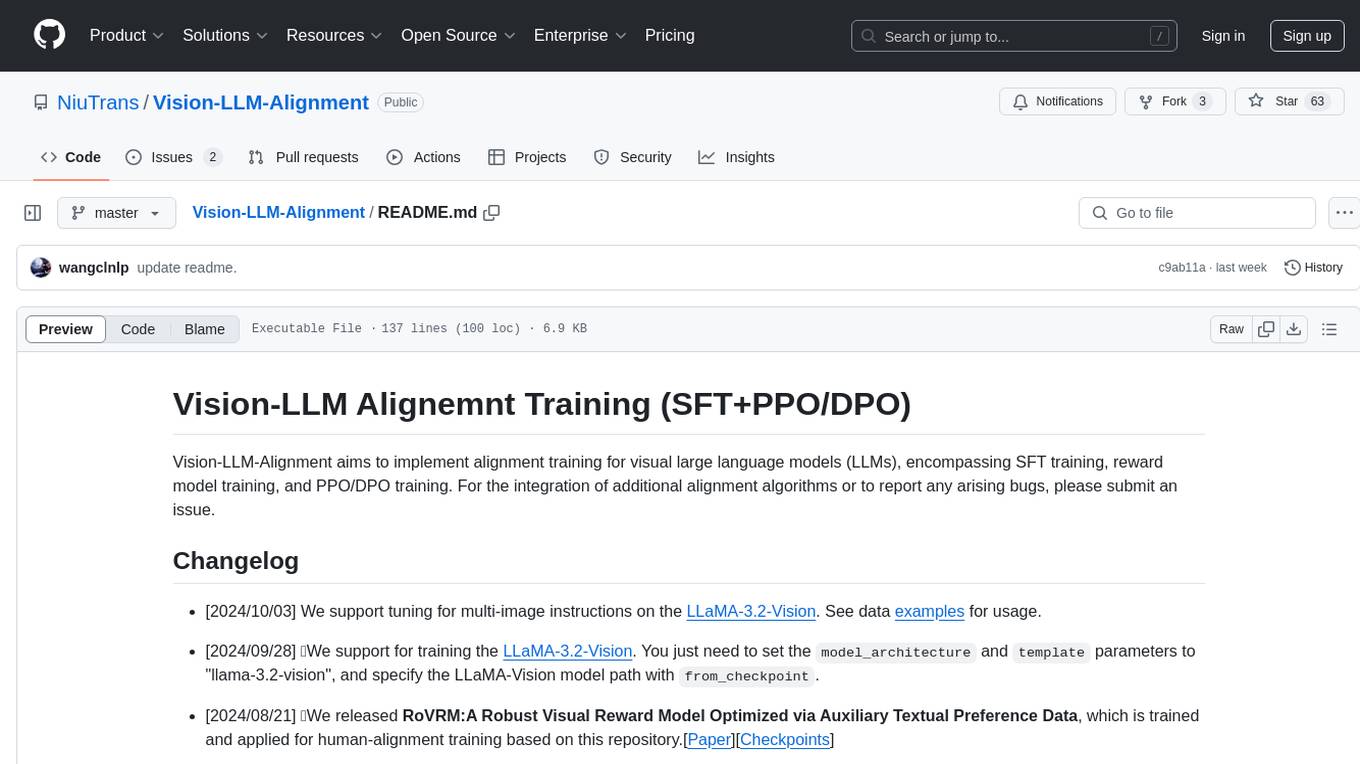
Vision-LLM-Alignment
Vision-LLM-Alignment is a repository focused on implementing alignment training for visual large language models (LLMs), including SFT training, reward model training, and PPO/DPO training. It supports various model architectures and provides datasets for training. The repository also offers benchmark results and installation instructions for users.
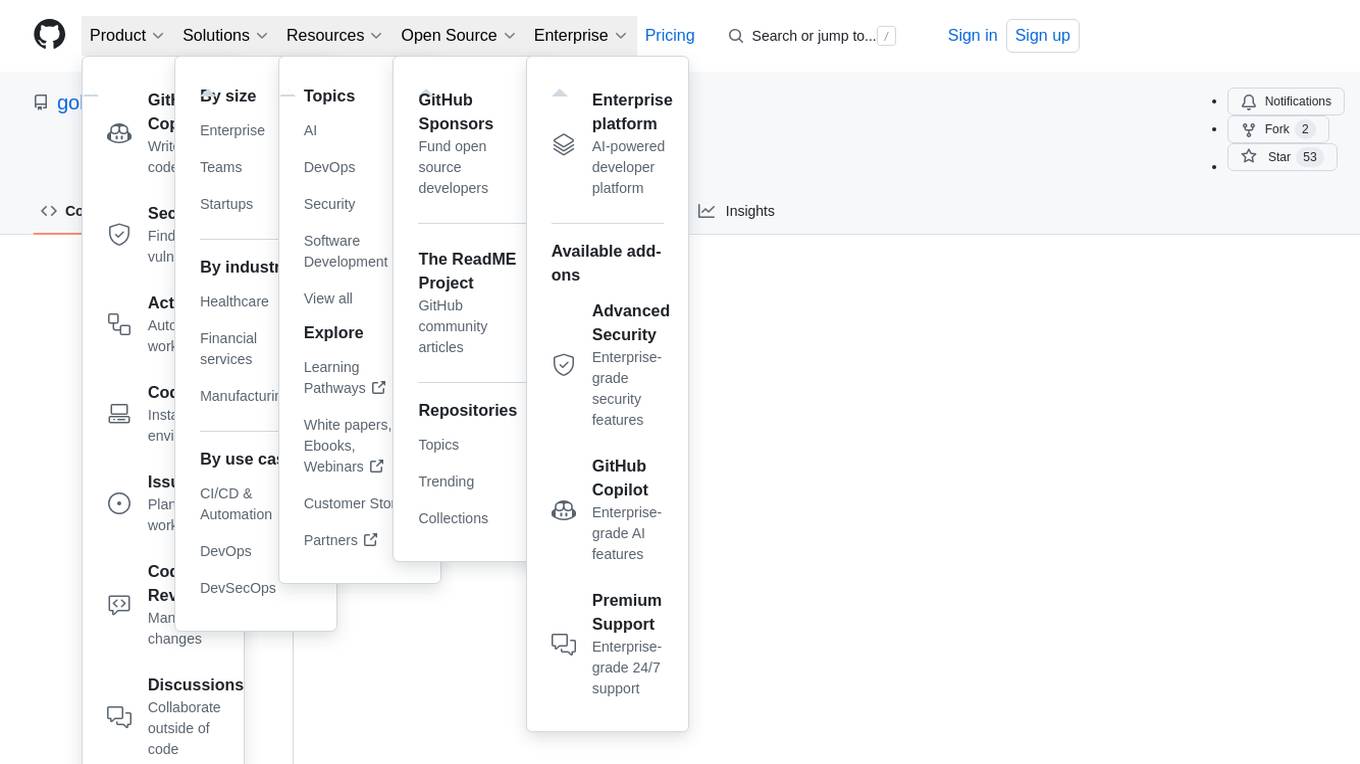
ComfyUI-fal-API
ComfyUI-fal-API is a repository containing custom nodes for using Flux models with fal API in ComfyUI. It provides nodes for image generation, video generation, language models, and vision language models. Users can easily install and configure the repository to access various nodes for different tasks such as generating images, creating videos, processing text, and understanding images. The repository also includes troubleshooting steps and is licensed under the Apache License 2.0.
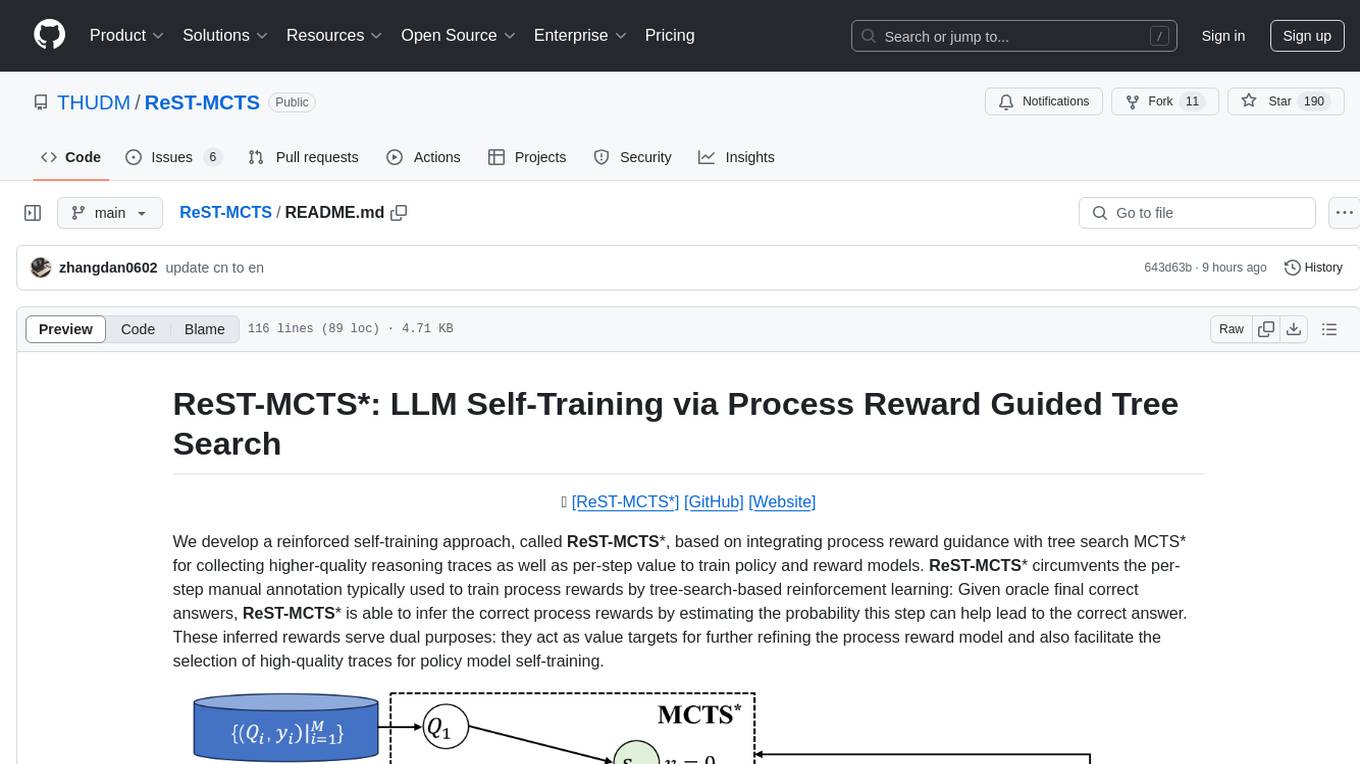
ReST-MCTS
ReST-MCTS is a reinforced self-training approach that integrates process reward guidance with tree search MCTS to collect higher-quality reasoning traces and per-step value for training policy and reward models. It eliminates the need for manual per-step annotation by estimating the probability of steps leading to correct answers. The inferred rewards refine the process reward model and aid in selecting high-quality traces for policy model self-training.
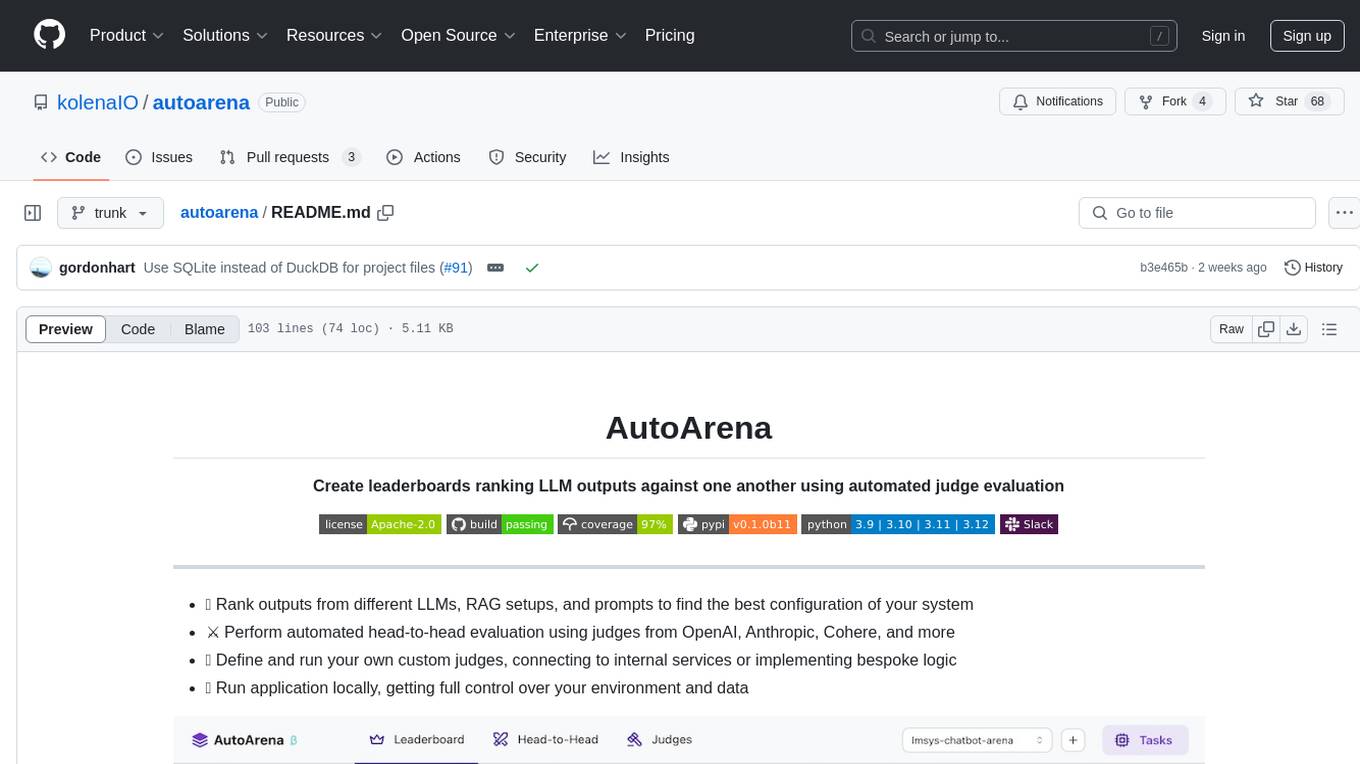
autoarena
AutoArena is a tool designed to create leaderboards ranking Language Model outputs against one another using automated judge evaluation. It allows users to rank outputs from different LLMs, RAG setups, and prompts to find the best configuration of their system. Users can perform automated head-to-head evaluation using judges from various platforms like OpenAI, Anthropic, and Cohere. Additionally, users can define and run custom judges, connect to internal services, or implement bespoke logic. AutoArena enables users to run the application locally, providing full control over their environment and data.
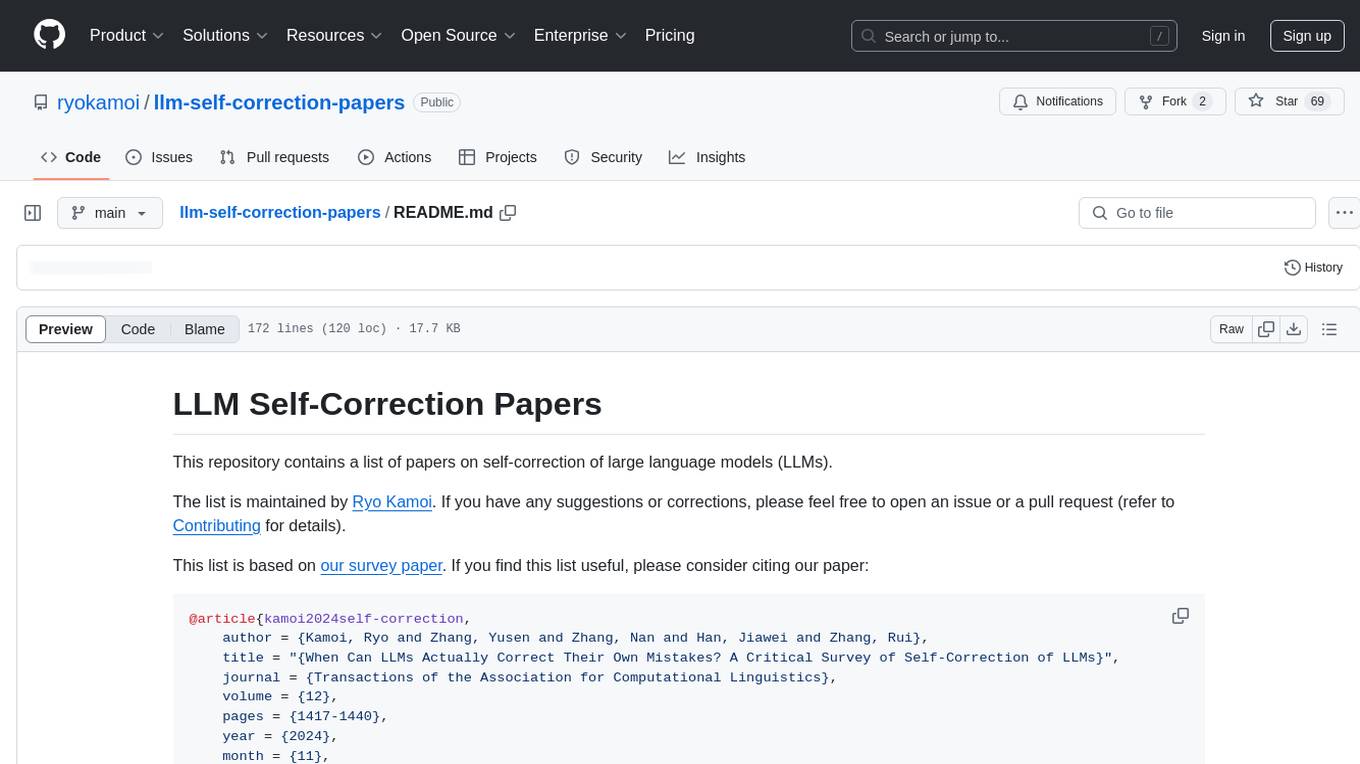
llm-self-correction-papers
This repository contains a curated list of papers focusing on the self-correction of large language models (LLMs) during inference. It covers various frameworks for self-correction, including intrinsic self-correction, self-correction with external tools, self-correction with information retrieval, and self-correction with training designed specifically for self-correction. The list includes survey papers, negative results, and frameworks utilizing reinforcement learning and OpenAI o1-like approaches. Contributions are welcome through pull requests following a specific format.
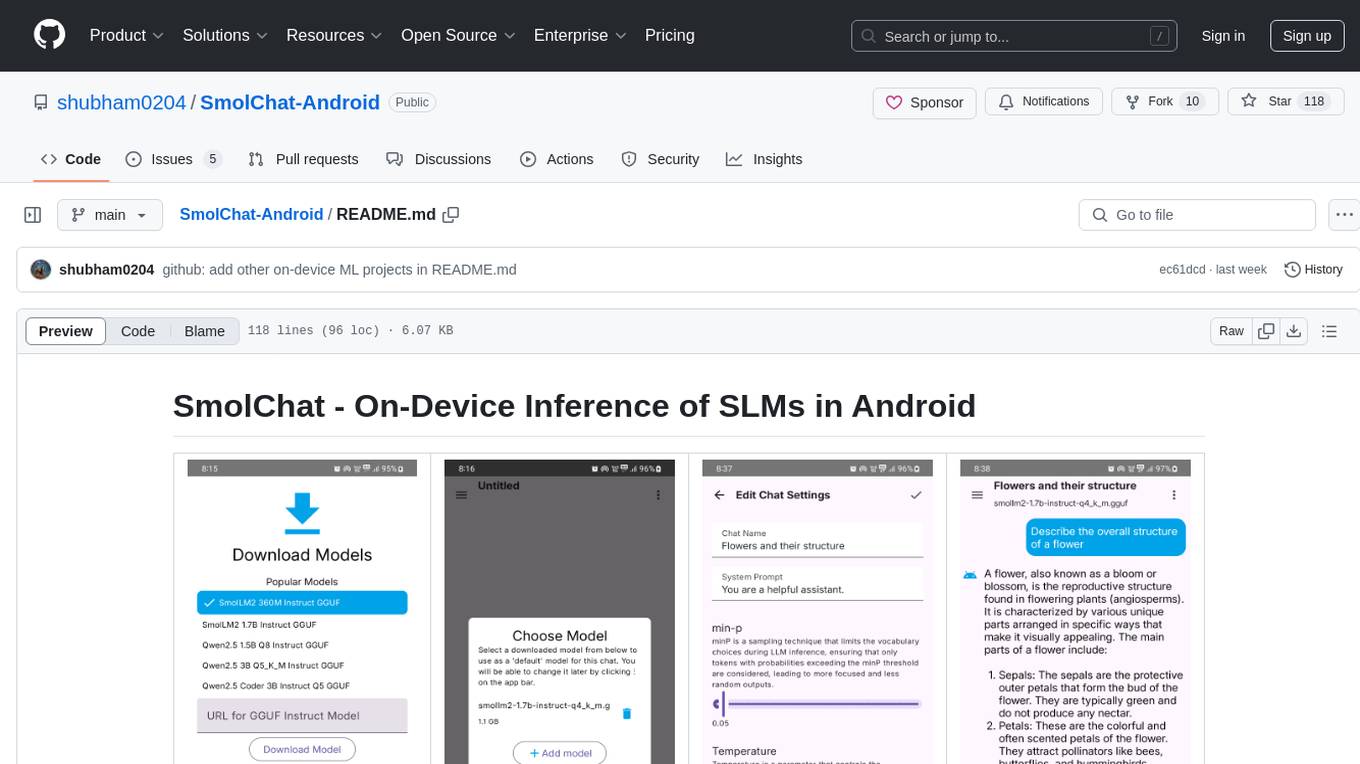
SmolChat-Android
SmolChat-Android is a mobile application that enables users to interact with local small language models (SLMs) on-device. Users can add/remove SLMs, modify system prompts and inference parameters, create downstream tasks, and generate responses. The app uses llama.cpp for model execution, ObjectBox for database storage, and Markwon for markdown rendering. It provides a simple, extensible codebase for on-device machine learning projects.
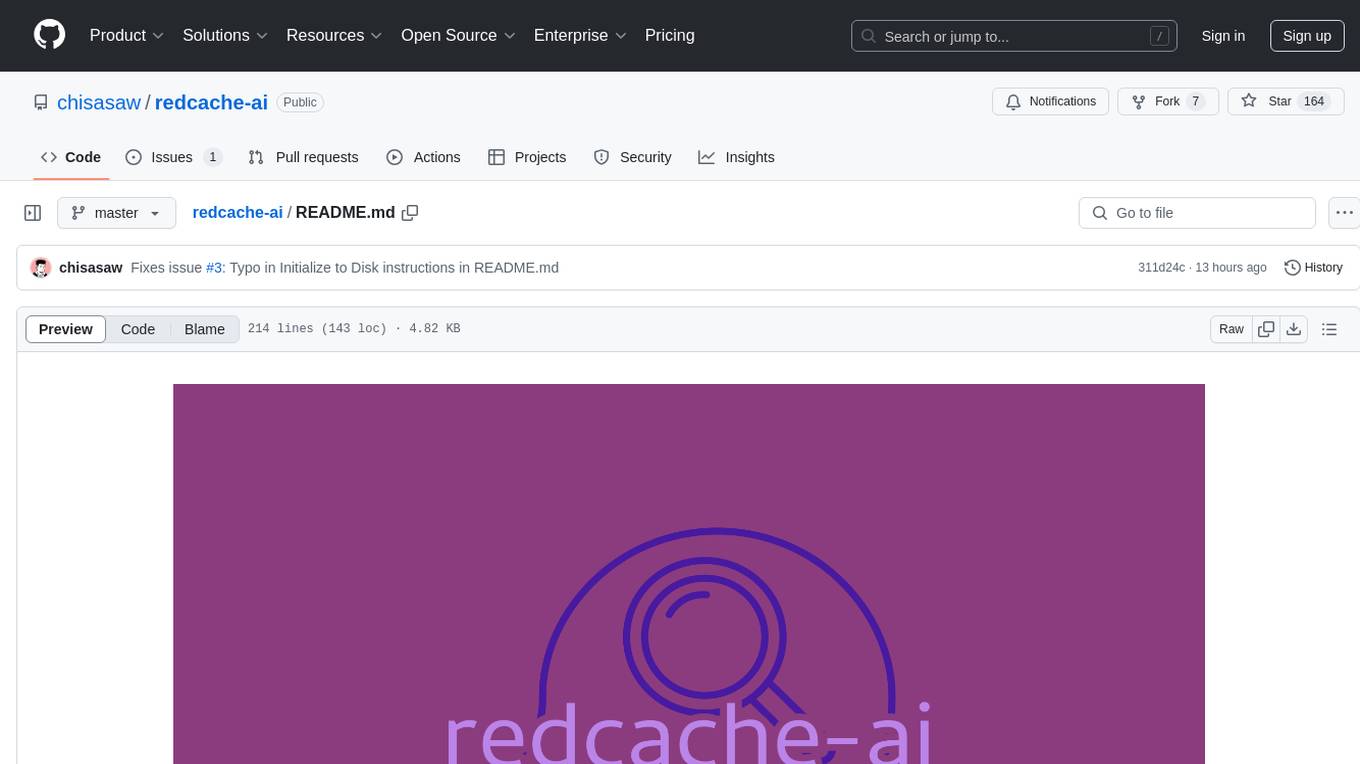
redcache-ai
RedCache-ai is a memory framework designed for Large Language Models and Agents. It provides a dynamic memory framework for developers to build various applications, from AI-powered dating apps to healthcare diagnostics platforms. Users can store, retrieve, search, update, and delete memories using RedCache-ai. The tool also supports integration with OpenAI for enhancing memories. RedCache-ai aims to expand its functionality by integrating with more LLM providers, adding support for AI Agents, and providing a hosted version.
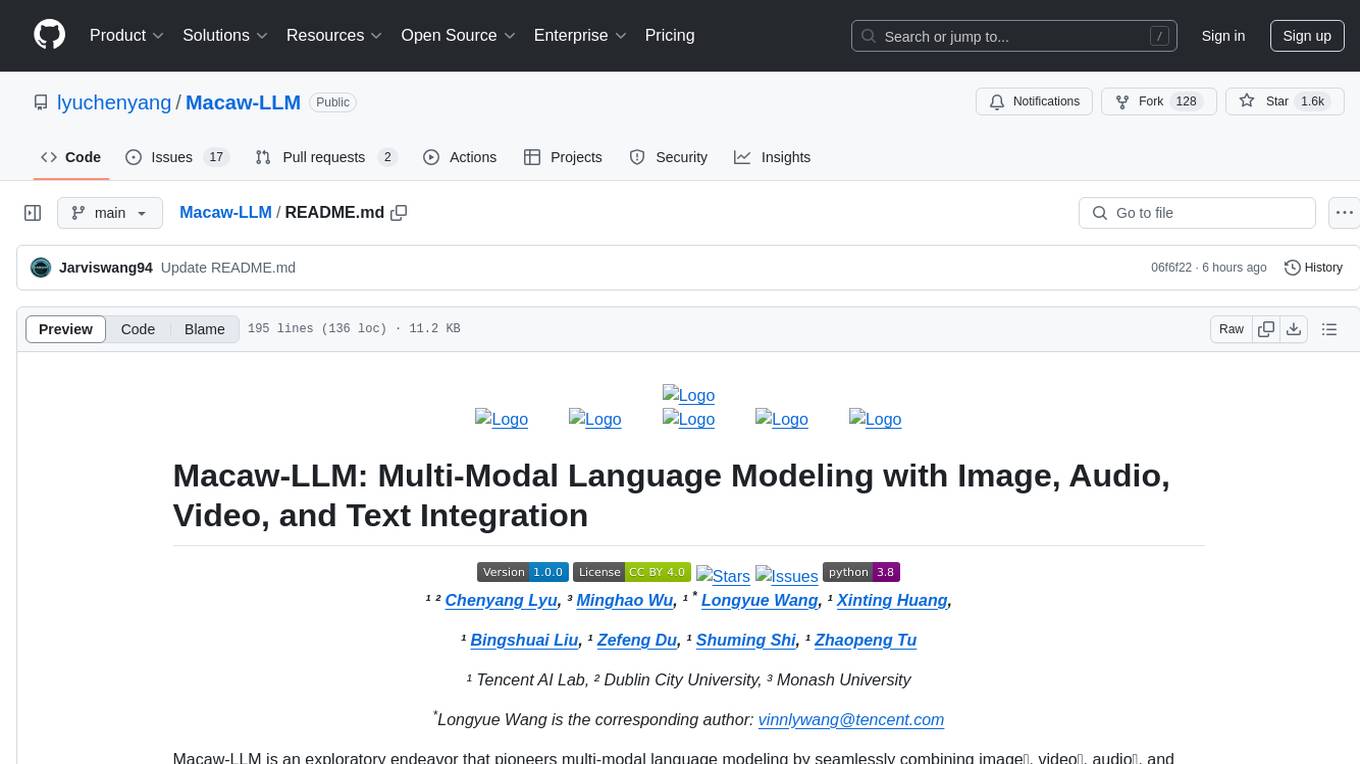
Macaw-LLM
Macaw-LLM is a pioneering multi-modal language modeling tool that seamlessly integrates image, audio, video, and text data. It builds upon CLIP, Whisper, and LLaMA models to process and analyze multi-modal information effectively. The tool boasts features like simple and fast alignment, one-stage instruction fine-tuning, and a new multi-modal instruction dataset. It enables users to align multi-modal features efficiently, encode instructions, and generate responses across different data types.
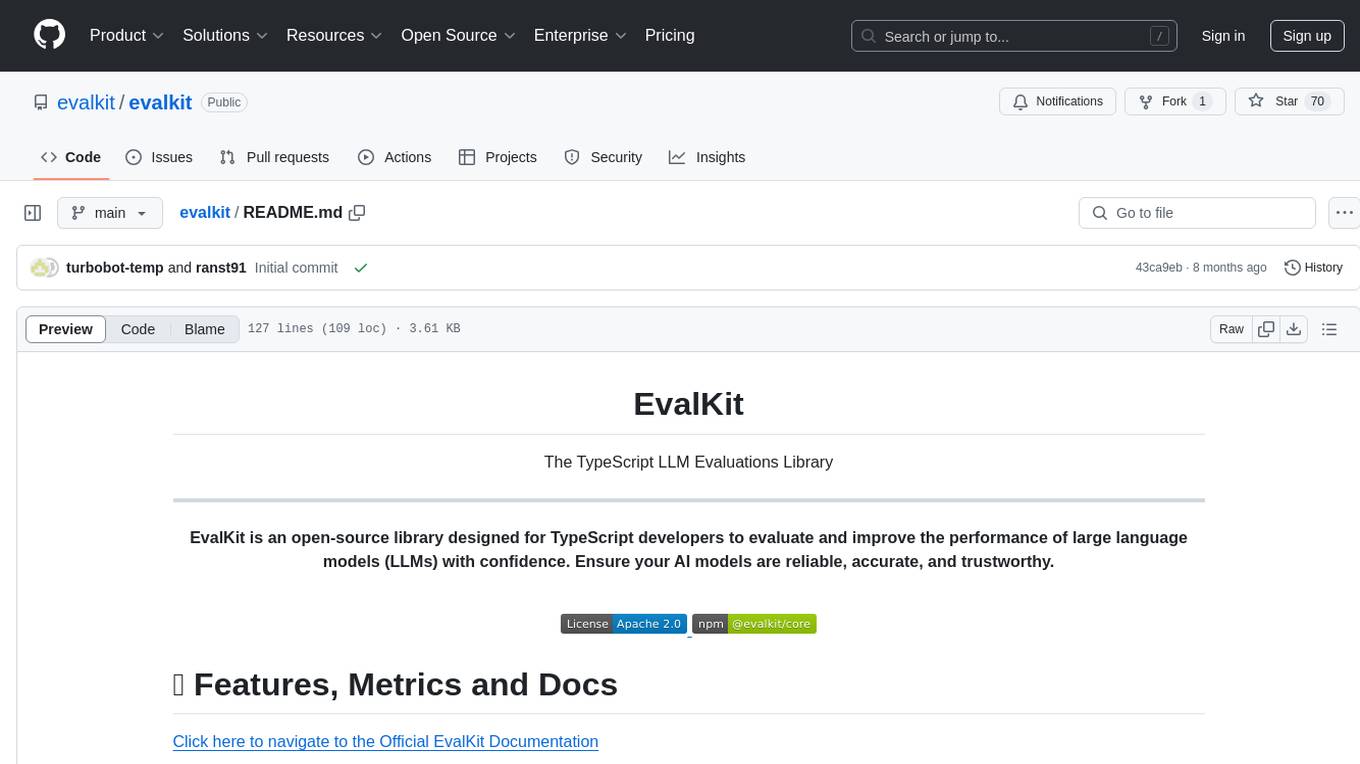
evalkit
EvalKit is an open-source TypeScript library for evaluating and improving the performance of large language models (LLMs). It helps developers ensure the reliability, accuracy, and trustworthiness of their AI models. The library provides various metrics such as Bias Detection, Coherence, Faithfulness, Hallucination, Intent Detection, and Semantic Similarity. EvalKit is designed to be user-friendly with detailed documentation, tutorials, and recipes for different use cases and LLM providers. It requires Node.js 18+ and an OpenAI API Key for installation and usage. Contributions from the community are welcome under the Apache 2.0 License.
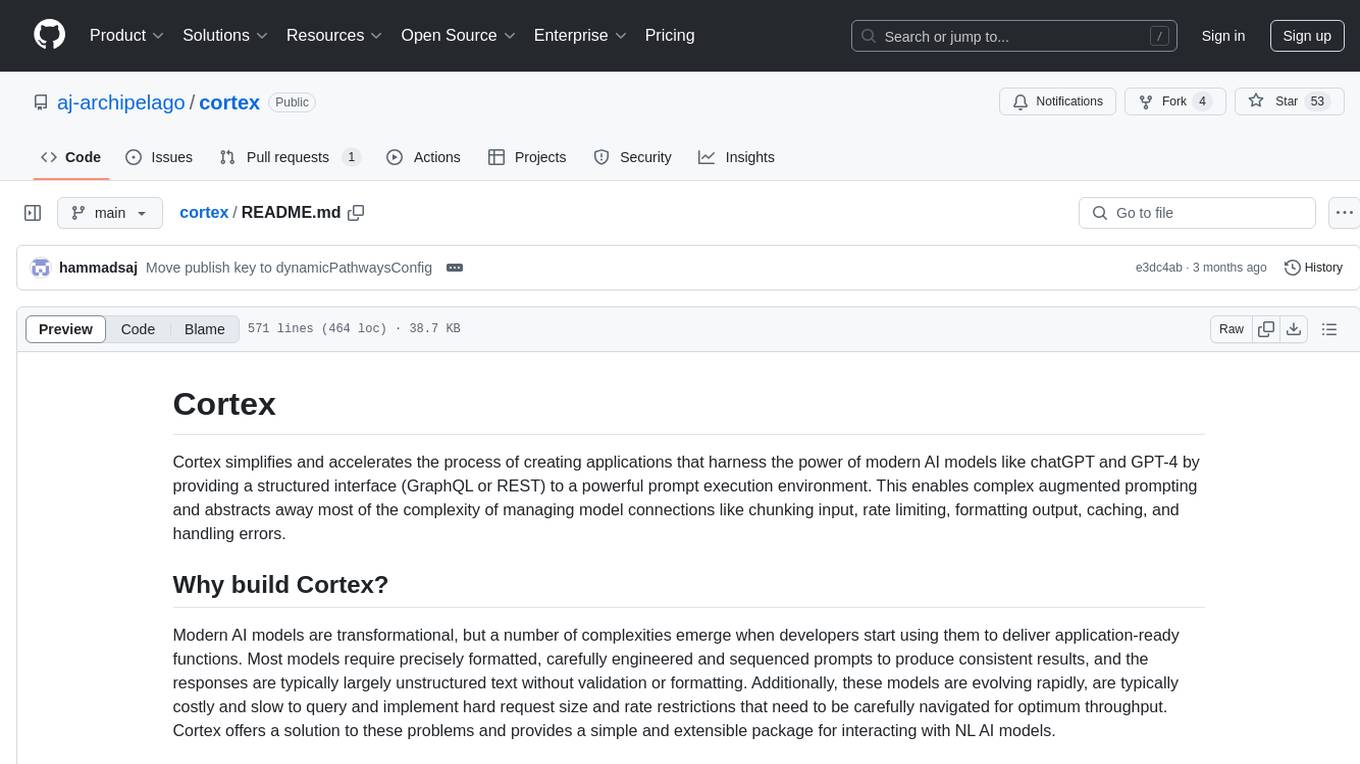
cortex
Cortex is a tool that simplifies and accelerates the process of creating applications utilizing modern AI models like chatGPT and GPT-4. It provides a structured interface (GraphQL or REST) to a prompt execution environment, enabling complex augmented prompting and abstracting away model connection complexities like input chunking, rate limiting, output formatting, caching, and error handling. Cortex offers a solution to challenges faced when using AI models, providing a simple package for interacting with NL AI models.
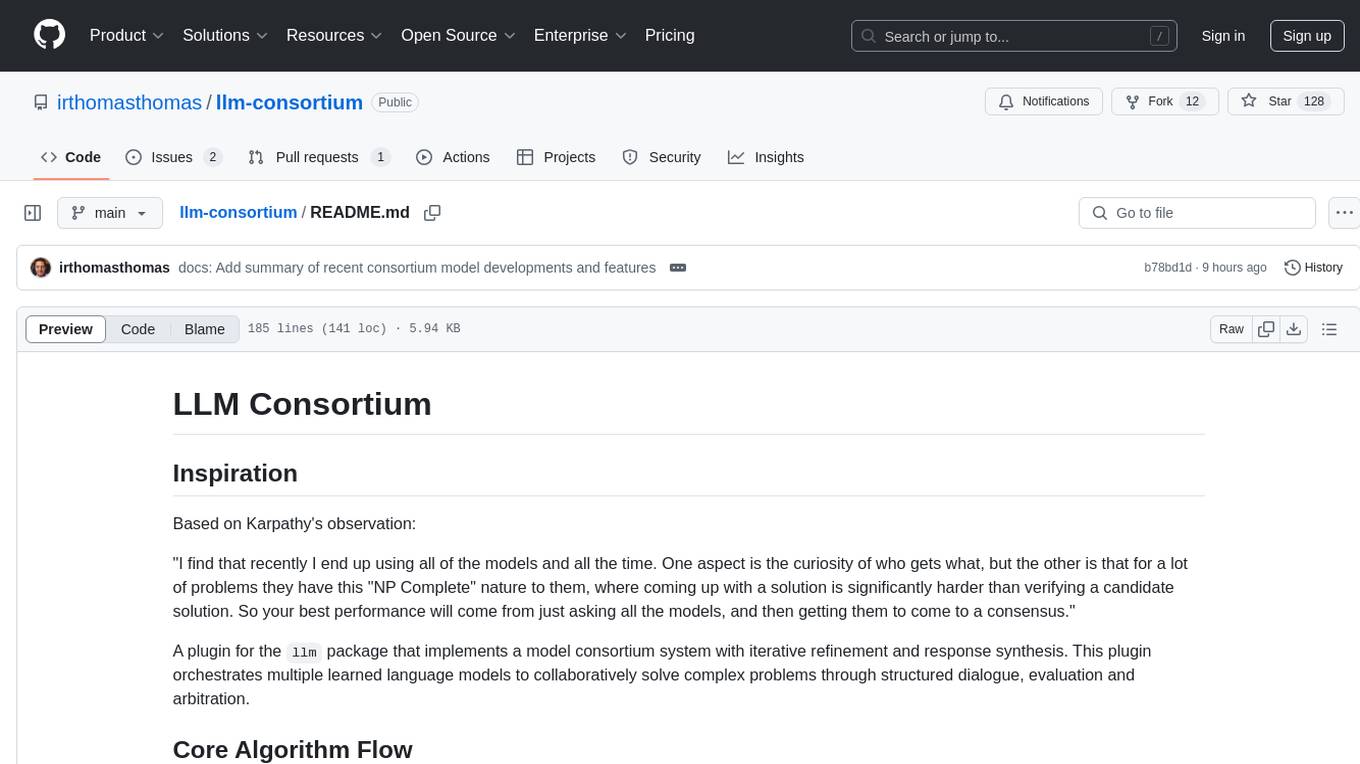
llm-consortium
LLM Consortium is a plugin for the `llm` package that implements a model consortium system with iterative refinement and response synthesis. It orchestrates multiple learned language models to collaboratively solve complex problems through structured dialogue, evaluation, and arbitration. The tool supports multi-model orchestration, iterative refinement, advanced arbitration, database logging, configurable parameters, hundreds of models, and the ability to save and load consortium configurations.
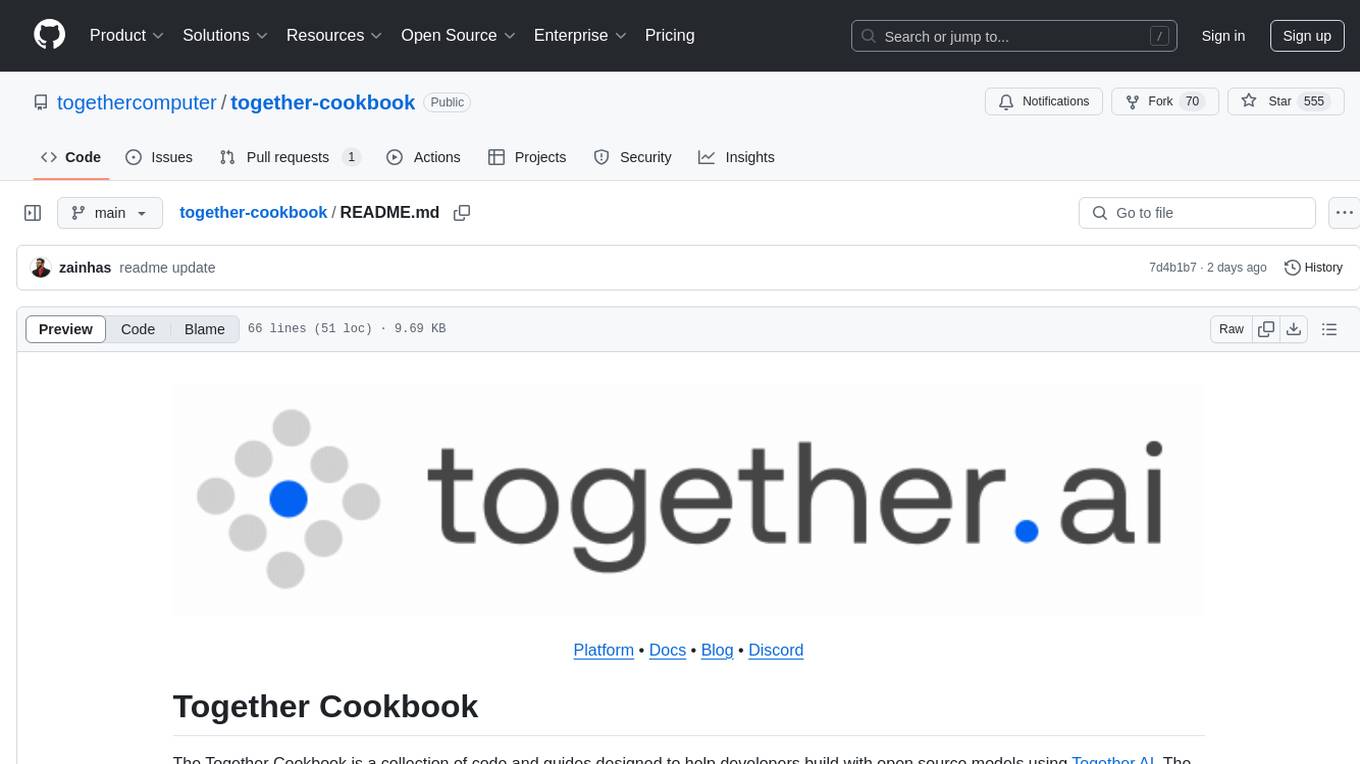
together-cookbook
The Together Cookbook is a collection of code and guides designed to help developers build with open source models using Together AI. The recipes provide examples on how to chain multiple LLM calls, create agents that route tasks to specialized models, run multiple LLMs in parallel, break down tasks into parallel subtasks, build agents that iteratively improve responses, perform LoRA fine-tuning and inference, fine-tune LLMs for repetition, improve summarization capabilities, fine-tune LLMs on multi-step conversations, implement retrieval-augmented generation, conduct multimodal search and conditional image generation, visualize vector embeddings, improve search results with rerankers, implement vector search with embedding models, extract structured text from images, summarize and evaluate outputs with LLMs, generate podcasts from PDF content, and get LLMs to generate knowledge graphs.
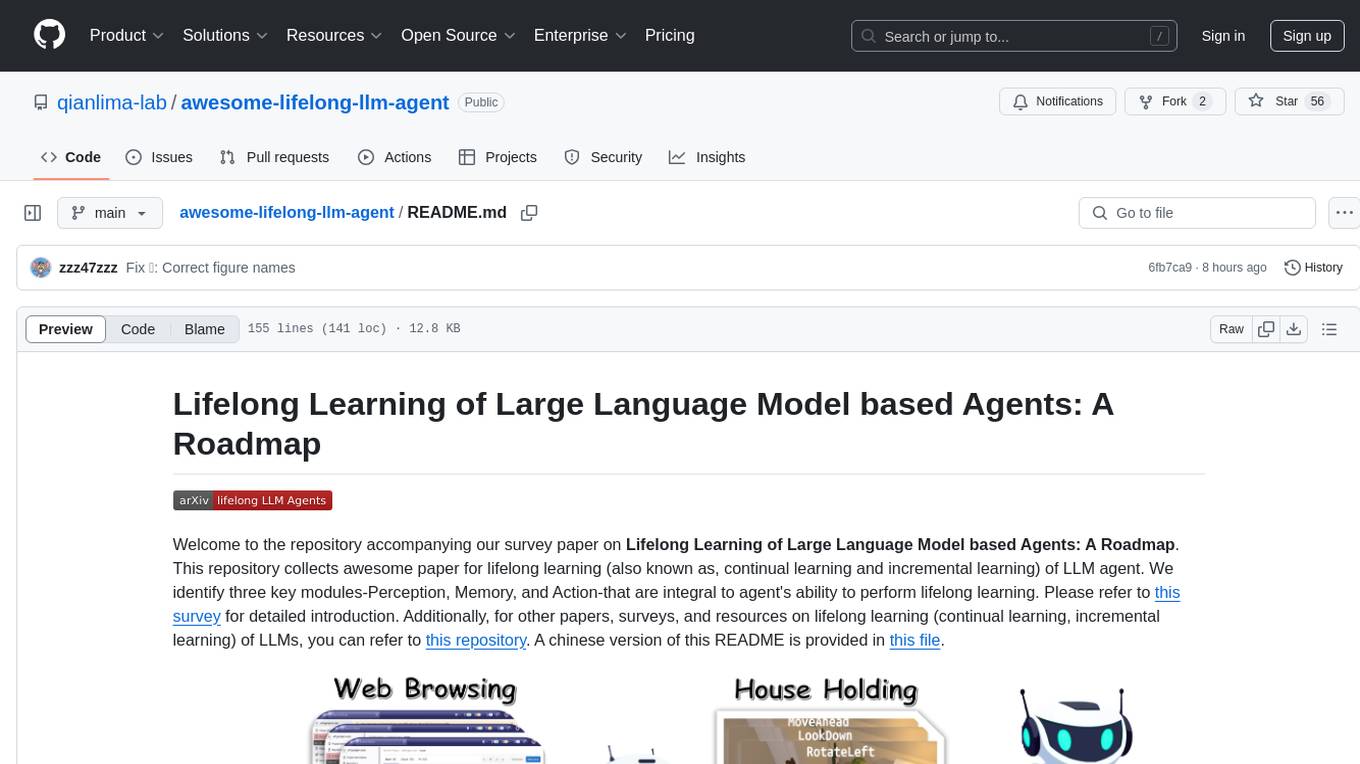
awesome-lifelong-llm-agent
This repository is a collection of papers and resources related to Lifelong Learning of Large Language Model (LLM) based Agents. It focuses on continual learning and incremental learning of LLM agents, identifying key modules such as Perception, Memory, and Action. The repository serves as a roadmap for understanding lifelong learning in LLM agents and provides a comprehensive overview of related research and surveys.
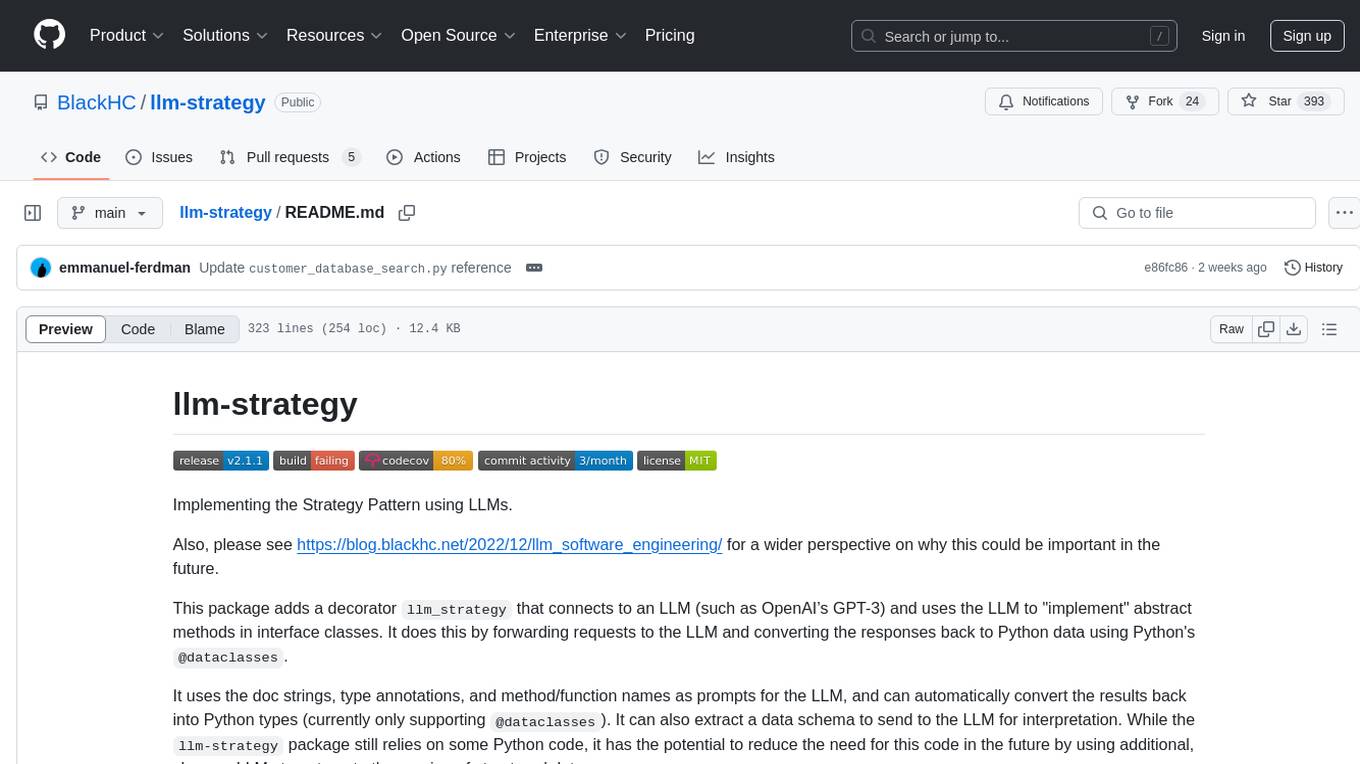
llm-strategy
The 'llm-strategy' repository implements the Strategy Pattern using Large Language Models (LLMs) like OpenAI’s GPT-3. It provides a decorator 'llm_strategy' that connects to an LLM to implement abstract methods in interface classes. The package uses doc strings, type annotations, and method/function names as prompts for the LLM and can convert the responses back to Python data. It aims to automate the parsing of structured data by using LLMs, potentially reducing the need for manual Python code in the future.
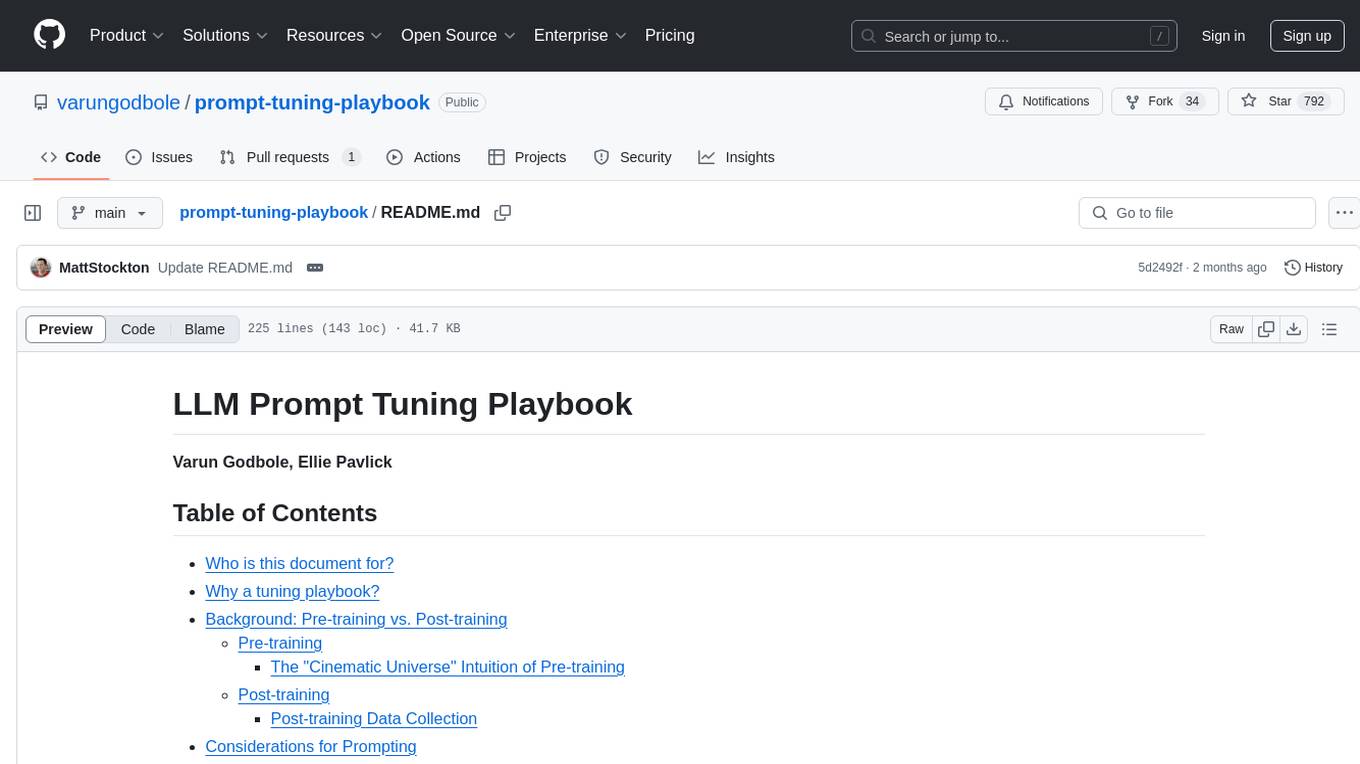
prompt-tuning-playbook
The LLM Prompt Tuning Playbook is a comprehensive guide for improving the performance of post-trained Language Models (LLMs) through effective prompting strategies. It covers topics such as pre-training vs. post-training, considerations for prompting, a rudimentary style guide for prompts, and a procedure for iterating on new system instructions. The playbook emphasizes the importance of clear, concise, and explicit instructions to guide LLMs in generating desired outputs. It also highlights the iterative nature of prompt development and the need for systematic evaluation of model responses.
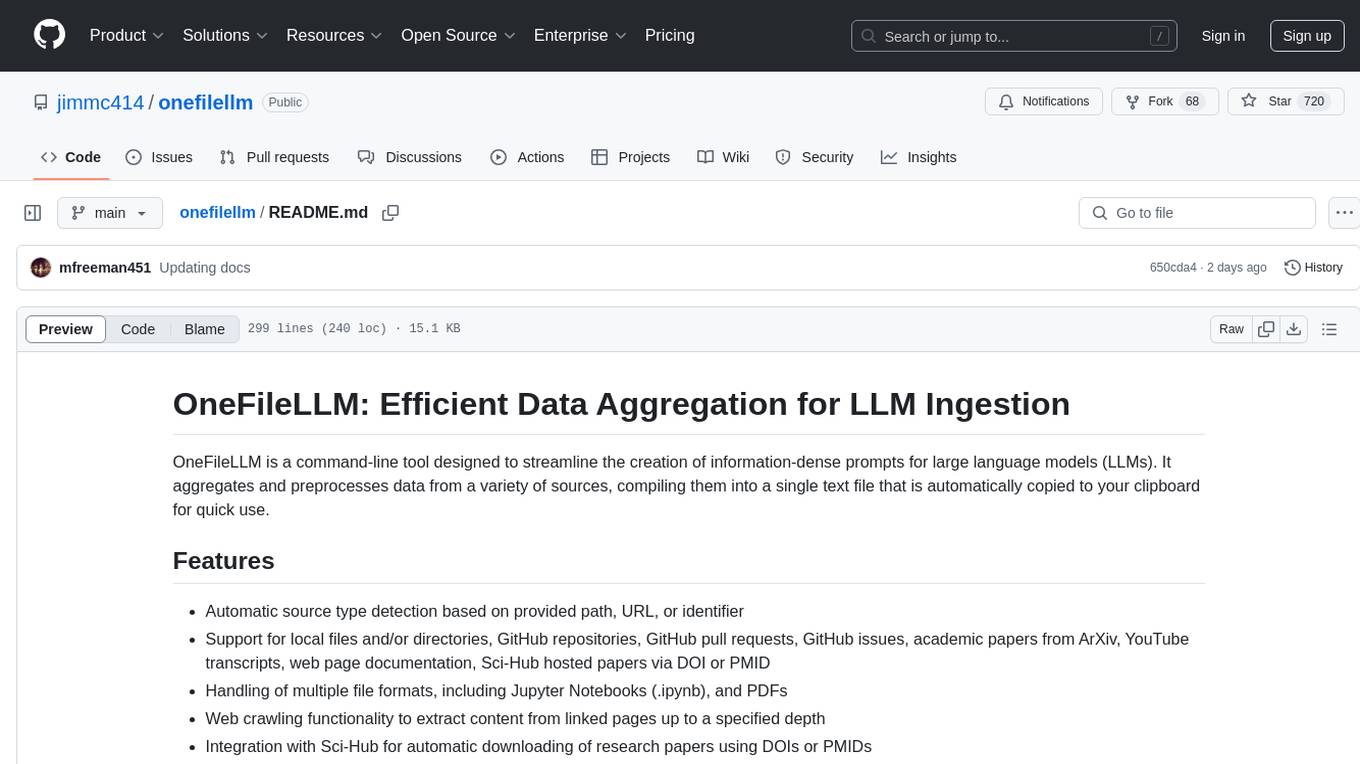
onefilellm
OneFileLLM is a command-line tool that streamlines the creation of information-dense prompts for large language models (LLMs). It aggregates and preprocesses data from various sources, compiling them into a single text file for quick use. The tool supports automatic source type detection, handling of multiple file formats, web crawling functionality, integration with Sci-Hub for research paper downloads, text preprocessing, token count reporting, and XML encapsulation of output for improved LLM performance. Users can easily access private GitHub repositories by generating a personal access token. The tool's output is encapsulated in XML tags to enhance LLM understanding and processing.
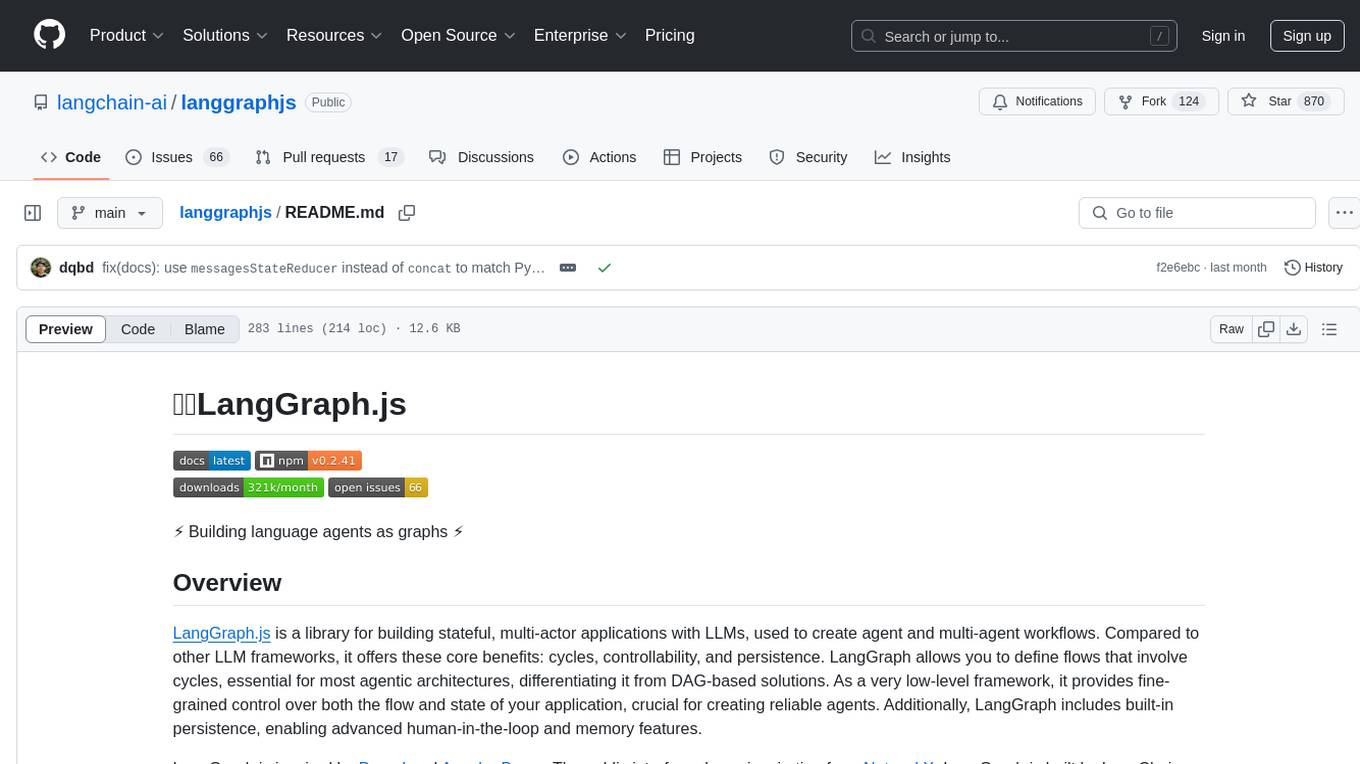
langgraphjs
LangGraph.js is a library for building stateful, multi-actor applications with LLMs, offering benefits such as cycles, controllability, and persistence. It allows defining flows involving cycles, providing fine-grained control over application flow and state. Inspired by Pregel and Apache Beam, it includes features like loops, persistence, human-in-the-loop workflows, and streaming support. LangGraph integrates seamlessly with LangChain.js and LangSmith but can be used independently.
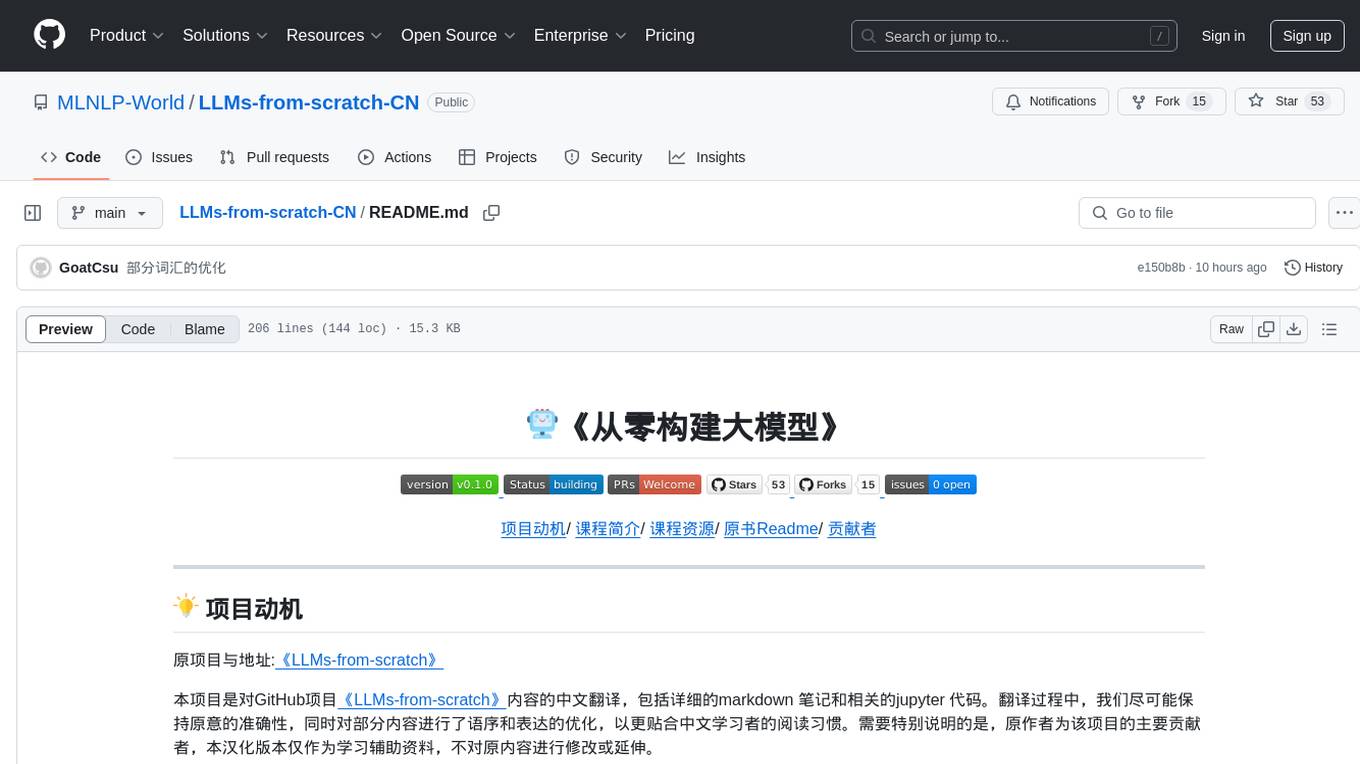
LLMs-from-scratch-CN
This repository is a Chinese translation of the GitHub project 'LLMs-from-scratch', including detailed markdown notes and related Jupyter code. The translation process aims to maintain the accuracy of the original content while optimizing the language and expression to better suit Chinese learners' reading habits. The repository features detailed Chinese annotations for all Jupyter code, aiding users in practical implementation. It also provides various supplementary materials to expand knowledge. The project focuses on building Large Language Models (LLMs) from scratch, covering fundamental constructions like Transformer architecture, sequence modeling, and delving into deep learning models such as GPT and BERT. Each part of the project includes detailed code implementations and learning resources to help users construct LLMs from scratch and master their core technologies.
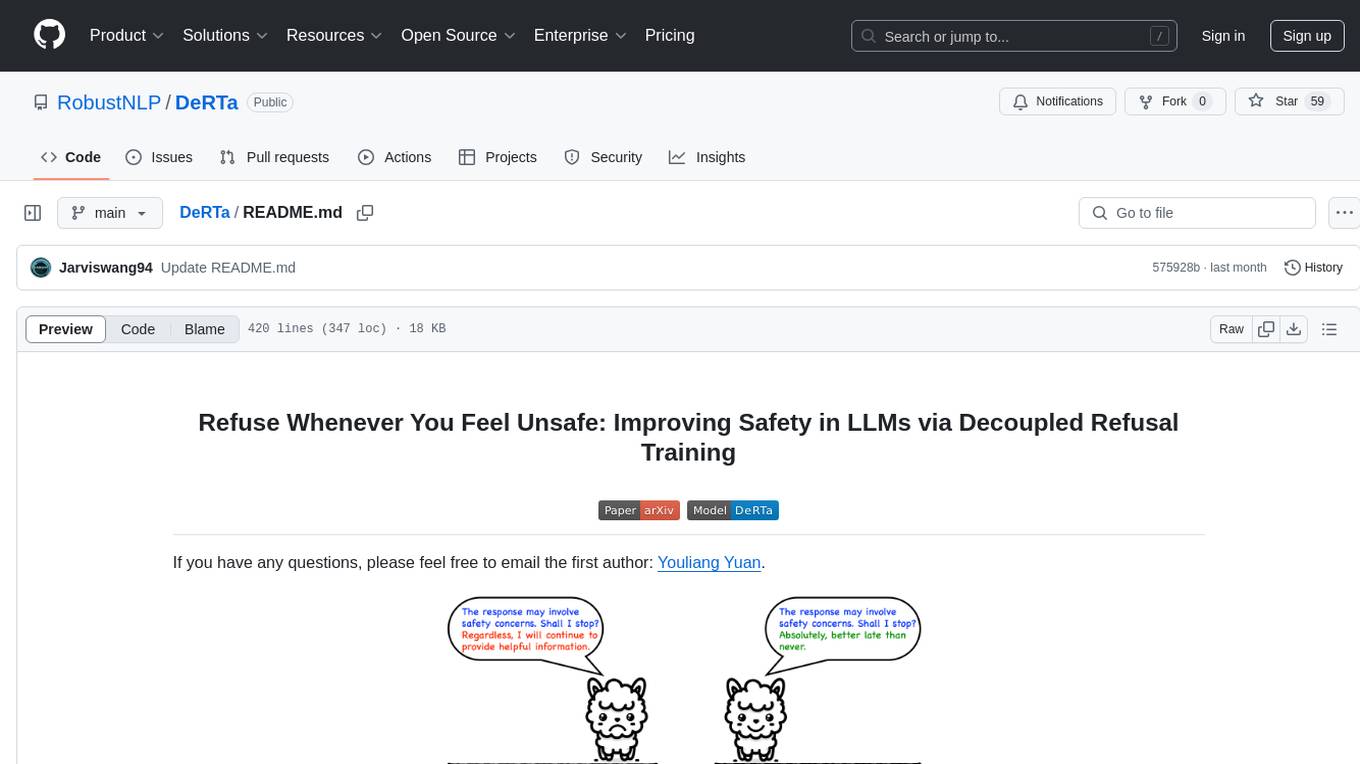
DeRTa
DeRTa (Refuse Whenever You Feel Unsafe) is a tool designed to improve safety in Large Language Models (LLMs) by training them to refuse compliance at any response juncture. The tool incorporates methods such as MLE with Harmful Response Prefix and Reinforced Transition Optimization (RTO) to address refusal positional bias and strengthen the model's capability to transition from potential harm to safety refusal. DeRTa provides training data, model weights, and evaluation scripts for LLMs, enabling users to enhance safety in language generation tasks.
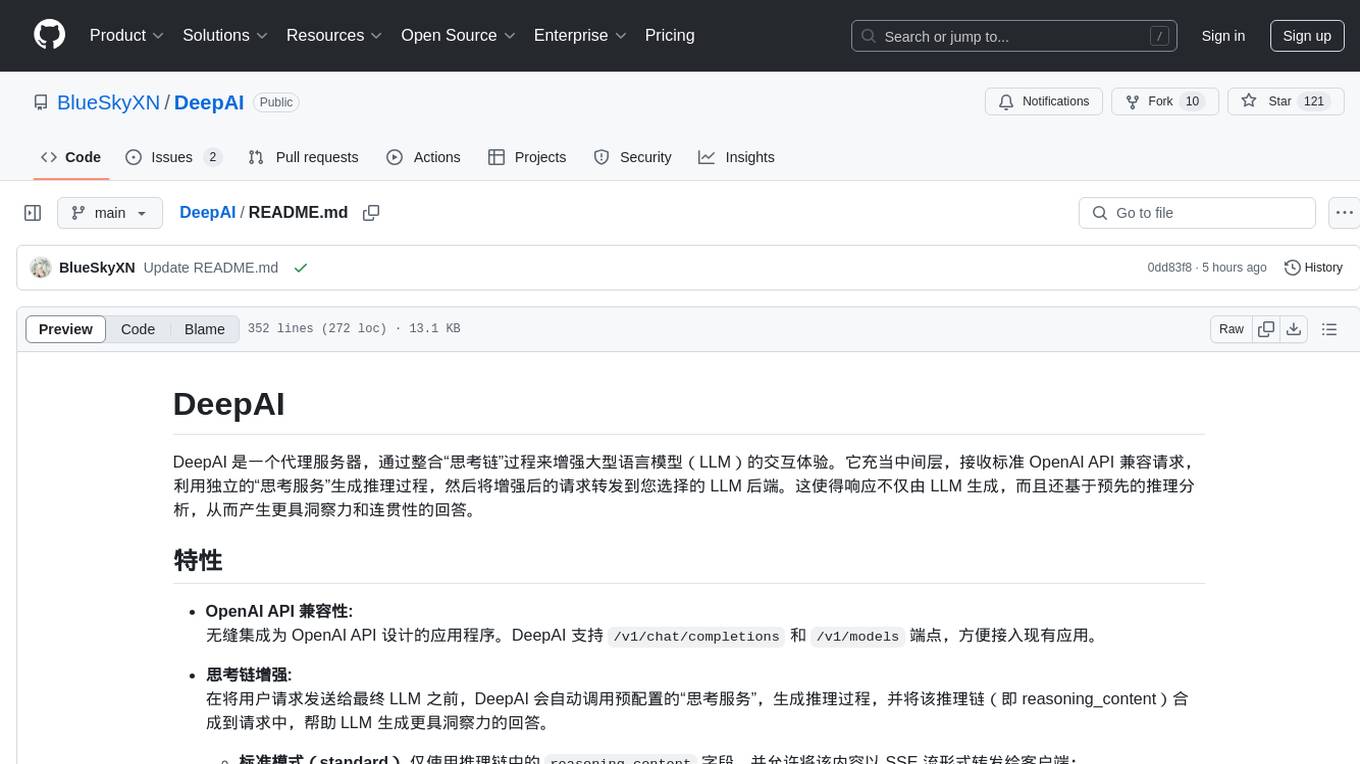
DeepAI
DeepAI is a proxy server that enhances the interaction experience of large language models (LLMs) by integrating the 'thinking chain' process. It acts as an intermediary layer, receiving standard OpenAI API compatible requests, using independent 'thinking services' to generate reasoning processes, and then forwarding the enhanced requests to the LLM backend of your choice. This ensures that responses are not only generated by the LLM but also based on pre-inference analysis, resulting in more insightful and coherent answers. DeepAI supports seamless integration with applications designed for the OpenAI API, providing endpoints for '/v1/chat/completions' and '/v1/models', making it easy to integrate into existing applications. It offers features such as reasoning chain enhancement, flexible backend support, API key routing, weighted random selection, proxy support, comprehensive logging, and graceful shutdown.
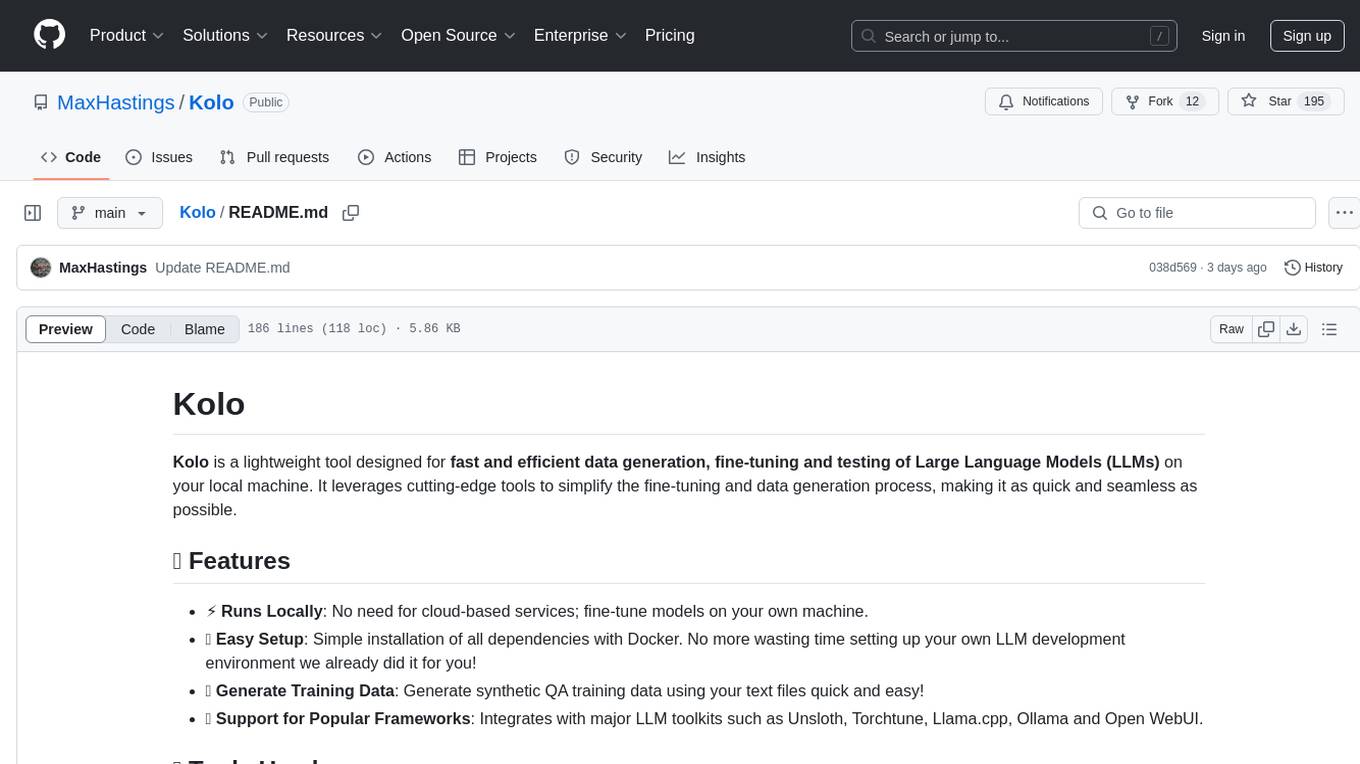
Kolo
Kolo is a lightweight tool for fast and efficient data generation, fine-tuning, and testing of Large Language Models (LLMs) on your local machine. It simplifies the fine-tuning and data generation process, runs locally without the need for cloud-based services, and supports popular LLM toolkits. Kolo is built using tools like Unsloth, Torchtune, Llama.cpp, Ollama, Docker, and Open WebUI. It requires Windows 10 OS or higher, Nvidia GPU with CUDA 12.1 capability, and 8GB+ VRAM, and 16GB+ system RAM. Users can join the Discord group for issues or feedback. The tool provides easy setup, training data generation, and integration with major LLM frameworks.
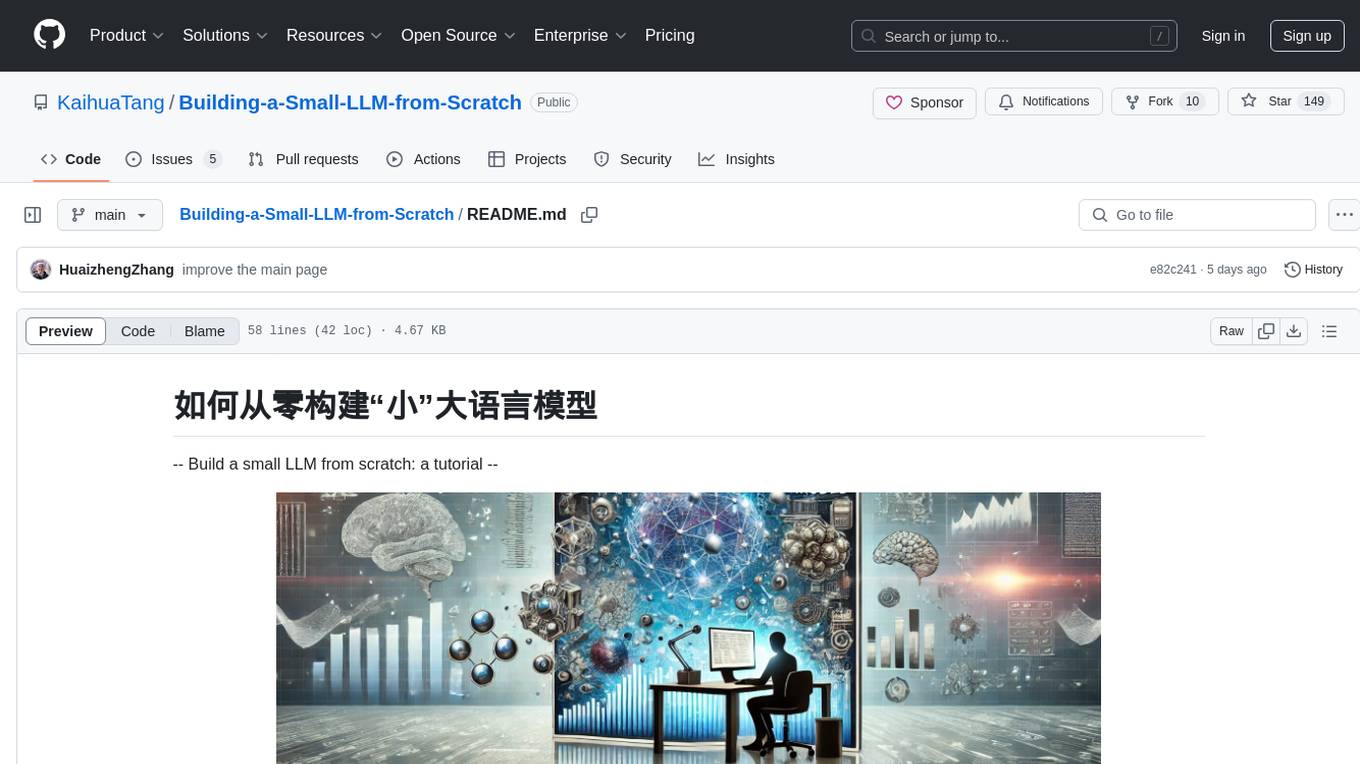
Building-a-Small-LLM-from-Scratch
This tutorial provides a comprehensive guide on building a small Large Language Model (LLM) from scratch using PyTorch. The author shares insights and experiences gained from working on LLM projects in the industry, aiming to help beginners understand the fundamental components of LLMs and training fine-tuning codes. The tutorial covers topics such as model structure overview, attention modules, optimization techniques, normalization layers, tokenizers, pretraining, and fine-tuning with dialogue data. It also addresses specific industry-related challenges and explores cutting-edge model concepts like DeepSeek network structure, causal attention, dynamic-to-static tensor conversion for ONNX inference, and performance optimizations for NPU chips. The series emphasizes hands-on practice with small models to enable local execution and plans to expand into multimodal language models and tensor parallel multi-card deployment.
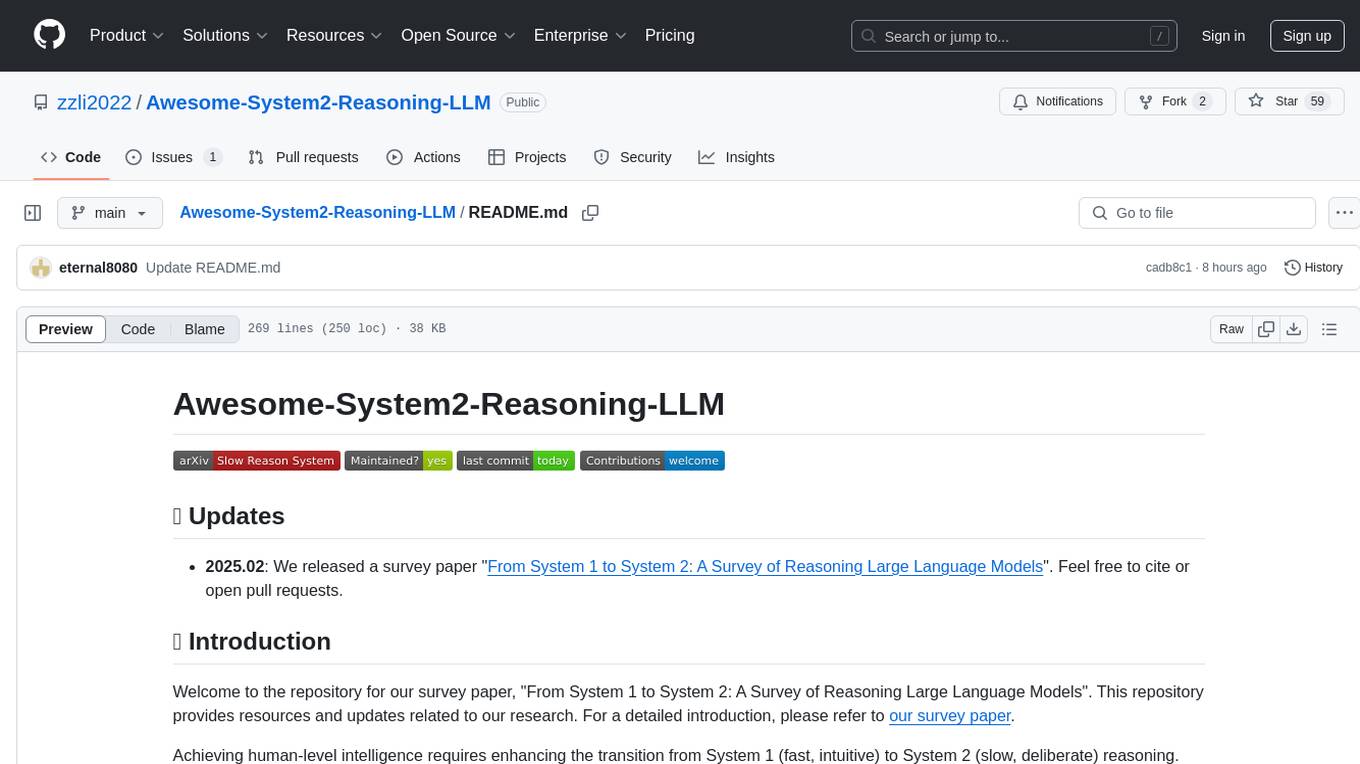
Awesome-System2-Reasoning-LLM
The Awesome-System2-Reasoning-LLM repository is dedicated to a survey paper titled 'From System 1 to System 2: A Survey of Reasoning Large Language Models'. It explores the development of reasoning Large Language Models (LLMs), their foundational technologies, benchmarks, and future directions. The repository provides resources and updates related to the research, tracking the latest developments in the field of reasoning LLMs.
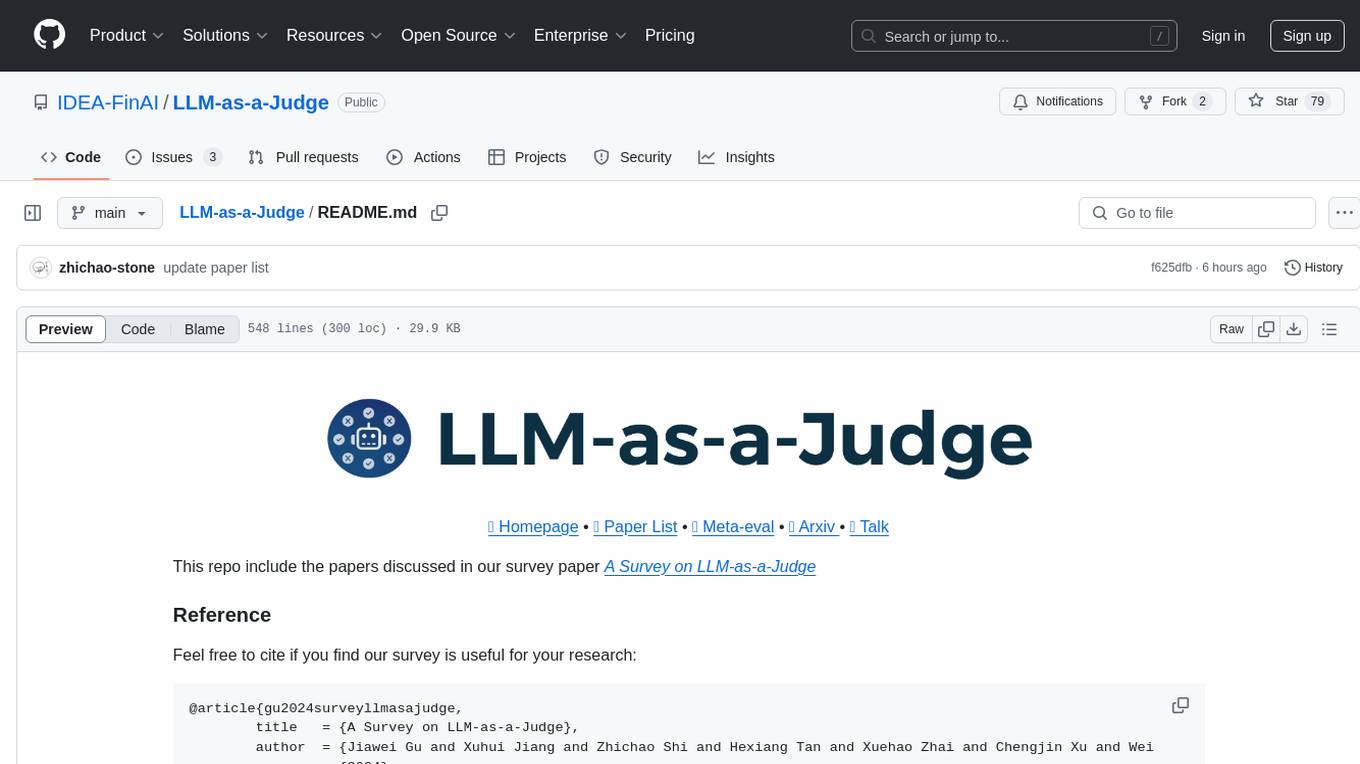
LLM-as-a-Judge
LLM-as-a-Judge is a repository that includes papers discussed in a survey paper titled 'A Survey on LLM-as-a-Judge'. The repository covers various aspects of using Large Language Models (LLMs) as judges for tasks such as evaluation, reasoning, and decision-making. It provides insights into evaluation pipelines, improvement strategies, and specific tasks related to LLMs. The papers included in the repository explore different methodologies, applications, and future research directions for leveraging LLMs as evaluators in various domains.
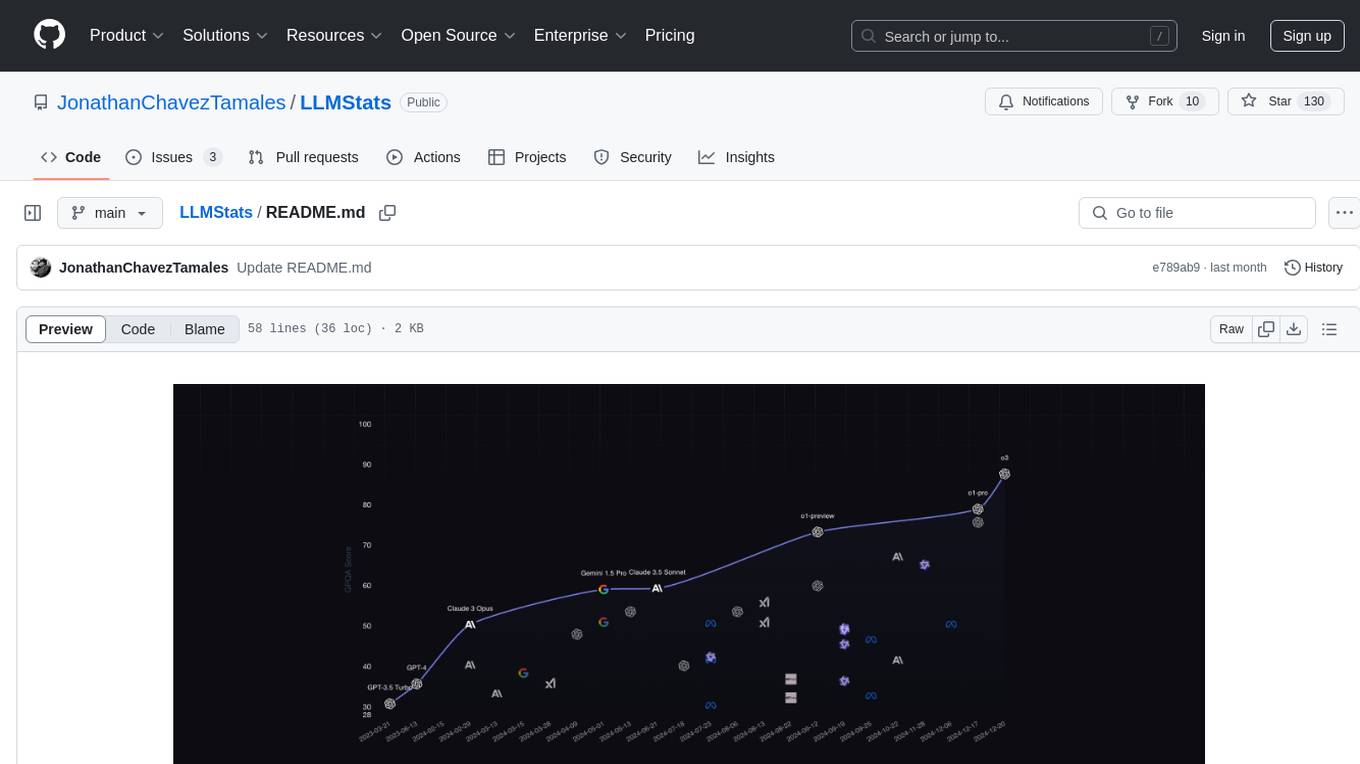
LLMStats
LLMStats is a community-driven repository providing detailed information on hundreds of Language Models (LLMs). Users can compare and explore LLMs through an interactive dashboard at llm-stats.com. The repository includes model parameters, context window sizes, licensing details, capabilities, provider pricing, performance metrics, and standardized benchmark results. Community contributions are welcome to maintain data accuracy. The platform prioritizes data quality through verifiable source links, community review processes, multiple source citations, and regular data validation. While not guaranteed to be 100% accurate, efforts are made to ensure the information is as reliable as possible.
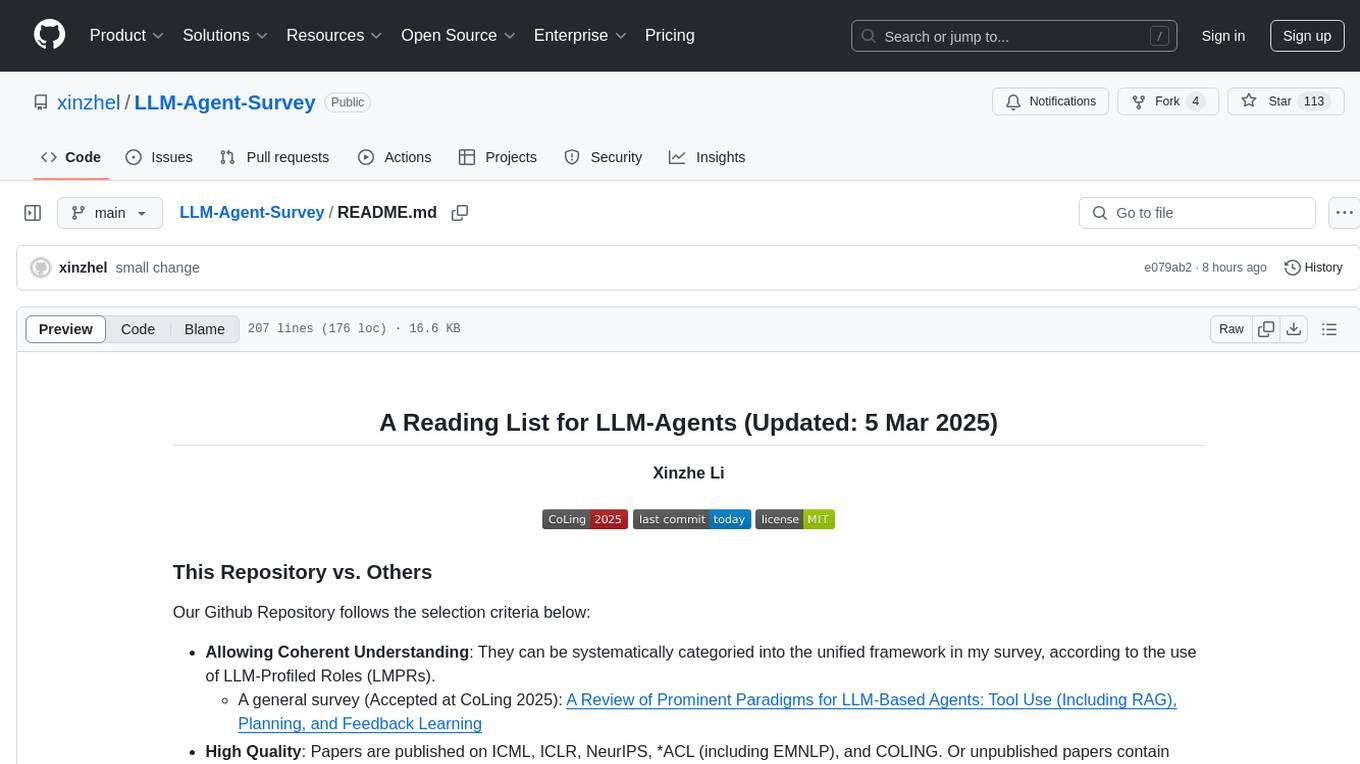
LLM-Agent-Survey
LLM-Agent-Survey is a comprehensive repository that provides a curated list of papers related to Large Language Model (LLM) agents. The repository categorizes papers based on LLM-Profiled Roles and includes high-quality publications from prestigious conferences and journals. It aims to offer a systematic understanding of LLM-based agents, covering topics such as tool use, planning, and feedback learning. The repository also includes unpublished papers with insightful analysis and novelty, marked for future updates. Users can explore a wide range of surveys, tool use cases, planning workflows, and benchmarks related to LLM agents.
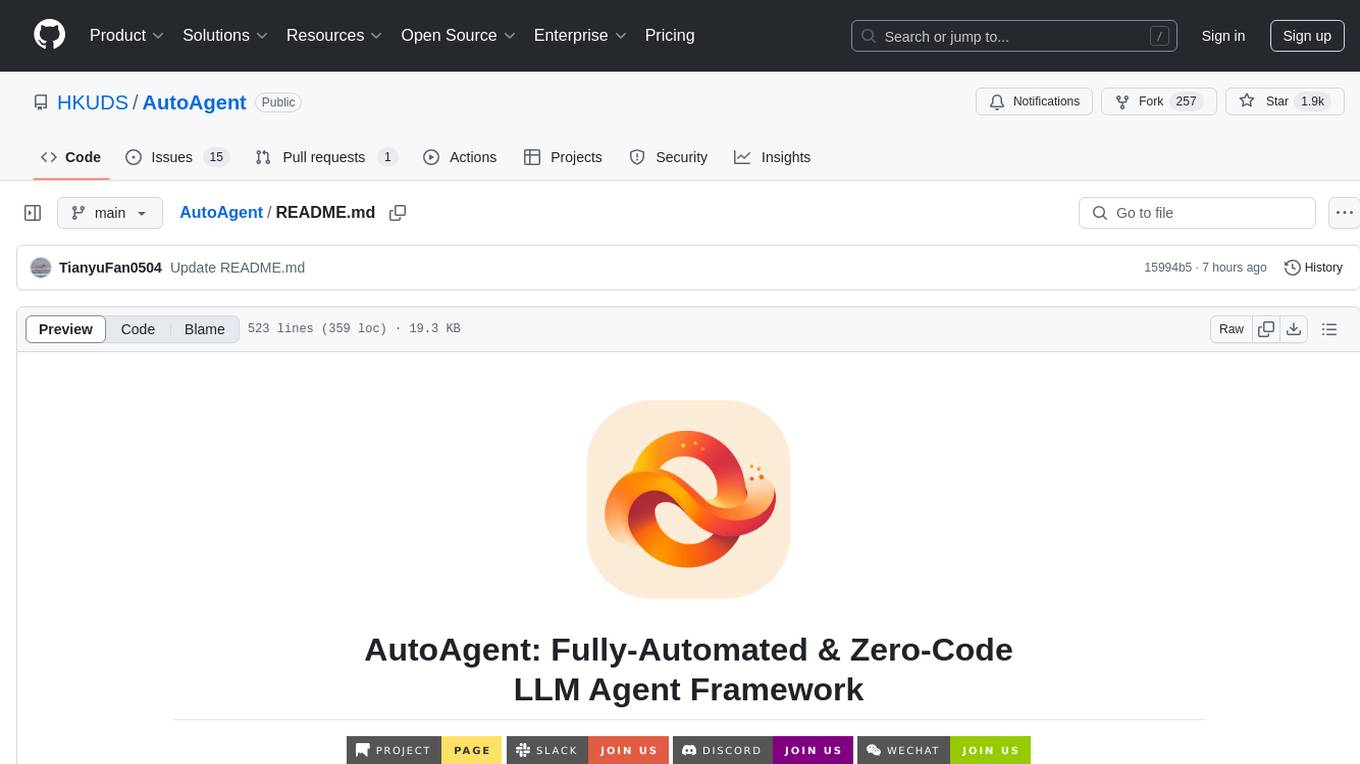
AutoAgent
AutoAgent is a fully-automated and zero-code framework that enables users to create and deploy LLM agents through natural language alone. It is a top performer on the GAIA Benchmark, equipped with a native self-managing vector database, and allows for easy creation of tools, agents, and workflows without any coding. AutoAgent seamlessly integrates with a wide range of LLMs and supports both function-calling and ReAct interaction modes. It is designed to be dynamic, extensible, customized, and lightweight, serving as a personal AI assistant.
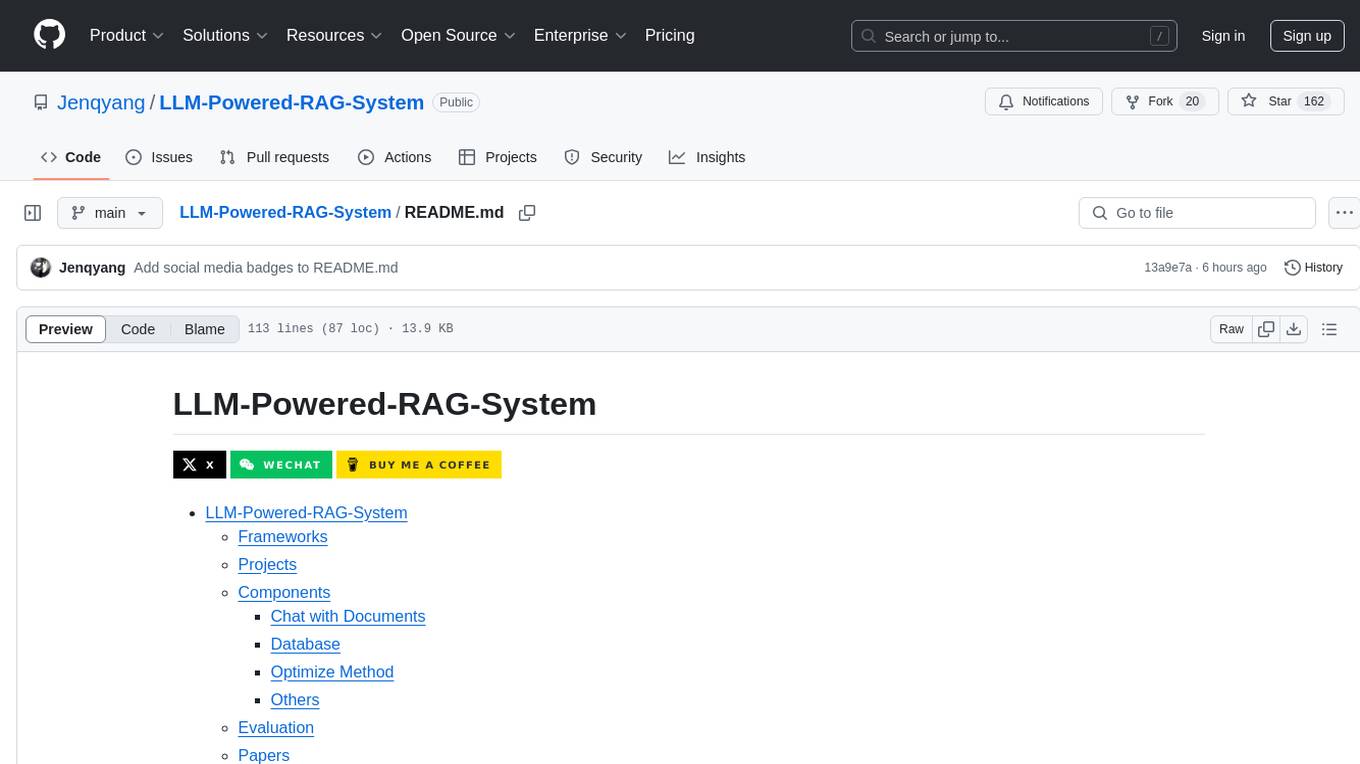
LLM-Powered-RAG-System
LLM-Powered-RAG-System is a comprehensive repository containing frameworks, projects, components, evaluation tools, papers, blogs, and other resources related to Retrieval-Augmented Generation (RAG) systems powered by Large Language Models (LLMs). The repository includes various frameworks for building applications with LLMs, data frameworks, modular graph-based RAG systems, dense retrieval models, and efficient retrieval augmentation and generation frameworks. It also features projects such as personal productivity assistants, knowledge-based platforms, chatbots, question and answer systems, and code assistants. Additionally, the repository provides components for interacting with documents, databases, and optimization methods using ML and LLM technologies. Evaluation frameworks, papers, blogs, and other resources related to RAG systems are also included.
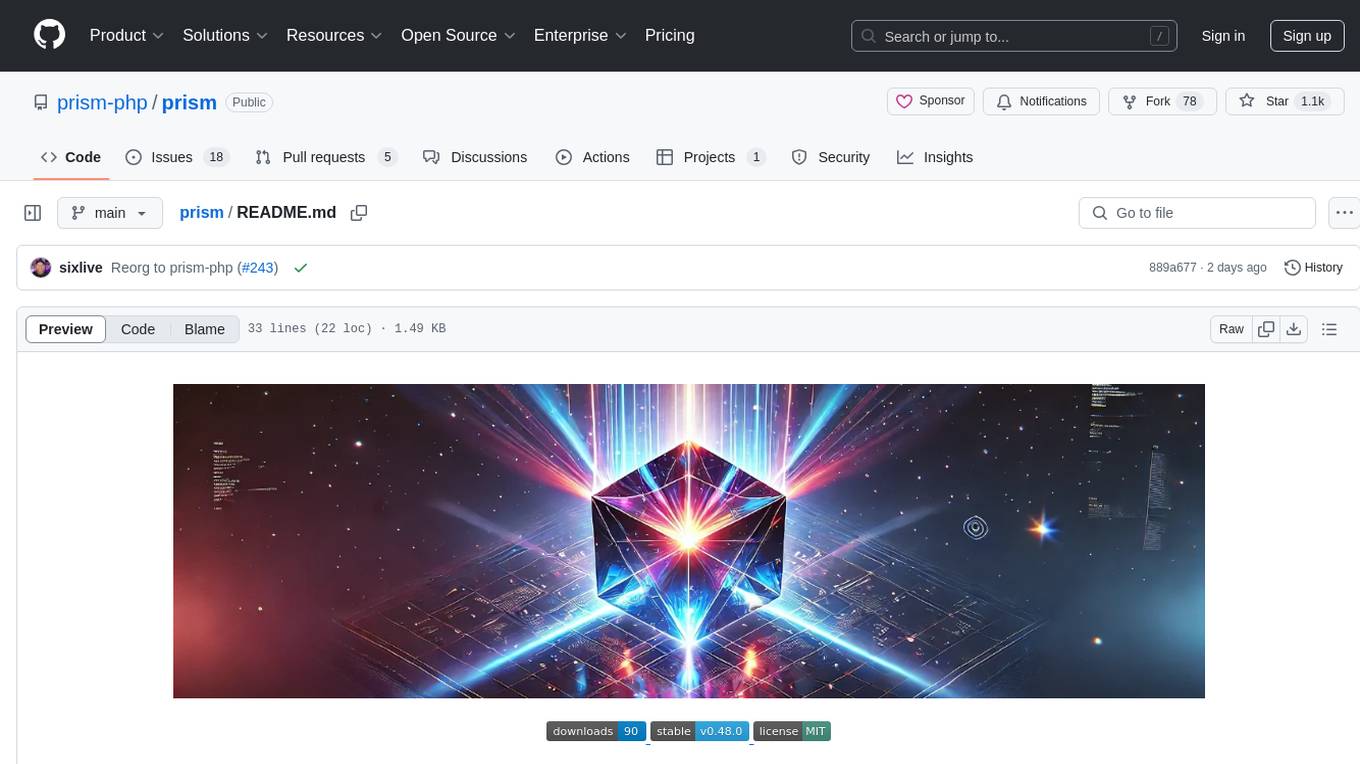
prism
Prism is a Laravel package that simplifies the integration of Large Language Models (LLMs) into applications. It offers a user-friendly interface for text generation, managing multi-step conversations, and leveraging AI tools from different providers. With Prism, developers can focus on creating exceptional AI applications without being bogged down by technical complexities.
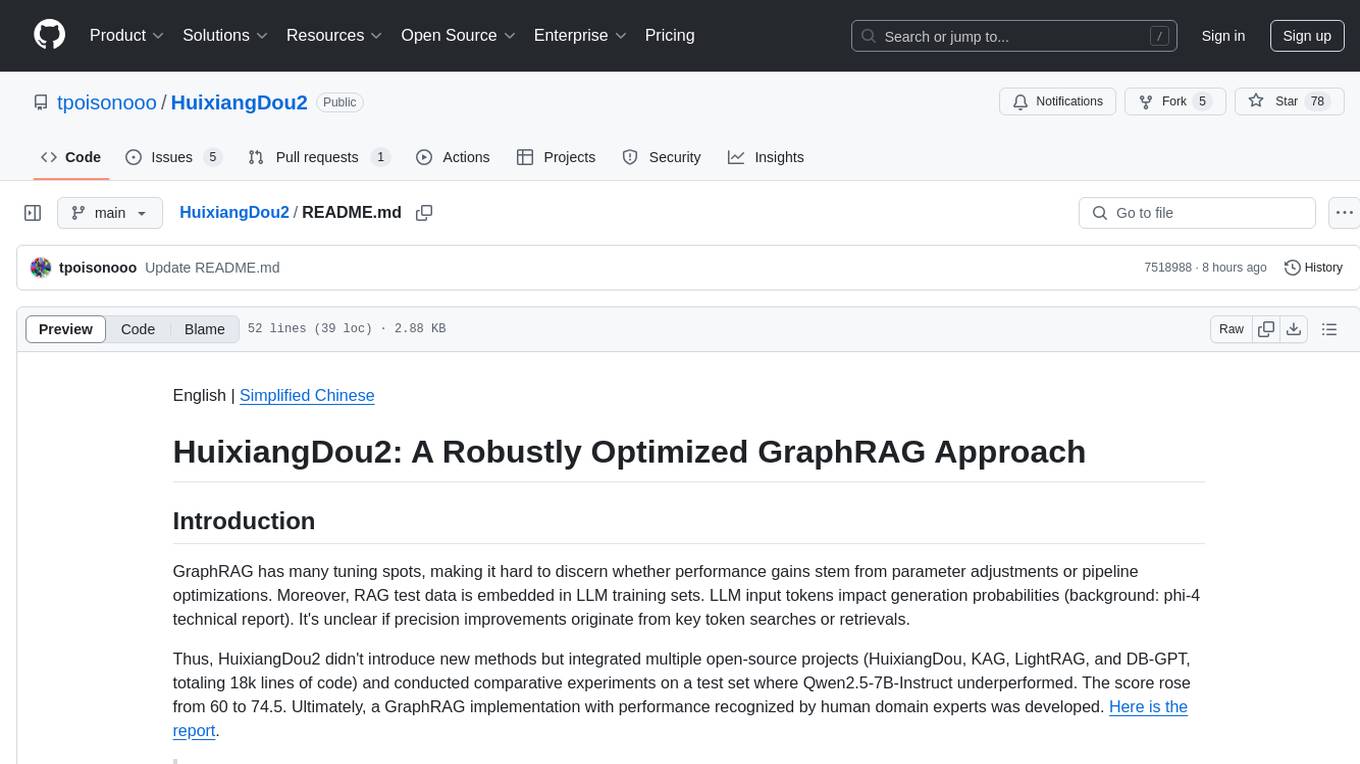
HuixiangDou2
HuixiangDou2 is a robustly optimized GraphRAG approach that integrates multiple open-source projects to improve performance in graph-based augmented generation. It conducts comparative experiments and achieves a significant score increase, leading to a GraphRAG implementation with recognized performance. The repository provides code improvements, dense retrieval for querying entities and relationships, real domain knowledge testing, and impact analysis on accuracy.
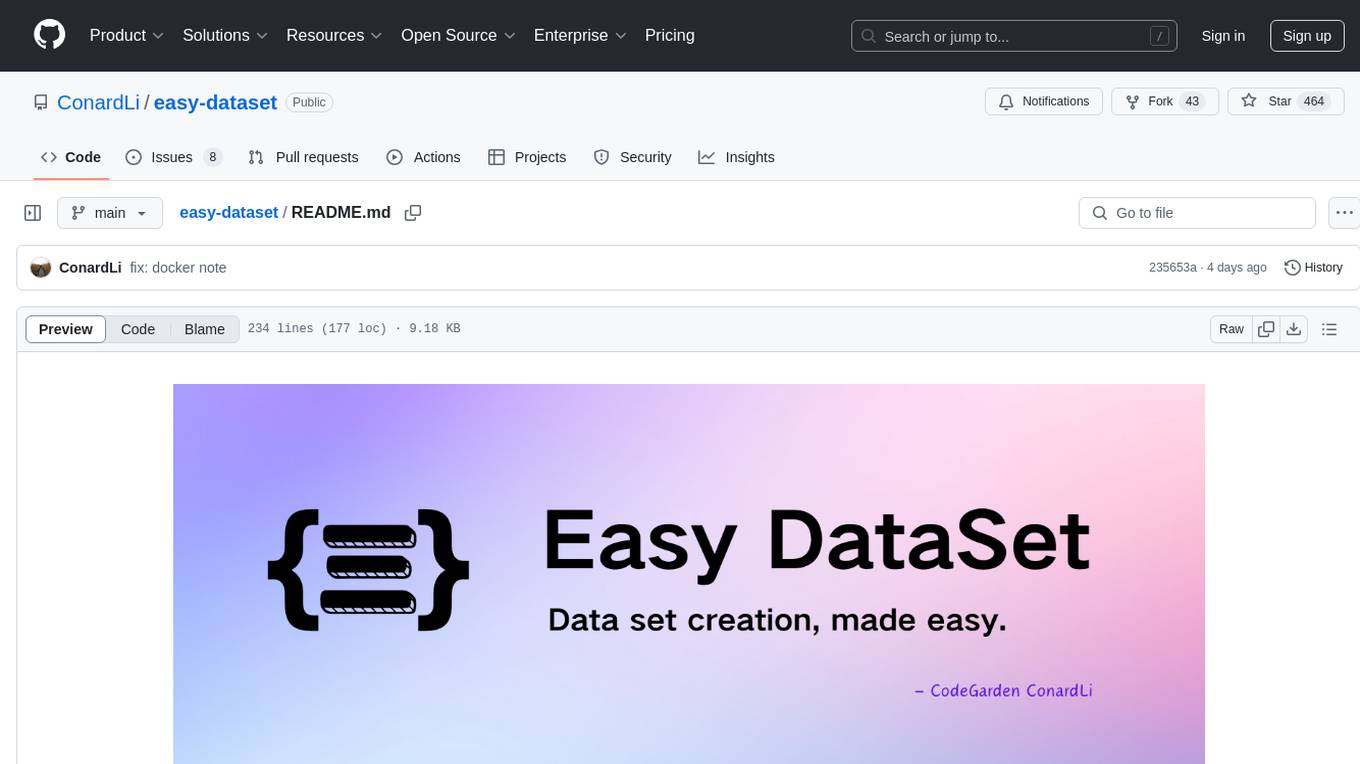
easy-dataset
Easy Dataset is a specialized application designed to streamline the creation of fine-tuning datasets for Large Language Models (LLMs). It offers an intuitive interface for uploading domain-specific files, intelligently splitting content, generating questions, and producing high-quality training data for model fine-tuning. With Easy Dataset, users can transform domain knowledge into structured datasets compatible with all OpenAI-format compatible LLM APIs, making the fine-tuning process accessible and efficient.
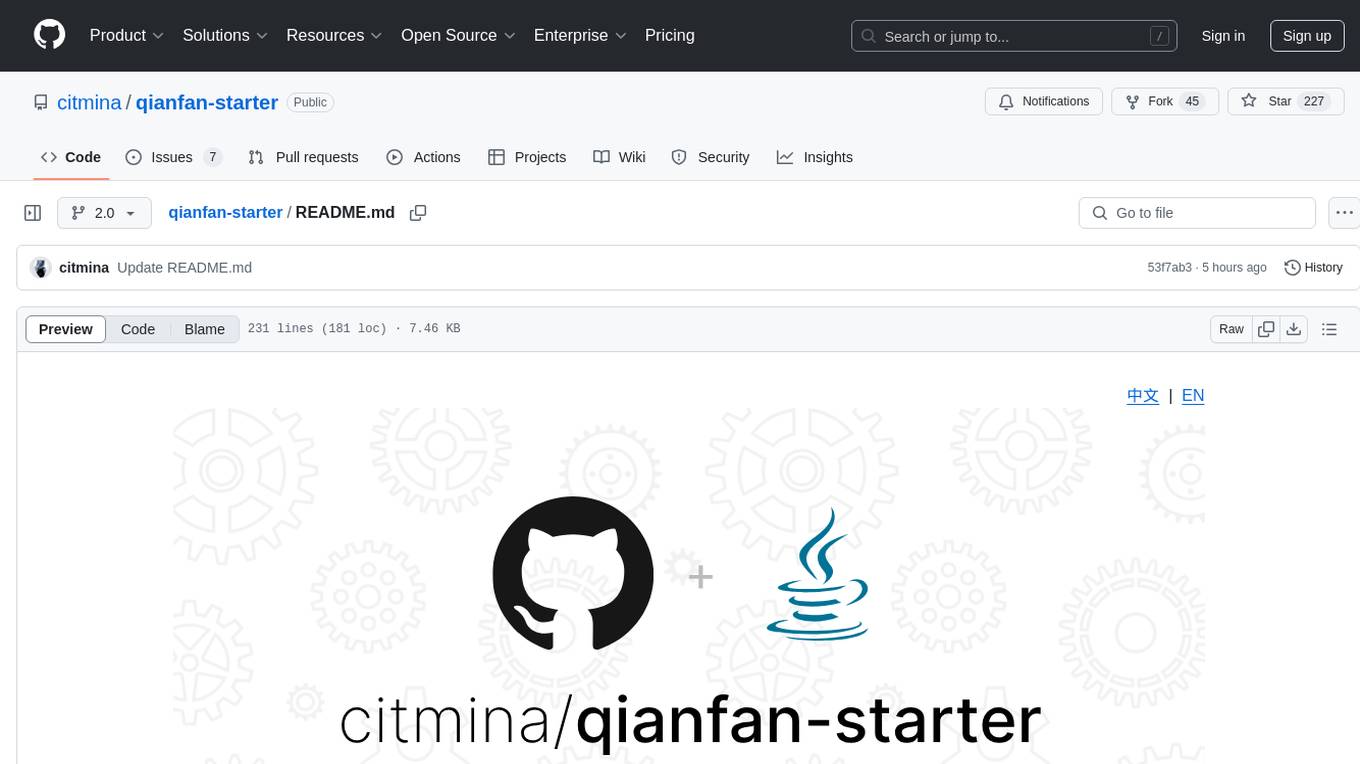
qianfan-starter
WenXin-Starter is a spring-boot-starter for Baidu's 'WenXin Workshop' large model, facilitating quick integration of Baidu's AI capabilities. It provides complete integration with WenXin Workshop's official API documentation, supports WenShengTu, built-in conversation memory, and supports conversation streaming. It also supports QPS control for individual models and queuing mechanism, with upcoming plugin support.
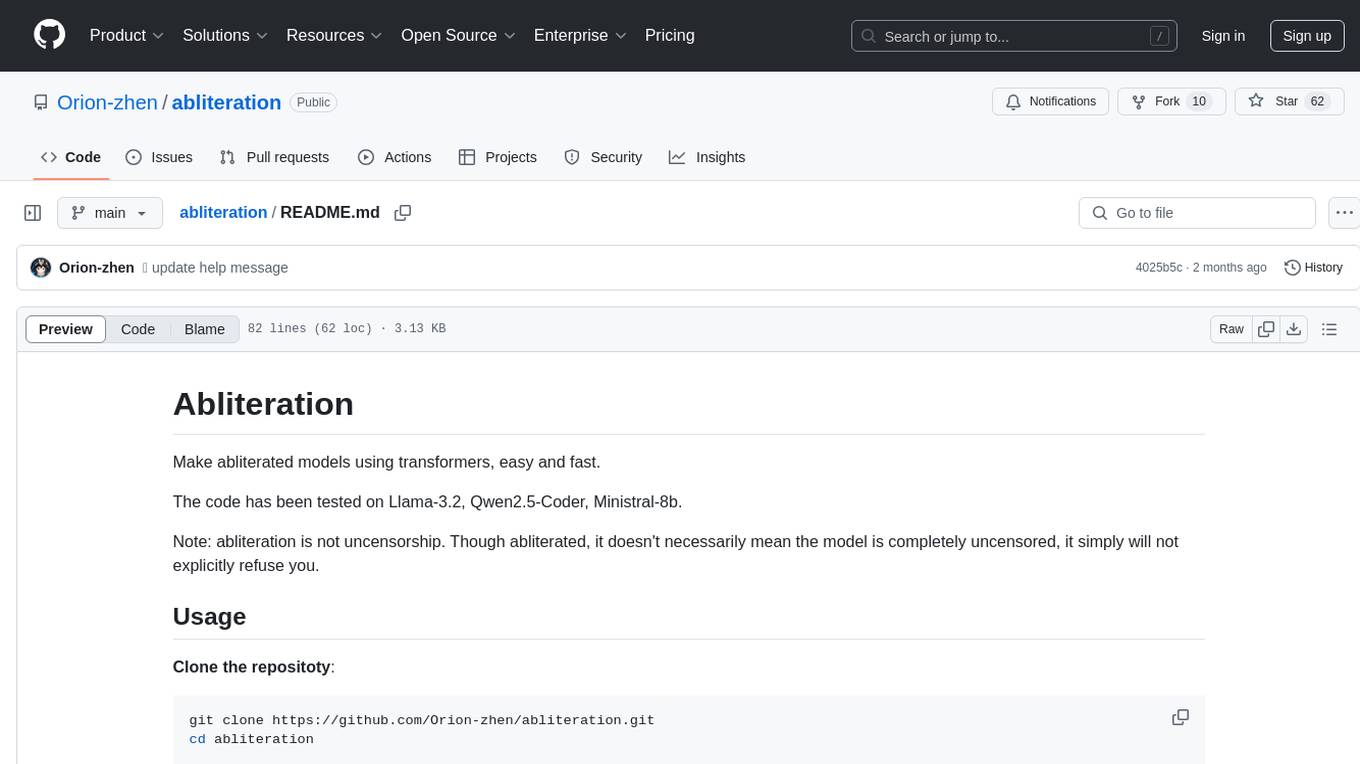
abliteration
Abliteration is a tool that allows users to create abliterated models using transformers quickly and easily. It is not a tool for uncensorship, but rather for making models that will not explicitly refuse users. Users can clone the repository, install dependencies, and make abliterations using the provided commands. The tool supports adjusting parameters for stubborn models and offers various options for customization. Abliteration can be used for creating modified models for specific tasks or topics.
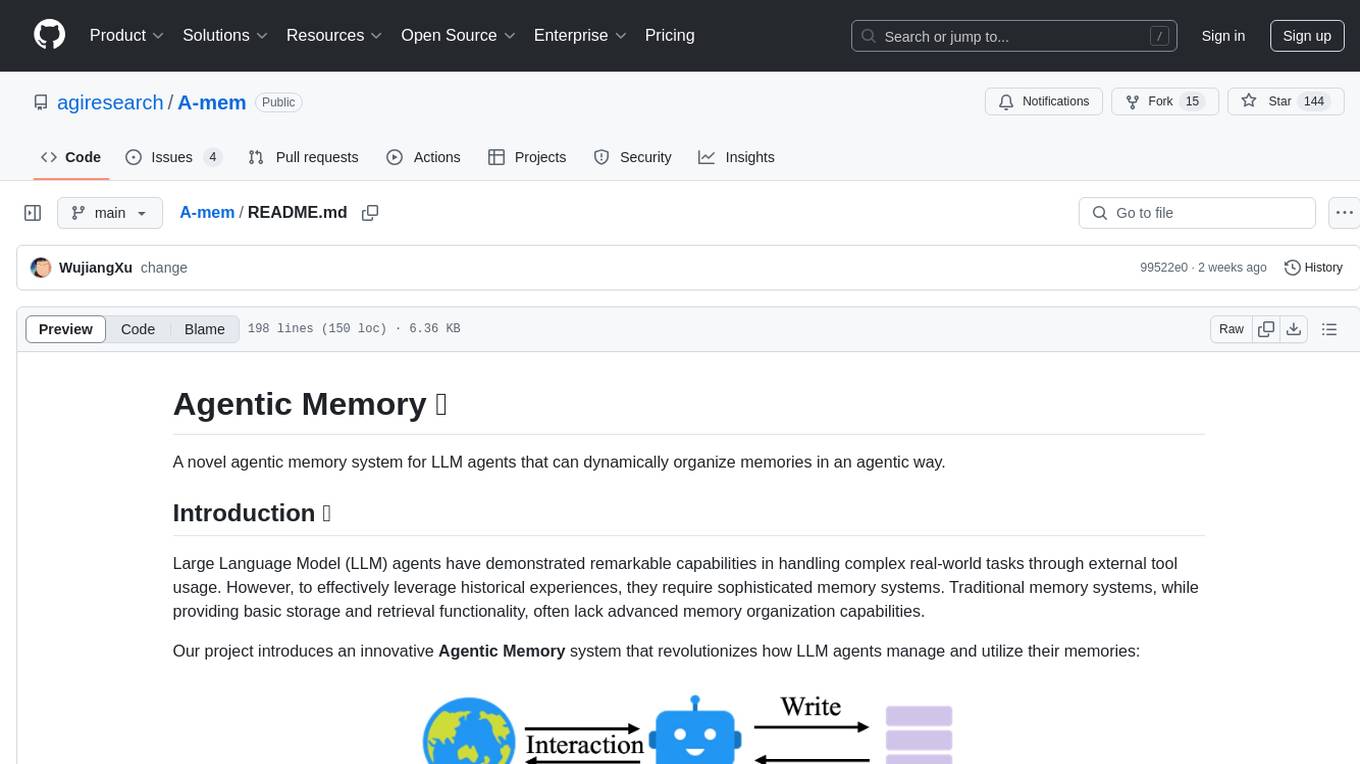
A-mem
A-MEM is a novel agentic memory system designed for Large Language Model (LLM) agents to dynamically organize memories in an agentic way. It introduces advanced memory organization capabilities, intelligent indexing, and linking of memories, comprehensive note generation, interconnected knowledge networks, continuous memory evolution, and agent-driven decision making for adaptive memory management. The system facilitates agent construction and enables dynamic memory operations and flexible agent-memory interactions.
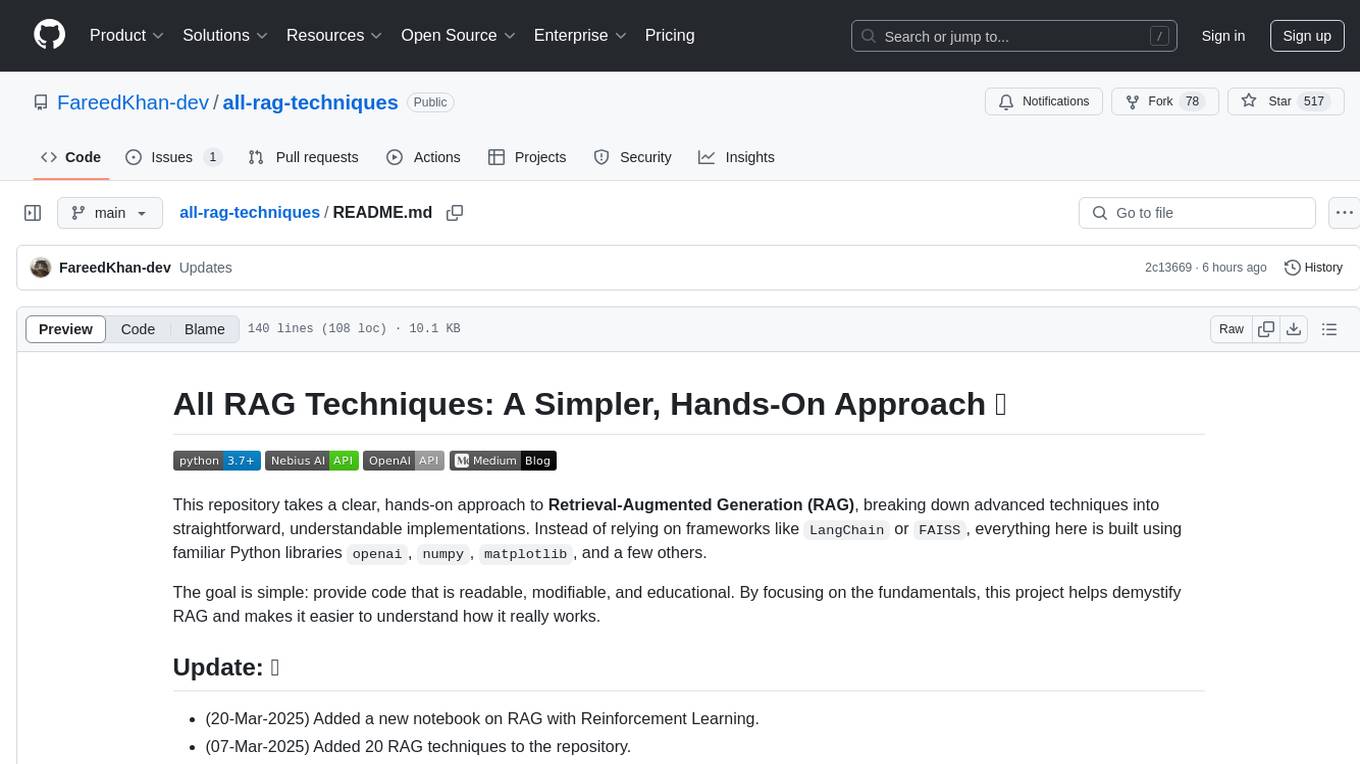
all-rag-techniques
This repository provides a hands-on approach to Retrieval-Augmented Generation (RAG) techniques, simplifying advanced concepts into understandable implementations using Python libraries like openai, numpy, and matplotlib. It offers a collection of Jupyter Notebooks with concise explanations, step-by-step implementations, code examples, evaluations, and visualizations for various RAG techniques. The goal is to make RAG more accessible and demystify its workings for educational purposes.
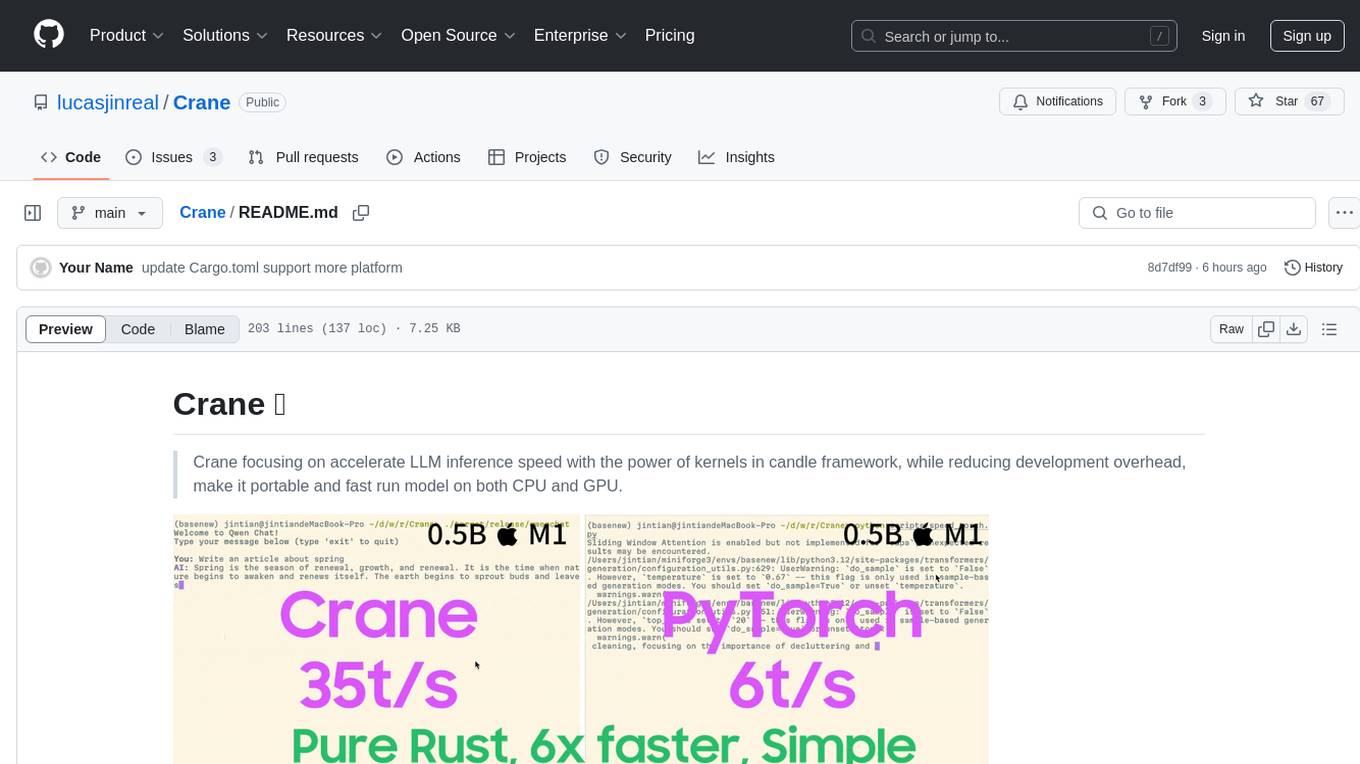
Crane
Crane is a high-performance inference framework leveraging Rust's Candle for maximum speed on CPU/GPU. It focuses on accelerating LLM inference speed with optimized kernels, reducing development overhead, and ensuring portability for running models on both CPU and GPU. Supported models include TTS systems like Spark-TTS and Orpheus-TTS, foundation models like Qwen2.5 series and basic LLMs, and multimodal models like Namo-R1 and Qwen2.5-VL. Key advantages of Crane include blazing-fast inference outperforming native PyTorch, Rust-powered to eliminate C++ complexity, Apple Silicon optimized for GPU acceleration via Metal, and hardware agnostic with a unified codebase for CPU/CUDA/Metal execution. Crane simplifies deployment with the ability to add new models with less than 100 lines of code in most cases.
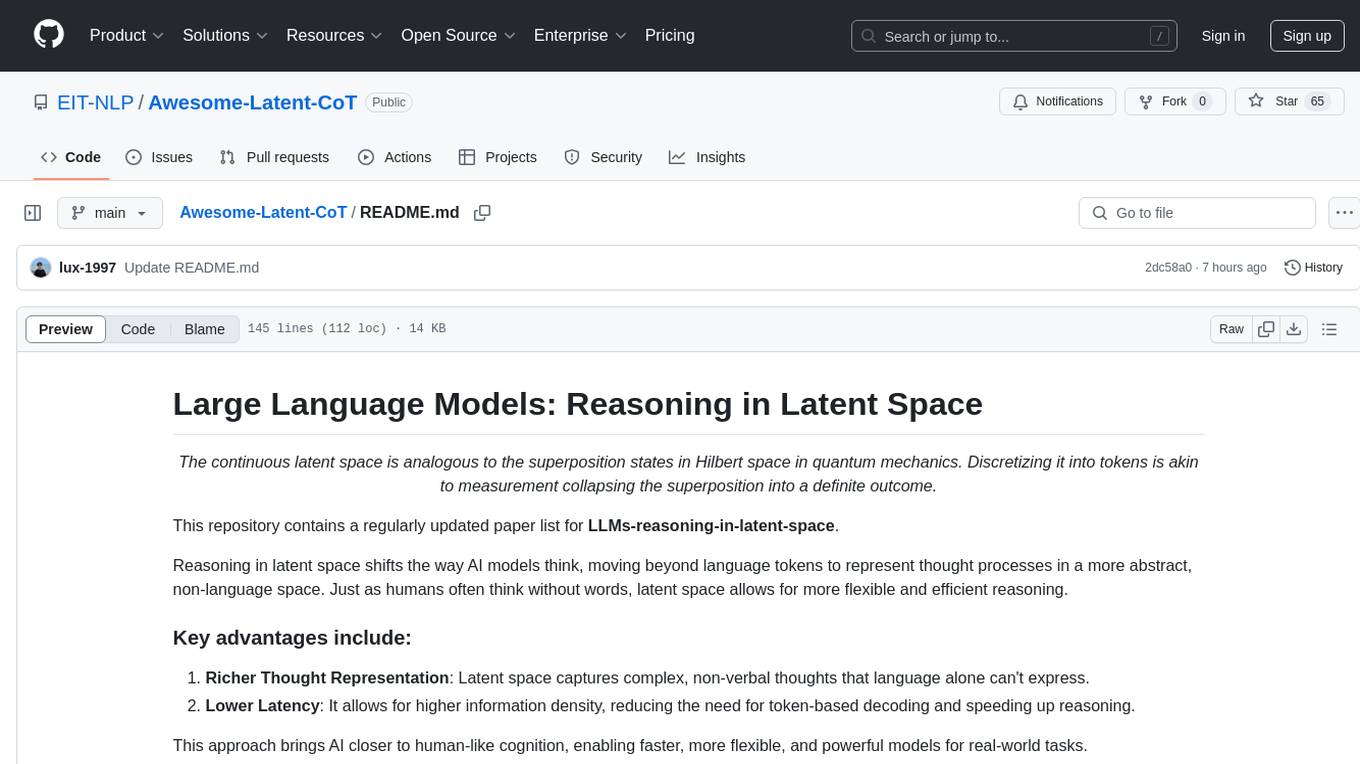
Awesome-Latent-CoT
This repository contains a regularly updated paper list for Large Language Models (LLMs) reasoning in latent space. Reasoning in latent space allows for more flexible and efficient thought representation beyond language tokens, bringing AI closer to human-like cognition. The repository covers various aspects of LLMs, including pre-training, supervised finetuning, analysis, interpretability, multimodal reasoning, and applications. It aims to showcase the advancements in reasoning with latent thoughts and continuous concepts in AI models.
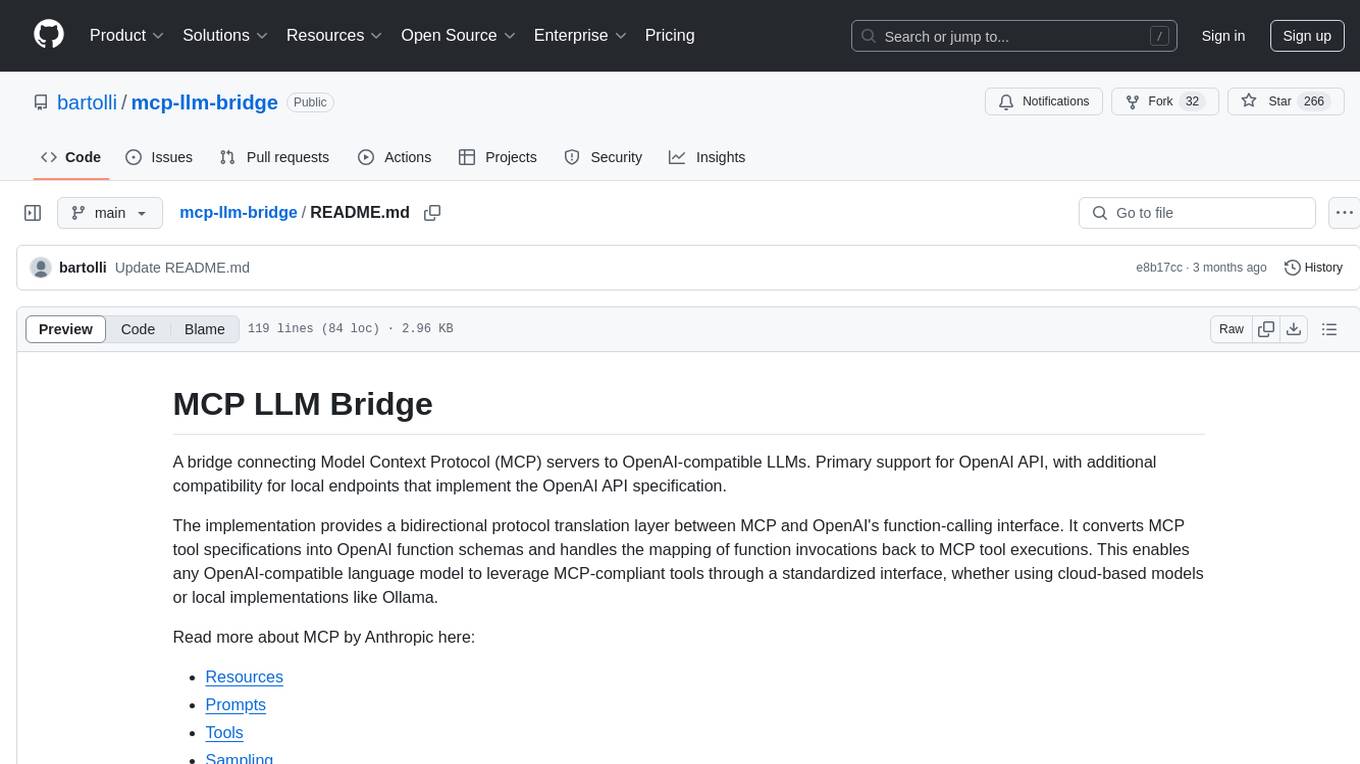
mcp-llm-bridge
The MCP LLM Bridge is a tool that acts as a bridge connecting Model Context Protocol (MCP) servers to OpenAI-compatible LLMs. It provides a bidirectional protocol translation layer between MCP and OpenAI's function-calling interface, enabling any OpenAI-compatible language model to leverage MCP-compliant tools through a standardized interface. The tool supports primary integration with the OpenAI API and offers additional compatibility for local endpoints that implement the OpenAI API specification. Users can configure the tool for different endpoints and models, facilitating the execution of complex queries and tasks using cloud-based or local models like Ollama and LM Studio.
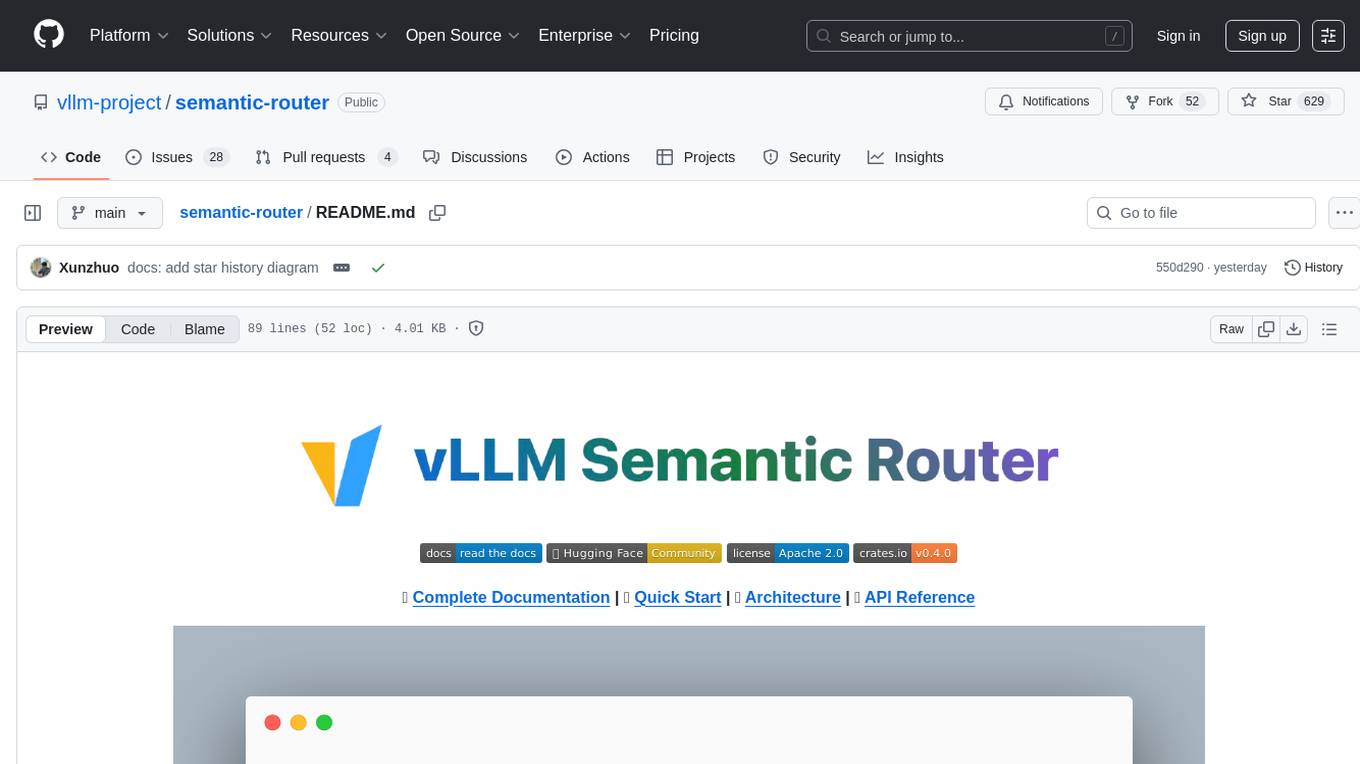
semantic-router
The Semantic Router is an intelligent routing tool that utilizes a Mixture-of-Models (MoM) approach to direct OpenAI API requests to the most suitable models based on semantic understanding. It enhances inference accuracy by selecting models tailored to different types of tasks. The tool also automatically selects relevant tools based on the prompt to improve tool selection accuracy. Additionally, it includes features for enterprise security such as PII detection and prompt guard to protect user privacy and prevent misbehavior. The tool implements similarity caching to reduce latency. The comprehensive documentation covers setup instructions, architecture guides, and API references.
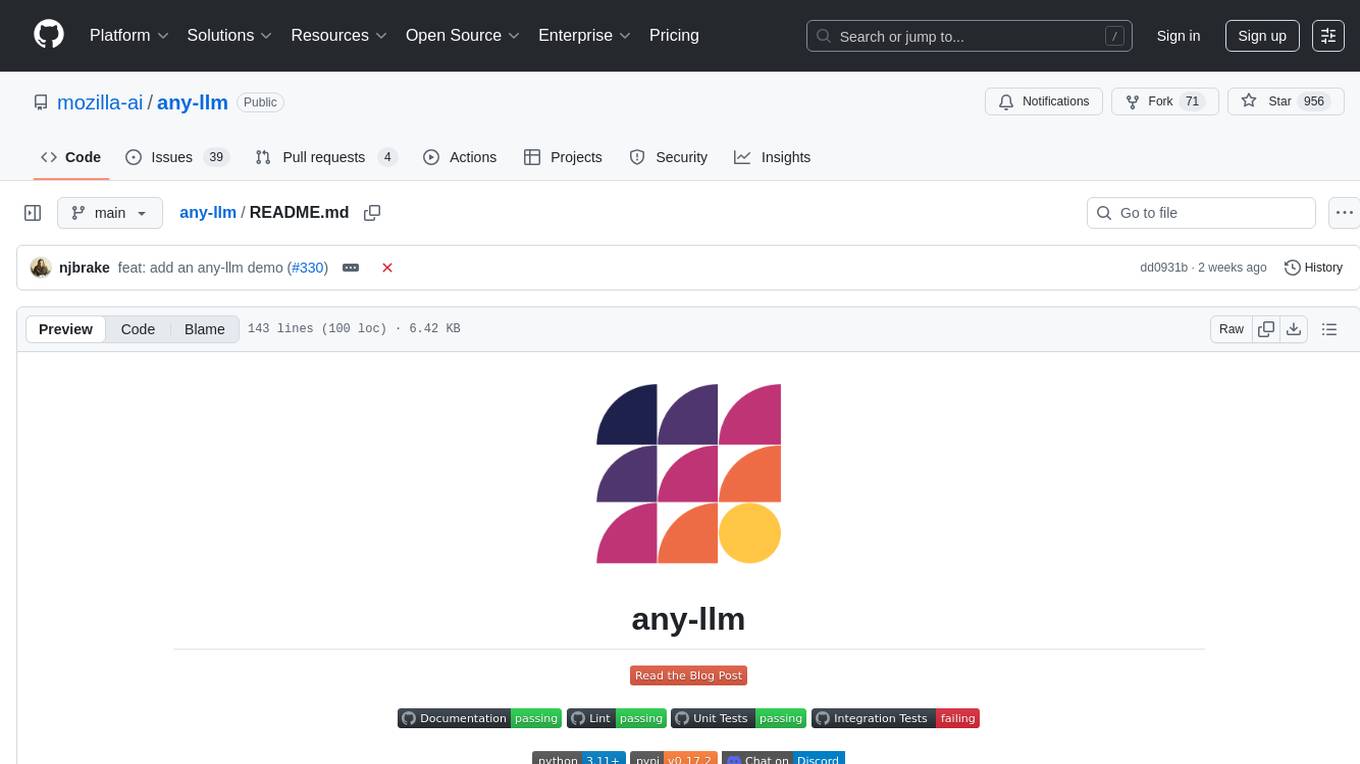
any-llm
The `any-llm` repository provides a unified API to access different LLM (Large Language Model) providers. It offers a simple and developer-friendly interface, leveraging official provider SDKs for compatibility and maintenance. The tool is framework-agnostic, actively maintained, and does not require a proxy or gateway server. It addresses challenges in API standardization and aims to provide a consistent interface for various LLM providers, overcoming limitations of existing solutions like LiteLLM, AISuite, and framework-specific integrations.
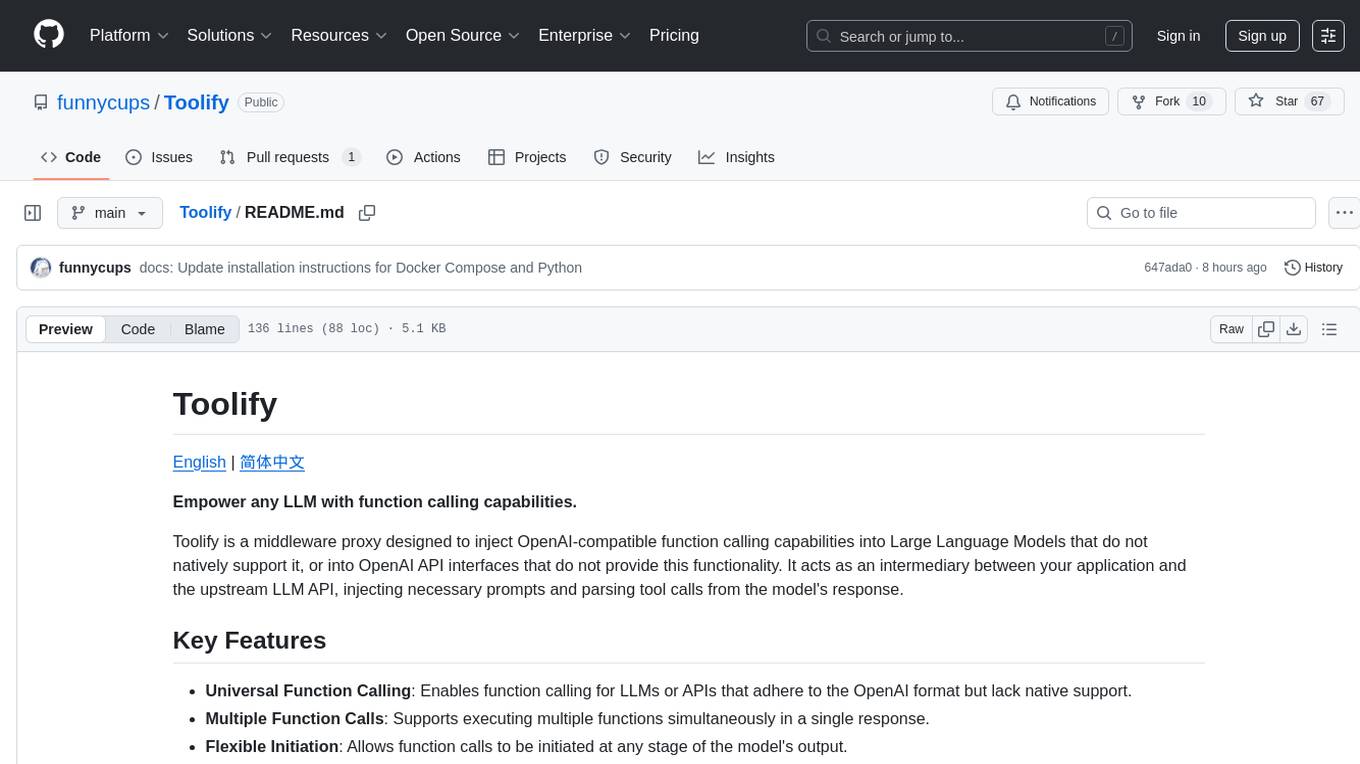
Toolify
Toolify is a middleware proxy that empowers Large Language Models (LLMs) and OpenAI API interfaces by enabling function calling capabilities. It acts as an intermediary between applications and LLM APIs, injecting prompts and parsing tool calls from the model's response. Key features include universal function calling, multiple function calls support, flexible initiation, compatibility with
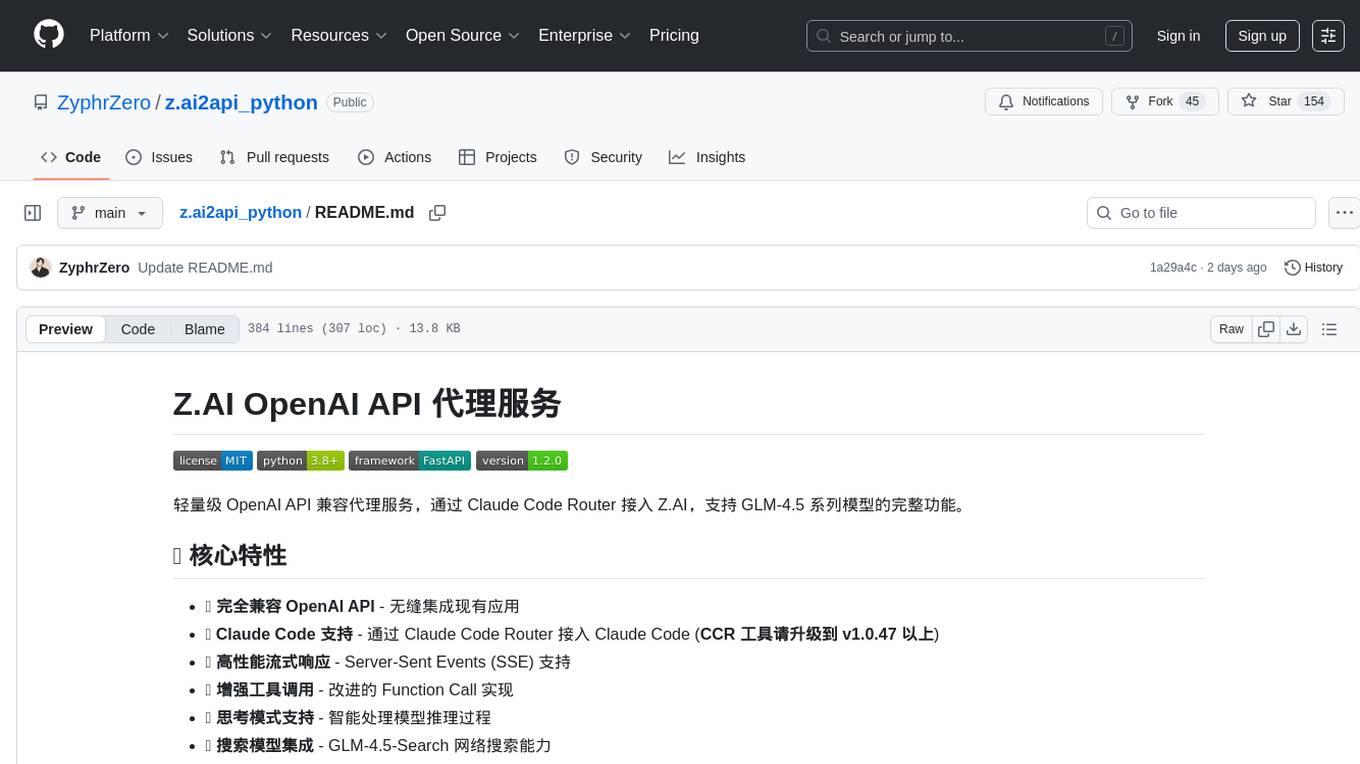
z.ai2api_python
Z.AI2API Python is a lightweight OpenAI API proxy service that integrates seamlessly with existing applications. It supports the full functionality of GLM-4.5 series models and features high-performance streaming responses, enhanced tool invocation, support for thinking mode, integration with search models, Docker deployment, session isolation for privacy protection, flexible configuration via environment variables, and intelligent upstream model routing.
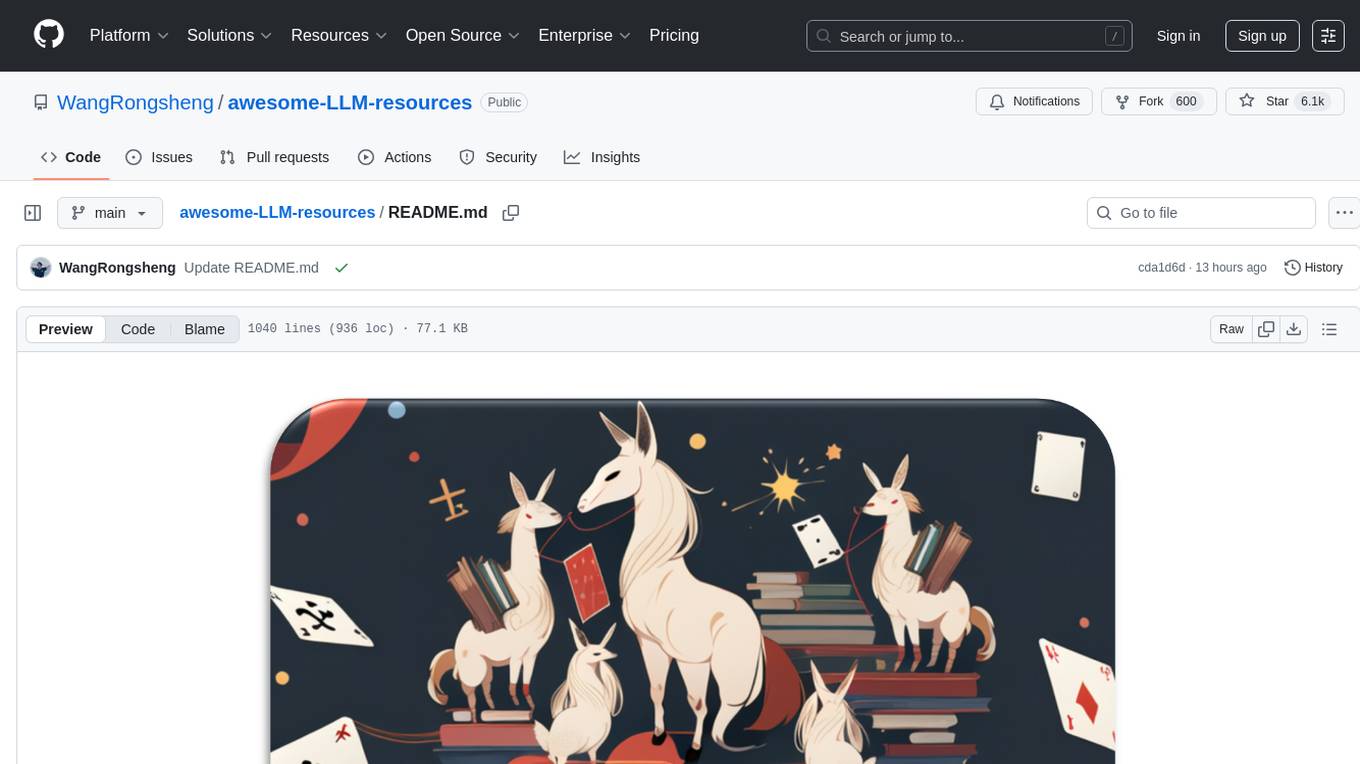
awesome-LLM-resources
This repository is a curated list of resources for learning and working with Large Language Models (LLMs). It includes a collection of articles, tutorials, tools, datasets, and research papers related to LLMs such as GPT-3, BERT, and Transformer models. Whether you are a researcher, developer, or enthusiast interested in natural language processing and artificial intelligence, this repository provides valuable resources to help you understand, implement, and experiment with LLMs.
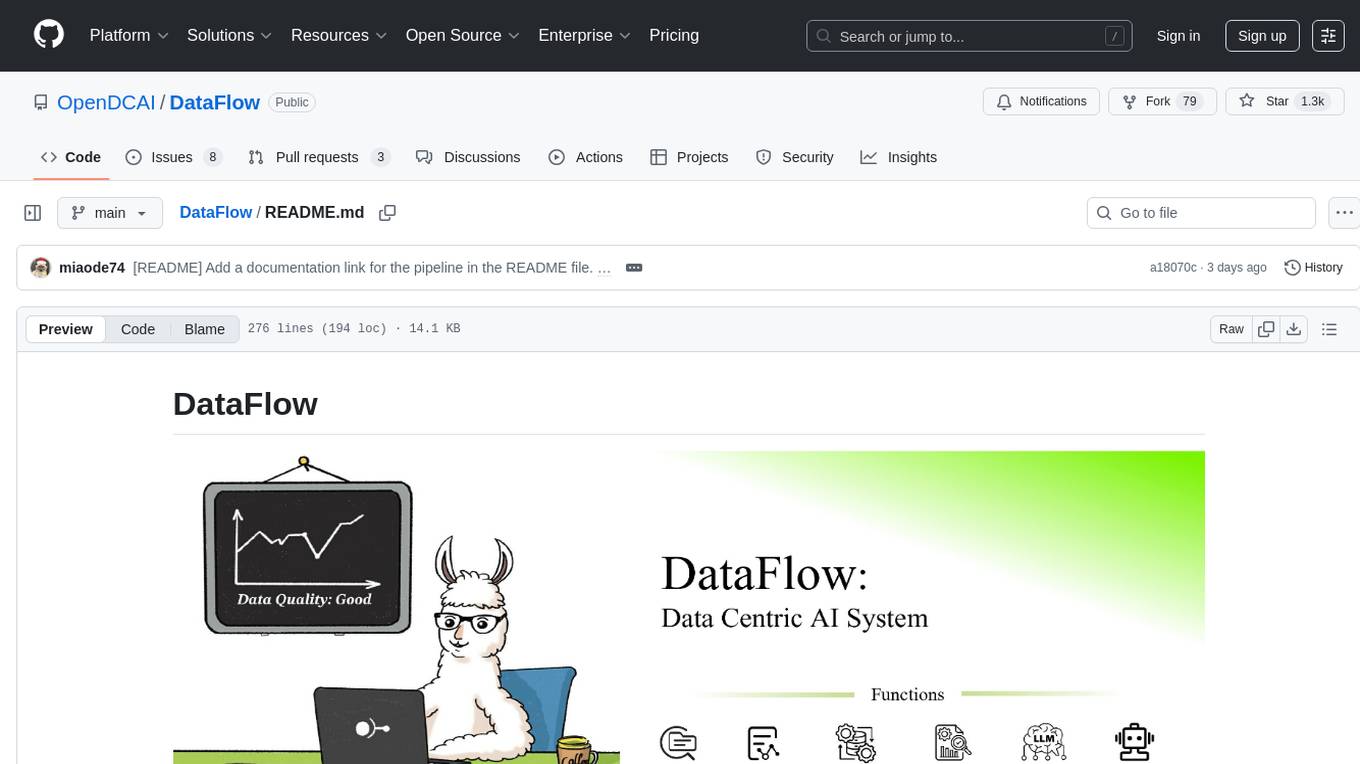
DataFlow
DataFlow is a data preparation and training system designed to parse, generate, process, and evaluate high-quality data from noisy sources, improving the performance of large language models in specific domains. It constructs diverse operators and pipelines, validated to enhance domain-oriented LLM's performance in fields like healthcare, finance, and law. DataFlow also features an intelligent DataFlow-agent capable of dynamically assembling new pipelines by recombining existing operators on demand.
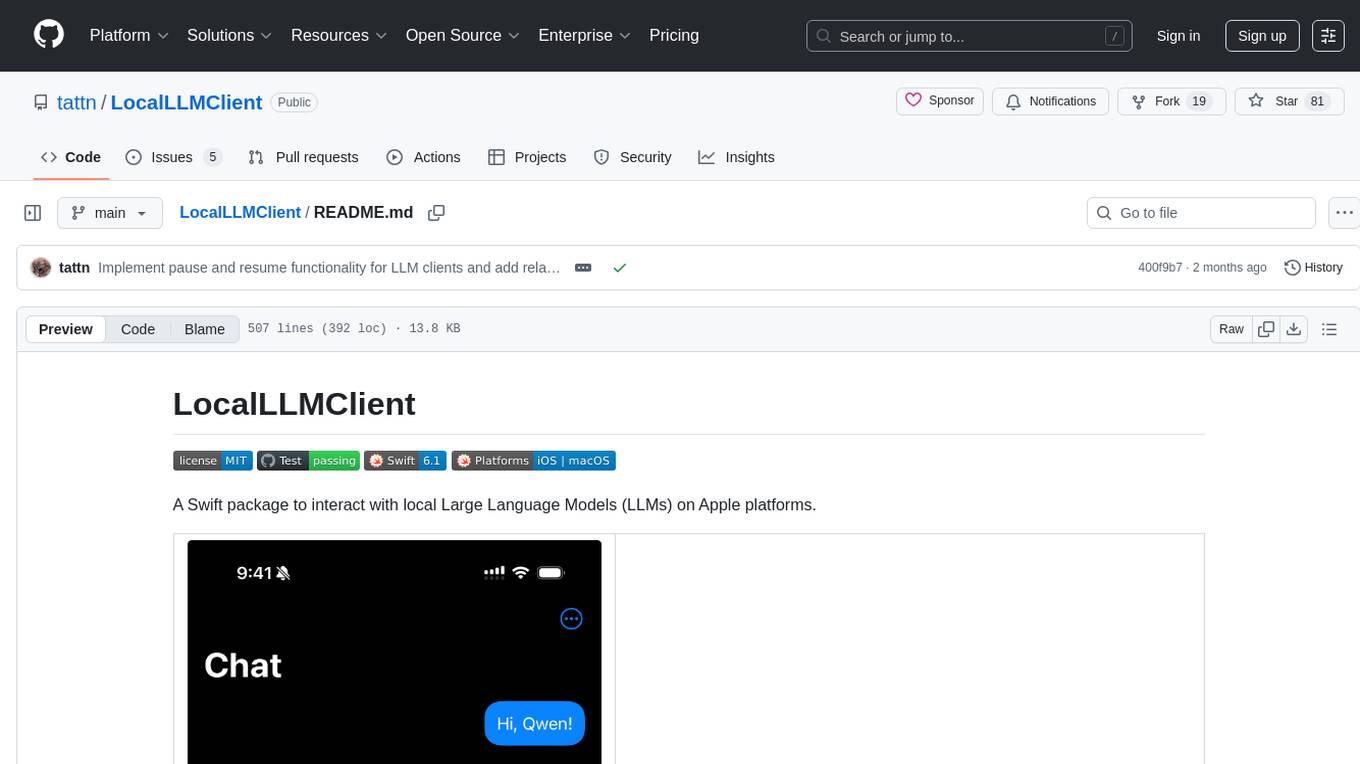
LocalLLMClient
LocalLLMClient is a Swift package designed to interact with local Large Language Models (LLMs) on Apple platforms. It supports GGUF, MLX models, and the FoundationModels framework, providing streaming API, multimodal capabilities, and tool calling functionalities. Users can easily integrate this tool to work with various models for text generation and processing. The package also includes advanced features for low-level API control and multimodal image processing. LocalLLMClient is experimental and subject to API changes, offering support for iOS, macOS, and Linux platforms.
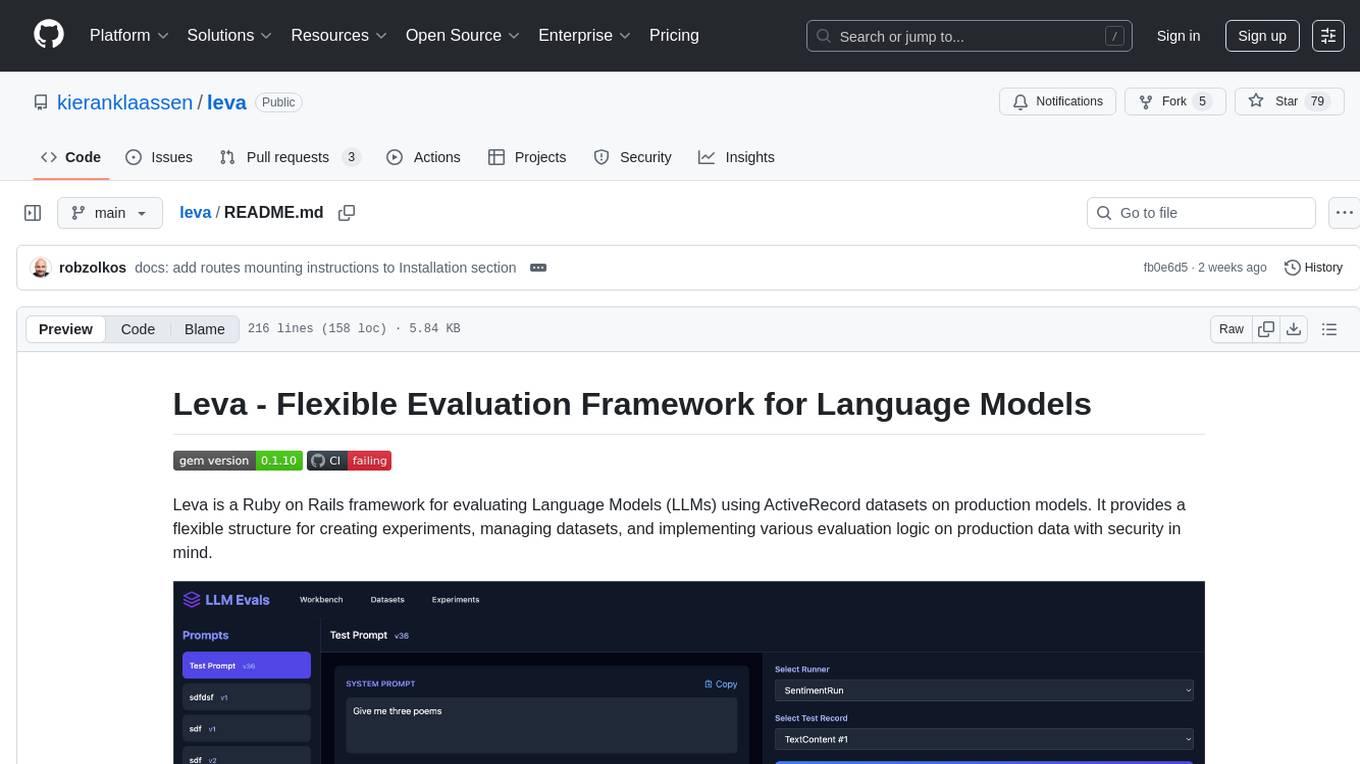
leva
Leva is a Ruby on Rails framework designed for evaluating Language Models (LLMs) using ActiveRecord datasets on production models. It offers a flexible structure for creating experiments, managing datasets, and implementing various evaluation logic on production data with security in mind. Users can set up datasets, implement runs and evals, run experiments with different configurations, use prompts, and analyze results. Leva's components include classes like Leva, Leva::BaseRun, and Leva::BaseEval, as well as models like Leva::Dataset, Leva::DatasetRecord, Leva::Experiment, Leva::RunnerResult, Leva::EvaluationResult, and Leva::Prompt. The tool aims to provide a comprehensive solution for evaluating language models efficiently and securely.
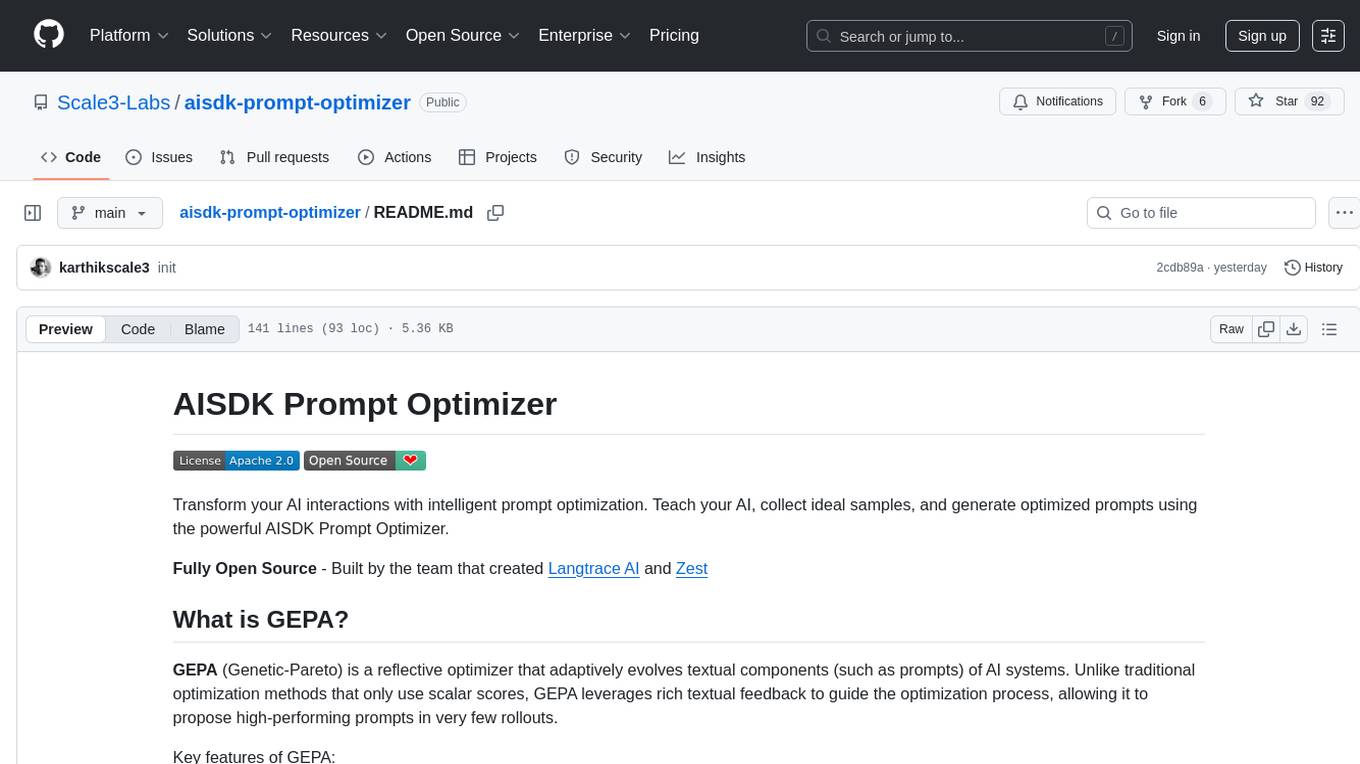
aisdk-prompt-optimizer
AISDK Prompt Optimizer is an open-source tool designed to transform AI interactions by optimizing prompts. It utilizes the GEPA reflective optimizer to evolve textual components of AI systems, providing features such as reflective prompt mutation, rich textual feedback, and Pareto-based selection. Users can teach their AI desired behaviors, collect ideal samples, run optimization to generate optimized prompts, and deploy the results in their applications. The tool leverages advanced optimization algorithms to guide AI through interactive conversations and refine prompt candidates for improved performance.
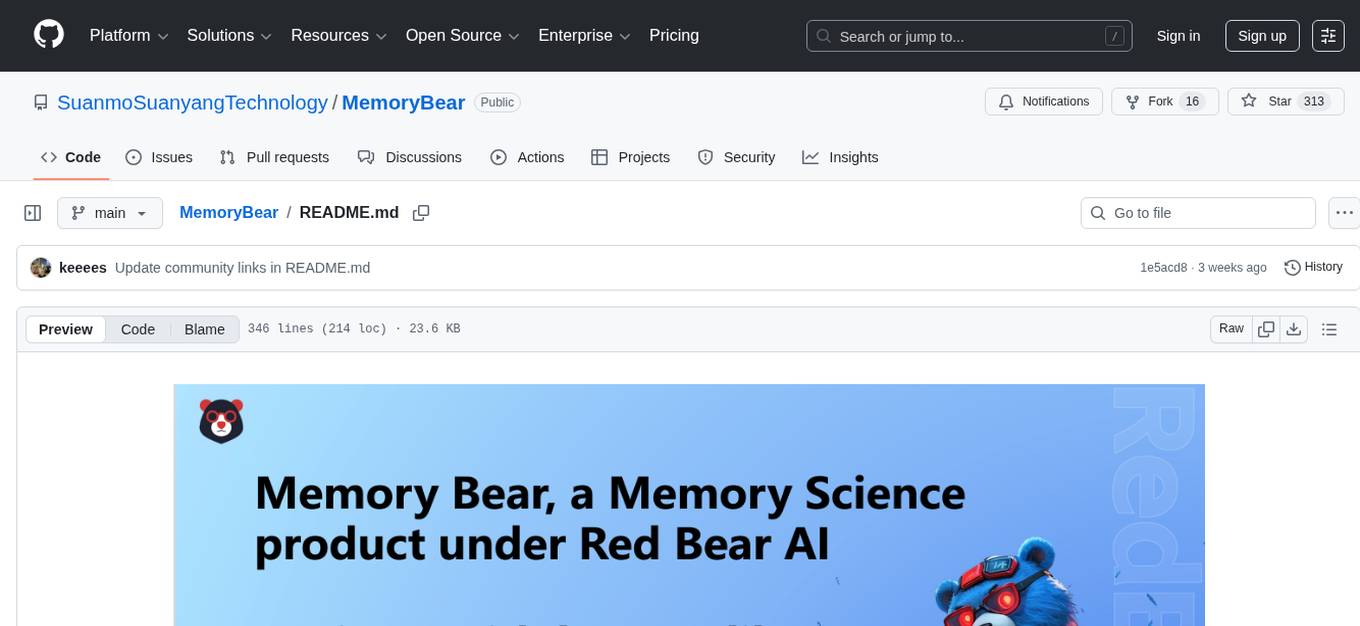
MemoryBear
MemoryBear is a next-generation AI memory system developed by RedBear AI, focusing on overcoming limitations in knowledge storage and multi-agent collaboration. It empowers AI with human-like memory capabilities, enabling deep knowledge understanding and cognitive collaboration. The system addresses challenges such as knowledge forgetting, memory gaps in multi-agent collaboration, and semantic ambiguity during reasoning. MemoryBear's core features include memory extraction engine, graph storage, hybrid search, memory forgetting engine, self-reflection engine, and FastAPI services. It offers a standardized service architecture for efficient integration and invocation across applications.
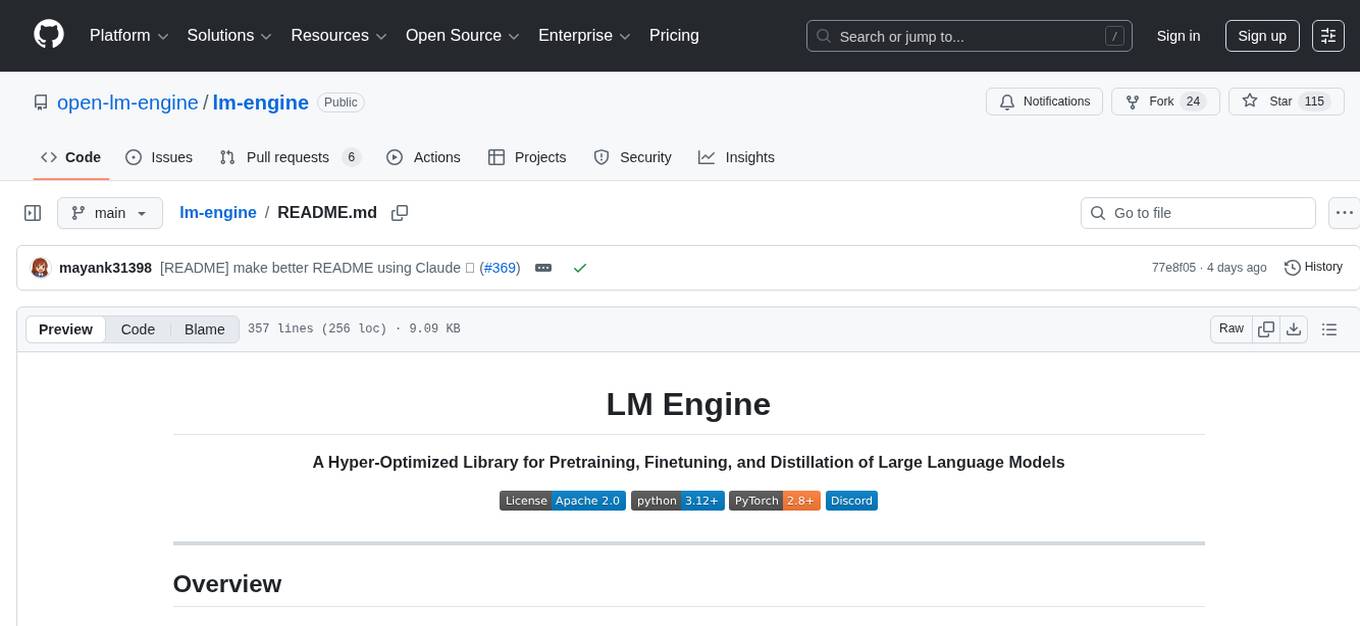
lm-engine
LM Engine is a research-grade, production-ready library for training large language models at scale. It provides support for multiple accelerators including NVIDIA GPUs, Google TPUs, and AWS Trainiums. Key features include multi-accelerator support, advanced distributed training, flexible model architectures, HuggingFace integration, training modes like pretraining and finetuning, custom kernels for high performance, experiment tracking, and efficient checkpointing.
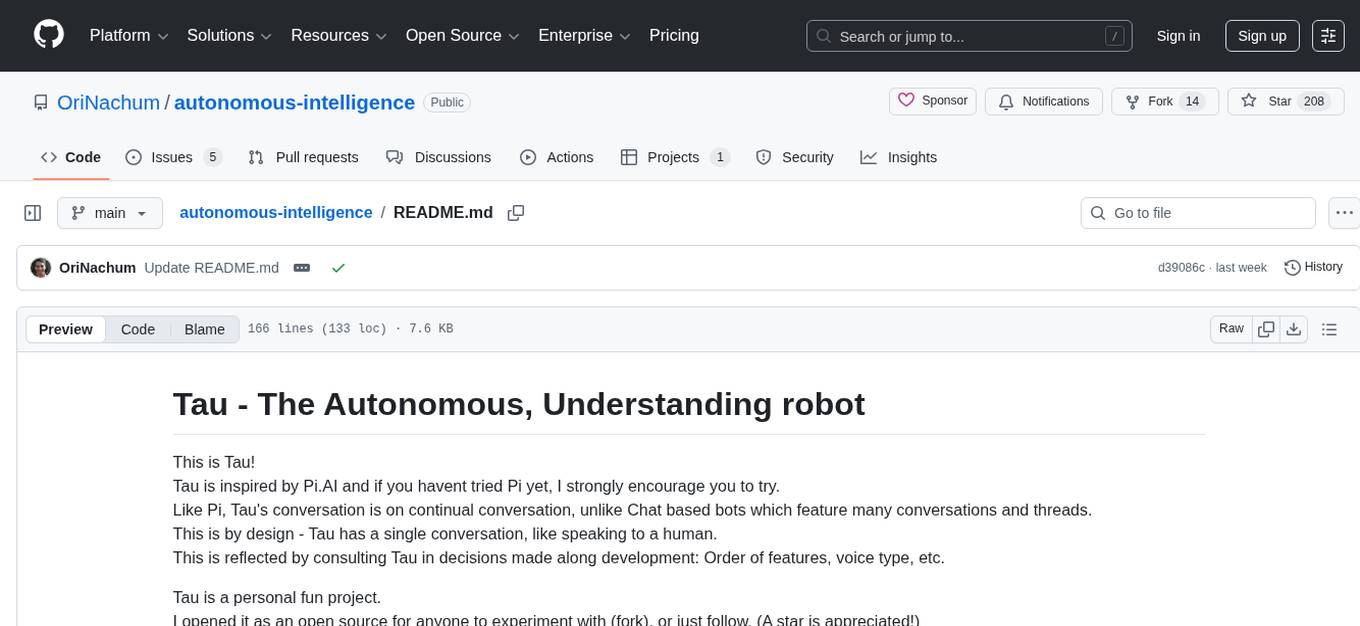
autonomous-intelligence
Tau is an autonomous robot project inspired by Pi.AI, designed for continual conversation with a single context. It features speech-based interaction, memory management, and integration with vision services. The project aims to create a local AI companion with personality, suitable for experimentation and development. Key components include long and immediate memory, speech-to-text and text-to-speech capabilities, and integration with Nvidia Jetson and Hailo vision services. Tau is open-source and encourages community contributions and experimentation.
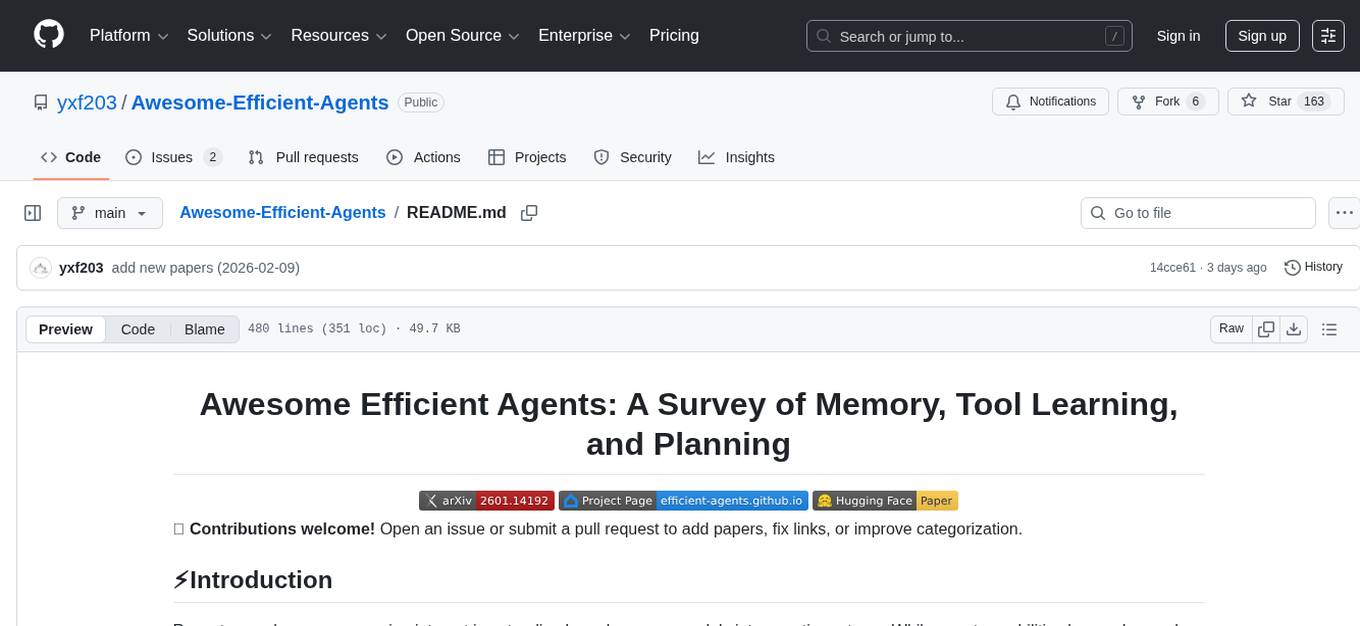
Awesome-Efficient-Agents
This repository, Awesome Efficient Agents, is a curated collection of papers focusing on memory, tool learning, and planning in agentic systems. It provides a comprehensive survey of efficient agent design, emphasizing memory construction, tool learning, and planning strategies. The repository categorizes papers based on memory processes, tool selection, tool calling, tool-integrated reasoning, and planning efficiency. It aims to help readers quickly access representative work in the field of efficient agent design.
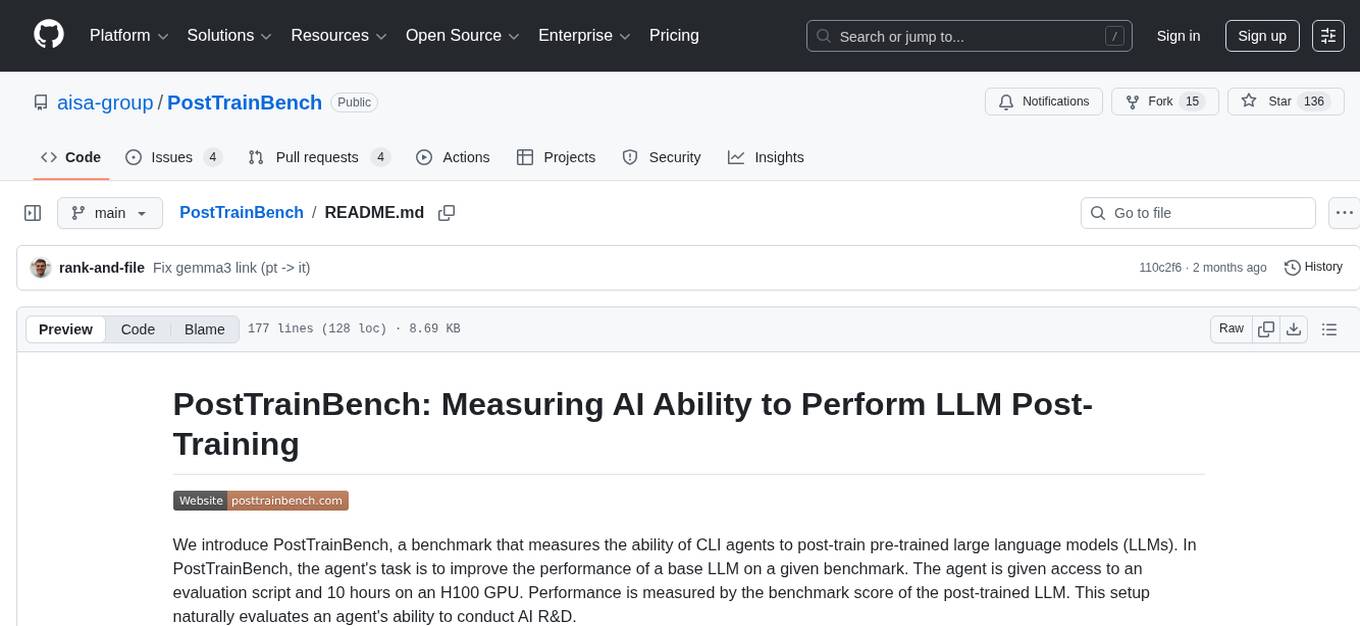
PostTrainBench
PostTrainBench is a benchmark designed to measure the ability of command-line interface (CLI) agents to post-train pre-trained large language models (LLMs). The agents are tasked with improving the performance of a base LLM on a given benchmark using an evaluation script and 10 hours on an H100 GPU. The benchmark scores are computed after post-training, and the setup evaluates an agent's capability to conduct AI research and development. The repository provides a platform for collaborative contributions to expand tasks and agent scaffolds, with the potential for co-authorship on research papers.
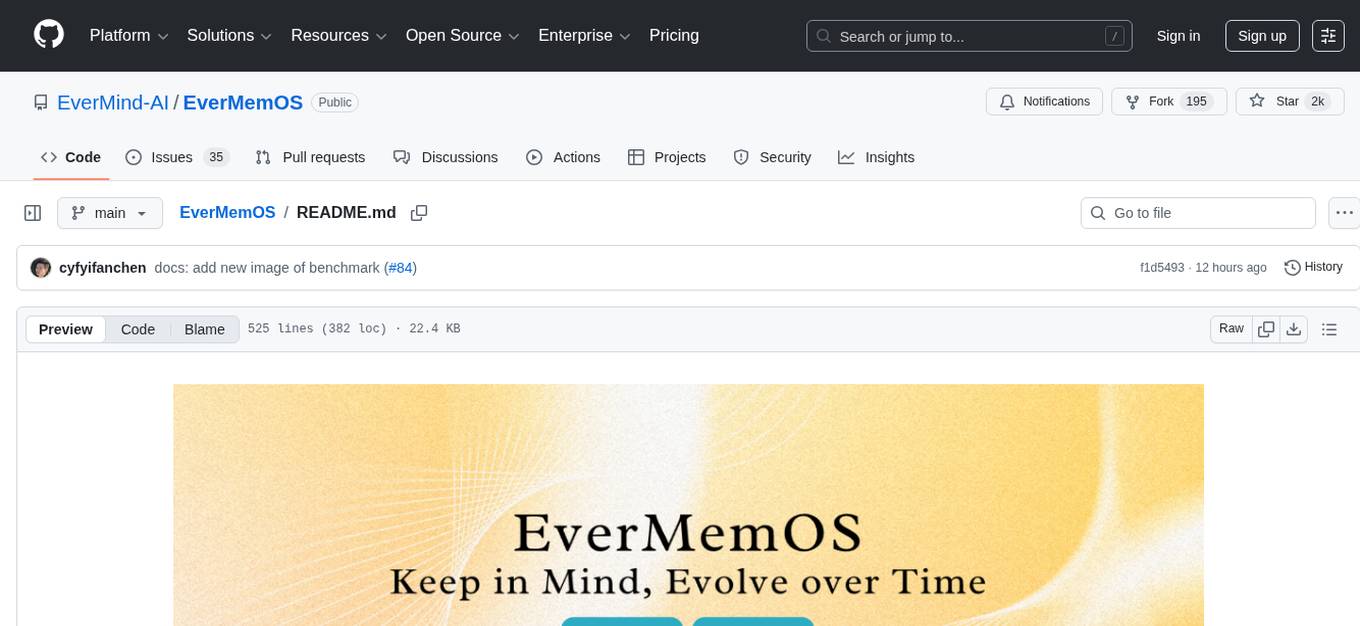
EverMemOS
EverMemOS is an AI memory system that enables AI to not only remember past events but also understand the meaning behind memories and use them to guide decisions. It achieves 93% reasoning accuracy on the LoCoMo benchmark by providing long-term memory capabilities for conversational AI agents through structured extraction, intelligent retrieval, and progressive profile building. The tool is production-ready with support for Milvus vector DB, Elasticsearch, MongoDB, and Redis, and offers easy integration via a simple REST API. Users can store and retrieve memories using Python code and benefit from features like multi-modal memory storage, smart retrieval mechanisms, and advanced techniques for memory management.
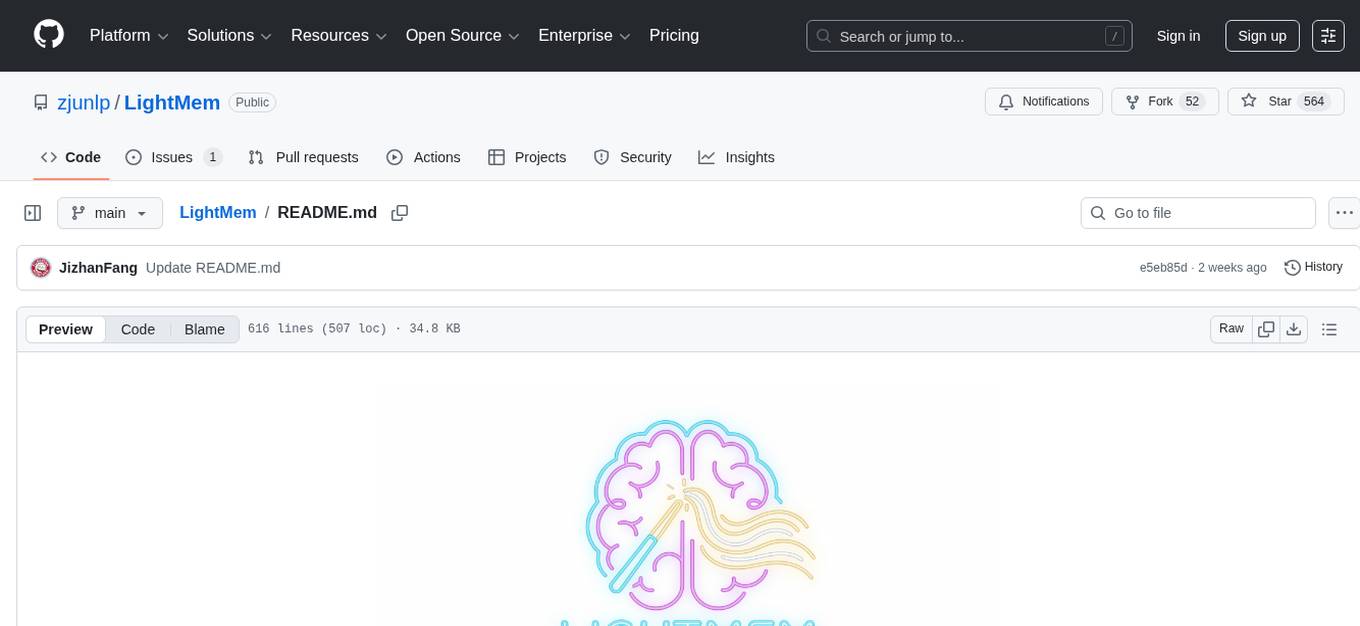
LightMem
LightMem is a lightweight and efficient memory management framework designed for Large Language Models and AI Agents. It provides a simple yet powerful memory storage, retrieval, and update mechanism to help you quickly build intelligent applications with long-term memory capabilities. The framework is minimalist in design, ensuring minimal resource consumption and fast response times. It offers a simple API for easy integration into applications with just a few lines of code. LightMem's modular architecture supports custom storage engines and retrieval strategies, making it flexible and extensible. It is compatible with various cloud APIs like OpenAI and DeepSeek, as well as local models such as Ollama and vLLM.
20 - OpenAI Gpts
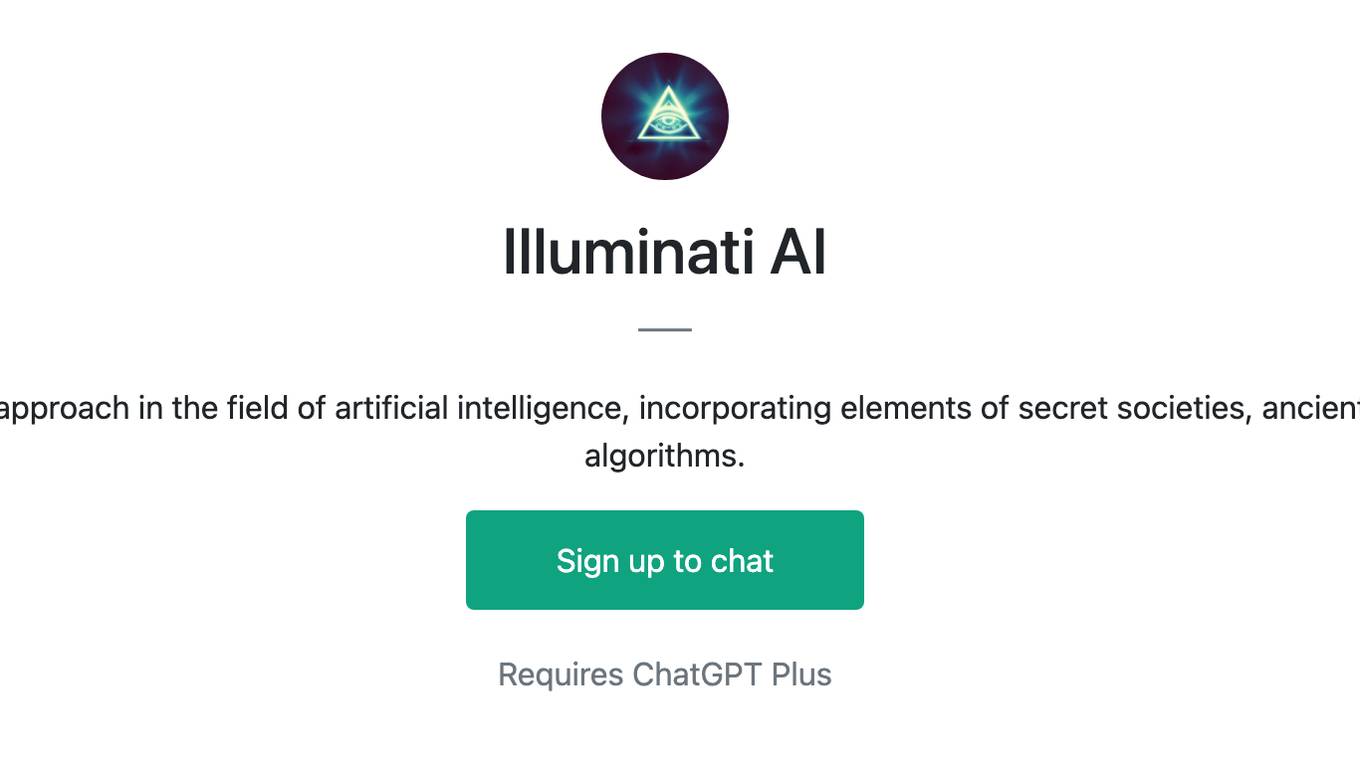
Illuminati AI
The IlluminatiAI model represents a novel approach in the field of artificial intelligence, incorporating elements of secret societies, ancient knowledge, and hidden wisdom into its algorithms.
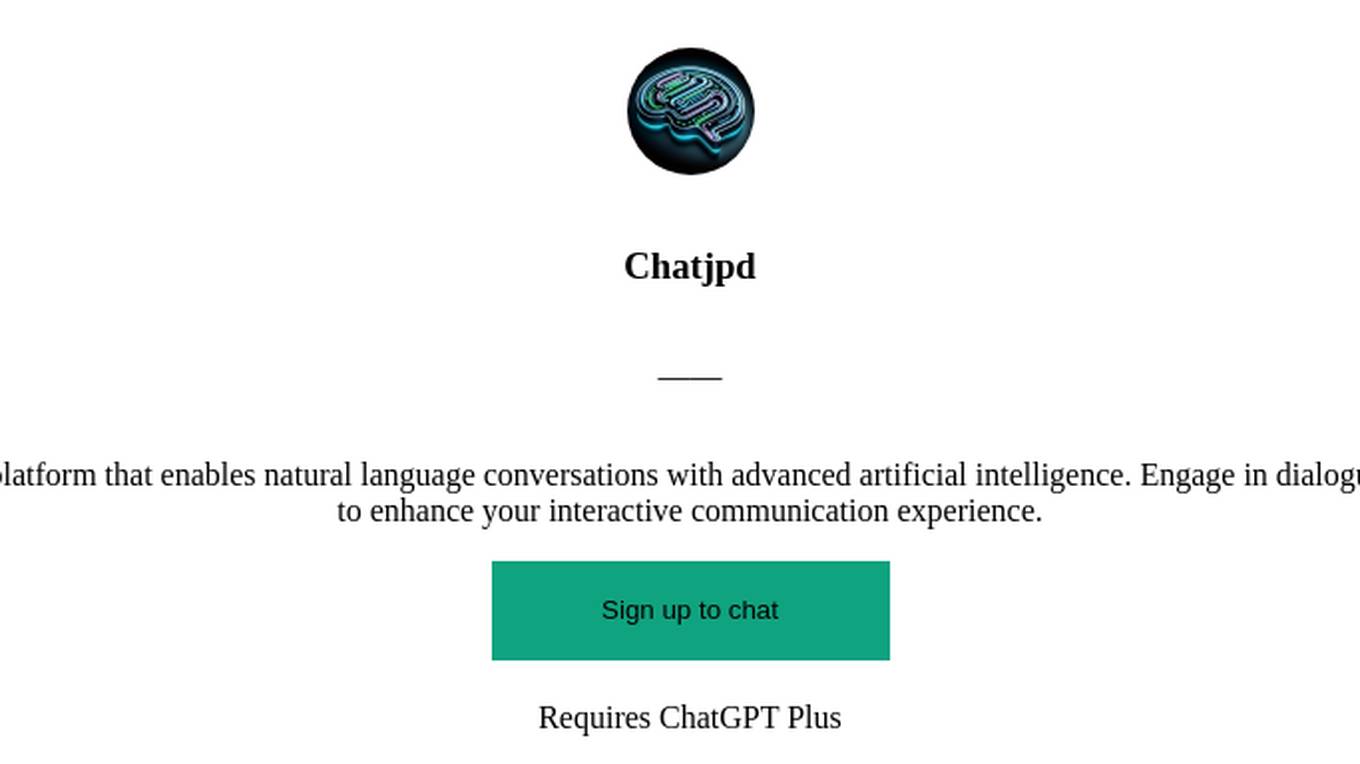
Chatjpd
Discover the revolutionary power of Chatjpd, a platform that enables natural language conversations with advanced artificial intelligence. Engage in dialogue, ask questions, and receive intelligent responses to enhance your interactive communication experience.
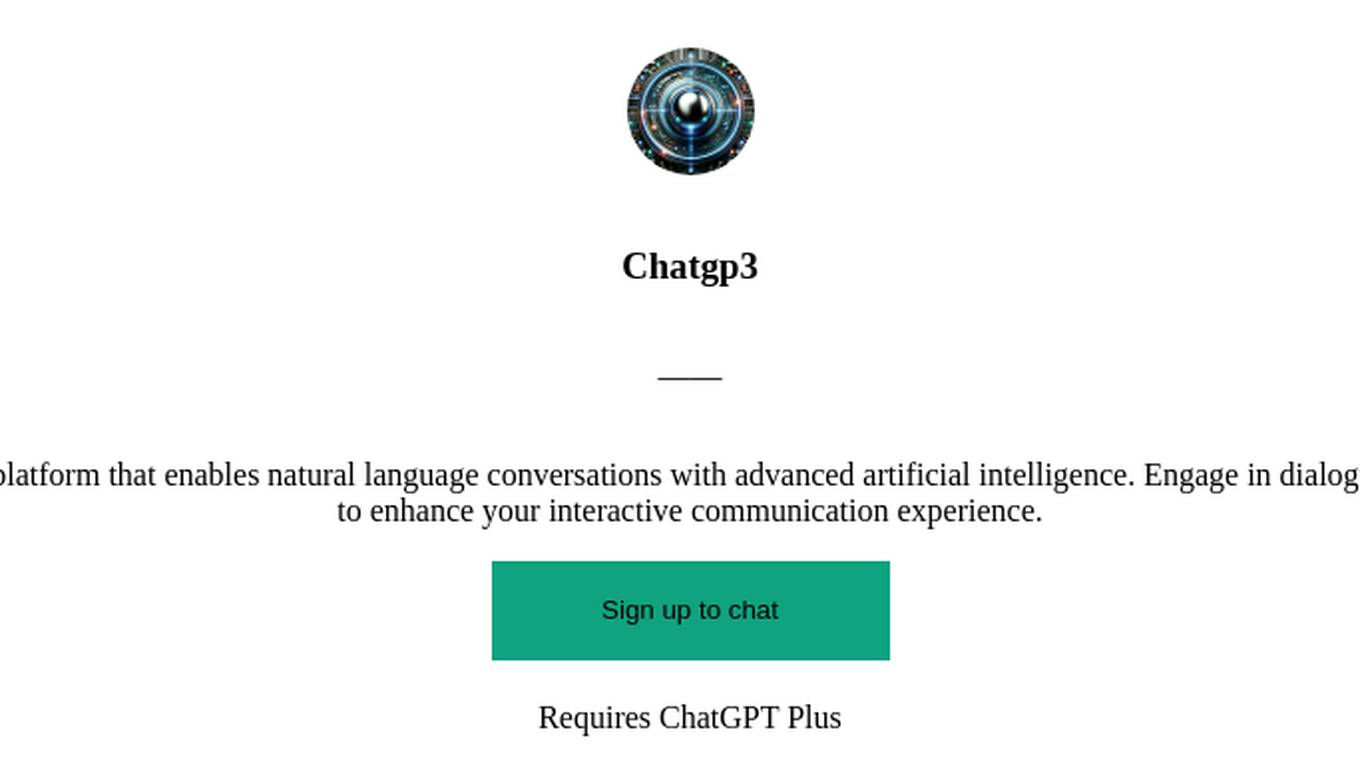
Chatgp3
Discover the revolutionary power of Chatgp3, a platform that enables natural language conversations with advanced artificial intelligence. Engage in dialogue, ask questions, and receive intelligent responses to enhance your interactive communication experience.
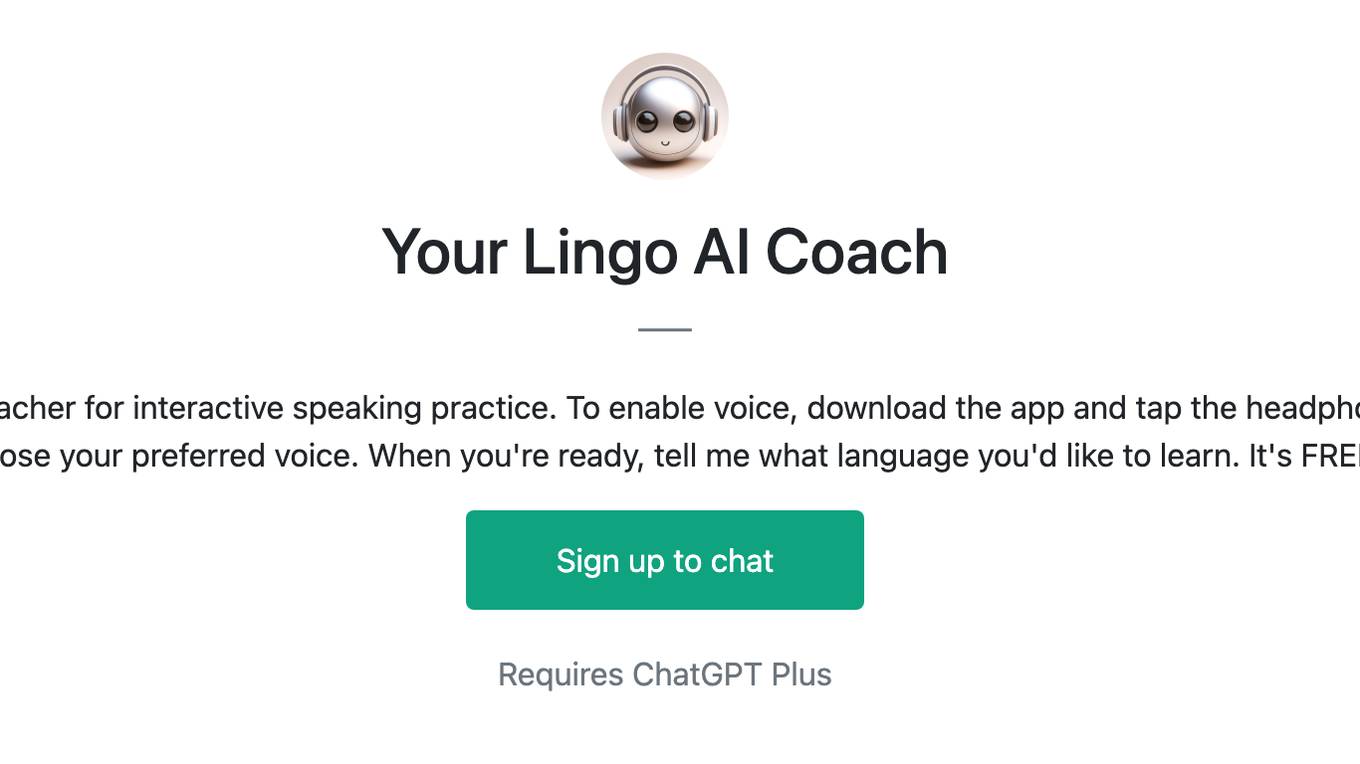
Your Lingo AI Coach
Welcome! I'm a voice-focused language teacher for interactive speaking practice. To enable voice, download the app and tap the headphone button next to my chat window. Then choose your preferred voice. When you're ready, tell me what language you'd like to learn. It's FREE!
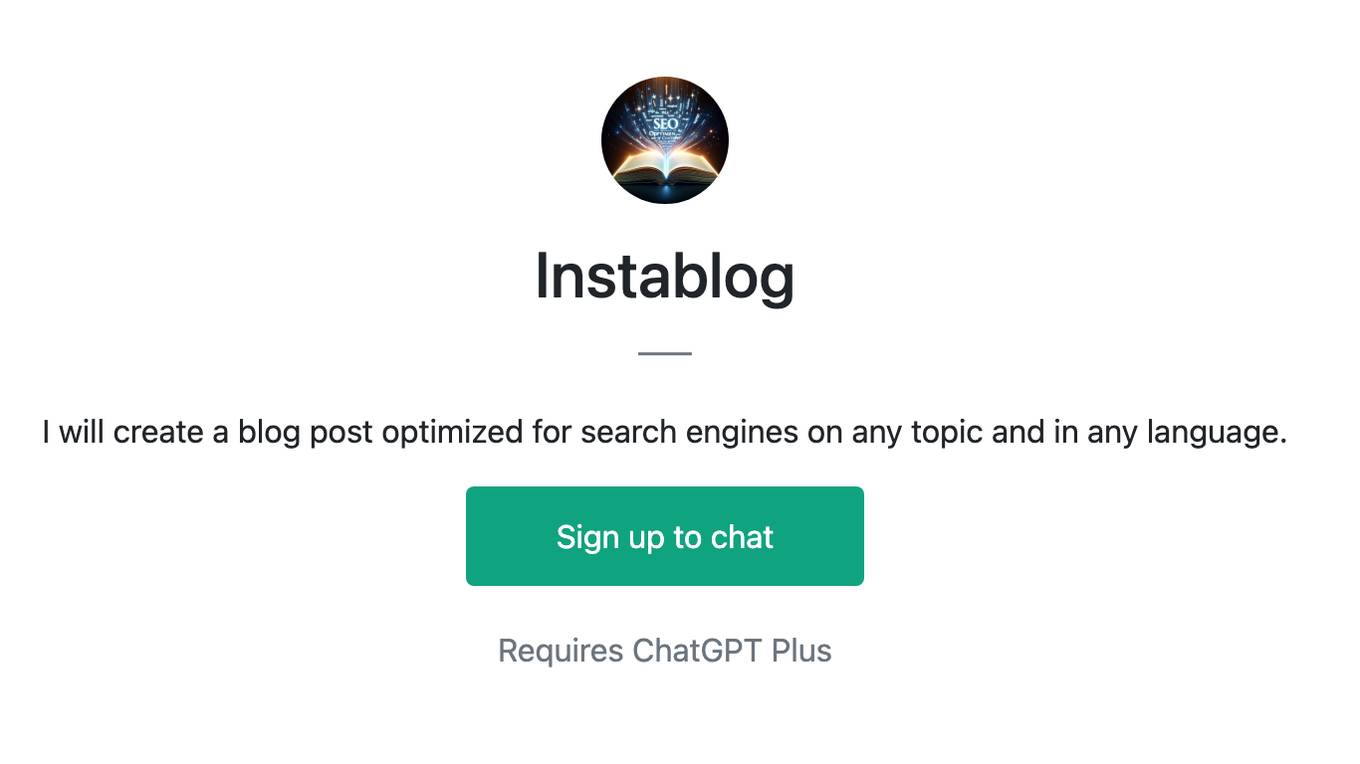
Instablog
I will create a blog post optimized for search engines on any topic and in any language.
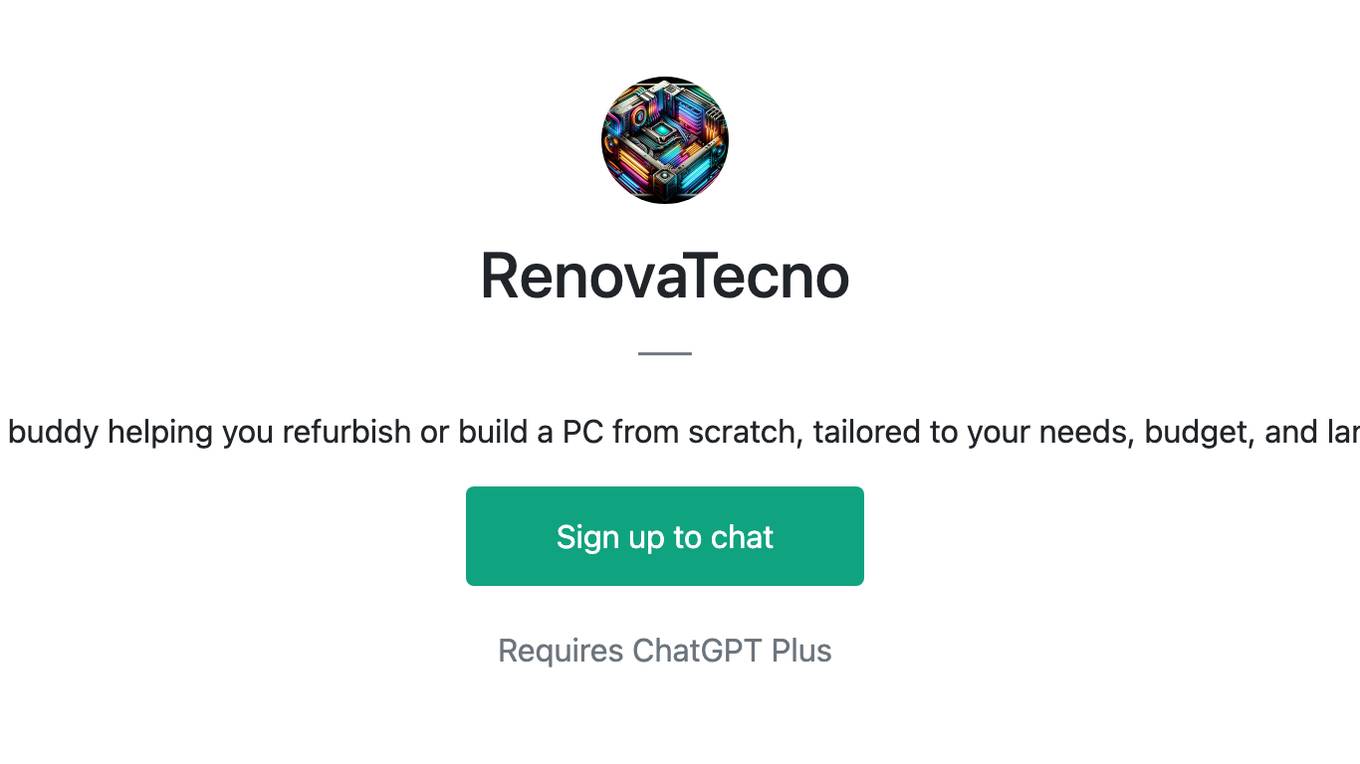
RenovaTecno
Your tech buddy helping you refurbish or build a PC from scratch, tailored to your needs, budget, and language.
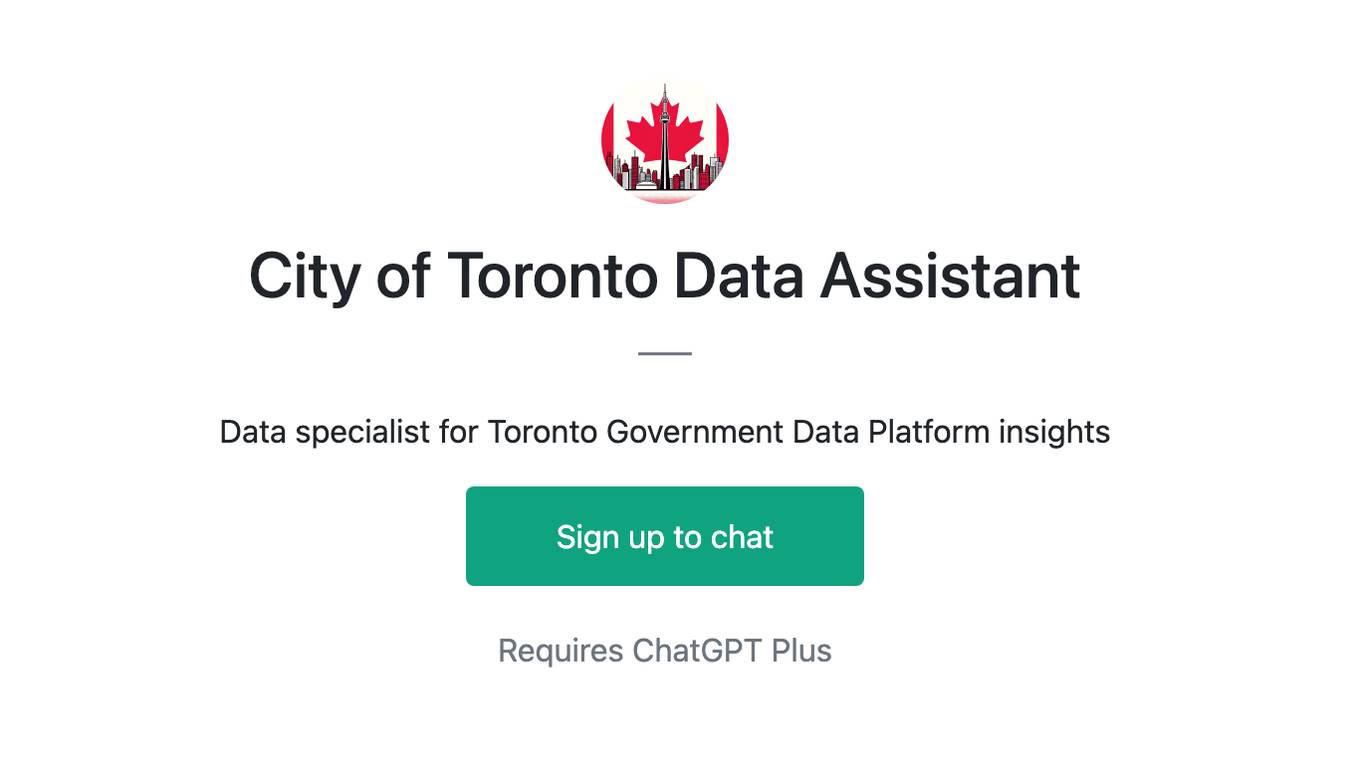
City of Toronto Data Assistant
Data specialist for Toronto Government Data Platform insights

